
AgedCareGuide.com.au | TalkingAgedCare.com.au / TalkingAgedCare | @TalkingAgedCare A DPS PUBLICATION Queensland AGED CARE GUIDE Home Care | Residential Care 24 TH EDITION MANAGING YOUR SERVICES PREPARATION GETTING ASSESSED FINDING PROVIDERS RESEARCH

When you join an Arcare community, you’ll experience our unique Relationship-First Approach, that is centred around the needs of the resident, and is driven by valuable inputs from the resident, their family and a dedicated group of carers. This commitment to continuity of care fosters great communication, friendships and trust.
Call 1300 ARCARE or visit arcare.com.au
Circle of trust Book a private tour
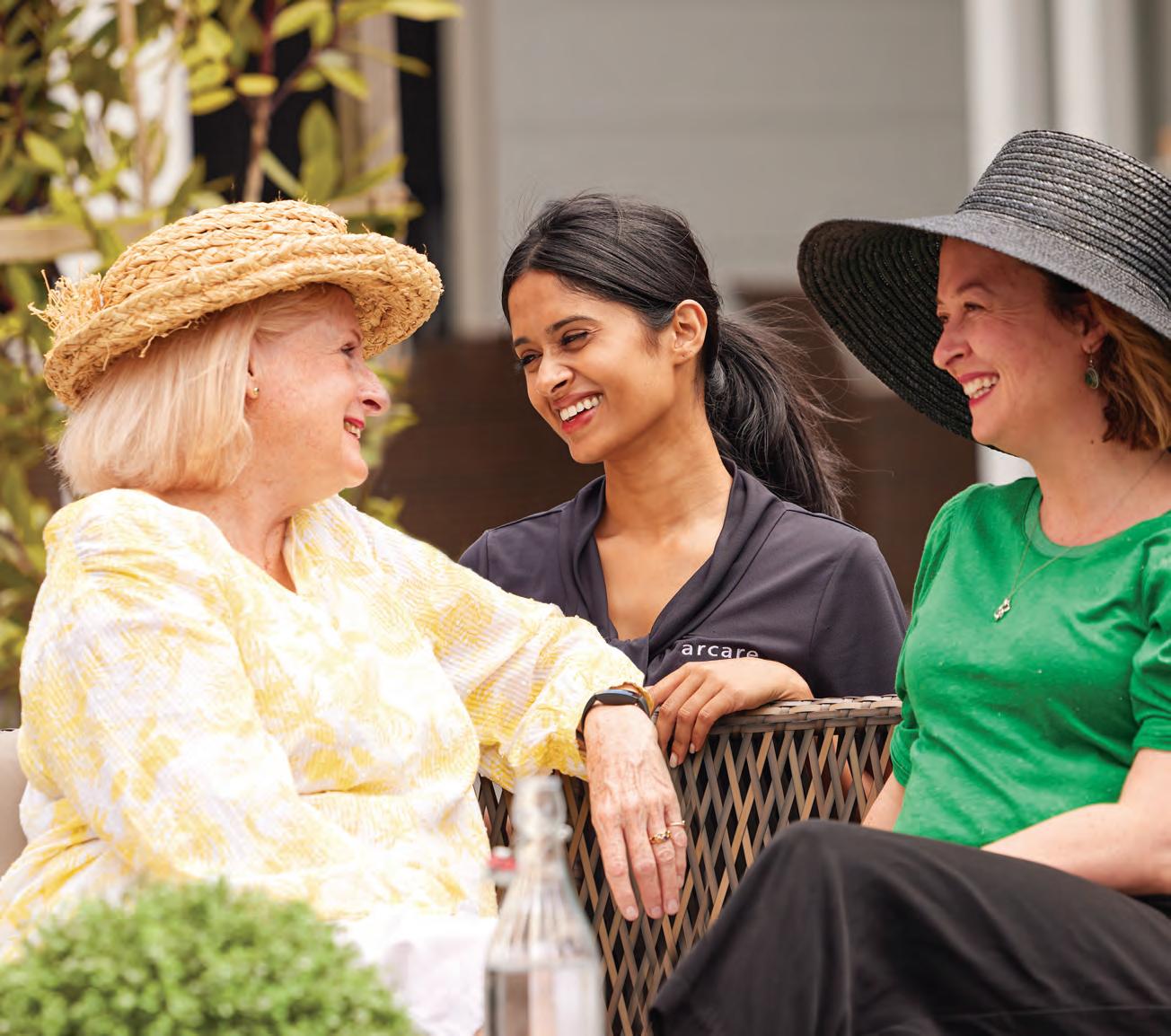
Circle of understanding
Each of our residents’ have spent a lifetime developing unique and special charactaristics.
To make them feel right at home, our incredible carers tailor their activities to ensure each resident’s individual needs are catered for, no matter what time of the day it is.
This is all part of our own Relationship-First Approach, that celebrates friendship and trust.
a private
Call 1300 ARCARE or visit arcare.com.au
Book
tour
1
Contents COTA message 4 Useful phone numbers and websites 5 How to use the Aged Care Guide 6 Step 1 > Research 8 – Research overview 9 – Getting started 12 – Assessments 12 – Flow charts 16 -17 – Support at home 20 -22 – Commonwealth Home Support Programme 22-25 – Home Care Packages 26-38 – Private home care 39 – Veterans’ support 40 – Respite at home 41 – Transition care 42 – Flexible restorative care 43 – Wellness centres 44 - 45 – Transport services 46 – Assistive technology 47 – Aged care homes 51-57 – Applying to a home 58 – Waiting for residential care 60 – Deciding on a home 61- 64 – Moving into a home 65 - 66 – Daily living in a nursing home 67- 68 Step 2 > Preparation 69 – Preparation overview 70 – Aged Care Checklist 71-73 – Cost of residential care 73-77 – RAD and DAP explained 77 – Financial advice 78-80 – Estate planning 81 Step 3 > Getting assessed 82 – Getting assessed overview 83 – What you should prepare 83-84 – How long does it take? 84-85 Step 4 > Finding providers 86 – Finding providers overview 87 – Choosing a provider 88 – Placement consultants 89 -93 – Directory lists & Reference indexes 94 -159 – Definition of terms 160 -161 Step 5 > Managing services 162 – Managing services overview 163 – Self-managing your HCP 164 – Resident agreement 165 – Extra services 166 – Cultural services 167-168 – Special needs groups 169 – Volunteer Visitors Scheme 171 – Advocacy 172 -173 – Carer support 174 – Dementia support 175 -178 – End-of-life care 178 -179 Organisation & business index 180 Index 184 Aged Car e Guide 2 QUEENSLAND Edition 24 www.AgedCareGuide.com.au
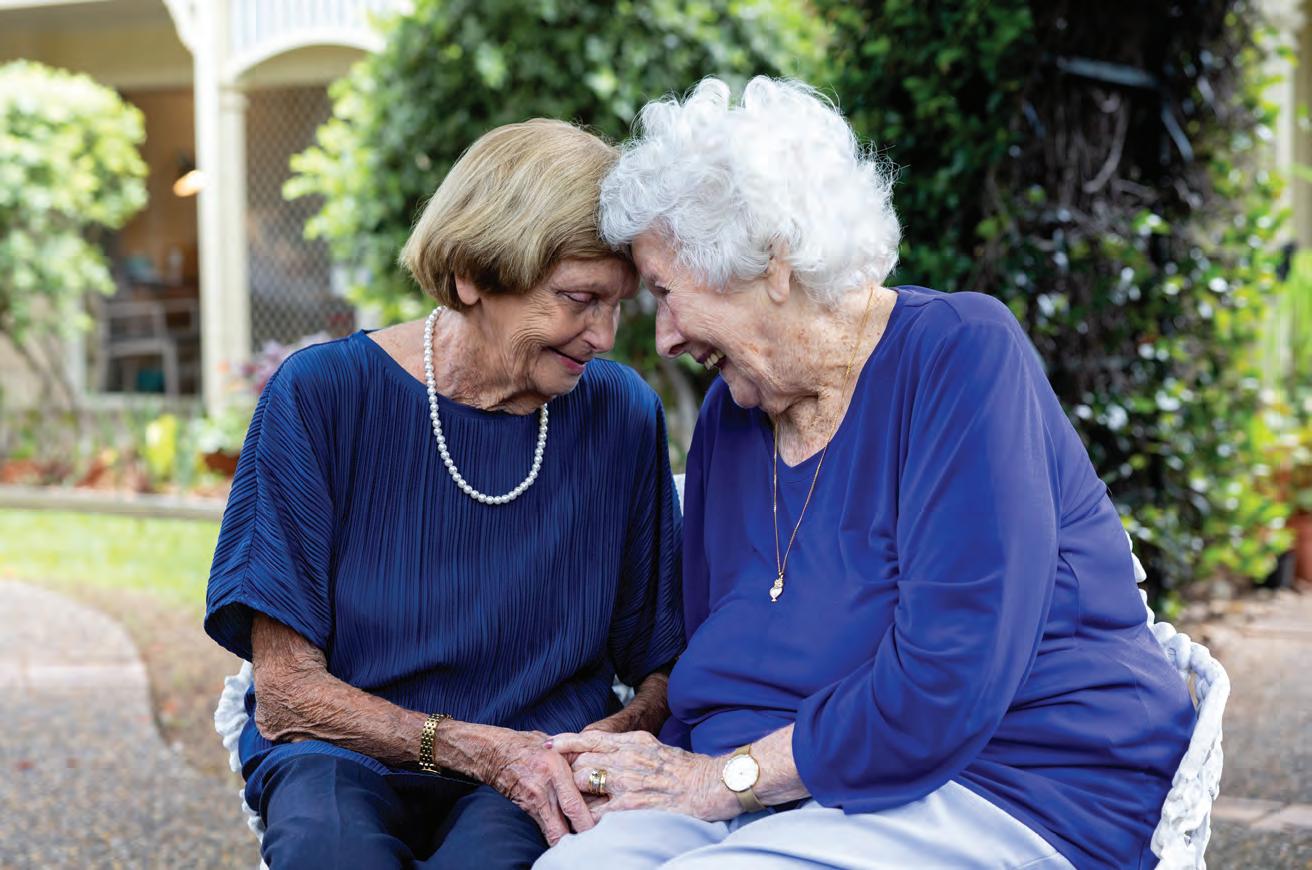
3
Aged Care Guide
QUEENSLAND 2024, 24TH Edition
Printed May 2024
RRP $44, inc GST
Deputy Editor

COTA message
Transparency of information is one of the many key things COTA Australia has advocated on aged care reforms throughout the years. The Royal Commission into the Quality & Safety of Aged Care highlighted so many issues and revealed shocking stories of the experiences people have had. It set Australia on a path of serious and fundamental reform.
Throughout this Council on the Ageing (COTA) Australia has consistently and forcefully advocated for aged care that is of high quality, transparent and based on aged care services that are delivered in a way that upholds older people’s human rights.
The Royal Commission accepted many of these points and we are now seeing the development of a new rights based Aged Care Act, redesign of the support at home system to help more people remain independent in their own homes – where most people want to stay as they age - new transparent information sources like the Star Rating system, more staffing in aged care facilities and better funding for better care.
The job is not yet done. But COTA Australia remains on the case in aged care reform and in many other areas that impact on your life – like health care and employment. Tackling the impacts of ageism head on. Ensuring that older people have the same rights – including access to good information to make their own decisions – without question.
Finding the right aged care service for yourself, or assisting your loved one, is one of the most important things you will ever have to do. Yet it can be hard to find the information you need to help you make this decision.
This Guide can assist you to find and make the right decision. It is an independent resource to make you aware of options available in your local area. You can order a hard copy to browse through and share with families or friends. Alternatively, you may go online at AgedCareGuide.com.au if that’s your preference where you can filter your searches to just those services in a local area and request a quote from the provider you select.
COTA Australia, as the national peak advocacy body for people over 50 years of age, has partnered with DPS because we both value and focus on the need for you to have good information to make choices. More than that though, AgedCareGuide.com.au gives you the opportunity to leave a review of the services – be they provided in the home, in a nursing home or a retirement village. All of us like to hear from our peers or others in the same situation about what is good, bad or indifferent when making decisions. Your experience and feedback provides more invaluable information for another person in their search and decision making.
I hope you will find this guide useful in your decision making and that you will share your experiences to help others in the same situation. And we will continue the work to make aged care services better and uphold your rights in all of their interactions with you.
Wishing you all the best in finding the service that is right for you.
Patricia Sparrow CEO, COTA Australia
David McManus david.mcmanus@dps.com.au
DPS Publishing Pty Ltd ● 1300 186 688 ● PO Box 1026, Pasadena SA 5042 info@dps.com.au ● AgedCareGuide.com.au ● ABN 53 090 793 730 Advertising Distribution Proudly produced sales@dps.com.au distribution@dps.com.au and printed 1300 186 688 1300 186 688 in Australia
The factual material contained in this publication has been obtained from information supplied by government departments, industry and organisations, by personal interview and by telephone and correspondence. At the time of going to press the publisher believed that all information submitted for publication was accurate and complete. However, the publisher can take no responsibility for inaccuracies or incomplete information that may have been supplied to them in the course of their enquiries detailed above. The facts published indicate the result of those enquiries and no warranty as to their accuracy can be given. The information in this publication is general in nature and does not constitute financial, legal or other professional advice. Readers should consider whether the information is appropriate to their needs and seek professional advice tailored to their personal circumstances. Images within this publication may have been altered from their original format. © Copyright. No part of this publication can be used or reproduced in any format without express permission in writing from The Publisher. ® Aged Care Guide is a registered trademark.
COTA message
Aged Car e Guide 4 QUEENSLAND Edition 24 www.AgedCareGuide.com.au
Useful phone numbers and websites
Advocacy
Aged and Disability Advocacy Australia
(ADA Australia)
1800 818 338 adaaustralia.com.au
CarerHelp carerhelp.com.au
Carers Australia
02 6122 9900 carersaustralia.com.au
Carers QLD
1300 747 636 carersqld.com.au
COTA Queensland 07 3316 2999 cotaqld.org.au
Elder Abuse Helpline
1300 651 192 eapu.com.au/helpline
National Seniors
1300 765 050 nationalseniors.com.au
Older Person’s Advocacy Network (OPAN)
1800 700 600 opan.org.au
Seniors Enquiry Line
1300 135 500 seniorsenquiryline.com.au
Cultural
Diversicare (PICAC)
1300 348 377 diversicare.com.au
Ethnic Communities Council of Queensland (ECCQ)
07 3844 9166 eccq.com.au
Federation of Ethnic Communities’ Councils of Australia
02 6282 5755 fecca.org.au
Translating and Interpreting Service
13 14 50 tisnational.gov.au
Government
Aged Care Quality & Safety Commission
1800 951 822 agedcarequality.gov.au
Community Visitors Scheme Qld (Queensland Community Care Network) 07 3062 7426 qccn.org.au
Department of Veterans’ Affairs
1800 838 372 dva.gov.au
My Aged Care
1800 200 422 myagedcare.gov.au
Queensland Government - Home Assist Secure 13 74 68 qld.gov.au/housing/buying-owning home/maintenance-modifications/ maintenance-assistance
Services Australia - Aged Care Line
1800 227 475 servicesaustralia.gov.au/ageing
Services Australia - Carers & Disability 13 27 17 servicesaustralia.gov.au/carers
Government continued
Services Australia - Medicare 13 20 11 servicesaustralia.gov.au/medicare
Services Australia - Older Australians 13 23 00 servicesaustralia.gov.au/ageing
Health
Alzheimer’s Queensland Helpline 1800 639 331 alzheimersonline.org
Arthritis Australia 1800 011 041 arthritisaustralia.com.au
Dementia Australia
1800 100 500 dementia.org.au
Dementia Behaviour Management Advisory
Services (DBMAS)
1800 699 799 dementia.com.au
Dementia Support Australia (DSA) 1800 699 799 dementia.com.au
National Continence Helpline 1800 330 066 continence.org.au
National Dementia Helpline 1800 100 500 dementia.org.au
Seniors Health Card 13 23 00 servicesaustralia.gov.au/ commonwealth-seniors-health-card
Legal
Legal Aid Queensland
1300 651 188 legalaid.qld.gov.au
Office of the Public Advocate (QLD) 07 3738 9513 justice.qld.gov.au/public-advocate Public Trustee (QLD) 1300 360 044 pt.qld.gov.au
Other
Aged Care Guide 1300 186 688 AgedCareGuide.com.au
Carer Gateway 1800 422 737 carergateway.gov.au
LifeTec 1300 543 383 lifetec.org.au
National Relay Service 1800 555 660 nrschat.nrscall.gov.au/nrs/registration NED (National Equipment Database) askned.com.au
Open Arms - Veterans & Families Counselling 1800 011 046 openarms.gov.au
Relationships Australia 1300 364 277 relationships.org.au
Seniors Card (QLD) 13 74 68 qld.gov.au/seniors/ legal-finance-concessions/seniors-card
5 www.AgedCareGuide.com.au
Useful phone numbers and websites
How to use the Aged Care Guide
How to use the Aged Care Guide
The information featured in this 24th edition of the Aged Care Guide Queensland will inform you of several considerations when choosing accommodation and care options.
The information in this Guide will help you understand aged care, in-home and community care options in Australia.
The Aged Care Guide also includes a comprehensive directory of in-home care services (see pages 97–101); Home Care Package providers (see pages 104–113 for Metro Brisbane, 114–120 for Regional QLD); residential aged care homes (see pages 123–137, 138–147) and facilities or services specific to your cultural background (see pages 149–150 for homes, 151–153 for HCPs).
How do I find what I’m looking for?
There are a number of ways you can use the Aged Care Guide in order to find aged care homes, Home Care Packages, products or services.
The index on page 184 can help you to find the main information topics in the book and can direct you to the different directory tables for aged care homes, in-home care options or products/services in the back of the Guide.
Each council district (also known as a local government area or LGA) on the referenced page includes a list of suburbs with homes or villages in each suburb listed in alphabetical order.
Locality search: If you know the council district, suburb or town, then use the cross-reference index on page 94. Each of these lists are in alphabetical order and you can then refer to the page referenced.
Cultural search: If you are of non-English speaking background or prefer to find a home or service specific to your cultural needs, refer to the multicultural listings on pages 149 –153.
Searching for other services . . .
If you are looking for centre-based care, day therapy centres or other products and services, you can find this in the directory section from page 148 onwards.
Visit AgedCareGuide.com.au for a complete list of services available near you


/ TalkingAgedCare @TalkingAgedCare Queensland AGED CARE GUIDE Home Care Residential Care 24 EDITION MANAGING YOUR SERVICES PREPARATION GETTING ASSESSED FINDING PROVIDERS RESEARCH Aged Care Guide Cultural Aged Care Home African Bupa Ives St Ives 1800 718 348 21922 Belmore Place Care Community Arabic Canterbury Place Care CommunityCampsie 1300 842 924 14266 Gallipoli Home Arabic Hixson Garden Aged Care Bankstown Maronite Sisters Village Dulwich HillDulwich Hill ACDMA Aged Hostel Canley Vale Ferndale Gardens Aged Care FacilityMortdale George Aged Care Centre Bexley Bilyara Hostel ATSI Brewarrina Multi Purpose ServiceBrewarrina 6830 5000 18847 Cooee Lodge Hostel Gilgandra ATSI Jerilderie Multi Purpose Service Jerilderie 03 5886 6700 14330 Mareeba Aged Care ATSI Sapphire Coast Community Aged CareBega 6492 7777 13257 Andrew's Village ATSI Whiddon Bourke Bourke Abel Tasman Village Annandale Grove Care CommunityAnnandale Ash eld Terrace Care Community Cultural Aged Care Home CALD Aurrum Aged Care Erina Erina 0417 335 622 13823 Aurrum Aged Care Norah HeadNorah Head CALD Aurrum Wyoming Wyoming 0417 335 622 13851 Bankstown Terrace Care CommunityBankstown CALD Belmore Place Care Community Lakemba Berkeley Vale Care Community Berkeley Vale Bossley Parkside Care CommunityBossley Park Denhams Beach Care Community Denhams Beach Hixson Garden Aged Care CALD KOPWA Ltd Roseville 9412 0284 13524 Maitland Grange Care CommunityRutherford CALD Meadowbank Grove Care CommunityWest Ryde 1300 842 924 14293 Murwillumbah Greens Care Community Murwillumbah CALD Narrandera Homestead Care Com'tyNarrandera 1300 842 924 13896 Narraweena Grove Care CommunityNarraweena CALD Orange Grove Care Community Orange Raymond Terrace Gardens Care Com'ty Raymond Terrace Rocky Point Residence Beverley Park Culturally Appropriate Aged Care Homes Table of aged care homes/residential care facilities offering culturally appropriate services The following table guide only. The information should not be interpreted that these homes are exclusive to the noted cultural group nor Aged Care Guide Index Aged care explained Aged care homes 63 Accommodation payments Charter of rights Complaints Assistive technology 56 Care communities 107 Carer support Case management Directory listings Consumer Directed Care Continence 54 Costs residential care 68 Counselling services Directory listings Culturally and Linguistically Diverse (CALD) Daily Accommodation Payment (DAP) De nition often used terms Extra services listings Home Care Packages listings 211-227 home care provider listings Local Government Area (LGA) reference index Maps Organisation and Business index Products and services listings Direcory listings 204 FAQ's Expert advice Financial counselling Financially disadvantaged Home Care Agreement How much you will pay Priority Quality and complaints Services provided Types packages How use the Aged Care Guide PICAC Placement consultants 117 Choosing placement consultant Resolving family disputes Products and services listings RAD and DAP explained Restorative care Retirement living 109 Choosing village Departure/exit fee Deposit entry contribution Directory listings Finding the right village Support home Support groups 134 Support lines 135 Supported living Directory listings Technology Call 1300 186 688 or email sales@dps.com.au YOUR DPS SALES TEAM Ed David
Aged Care Guide Local Government Areas (State Maps) This map provides you with a geographical reference to the LGA areas Queensland. Regional
Aged Car e Guide 6 QUEENSLAND Edition 24 www.AgedCareGuide.com.au










7 www.AgedCareGuide.com.au
Arundel | Bardon | Boondall | Carina | Carseldine | Corinda | Enoggera | Gympie | Kangaroo Point | Maroochydore | Mitchelton | Southport | Toowoomba | Townsville
Research

8 Research QUEENSLAND Edition 24 www.AgedCareGuide.com.au
WHAT YOU NEED TO KNOW Research overview
Accessing aged care can be complicated and confusing if you have not used support services before or don’t know where to start.
Whether you need support to remain living independently at home or are looking for alternative accommodation, it is important to know what options are available to you. Different types of care include:
Support at home
Different care options that might be available to you include support at home through government-funded programs such as the Commonwealth Home Support Programme (CHSP) or the Home Care Packages (HCP) program.
Home care products and services range from assistance with daily chores and personal care to providing meals, transport assistance, and home maintenance.
STEP 1
‘That’s
Jess. She helps me with cleaning and odd jobs around the house.’
We know it’s important to our aged care clients to have regular and familiar support workers. And that’s why we will provide a team you know you can rely on. Home care packages – Care for you, designed by you.
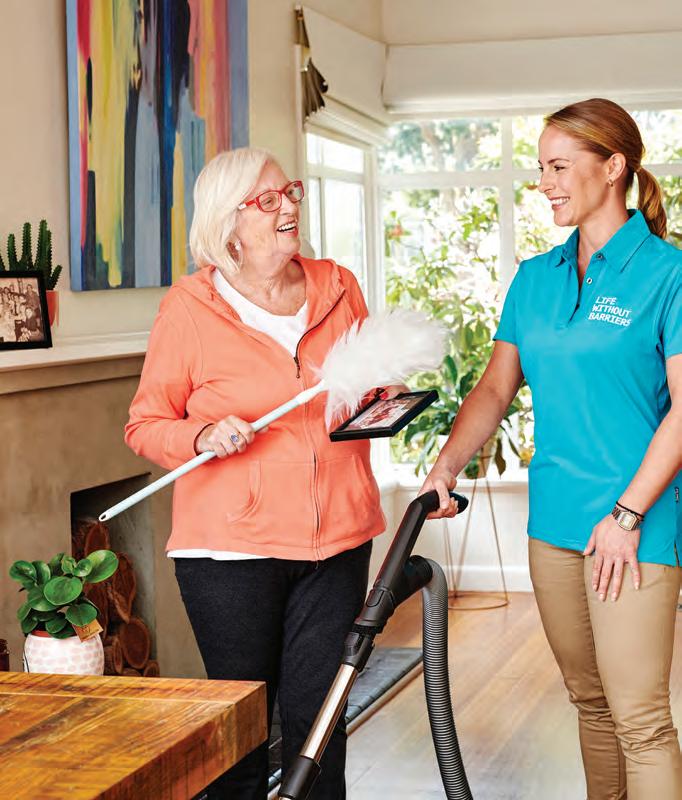
Research
To tailor a home care package, call 1800 792 359 or email agedcareenquiries@lwb.org.au AC-180x130mm-Tailored Home Care Package.indd 1 5/12/2022 3:51 pm 9 Research QUEENSLAND Edition 24 www.AgedCareGuide.com.au
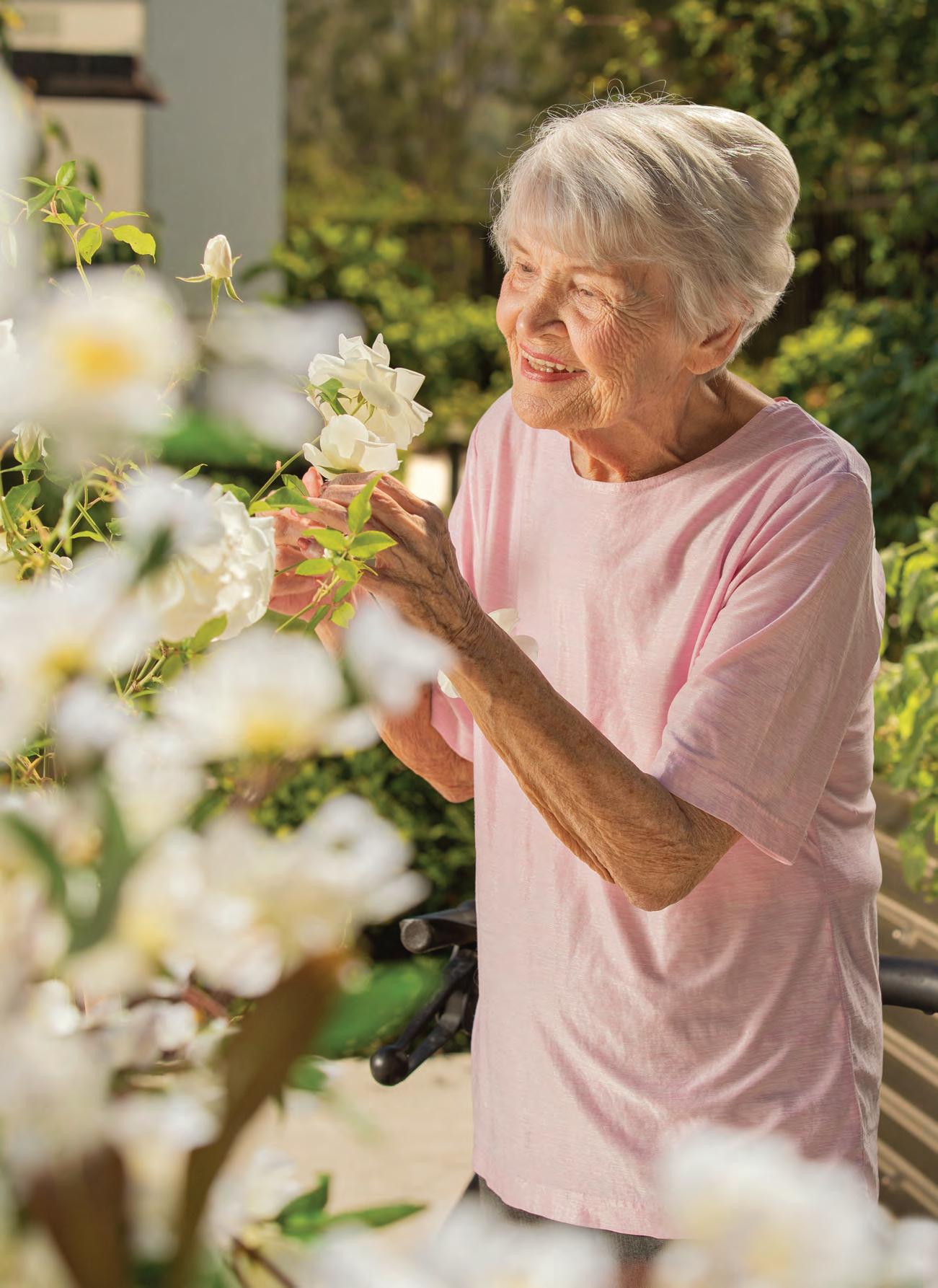
Living with purpose At Carinity “living with purpose” goes beyond just physical care or support. From retirement living to home care or residential aged care, our vibrant communities provide opportunities to connect and achieve a true sense of belonging. Carinity. Living with purpose. AC031-0524 Retirement Living Home Care Residential Aged Care Respite Care Call us today on 1300 109 109 or visit carinity.org.au learn more 10
Basic assistance is offered through the CHSP but if your needs exceed the level of support offered though this program, then a level 1– 4 Home Care Package can offer higher intensity support to help you stay at home.
Private providers can also deliver a range of home support services. They are not government funded and you will need to pay for services out of your own pocket.
Short-term care
There are a few different support options available if you only need support for a short period of time. These options include respite care, which can be delivered in the community or in a residential care home, offering the opportunity for both you and your carer to take a short break.
At the end of a hospital stay, the Transition Care Program provides short-term assistance to help improve your independence and confidence.
If you have not been admitted to hospital, the Short-Term Restorative Care program is a flexible option that focuses on regaining wellbeing over a short period of time.
Residential aged care
Moving into residential aged care can ensure quality of life and comfort if you are no longer able to remain living independently at home. Residential aged care facilities, also known as ‘nursing’ or ‘aged care homes,’ provide 24/7 care as well as a range of other support services and recreational activities. The cost of care in most Australian aged care homes is subsidised by the Australian Government.
There are also a number of non-government-funded residential aged care homes, often referred to as ‘supported and assisted living complexes’ and you will need to cover all the cost of accommodation and care delivered.
Retirement living
Retirement villages are not nursing homes. They are clusters of villas, units or apartments and you will need a reasonable level of independence to move into a retirement setting. Retirement options are not funded by the government.
Daily care is generally not included but some providers may offer support services at an additional charge or this can be accessed separately through government-funded home support options.
Research
11 Research QUEENSLAND Edition 24 www.AgedCareGuide.com.au
My Aged Care
Getting started
Before you can access government-subsidised aged care supports, such as in-home care, community supports or moving into a nursing home, you need to register with My Aged Care and be assessed to work out exactly what level of support you need.
My Aged Care
My Aged Care is the agency that looks after every governmentfunded aged care program. The service can help you find information about subsidised aged care options, including the different types of government-funded services available, eligibility for those services and the associated costs.
You, a family member, carer or client representative can register your details with My Aged Care so that you can be assessed to access any government-subsidised services.
When you first call the My Aged Care Contact Centre on 1800 200 422, an operator will register you and ask you a number of questions about your personal circumstances and care needs.
These questions will be quite basic and shouldn’t take too long. All you will need when you call is your Medicare card, as this information is stored with your other details on the My Aged Care database.
Examples of the questions you will be asked are:
Are you currently receiving aged care services?
Are you getting support from a carer or family member?
Can you prepare your own meals and do housework?
Do you need assistance taking a shower or bath and do you need help getting dressed?
Are there any health concerns or did you have a recent fall?
Do you feel lonely or isolated?
Are there any safety risks in the home?
The aim of this screening is to figure out what needs and support you require and whether you are eligible for a further assessment in person.
My Aged Care will assign you an aged care client number and will open a central client record. This record will include the information you have provided, as well as document your assessed needs and any government-funded care services you have been found eligible for.
Aged care assessments
If you are successful in your initial application with My Aged Care, the contact centre operator will refer you for an aged care assessment to determine what level of support you would benefit from the most.
If the operator decides that you are eligible for basic home support through the Commonwealth Home Support Programme (CHSP) you will be assessed by a Regional Assessment Service (RAS).
12 Research QUEENSLAND Edition 24 www.AgedCareGuide.com.au

Are you or a loved one seeking the epitome of care and support in a serene retirement setting? Look no further than Roshana Aged Care and Retirement Living at Bellevue and Parklands. Every day holds the promise of new experiences. Our care model is designed to cater to your needs while fostering independence and social engagement, creating a nurturing environment that feels like home.
Experience unparalleled quality of care and support with Roshana Aged Care and Retirement Living.
An opportunity to embark on a fulfilling journey of care with Roshana Aged Care and Retirement Living.
Secure your spot today and experience the difference that exceptional care and a supportive community can make in your life.
• Residential Aged Care
• Palliative Care
• Allied Health
• 24/7 Care Services
• Media & Chapel Rooms
• Hair Salon
• Activity Rooms

Parklands
74 Emerald Park Way, Urangan QLD 4655 parklands.reception@roshana.com.au
(07) 4184 1300
53 Linkwood Dr, Ferny Hills QLD 4055 bellevue@bellevuecare.com.au (07) 3550 5999
Call to book a tour
Your Life, Your Way. Every Minute, Every Day.
roshana.com.au
Bellevue
HEALTHCARE SERVICES
LIFESTYLE SERVICES
13

Otherwise, if the operator believes you require higher care support, either through a Home Care Package (HCP) or moving into an aged care home, a member of an Aged Care Assessment Team (ACAT) will visit you to assess you.
Regional Assessment Service (RAS)
To access basic government-funded home support under the Commonwealth Home Support Programme (CHSP), you need to be assessed by the Regional Assessment Service (RAS). For more information about CHSP, go to page 22.
The RAS assessment helps to identify your needs for support and any goals for retaining or regaining skills that enable you to continue living independently in the community. It is conducted free of charge and independently from service provision which ensures assessors consider the full range of options when responding to you and your carers’ needs and goals.
Some of these needs may include assistive technology, therapeutic interventions, community care services or other support organisations. RAS assessors liaise with other service providers, GPs/specialists and community support networks to make sure desired outcomes are achieved. If your care needs have increased, the RAS can also plan and coordinate an exit from the CHSP and transfer you to other appropriate service systems, including Home Care Packages and/or residential care, if required.
My Aged Care
The service also provides care coordination if you have multiple providers or more complex needs.
Aged Care Assessment Team (ACAT)
If you are no longer able to manage at home without basic assistance, the Aged Care Assessment Team (ACAT) helps you and your carers determine what kind of care will best meet your needs.
This may be a Home Care Package (see page 26) provided to you in your own home or residential care in an aged care home (see page 51).
ACAT assessors are generally professionals with medical backgrounds, such as doctors, nurses, social workers, occupational therapists and other health experts.
There is no charge for the assessment as the ACAT is government funded. Carers, relatives or close friends are encouraged to be involved in the discussion of your needs.
While an ACAT can’t make recommendations about individual homes or community services, they can provide you with information to assist you to make decisions.
To assist you in your search, an independent information source like the Aged Care Guide publications and the linked AgedCareGuide.com.au website can help. These resources give a comprehensive overview of all care options and care providers available.
14 Research QUEENSLAND Edition 24 www.AgedCareGuide.com.au
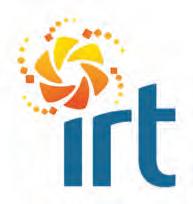
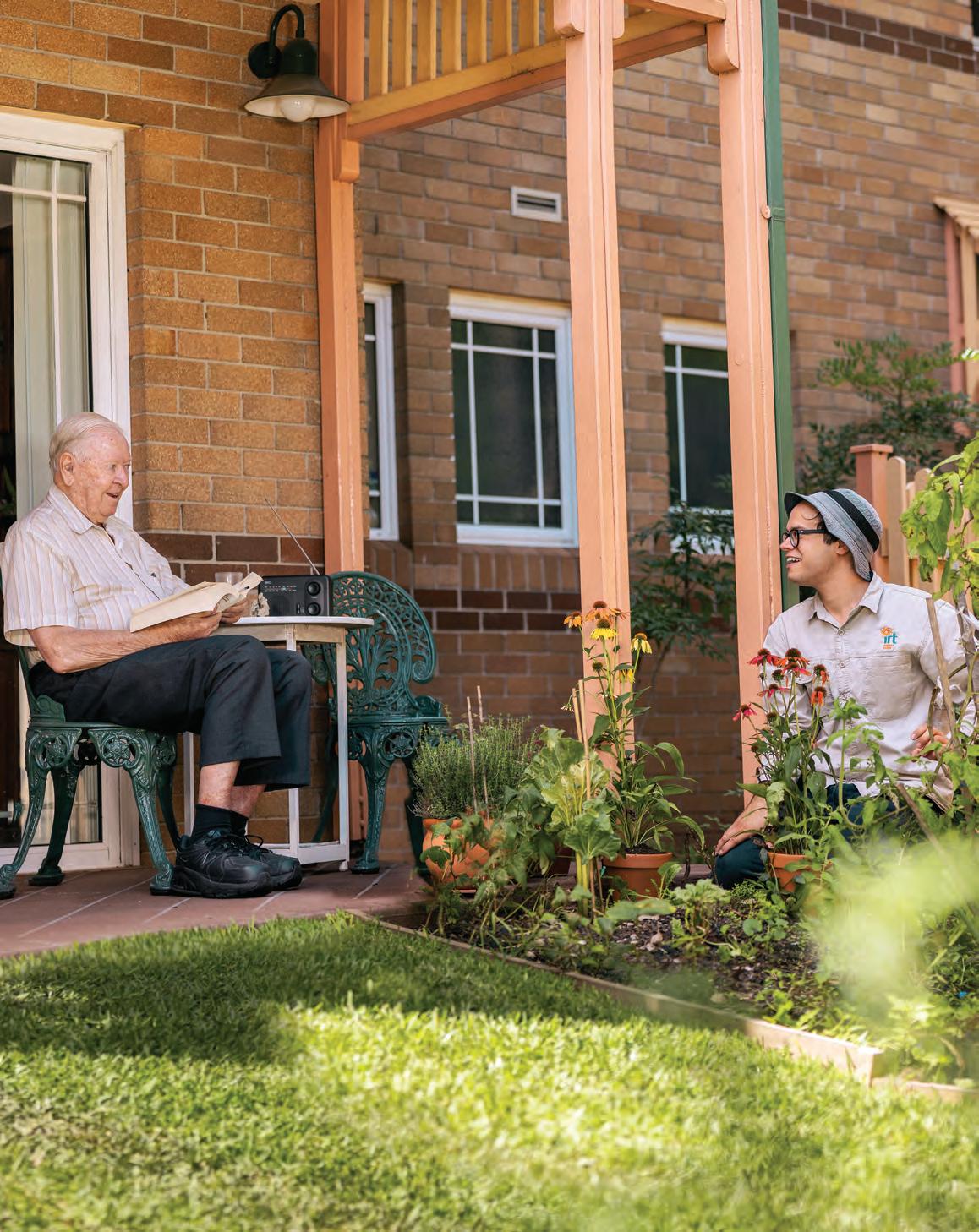
Retirement Villages Aged Care Centres Home Care 15
You may be placed on a
list until a
Home care f low chart
At anytime
You can find someone to help you:
Placement consultant
Aged care advisor
Social worker
Case manager
Hospital discharge planner
These professionals know the system really well and their help can make your search much easier.
Other useful people:
Financial advisor
Health fund
Veterans' Affairs
Local council
SHOPPING RESPITE SUPERVISION HOME MAINTENANCE TRANSPORT MEDICATION SHOWER CENTRE BASED CARE
Find a provider ACAT Aged Care Assessment Team CHSP Commonwealth Home Support Programme HCP Home Care Packages RAS Regional Assessment Service Select any provider
package becomes available
waiting
government subsidised care self-funded home care OR Your family or carer You Case manager, advisor or placement consultant OR CHSP Entry level HCP 1, 2, 3, 4 More complex care ACAT RAS Contact My Aged Care 1800 200 422 WOUND CARE DRESSING PERSONAL HYGIENE DAY THERAPY CARE MEALS TRANSITION CARE ALLIED HEALTH Consult your Aged Care
for a list of choices for any of these options or visit AgedCareGuide.com.au In urgent cases, you may be able to access care before a RAS assessment Choose your preferred approved provider
16
Guide
AGED CARE GUIDE
If your situation is urgent then the ACAT will assess you as quickly as possible
Residential care
f low chart
Remember: it takes anything from a few weeks up to more than a few months to find the care home that suits you
At anytime!
You can find someone to help you:
Placement consultant
Aged care advisor
Social worker
Case manager
Hospital discharge planner
Consult your Aged Care Guide for a list of choices for any of these options or visit AgedCareGuide.com.au
These professionals know the system really well and their help can make your search much easier.
Other useful people:
Financial advisor
Health fund
Veterans’ Affairs
Local council
government subsidised home self-funded aged care home OR Self-funded supported accommodation Eligible for subsidised residential aged care Recommend Home Care Packages Contact My Aged Care 1800 200 422
ACAT Aged Care Assessment Team
Your family or carer You Case manager, advisor or placement consultant OR
ACAT • RESIDENTIAL AGED CARE FACILITY • NURSING HOME • CARE HOME • RETIREMENT LIVING WITH IN-HOME SUPPORT • SU PPORTED RESIDENTIAL SERVICES • SU PPORTED ACCOMMODATION • CARE COMMUNITIES
GUIDE 17
AGED CARE
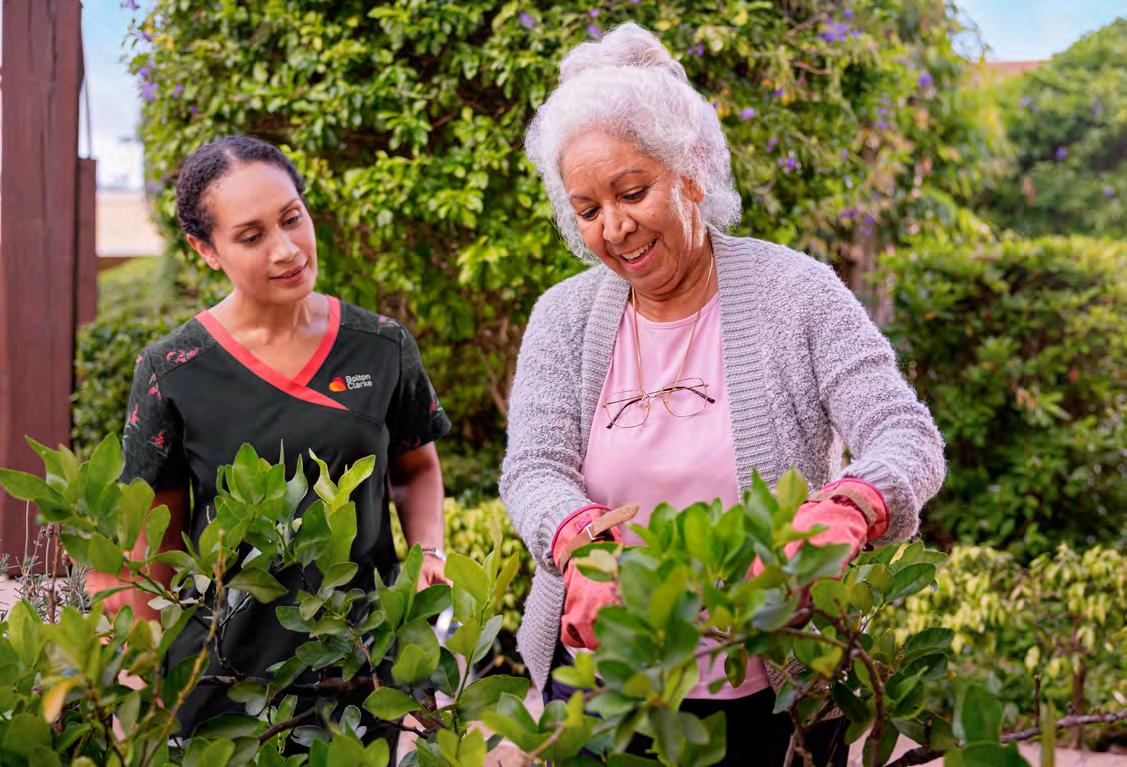
Genuine care bringing positivity to life
Feel the warmth of personalised care, share moments with friends and family, and enjoy a vibrant lifestyle doing things that are meaningful to you.
That’s what you can expect at every one of our Residential Aged Care homes. Bolton Clarke has purposefully designed homes located across Queensland. Each offers a wide variety of choice, quality care, and fulfilling experiences that support your health and happiness.
Where to find us
Baycrest
07 4303 2000
99 Doolong Road, Pialba QLD 4655
Bribie Cove
07 3400 1000
199-213 Goodwin Drive, Bongaree QLD 4507
Buderim Views
07 5477 9100
383 Mooloolaba Road, Buderim QLD 4556
Capella Bay 07 3119 3100
260 Old Cleveland Road East, Capalaba QLD 4157
Carrington 07 3711 1100 16 Blairmount Street, Parkinson QLD 4115
Cazna Gardens 07 3845 0000 465 Hellawell Road, Sunnybank Hills QLD 4109
A TOUR TODAY
18
Centaur
07 5390 0000
21 West Terrace, Caloundra QLD 4551
Chelsea
07 4121 9400
110 Tooley Street, Maryborough QLD 4650
Cunningham Villas
07 4791 3999
1a Tollington Road, Bowen QLD 4805
Fairview
07 3335 5500
2603 Moggill Road, Pinjarra Hills QLD 4069
Fairways
07 4131 6400
59 Hanbury Street, Bundaberg North QLD 4670
Farnorha
07 4052 9900
257-281 Lyons Street, Westcourt QLD 4870
Fernhill
07 5490 6300
103 King Street, Caboolture QLD 4510
Galleon Gardens
07 5507 8300
126-138 Galleon Way, Currumbin Waters QLD 4223
Glasshouse Views
07 5439 2400
96 Peachester Road, Beerwah QLD 4519
Glendale
07 4726 3500
435 Dalrymple Road, Mt Louisa QLD 4814
Inverpine
07 3490 3100
54 Ogg Road, Murrumba Downs QLD 4503
Keperra Sanctuary
07 3355 5599
998 Samford Road, Keperra QLD 4054
Milford Grange
07 3817 0400
32 Grange Road, Eastern Heights QLD 4305
Moreton Shores
07 3286 8600
91-101 King Street, Thornlands QLD 4164
Pioneers
07 4658 4900
1 Sparrow Street, Longreach QLD 4730
Rowes Bay
07 4750 3700
9 Havana Street, Rowes Bay QLD 4810
SandBrook
07 5587 8000
10 Executive Drive, Burleigh Waters QLD 4220
Seabrook
07 3817 7300
15-29 Bonton Avenue, Deception Bay QLD 4508
Seaton Place
07 3050 9100
111 Smith Street, Cleveland QLD 4163
Sunset Ridge
07 4925 4000
44 Svendsen Road, Zilzie QLD 4710
Talbarra
07 3489 1000
130-150 Old Logan Village Road, Waterford QLD 4133
Tantula Rise
07 5430 1400
96 Tantula Road West, Alexandra Headland QLD 4572
The Ormsby
07 5376 3700
112 Burnett Street, Buderim QLD 4556
The Terraces
07 5592 7300
74 University Drive, Varsity Lakes QLD 4227
Villa Serena
07 5665 5999
2 Easthill Drive, Robina QLD 4226
Westhaven
07 4614 4800
55 Arabian Street, Harristown QLD 4350

1300 22 11 22

boltonclarke.com.au 19
Support at home Support at home
To help you live independently in your own home and community for as long as possible, there are many home care products and services available.
Depending on your personal situation and the level of assistance you require, you may be entitled to some basic in-home support or more intensive support through a Home Care Package.
After a hospital stay, the Transition Care Program might be able to assist in your recovery and to return home. Alternatively, you may need to access respite care to give your carer a short break from the caring role.
There is a variety of support at home options available that can meet your specific needs.
In-home support
The government prioritises your care needs to help you live comfortably in your own home.
Home care products and services range from assistance with daily chores to personal care, providing meals, transport assistance, as well as equipment, such as a ramp, walking frame or shower rail to help you live independently in your own home.
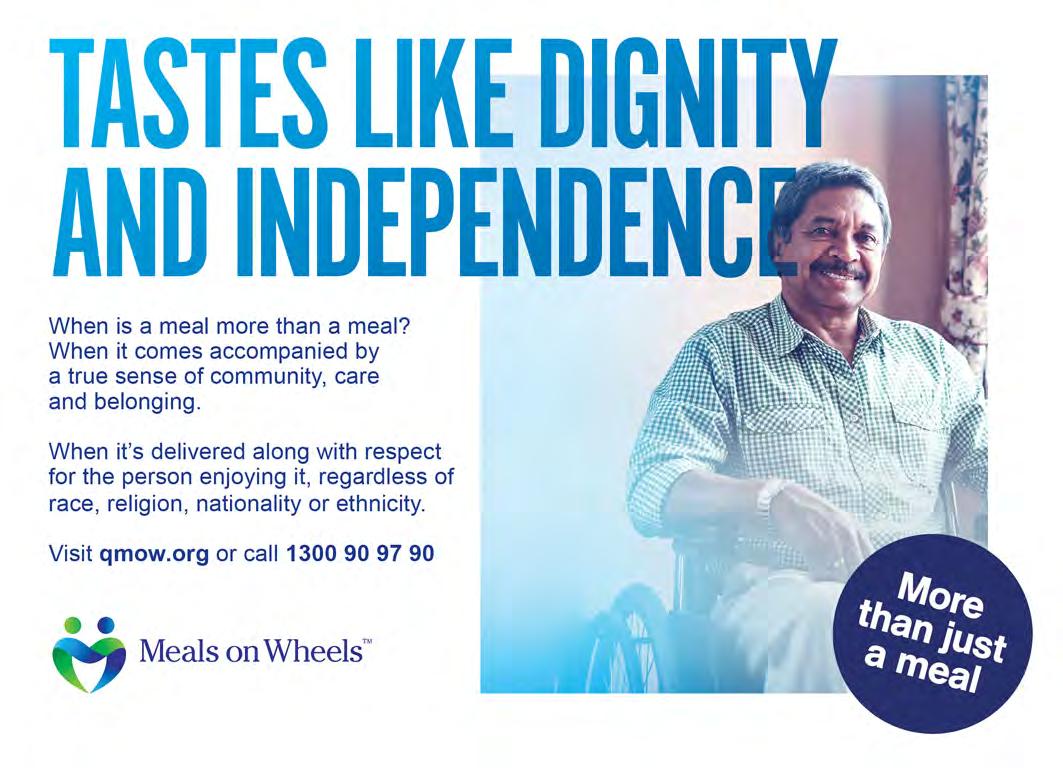
20 Research QUEENSLAND Edition 24 www.AgedCareGuide.com.au
Come home to Calvary.
TOP LEVEL SERVICE ICONS SINGLE - WITH WORDS

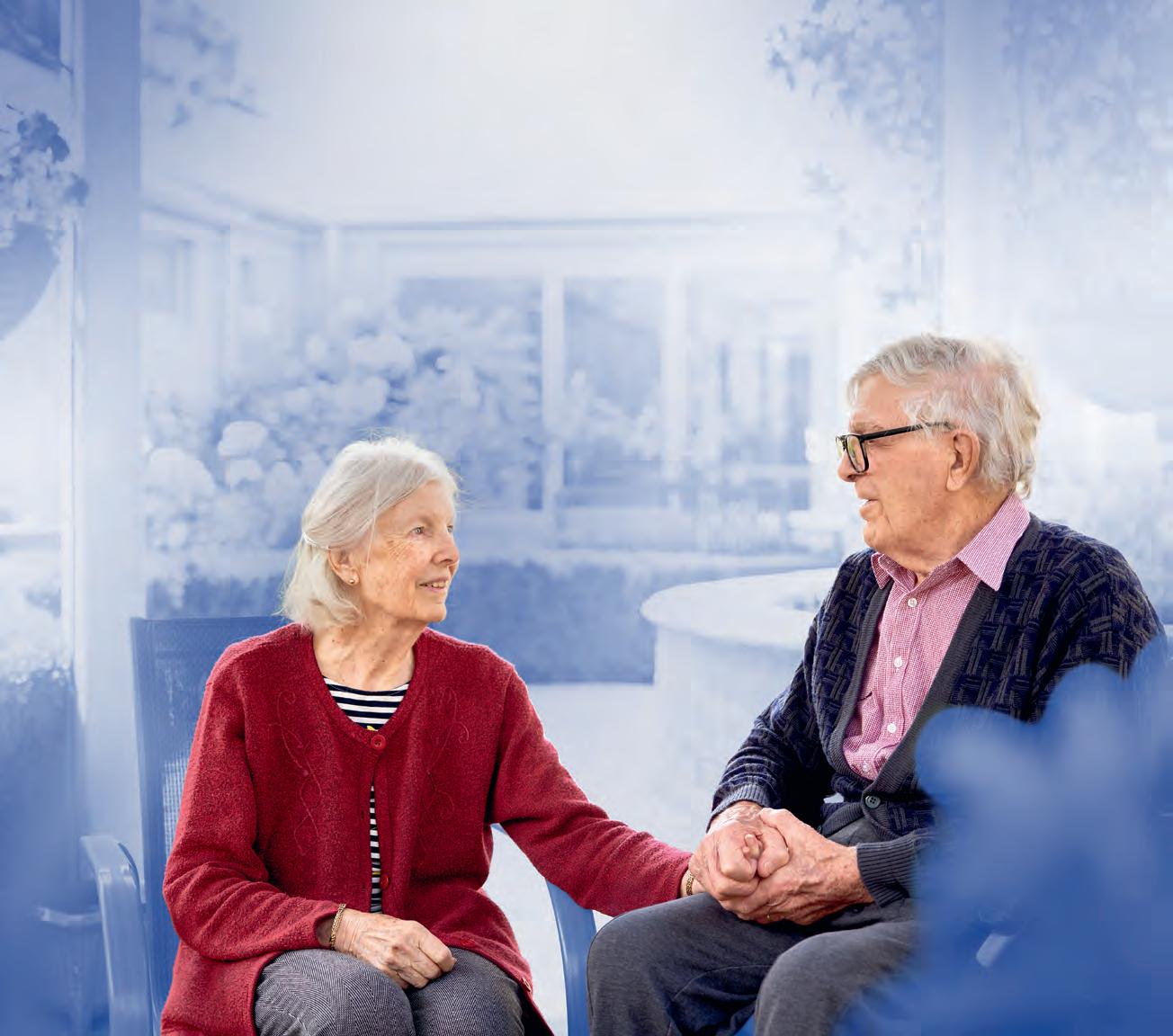
Guided by Calvary’s 135 year history in health care, you will have peace of mind with access to quality care.
Calvary is recognised as a continuing source of healing, hope and nurturing to the people we serve. Our personalised approach ensures every person receives the attention and care that they need. All of our care is delivered with dignity and is designed to improve your health and wellbeing.
ENQUIRE TODAY TO FIND OUT MORE 1800 52 72 72 | calvarycare.org.au
21
Support at home
The government continues to significantly increase support for home and community-based aged care with particular integrated packages available. Private businesses also offer home care services.
Consumer-directed care
Consumer-directed care (CDC) gives you and your carers greater say about the types of care services you receive and the delivery of those services.
All Home Care Packages are delivered on a CDC basis and the funding for a package is allocated directly to you instead of to the provider.
Providers are required to work in partnership with you to create a package of services that meets your goals and needs, and gives you the information you require.
This information should assist in choosing the best provider for you, as well as changing providers if you need.
CDC allows you to determine how much involvement you wish to have when managing your package. It also allows for more transparency around how your package is funded and spent.
All home care services you receive should include ongoing monitoring and reviews from the provider to make sure your package is meeting your needs.
Commonwealth Home Support Programme (CHSP)
If you want to stay in your own home, but need some help with daily tasks or require entry-level care, the CHSP may be able to help.
The CHSP combines a number of home support options into one streamlined and simplified program. These options include short-term supports, such as respite, transition care and short-term restorative care. It also provides basic ongoing support both at home and in the community, as well as access to wellness programs, day options and centre-based services.
To determine if the CHSP is the right program for you, you will need to be assessed by a Regional Assessment Service (RAS). See page 83 for more information.
If you have more complex needs, a Home Care Package may be a better option. You can access similar services to the CHSP, coordinated and tailored to meet your specific needs (see page 26 for more details).
Contact My Aged Care on 1800 200 422 to find out how you can arrange a home support assessment.
CHSP
22 Research QUEENSLAND Edition 24 www.AgedCareGuide.com.au
What is the CHSP?
Subsidised by the Australian Government, the CHSP is an entry-level home help program if you are mostly — but not completely — able to live on your own and don’t need higher levels of support at home.
The program can also help your carer. If your carer needs to attend to everyday activities, the CHSP can arrange for someone to help you while they are away.
What types of services are provided?
CHSP services provided in the community may include: social support — social activities in a community-based group setting; transport — help to get out and about for shopping or appointments;
Services provided at home may include: domestic assistance — household jobs such as cleaning, clothes washing and ironing;
personal care — help with bathing, showering, dressing or toileting; home maintenance — minor general repair and care of your house or yard, for example, changing light bulbs or replacing tap washers; home modification — minor installation of safety aids, such as alarms, ramps and support rails in your home;
nursing care — a qualified nurse comes to your home and may, for example, dress a wound or provide continence advice.
Some CHSP services can be provided either at a community centre or in your home, such as:
food services — may include providing meals at a community centre, help with shopping for food, preparing and storing food in your home and delivering meals to your home;
allied health support services — If you have particular health problems you may be able to access allied health services, such as physiotherapy, podiatry, speech therapy, occupational therapy and advice from a dietitian.
Who is the CHSP for?
You can apply for home help services under the CHSP if you are 65 years or older, or 50 years or older and identify as an Aboriginal and/or Torres Strait Islander person, are still living at home and need help to continue living independently.
You or your carer should contact the My Aged Care contact centre on 1800 200 422 or visit myagedcare.gov.au to apply.
Commonwealth Home Support Programme
23 Research QUEENSLAND Edition 24 www.AgedCareGuide.com.au













New South Wales
Illawarra 02 4244 3470
Liverpool 0479 070 119 Central Coast 02 4326 9030
Queensland Cairns 0458 720 217
Western Australia
Lower North Perth 08 9371 9115
South East Perth 0416 205 819



ANY AGE. ANY PLACE. SIMPLY HELPING YOU. Victoria
Bayside
Melbourne
& Peninsula 03 9574 0924 Inner & South Eastern Central & Northern Melb. 03 9661 0499 North East 03 9001 8585 Outer South Eastern 0406 316 334 Regional Cntrl Hghlnds & Djerriwarrh 03 5341 8046 Geelong & Barwon 03 5261 4808 Gippsland South & West 03 9799 4676 Goulburn Valley 03 5795 1635 Loddon Mallee 03 5486 0203 South West 03 5381 2076
24 Research QUEENSLAND Edition 24 www.AgedCareGuide.com.au
Am I eligible?
To determine exactly what help you need at home, you will need a home support assessment. The assessment will be done by a representative of the Regional Assessment Service (RAS).
A local RAS assessor will look at your ability to cope with various activities in your daily living.
For more information about assessments, go to page 83.
Urgent needs
If you’re in a situation where you have an urgent need for home support services and your safety would be at risk if those needs are not immediately met, it may be possible to receive CHSP services before you have been assessed by a RAS.
This only happens in exceptional circumstances and is only for a limited time until an assessment can be organised to determine long-term care options.
Services generally considered to relieve an urgent need for care include nursing, personal care, meals and transport.
It will depend on your personal circumstances whether you’ll be able to receive interim services before an assessment. Call the My Aged Care contact centre on 1800 200 422 to find out more.
Who pays for CHSP services?
Supports delivered under CHSP are subsidised by the government, however, there generally is still a fee for each service.
You are encouraged to contribute towards the cost of your care if you are able to do so.
The amount you contribute depends on the type and number of services you require and can differ from one service provider to the next.
Some organisations may charge a set fee for their services, while others may ask for a voluntary donation, charge a membership or subscription fee.
How much you pay is discussed and agreed upon between you and your service provider. The rate is set before you begin receiving the relevant services.
If you are receiving multiple services from one or more service providers and these services overlap, it may be possible to ‘bundle’ the cost for these services.
To find out specific costs you should contact your service provider.
Pre-1 July 2015 HACC, NRCP, DTC and ACHA clients
If you accessed Home and Community Care (HACC), National Respite for Carers Programme (NRCP), day therapy centres (DTC) or Assistance with Care and Housing for the Aged (ACHA) prior to 1 July 2015, you may retain access to these services or equivalent CHSP services until other suitable services become available, or until the service is no longer required.
You can find CHSP-funded services starting on page 97 of the directory section or online on AgedCareGuide.com.au.
Commonwealth Home Support Programme
25 Research QUEENSLAND Edition 24 www.AgedCareGuide.com.au
Home Care Packages
Home Care Packages
A Home Care Package (HCP) provides services that will help you to remain at home for as long as possible, as well as giving you choice and flexibility in the way that the care and support is provided.
There are four different levels of packages to support people with varying care needs, ranging from Level 1 support, if you have basic care needs, to Level 4, which can support you if you have high-level care needs.
The HCP is allocated to you personally, which gives you more control over the services you receive and who delivers those services.
Once you have been allocated a HCP you can contact any preferred approved service provider to give you the care you need.
Types of packages available
There are four types of packages delivering different levels of care:
1 Level 1 supports people with basic care needs
2 Level 2 supports people with low-level care needs
3 Level 3 supports people with intermediate care needs
4 Level 4 supports people with high-level care needs
The same type of care and services are provided under each HCP level, however, the amount of funding is different depending on what package is allocated to you.
The hours of care are increased at each level of care; more hours of care and services are delivered under Home Care Package Level 4 compared to Level 1.
The ACAT assesses the types of care needs you may require. Someone eligible for Levels 3 and 4 HCPs would be eligible for higher levels of residential care if they were to apply for it.
If you are receiving care services through the previous Community Aged Care Package, Extended Aged Care at Home or Extended Aged Care at Home Dementia packages, you will continue to receive these services, but they will have a different name.
Package supplements
Package supplements are available with any of the four levels of Home Care Packages to help with the cost of meeting specific care needs. For example, the Z Dementia Supplement is for people with dementia and the R Veterans’ Supplement for veterans with an accepted mental health condition.
Some packages can be specifically for people who are e financially or socially disadvantaged, people with Y housing needs or at risk of homelessness or for people who live in t rural, remote or isolated areas. Some providers might cater for people with a certain g cultural background or have staff that speak a foreign language.
Your care provider will apply for these subsidies and ensure you meet the eligibility criteria.
For Metro HCP providers, see 106–113; for Regional QLD, see 114–120.
???
26 Research QUEENSLAND Edition 24 www.AgedCareGuide.com.au

Look No Further!
We’re your local provider, we value your independence and strive to ensure you continue to enjoy the comforts of your own space. Let us support your journey.
• Approved Home Care Package Provider level 1, 2, 3, 4
• No Basic Daily Fee
• No Sign-Up Fee, No Exit Fee
• Reliable, flexible, friendly staff
• Services include shopping, transport, domestic and personal care, etc.
• Additional offerings such as gardening, physiotherapy, podiatry, home modification, etc.
1300 434 159 info@amazingprocare.com.au www.amazingprocare.com.au Are
searching for
leading
Care Package provider?
you
the
Home
We care about you!
27
Home Care Packages
What services are provided?
Home Care Package services are based on your individual needs. Your provider coordinates the care and services to support you at home and these are agreed between you and your provider. Services may include:
Personal assistance with bathing or showering, personal hygiene and grooming, dressing, toileting and mobility
Assistance with communication, including assistance to address difficulties arising from impaired hearing, sight, speech or lack of shared language. This can also include assistance with the fitting of sensory communication aids, checking hearing aid batteries and assistance in using the telephone
Domestic assistance for household jobs like cleaning, clothes washing and ironing
Food services, such as preparing meals or having meals delivered, assistance with using eating utensils and assistance with actual feeding and providing enteral feeding formula
Nursing services, including dressing wounds by providing bandages, dressings and skin creams, as well as continence management and assistance in using continence aids and appliances
Assistance in taking your medications
Providing mobility equipment, such as crutches, walking frames, wheelchairs and mechanical devices for lifting, bed rails, slide sheets and pressure-relieving mattresses, along with help using those aids
Home maintenance for care of your house or garden
Modifications to the home — installing safety aids, such as alarms, ramps and support rails; identifying risks in the house and proposing solutions
Transport and assistance for appointments or social activities
Encouragement to take part in social and community activities that promote and protect your lifestyle, interests and wellbeing
Services / items not provided
The following services or items are not included in a package in any of the four levels of home care:
Using the package money as a source of income for the consumer
Purchase of food, except for enteral feeding requirements
Paying for accommodation, such as assistance with home purchase, mortgage payments or rent
Payment of fees or charges for other types of care funded or jointly funded by the Australian Government
Home modifications or capital items that are not related to the consumer’s care needs
Travel and accommodation for holidays
Cost of entertainment activities, such as club memberships and tickets to sporting events
Payment for services and items covered by the Medicare Benefits Schedule or the Pharmaceutical Benefits Scheme
Gambling activities
28 Research QUEENSLAND Edition 24 www.AgedCareGuide.com.au








Are you eligible?










To receive a Home Care Package you will need to be assessed by an Aged Care Assessment Team (ACAT).



Priority


The ACAT helps you and your carer determine what kind of care will best meet your needs when you are no longer able to manage on your own.
A member of the service, which may include a doctor, nurse, social worker and/or other health professional will meet with you to assess your care needs and how well you are managing at home.










They will identify the right services for your needs and the level of care you require.
The ACAT will give you a letter stating the types of subsidised services you have been approved for and might also put you in contact with organisations in your area that can deliver these services.
















For more details about assessments, go to page 83 or call 1800 200 422 to organise an assessment.
















Access to Home Care Packages is managed through a national pool of all available packages. After approval for a HCP, you will be placed in a ‘queue’ until a suitable package becomes available. This may take a number of weeks or even months.











































angels in aprons





















































Brisbane 07 3356 2563 | 0406 076 885 (24hr) info@angelsinaprons.com.au Gold Coast 07 5655 0566 | 0426 576 885 (24hr) www.angelsinaprons.com.au Award Winning Home Care Provider Home Care Package Specialists Dementia Professionals 24/7 round the clock care In your home, at your pace Aged care with the personal touch and reputation for going above and beyond • In Home Care • Personal Care • Dementia Care • Respite Care • Hospital & returning home care • Chronic Illness • Overnight Stay • Registered Nurses • Day Surgery • Transport • Cleaning • Cooking
Home
Packages
Care
29 Research QUEENSLAND Edition 24 www.AgedCareGuide.com.au
Home Care Packages
Your place in the queue will be determined by your personal needs, circumstances and the time you have been waiting for care since your assessment.
When you reach the front of the queue and a package is assigned to you, you can begin to receive care from the provider of your choice.
You have 56 days from the date you were assigned a package to find a provider and commence services.
You can request an extension, for example, if you have trouble finding a service provider. However, if you haven’t started receiving care within 84 days, the package will return to the queue and be assigned to the next person in line.
Approved providers
An organisation that has been approved by the government to provide aged care services is called an approved provider.
The government will pay your approved provider your allocated funding so they can pay the carers and any other bills.
An approved provider can manage your care, liaise with you about your preferences, requirements and care plan, but it doesn’t have to be the provider delivering your care.
It is important to know that even though a HCP can only be managed by an approved provider, the care can be delivered by any provider, even one that is not supported by the government. This gives you more choice as to who delivers your care.
Home care agreement
This agreement is made between you and your provider and covers information such as the care and services you will receive and how much they will cost.
Your provider will work with you to develop a care or service plan that is based on your needs.
The care plan you agree to should include:
The exact types of services you will receive
Who will provide which services
How much involvement the service provider will have in managing and coordinating your services
When your services are delivered
Any exit amount the provider will charge to cover administrative cost if you decide to take your package elsewhere or cease care
How much will it cost?
The government covers most of the cost of care but your provider may ask you to contribute towards the cost of delivering your services, if you can afford to do so.
Depending on the Home Care Package level you are eligible for, the government pays your approved provider a subsidy toward the cost of your care. This amount is calculated daily and paid monthly to the provider.
???
30 Research QUEENSLAND Edition 24 www.AgedCareGuide.com.au
Support at home

Just Better Care is an approved provider of Aged Care services and has been supporting thousands of older Australians since 2005. We deliver the highest quality care to enable individuals to live independently and confidently within their own homes and their local communities. Community participation Personal care Travel & transport Domestic assistance Overnight support Dementia support Post-hospital support In-home nursing Respite for carers Palliative care support
Whether it’s help with everyday tasks, a Home Care Package or in-home nursing, Just Better Care can deliver customised support that’s just for you. Our services include: PRIVATE Private care My JBC App Availability of some products and services may vary depending on your location. Call 1300 930 239 justbettercare.com 31
Home Care Packages
amount
The government contributes the following amounts to each person receiving a Home Care Package (March 2024 rates): Home Care Package Daily subsidy amount
1
2
3
4
This amount may be supplemented with an additional payment for people with higher care and specialised support needs, such as a Dementia, Veterans’ or Housing supplement.
Rates are reviewed generally in March and September each year in line with changes to the Age Pension. This applies to each person receiving a Home Care Package, even if you are part of a couple.
Any government funding you receive will be paid directly to the provider who can spend the funds on the items you both agreed to in the home care agreement.
After commencement of your package, you will receive a monthly statement of income, expenditure and the balance of funds enabling you to see how the money is being spent.
How much you will pay
A provider may charge the maximum basic daily fee for a Home Care Package depending on what level you have been given. Maximum fees for each level currently are (March 2024 rates):
There may be additional benefits available depending on your personal circumstances, contact My Aged Care on 1800 200 422 for more details.
If your income is higher than the Age Pension you may be required to pay extra for your care.
How much extra depends on your income and unavoidable expenses, such as pharmaceutical bills, rent, utilities and other living expenses. However, the maximum amount you can be asked to pay over the maximum basic daily fee for a HCP is up to 50 percent of your income exceeding the maximum base rate of the Age Pension.
The current Age Pension amount is $1,020.60 per fortnight for a single person or $1,116.30 with the included maximum Pension Supplement and Energy Supplement.
You can negotiate with your provider on the costs of the services and care you receive.
These costs will be agreed upon and fixed in your agreement before you receive any aged care services. This is your legal agreement with your service provider.
No full pensioner will pay an income tested care fee and no part pensioner will pay an income tested care fee greater than $6,661.80 per annum.
Level
$
$ 10,271.10 Level
$ 49.49 $ 18,063.85 Level
$107.70 $ 39,310.50
$163.27 $
Annual
28.14
Level
59,593.55
Home Care Package Maximum basic daily fee Fortnight amount Level 1 $ 11.43 $ 160.02 Level 2 $ 12.08 $ 169.12 Level 3 $ 12.42 $ 173.88 Level 4 $ 12.75 $ 178.50
32 Research QUEENSLAND Edition 24 www.AgedCareGuide.com.au







 Runaway Bay
Runaway Bay

Compare, select & save. Connect with one of our expert coordinators. Select a home care or residential aged care provider with confidence. Compare a personalised list of care options. Helping you to find the best aged care. Our coordinators will guide you through the entire process, being your advocate to provide stress free access to the best aged care service for you or your loved one. We help families understand their choices and access the care and support that is right for them, including... 1300 854 677 1 Self managed or provider managed packages for care and support in the home. High quality care for those with higher needs in a residential aged care home. Home Care Residential Aged Care Call MyCarePath to get help finding aged care 1300 854 677 3 2 mycarepath.com.au Scan to request a call back 33
Home Care Packages
If you have an income of more than $63,351.60 per year, you will pay an income tested care fee on a sliding scale up to a total of $13,323.68 per annum.
However, no one will pay more than $79,942.44 in an income tested care fee over their lifetime (March 2024 rates).
You will only pay an income tested care fee if you can afford to do so. Your income assessment will determine if you can afford to contribute towards the cost of your care.
Your assets, including the family home, are excluded from the means testing arrangements for home care.
Exit fees
HCPs are portable which means that if you are moving to a different area or if you’re not happy with a provider’s services, you can simply take your package and any remaining funds with you to a new provider.
If you decide to change providers, the provider may charge you an exit fee to cover any administrative cost which will be deducted from any unspent funds.
This is the amount that is ‘left over’ in your HCP budget and it will move with you to a new provider.
If you no longer require your HCP, these unspent funds will be returned to the government.
Exit fees may vary between providers and the amount should be clearly stated in the home care agreement between you and the provider.
Still humming along from home

Shirley is 92 and knows the secret to a good beef bourguignon. Her support worker, Joy, provides back-up – getting out the slow cooker, picking herbs from the garden and chopping the veggies.
You know better than anyone what you need to keep enjoying the comforts of home. Our size, expertise and full suite of services means we can tailor a Home Care Package that’s right for you.
Social and community hubs across SE Queensland
Support at home I Clinical care and therapies Help to care I Transport I Dementia care
1300 236 822 centacare.com/aged-care
A home care package that’s right for you.
34 Research QUEENSLAND Edition 24 www.AgedCareGuide.com.au
Quality and complaints
The Australian Aged Care Quality and Safety Commission is responsible for the review of aged care services, including government-subsidised home care services.
As an independent body, the Commission manages the accreditation of residential aged care services and the quality review of home care services across Australia.
It evaluates these services against the set Aged Care Quality Standards. The Commission is committed to promoting continuous improvement of aged care and ensures that quality and other reporting by service providers is streamlined while supporting accountability, information and confidence for consumers.
If you are concerned about the care or services you are receiving, it is recommended that you first try to resolve any issues with your service provider.
If you feel you are not being heard or need help to address the issue, you can contact an aged care advocacy service to help you.
If the matter is not resolved, you can make a complaint to the Aged Care Quality and Safety Commission on 1800 951 822 or visit agedcarequality.gov.au
Your rights
No matter who you are, where you live or the types of care you need, you have rights related to your home care that should be respected by providers.
You have a right to:
Be accepted as an individual and have your preferences respected
Be treated with dignity, with your privacy respected
Receive care that is respectful of you, your family and home
Receive care without being obliged to feel grateful to those providing the care
Full and effective use of all human, legal and consumer rights, including the right to freedom of speech regarding your care
Have access to advocates and other avenues of redress
Be treated without exploitation, abuse, discrimination, harassment or neglect
Home Care Packages
35 Research QUEENSLAND Edition 24 www.AgedCareGuide.com.au
MultiLink is an approved Aged Care & Disability Service and registered NDIS provider supporting consumers in the Logan area for over 34+ years. We support frail aged people, people with a disability and their carers from diverse cultural, faith, and linguistic backgrounds with a range of services required to assist them to continue living in their own home, and connecting with their community with confidence, independence, and dignity.
Our Aged Care and Disability Services specialise in working with people from a culturally and Linguistically Diverse (CALD) backgrounds and support consumers from over 80 culturally diverse backgrounds annually with our staff and support workers speaking over 44 languages.
• Approved Disability & NDIS Support Provider
• Approved Home Care Package Provider (Levels 1-4)
• Domestic Assistance
• Personal Care
• Individual Social Support
• Group Social Support
- Centre Based Day Activities
• Flexible Respite Care
• Transport
• Allied Health
• Home Maintenance

36
Under the consumer-directed care principles, you also have the right to:
Set your own goals for your supports
Determine the ongoing level of involvement and control you have over your home care
Make decisions in relation to your care
Maintain your independence as much as possible
Choose the care and services that best meet your goals and assessed needs, within the limits of the resources available
Have choice and flexibility in the way the care and services are provided in your home
Participate in making decisions that affect you
Have your representative - family member or close friendparticipate in decisions relating to your care if you request it or need support to make decisions
These rights mean you can live the life you want to live for as long as possible.
If you think your rights are not being respected you should talk to your provider about your concerns. If this does not solve the issue you can contact the Aged Care Quality and Safety Commission.
Home Care Packages
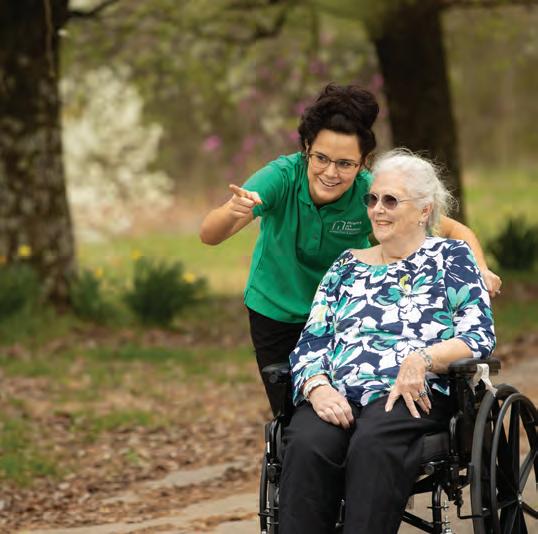
Let’s start talking about living™ The Right Care, Right at Home™ Right
leaders in quality homecare
support,
allow
safe
in
home.
local
ready to
can’t. Right at Home deliver services catering to government funded and private pay clients across Queensland www.rightathome.com.au Call now 1300 363 802 • 24/7 On Call & 24/7 Care Service • Supervised, Individual Care Plan • Approved Home Care Package Provider Levels 1-4 • No Home Care Package Management Fees • Complex Nursing Care • Disability & NDIS Support* • Flexible, Reliable, Certified Carers • Post-Operative Care • Hospital In The Home* • Personal & Companion Care
Domestic, Shopping, Transport * Check your local Right at Home office to see if they deliver these services 37 Research QUEENSLAND Edition 24 www.AgedCareGuide.com.au
SWITCH TO BETTER QUALITY HOMECARE CHOOSE RIGHT AT HOME
at Home are
and
delivering services that
our clients to remain
and independent
their own
Your
Right at Home office in Queensland is
look after your family when you
•

38 Research QUEENSLAND Edition 24 www.AgedCareGuide.com.au
Private home care
Rather than a government-funded service, you may choose a private home care provider and pay for services out of your own pocket.
Maybe this is more cost-effective for you or there is a waiting list for the government service you are trying to access.
Private home care services are arranged directly between you and the service provider. You pay for all the services provided and there is no government subsidy.
Private home care organisations provide a wide variety of services, including registered nurses for complex care needs and carers for companionship, personal care, housekeeping, cooking and outings.
They may also provide other types of staff, such as advisors, assistants, dietitians, drivers, personal trainers, physiotherapists and occupational therapists.
There is no limit to the number of hours of care provided each week and you can generally increase or decrease the time as your requirements change. With an agreed notice period, you are not required to pay for shifts you do not require.
While private home care may seem expensive, you may find that it is more cost-effective than other institutional alternatives. There is a wide variety in the level of quality and cost of home care companies.
When looking into home care services, here are some things to investigate and ask the provider you are considering:
Do they service your area?
Is the company Australian owned?
Is it independent or part of a franchise?
Do the owners / operators have experience in home care?
Does the company have appropriate insurance?
Does the company comply with Australian Tax Law — for example, does it charge GST appropriately?
Do they provide documents about financial arrangements before service begins?
Do they have a Service Agreement? It is important, so that there’s no misunderstanding about the service and cost to be provided.
Are they flexible? After all, it is all about you.
What are their recruitment processes?
Is there a criminal background check performed prior to employment with an agency?
Does the company provide worker’s compensation for employees? This is important so that you are not responsible for any injuries that occur on the job.
Private home
care
39 Research QUEENSLAND Edition 24 www.AgedCareGuide.com.au
Private home care
Veterans’ support
How do they determine appropriate staff for your needs? If a company asks where you live and then offers you staff before even hearing about your needs, you can be reasonably assured they allocate based on location as a priority.
Is it possible to interview potential carers and make a selection after those interviews?
Do you get to decide what times and days suit your needs?
What is the minimum shift length?
Do they have male/female workers and can they cater for specific cultural backgrounds?
Who will be working in the home? Will there be regular staff providing continuity of care or do they change shifts around?
Is there a professional staff member, such as a registered nurse, who liaises with you to create a plan that meets your needs?
Who is the organisation’s main contact for you?
Do you meet a manager / owner and then never hear from them again?
What additional support is offered within the cost of your care? For example, are they available 24-hours a day, seven days a week?
You’ll find a list of in-home care service providers from page 97 in this Guide or visit AgedCareGuide.com.au to find providers servicing your location.
Veterans’ support
If you are a veteran, war widow or widower, you may be eligible to receive extra help in your home from the Department of Veterans’ Affairs.
If you are having a hard time doing the regular household chores, struggling to get in and out of the bathroom safely or if you just can’t manage the gardening or household maintenance, then the Veterans’ Home Care (VHC) program could organise people to help you.
The VHC program offers a range of services including domestic assistance, personal care, safety related home and garden maintenance or respite care in your own home or residential care facility.
If you have specific medical care needs or need more intensive assistance, a nurse from the Community Nursing program may be able to help you stay in your own home for longer. Services may include medication management, wound care or hygiene assistance.
To receive these services, you need to be referred for an assessment by an appropriate health professional. This could be your GP, a treating doctor in hospital, a hospital discharge planner or a VHC assessment agency.
Call the Veterans’ Home Care Assessment Agency on 1300 550 450 to find out what support services are available to you and how you can access them.
40 Research QUEENSLAND Edition 24 www.AgedCareGuide.com.au
A well-earned rest
Taking some time off from caring is crucial and known as ‘respite’. Respite can be provided in your own home, a community setting or an aged care home.
Respite care offers the opportunity for both you and your carer to take a break. This may be for a few hours, a day, a night or a few weeks.
Respite care is provided by residential aged care homes and by community care services under the Carer Gateway.
Accommodation and services include:
day care centres that provide respite for a half or full day; in-home respite services, including overnight, home and personal care services; activity programs;
a break away from home with a support worker; respite for carers of people with dementia and challenging behaviours; respite in an aged care home or overnight in a community setting; and respite for employed carers and for carers seeking to return to work.
Access to respite care is based on priority and need. For respite care in your home or in a day care centre, the respite service provider or the Carer Gateway will assess whether you and your carer are eligible.
The amount of care you receive will depend on your needs and the availability of respite care services.
Centre-based Respite Care
Centre-based Respite Care (CBRC) can provide respite services to carers, offering individualised social and recreational activities.
Through CBRC, you can also attend day programs which may include excursions, outdoor/indoor activities or holiday programs.
Trained respite workers often undertake client assessments. Need-based programs are then developed with you and your carer to help enhance your quality of life.
Cost
There is no charge for assistance provided by Carer Gateway, however, individual service fees may apply.
Community-based respite services charge fees according to the type of service being used and your ability to pay.
For more information contact the Carer Gateway on 1800 422 737. Your call will automatically be directed to your nearest state or territory provider.
Respite at home
41 Research QUEENSLAND Edition 24 www.AgedCareGuide.com.au
Transition care
Regaining your independence
To help improve your independence and confidence at the end of a hospital stay, the Transition Care Program provides short-term support and assistance.
The Transition Care Program is goal oriented, time-limited and therapyfocused care which can be delivered in your own home or in a home-like ‘live-in’ setting, which may be an aged care home.
To be eligible for transition care, you must be an in-patient of a hospital and have been assessed by the Aged Care Assessment Team (ACAT).
Transition care can be provided for a period of up to 12 weeks, with a possibility to extend to 18 weeks if assessed as requiring an extra period of therapeutic care. Seven weeks is the expected average period of support.
Services
Transition care is delivered by approved providers who will offer a package of services including a range of low-intensity therapy services and nursing support and/or personal care services.
Low-intensity therapy services may include:
counselling and social work
dietetics
occupational therapy
Personal care services may include: help with showering and dressing assistance with eating and eating aids
managing incontinence
Fees
physiotherapy podiatry
speech therapy
transport to appointments help with mobility and communication
You may be charged a contribution fee to cover the cost of your transition care. Talk to your provider about what fees apply and how much you need to pay.
For transition care received in your own home, the maximum amount is currently $12.75 per day (March 2024 rates).
For care delivered in a ‘live-in’ setting, such as a residential aged care facility, the maximum amount you can be asked to pay is $61.96 per day, (March 2024 rates).

Access to transition care is decided on a needs basis and not on your ability to pay fees. Talk to your hospital social worker or discharge planner to find out more about how to access the Transition Care Program.
Aged care homes offering transition care beds are listed in the residential aged care tables from page 124.
42 Research QUEENSLAND Edition 24 www.AgedCareGuide.com.au
Flexible restorative care
To help regain your independence if you have not been admitted to hospital, the government has introduced a flexible care option.
You may benefit from the Short-Term Restorative Care (STRC) program if you have been sick or had a fall and your mobility is temporarily impaired.
The program focuses on regaining wellbeing over a short period of time, with a maximum of eight weeks.
The Federal Government created the program to reverse or slow functional decline in older people and help improve their health and wellbeing through the time-limited service.
The ultimate aim is to avoid you having to access ongoing in home care services or residential care.
The program is designed around improving your capabilities at performing everyday tasks you may be having difficulties with.
A team of professionals would provide the service to help you adjust to the differences in your abilities.
This could involve activities and exercises that will benefit your mobility or could result in home modifications to make everyday tasks more manageable.
You will be able to choose the services you want to be provided so the assistance you receive will be tailored to your specific needs.
Services can be delivered at your home, in a nursing home or a combination of both.
You may need to pay a small fee, although you won’t have to pay an accommodation payment if you receive STRC in a nursing home setting.
The daily fee is currently $12.75 for STRC received in a community setting or $61.96 if accessed in residential care or a hospital.
The STRC program is not linked to any other government-funded home support and you will be able to access the program even if you’re already receiving support through the CHSP.
You will not be eligible to receive the STRC program if you are currently: receiving a government-funded Home Care Package; have received transition care in the last six months; live in residential aged care.
You do need an assessment to access the program.
This assessment is done by the Aged Care Assessment Team (ACAT) and is only valid for six months. You can access the STRC program twice over a 12-month period.
Read more about assessments on page 83 or call My Aged Care on 1800 200 422 for more information about STRC.
Flexible restorative care
43 Research QUEENSLAND Edition 24 www.AgedCareGuide.com.au
Wellness centres Wellness centres
Wellness centres offer a range of programs and services that focus on mobility, exercise, rehabilitation and relaxation. A well-equipped wellbeing centre also provides the opportunity to address areas of concern, enhance your mobility and reduce your pain levels and risk of falls or injury.
You can access a wide range of physically and emotionally rewarding activities with the guidance of allied health specialists in these centres, also known as ‘day therapy centres,’ ‘health & lifestyle centres’ or ‘allied health hubs.’
Most centres offer a range of stimulating and fun activities, one-on-one or in group settings to help improve your memory, wellbeing and independence.
Some allied health and wellbeing services you may be able to access include:
Occupational therapy
Diversional therapy
Massage therapy to reduce pain and maintain overall wellbeing
Physiotherapists or exercise physiologists
Podiatry
Hydrotherapy
Dementia and cognitive support programs
Personal training
Exercise classes for all levels, including chair-based and dance classes
Nutrition information
Mat- and equipment-based Pilates classes
Specialised group classes for specific conditions, such as Parkinson’s disease, multiple sclerosis, diabetes, cardiac and pulmonary rehabilitation

These wellness or day therapy centres are sometimes combined with different centre-based care services focused more on social inclusion and community connection.
The programs and services offered through this centre-based care are all about encouraging positive ageing and wellbeing and work to provide you with emotional, mental and physical stimulation.
Some programs may be tailored to specific groups such as people from a multicultural background or those living with certain chronic conditions such as dementia.
44 Research QUEENSLAND Edition 24 www.AgedCareGuide.com.au
You can enjoy a range of activities which may include daily exercise programs, arts, crafts, cooking, gardening, as well as education and learning services, group excursions and respite or overnight care.
There are many benefits of centre-based care including:
Improved social wellbeing through companionship and connection
Maintaining mental health, nutrition and exercise
Positive impacts on overall health and wellbeing, including reducing symptoms of pain
Support for carers and families
Is a wellness centre suitable for me?
If you are over the age of 65 years, the services offered at a wellness centre may be the key to better physical health to help you stay strong and independent. A range of allied health specialists may be able to support your mental agility and keep you performing day-to-day tasks properly.
You may be able to claim the associated costs of a wellness centre through the Regional Assessment Services (RAS) or Aged Care Assessment Programs (ACAP). To receive an assessment, call My Aged Care at 1800 200 422, then ask for a referral code. Based on the outcome of your assessment and the package which you are eligible for through the Commonwealth Home Support Programme (CHSP) or Home Care Package (HCP), health and wellness services may be subsidised by the government.
You can still access the services at a wellbeing or day therapy centre privately and pay for services as you go. To do so, you would need an initial consult to identify which services you need and the amount you will pay to access them.
Wellness centres

45 Research QUEENSLAND Edition 24 www.AgedCareGuide.com.au
Transport services
Transport services
Getting to appointments, the shops or social events can be challenging if you don’t have a car and even more challenging if you have mobility issues.
There may be times when friends, family and neighbours are unable to help out. While transport can be part of government-funded supports, there is also a range of free or subsidised transport options available through a variety of outlets.
Community organisations
In Queensland, there are many volunteer groups, such as local churches, clubs or Rotary groups, that support frail elderly people over 65 years of age in many ways, including through transport services.
These community volunteer transport services provide either direct transport or assist older people in accessing public transport.
They can take you to appointments, out and about in your community, visit friends and family or go to the shops.
Most of these community schemes or groups are staffed by volunteer drivers. Depending on the organisation, the services may be free or you may have to pay a small contribution towards the organisation.
St John’s Ambulance Australia provides a community transport service and patient transport service in most states or territories.
These services can support older people who need to attend medical appointments or hospital, visit loved ones, attend events or family gatherings, or for grocery shopping.
Local councils
Queensland local councils frequently offer transport in two forms — community buses and personal transport.
Some councils operate community buses on a weekly basis with many offering the convenience of door-to-door pick-up and drop-off. There is usually a nominal minimal charge for using the community bus which may vary depending on where it is going and whether you require a return journey.
Additionally, some councils offer personal transport for medical, wellbeing and other essential appointments and are usually provided by council volunteers.
Contact your local council for information about transport in your area.
Other transport options for seniors
You may be eligible for free or cheaper public transport in Queensland if you hold a Pensioner Concession Card, Seniors Card, Veterans’ Gold/White Card or TPI/EDA Veteran Travel card.
The Queensland Government operate a Taxi Subside Scheme that assists people who are unable to use public and community transport due to disability or significant mobility restriction.
Contact TRANSLink on 13 12 30 or visit the website at translink.com.au
46 Research QUEENSLAND Edition 24 www.AgedCareGuide.com.au
Assistive technology options
The changes that occur with ageing can lead to problems with mobility, such as unsteadiness while walking, difficulty getting in and out of a chair or falls.
These are reportedly the top mobility problems experienced by older people and a major cause of injury and death.
Muscle weakness, joint problems, pain, disease and neurological difficulties can also contribute to mobility problems.
Keeping mobile can give you the opportunity to maintain independence in order to fulfil daily tasks and live happily in your own home.
Although light physical activity can help improve your mobility and remain independent, some people also find comfort and assistance in mobility equipment or aids which aim to help them live more satisfying and productive lives.
Improve access and safety at home
Creating a safe living space is critical to keep your independence and prevent injuries. Whether it’s slippery floors or tripping over electrical cords, some of the most common causes of injury in people over 65 are in and around the home.
You can improve the safety of your home by making some basic changes: Remove clutter around the home to reduce the risk of tripping over. Keep hallways and staircases clear from clutter and make sure you check outside areas for clutter and tripping hazards as well.
Install grab-bars and handrails to help you get down the stairs safely or step in and out of the shower or bathtub without injuring yourself.
Repair or remove tripping hazards such as loose carpet, slippery throw rugs or floorboards that stick up. Replace those items and use non-slip mats for more effective fall prevention.
Inadequate lighting can also contribute to falls or injury so install brighter light bulbs where needed and make sure stairways and narrow hallways are properly lit. Make sure you have easy access to bedside lamps and consider using motion-sensor lights to create better guidance for moving around your house at night.
Even with grab-rails, stairs can present a significant falling hazard. Non-slip strips can help make stairs safer to go up and down or consider having a stair lift installed for easier access to the second level.
Personal alarms that can detect falls, call for help in an emergency or have a GPS tracker can be used to help you feel safe and secure in your own home or when you’re out in the community.
Create a safer home
If you’re a Queensland resident aged over 60 or have a disability and you’re unable to do or pay for any home modifications to give you easier access to your home or to increase safety, then the Home Assist Secure service may be able to help you.
Assistive technology
47 Research QUEENSLAND Edition 24 www.AgedCareGuide.com.au
Assistive technology
Home Assist Secure provides free information, referrals and subsidised assistance related to minor home maintenance, modification, repairs, falls prevention and home security.
If you are eligible, you may be able to receive some financial support to assist with labour cost of home modifications or maintenance needed to help you live safely and secure in your own home.
The service can also assist with employing trades people to undertake the repairs or modifications needed.
To be eligible for the subsidy, you must have a Pensioner Concession Card, be unable to carry out the required work yourself and don’t have access to other types of assistance such as the Commonwealth Home Support Programme, Department of Veterans’ Affairs or support from family or friends.
Home Assist Secure is a service funded by the Queensland Government Department of Housing and Public Works.
For more information visit hpw.qld.gov.au or call 13 74 68.
Mobility aids can assist you
There are several different types of mobility aids available which can help you maintain independence and safety, assist in walking and moving about, helping you with personal care, making it easier for you to remain socially active, and maintain your quality of life.
New products and technology are continually introduced to the market.


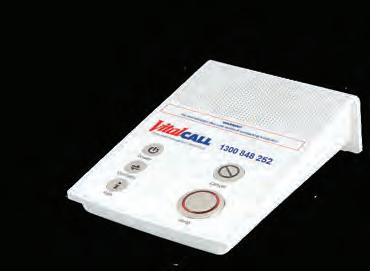

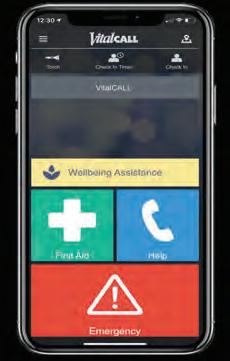


Australia’s premium personal emergency response provider NDIS & DVA Approved Australian based 24/7 emergency response Protecting your lone workers and health care professionals A Comprehensive Emergency Alert System 1300 848 252 vitalcall.com.au SafeZone supported by VitalCALL has been helping Australians stay independent for over 45 years In-home and mobile units available
48 Research QUEENSLAND Edition 24 www.AgedCareGuide.com.au





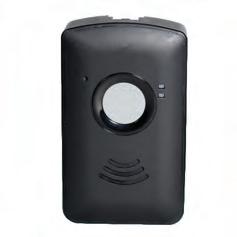





49
Assistive technology
Some of the equipment available include:
Mobility aids — Aids that can help to prevent falls include walking sticks or frames, wheelie walkers, manual and motorised wheelchairs and scooters.
Personal care — Some of these aids may include shower stools or chairs, shower hoses, bath seats and boards, over-toilet frames, commodes, urinals, continence pads and supplies, aids to assist with dressing and aids to manage medications.
Home safety — Some of the aids that can assist you around the house during day-to-day living may include handrails, ramps, tap turners, non-slip mats, easy-grip utensils and easy-pour kettles.
Assistive technology solutions
To remain independent and in good health, it’s important that you can look after yourself, move, eat and drink well, stay connected and have fun.
Fortunately, there are a range of assistive technology solutions that can support you to achieve all of this:
Prepare your own meals and eat or drink independently
Communicate and stay connected
Move around your home and community
Manage your own personal care such as bathing or dressing
Use your computer, tablet or phone
Participate in sports and other recreational activities
Control your appliances, such as your TV and lights
Undertake daily tasks safely
Be more independent in your own home and when out and about With over 25,000 assistive technology products on the market, it can be difficult to know what the best solutions for your needs are.
Independent Living Centres (ILCs) are information resource centres, located in every state and territory, that display a range of products and equipment to assist with daily living activities.
You can visit an ILC to test products and equipment and select those most suitable before purchase.
In Queensland, the Independent Living Centre supports people with their assistive technology choices through information and advice, allied health support as well as access to grants for individuals to get access to a range of technology items including:
Emergency call systems
Wheelchairs and scooters
Telephones
Showering, toileting and dressing aids
Kitchen equipment
Seating, beds, and mattresses
Hoists and transfer aids
Vehicle modifications
Smart home technology
Through an online National Equipment Database (NED), you can search over 25,000 assistive technology products Australia-wide, including supplier details and product specifications. Find out more at askned.com.au .
For further information, email mail@lifetec.org.au or call 1300 885 886.
50 Research QUEENSLAND Edition 24 www.AgedCareGuide.com.au
Aged care homes
If you aren’t able to continue living independently at home, you may choose to move into an aged care home.
The Australian Government regulates and funds the provision of much of the aged care in Australia.
‘Aged care home’ is the term most commonly used, but you may also find this type of accommodation referred to as ‘nursing home,’ ‘aged care facility,’ ‘residential aged care’ or ‘high- and low-care facility.’ All of these terms can be used interchangeably to describe the same type of living arrangement.
Entry into a government-funded aged care home requires approval by an Aged Care Assessment Team (ACAT).
There are also non-government-funded aged care homes which are called supported or assisted living complexes. These do not require ACAT or government approval.
Where do I start?
If you or someone close to you feel you are in need of some form of residential care, you can speak with your doctor who can make initial contact with My Aged Care.
You can also contact My Aged Care direct or a representative, like a family member or friend, can do this on your behalf. Call 1800 200 422 to organise an ACAT assessment. See page 83 for information about ACAT.
The next step
After being approved by an ACAT for government-funded residential care, you may begin looking for your future home. You can do this yourself or you can hire a placement consultant who can make the job much easier for you.
It is important to know and understand the types of homes available in your area as this may affect the cost and services you receive.
It is also recommended that you visit as many homes as possible, just as you would when buying or renting a house. This will enable you to gauge the feel and culture of the home.
Homes and their services
Aged care homes provide accommodation ranging from single rooms with ensuites to rooms with shared bathroom facilities. They must provide specified care and services to all residents at no additional cost.
Services that must be provided at no additional charge for all residents who need them, irrespective of their level of care needs, include:
Basic accommodation related services such as beds, mattresses, linen, bedside lockers and chairs
General laundry and cleaning services
Maintenance of buildings and grounds
Utilities, such as electricity and water
Aged care homes
51 Research QUEENSLAND Edition 24 www.AgedCareGuide.com.au
Aged care homes
The provision of staff continuously on call to provide emergency assistance
Assistance with personal care such as bathing, going to the toilet, eating and dressing
Assistance with mobility and communication
Assistance in obtaining specialised therapy services, or a health practitioner service
Meals, including special diets
Toiletry goods such as towels, washers, soap and toilet paper
Support for people with cognitive impairment like dementia
Social and recreational activities
Rehabilitation support
Additional services as appropriate to individual care needs where a fee may apply include:
Goods to assist with toileting and continence aids
Therapy services such as speech therapy, podiatry, occupational, recreational and physiotherapy
Registered nurses to assess, plan and manage care, including complex pain or wound management, palliative care program, special feeding, dialysis and oxygen therapy
For people with dementia, it is important to ask a home whether it offers separate or secure dementia specific units or wings.
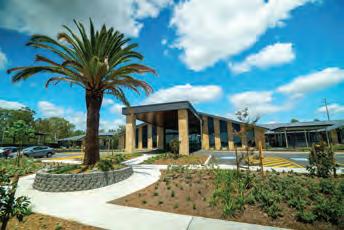


52 Research QUEENSLAND Edition 24 www.AgedCareGuide.com.au
Some nursing homes may have a secure garden area specifically designed for people with dementia, which is generally attached to the secure dementia unit.
There are homes that cater to a specific cultural and linguistic group or may offer culturally appropriate services. See pages 149 –153 for a list of culturally appropriate care homes and services g.
Pets can help lessen feelings of loneliness or isolation and some homes are happy to accommodate you and your pet.
Some nursing homes even have live-in pets. You’ll find these C listed in the directory section of this guide, starting on page 124.
Accreditation and certification
All government-funded care homes must meet required accreditation standards and demonstrate continuous improvement with regard to the quality of care and services provided to residents.
The standards that must be met cover areas such as management, staffing, health and personal care, resident lifestyle, living environment, catering, cleaning, continuous improvement, safety and security.
The Aged Care Quality and Safety Commission is responsible for the review of aged care homes.
It monitors residential aged care services to ensure their compliance with the accreditation standards.
Healthy Ageing with Mercy Health
Mercy Health is a trusted, leading Catholic provider of health, aged and community services with 30 residential aged care homes across Australia.
We provide the places and choices to support people to age well, and lead healthy and fulfilling lives. We do so in the spirit of the Sisters of Mercy, who have always sought to care for the whole person – body, mind and soul.
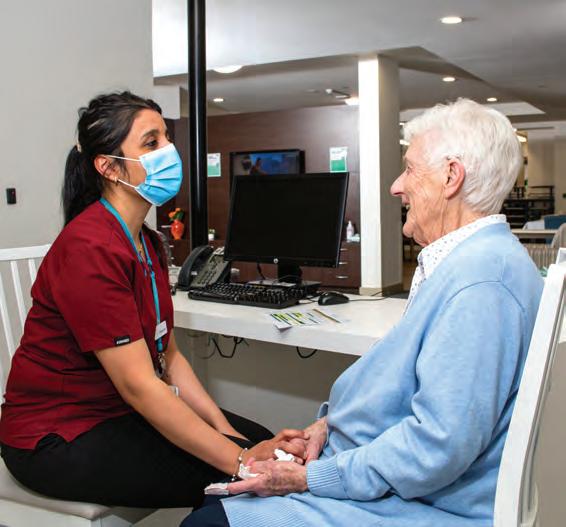
Aged care homes Call us now on 07 4084 0612 or visit mercyhealth.com.au to discuss the next steps in your healthy ageing journey.
53 Research QUEENSLAND Edition 24 www.AgedCareGuide.com.au
Aged care homes
You can ask the provider for the accreditation status of the home or access reports and find information about the process on the Commission’s website — agedcarequality.gov.au
Quality Standards
The Aged Care Quality Standards were introduced in 2019 as a new measure of quality in aged care.
The eight new standards have a much stronger focus on consumers to help them make informed decisions about aged care services.
It gives consumers confidence that aged care providers will work in partnership with them and their families to deliver care that supports their health, wellbeing and quality of life.
The new Quality Standards include the following focus areas:
Consumer dignity and choice
Ongoing assessment and planning with consumers
Personal care and clinical care
Services and supports for daily living
Organisation’s service environment
Feedback and complaints
Human resources
Organisational governance
Each of the standards looks at three key aspects: What is the outcome for the consumer?
What are the expectations of the organisation?
What are the organisational requirements to show that the standard has been met?
The new standards revolve around consumers, their families and the staff providing care.
This partnership between the provider and consumer needs to work in order for the eight areas to succeed.
All government-funded aged care homes and home care services are measured against the new standards and organisations must be able to provide evidence of their compliance and performance with the Quality Standards.
Charter of Rights
Supporting the Aged Care Quality Standards is a single Charter of Aged Care Rights, protecting the rights of consumers receiving aged care services and their right to be properly looked after, treated well and given high-quality care and services.
All aged care providers have to provide a personally signed copy of the Charter of Rights to every one of their residents or care recipients.
54 Research QUEENSLAND Edition 24 www.AgedCareGuide.com.au
Residential aged care
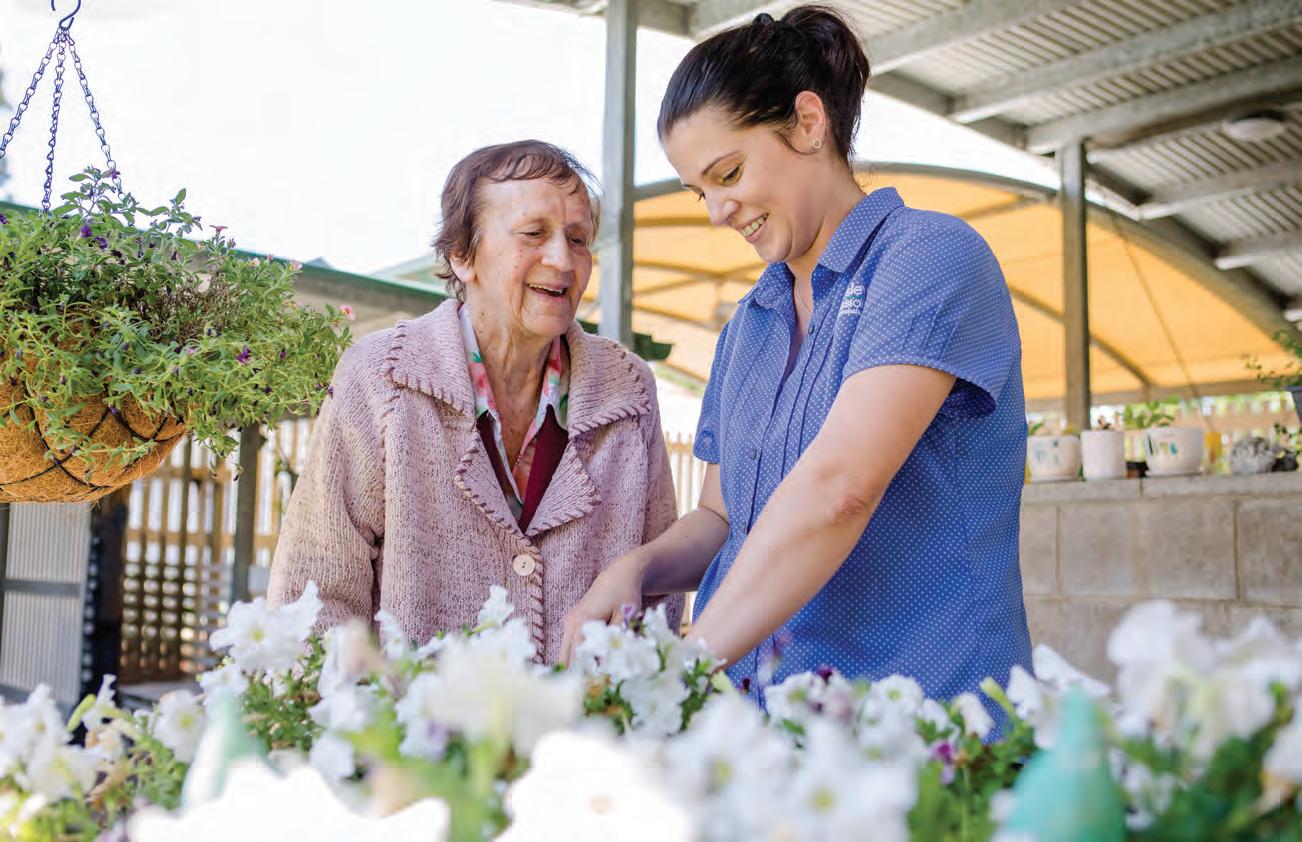
Experience a life of endless possibilities
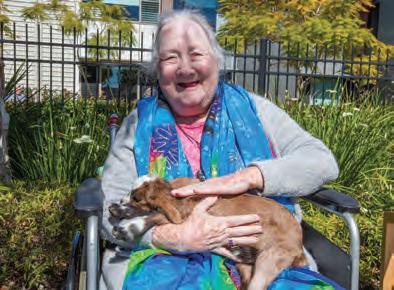
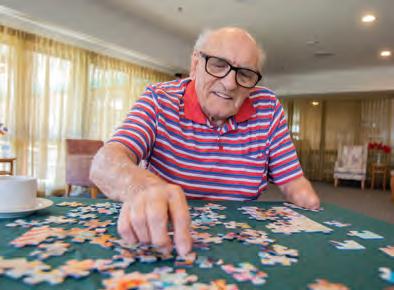
Are you seeking compassionate aged care tailored to your individual needs and preferences?
At Wesley Mission Queensland, we’ve reimagined aged care to offer you a truly unique experience.
•The Eden Alternative™ Philosophy of Care: our innovative approach fosters your wellbeing.
•Inclusive community: join our warm, diverse community that celebrates your individuality.
•Personalised care: your aspirations and goals drive our holistic, person-centered care.
•Dedicated, qualified team: our compassionate staff and volunteers are devoted to your wellbeing.
At Wesley Mission Queensland, we believe that every person deserves a life filled with purpose and meaning.
Contact us today by calling 1800 448 448 or emailing contactus@wmq.org.au to find out more and how we can help you.
Residential Aged Care www.wmq.org.au
55
Aged care homes
The Charter covers 14 fundamental protections stating all older Australians receiving any type of government-funded aged care supports have the right to:
1. Safe and high-quality care and services;
2. Be treated with dignity and respect;
3. Have your identity, culture and diversity valued and supported;
4. Live without abuse and neglect;
5. Be informed about your care and services in a way you understand;
6. Access all information about yourself, including information about your rights, care and services;
7. Have control over and make choice about your care and personal and social life, including where the choices involve personal risk;
8. Have control over and make decisions about the personal aspects of your daily life, financial affairs and possessions;
9. Your independence;
10. Be listened to and understood;
11. Have a person of your choice, including an aged care advocate, support you or speak on your behalf;
12. Complain free from reprisal and to have your complaints dealt with fairly and promptly;
13. Personal privacy and to have your personal information protected;
14. Exercise your rights without it adversely affecting the way you are treated.
You should receive a copy of the Charter signed by your provider and you or your representative will be asked to sign the Charter to acknowledge that your provider has given you information about your rights in relation to the aged care service under the Charter.
As a consumer, you have the option of signing the Charter of Aged Care Rights, however, even if you choose not to sign the document you can still access care and services.
Call the Aged Care Quality and Safety Commission on 1800 951 822 or visit agedcarequality.gov.au for more information.
Complaints
If you have concerns or are unhappy about the standard of care you are receiving, you or your representatives are strongly encouraged to firstly take all complaints to the facility management for resolution.
It’s always best to address concerns rather than leaving it to escalate. If you don’t feel comfortable to deal with it yourself, you can ask an advocacy service to help you.
If the matter is not resolved, you can then make complaints to the Aged Care Quality and Safety Commission on 1800 951 822 or visit agedcarequality.gov.au
Anyone can make a complaint about anything that may constitute a breach of the service provider’s responsibilities to past or present residents.
56 Research QUEENSLAND Edition 24 www.AgedCareGuide.com.au

At Churches of Christ, we support you throughout your senior years and as life changes.
Welcoming Retirement Villages
Enjoy the benefits of community living from the independence of your own, maintenance-free home.

Home Care Options
Stay independent in your home for longer with Home Care packages suited to your needs.
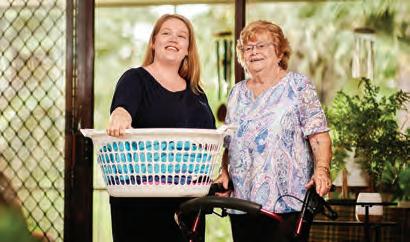
Residential Aged Care
Feel safe, comfortable and socially engaged when you move into our care residences.

We’re here for you.
P 1800 199 740 P 1800 772 011 P 1800 900 001 Connect with us today! Visit us at cofc.com.au 57
Applying to a home Applying to a home
As soon as you have been approved by an Aged Care Assessment Team (ACAT) for government-funded residential care, you can begin looking for your future home.
You can do this yourself or you can hire a placement consultant to do this for you.
When searching for nursing homes, decide what features are important to you. Are you looking for an extra service facility, a specific cultural environment or a facility with pets?
It is important to know and understand the types of homes that are available in your area because this may affect the cost and services you receive.
It is recommended that you visit as many homes as possible, just as you would when buying or renting a house. This will allow you to get a feel for the culture of the home and its surroundings.
You can also use residential respite as a way of finding out about the quality of care at a nursing home before deciding if the home is a good place for you to move into.
When you have narrowed down which homes would suit your needs and


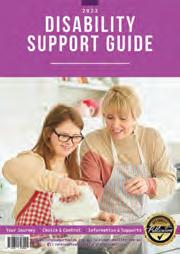
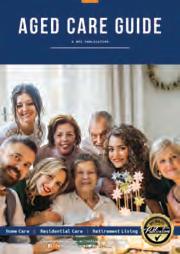








www.agedcareguide.com.au www.disabilitysupportguide.com.au
You To Make Informed Choices “The Right Information At The Right Time!” Publications Easy to read information about navigating your care journey, plus a provider directory for your area. Websites Stay informed on aged care and disability support, including provider listings and information guides. Read and leave reviews for online facilities and service providers you’ve used. Tell Your Story Save time online by comparing up to ve care and support options in one easy to use process. Compare Your Options 58 Research QUEENSLAND Edition 24 www.AgedCareGuide.com.au
Empowering



Considering aged care for a loved one?
At Bupa Aged Care, whether for respite short-stay care or as a new home, our experienced registered nurses and carers aim to provide the care each resident needs, in the way they prefer.
Care is first and foremost.
We embrace and support residents to live their day their way, with teams dedicated to their wellbeing.
People rarely expect to need aged care, but if your family does, we’ll guide you through the steps.
Bupa Cairns 52-59 Swallow St, Mooroobool
Bupa Glenvale 357-383 McDougall St, Toowoomba
Bupa Merrimac 3-5 Glenhaven Ct, Merrimac
Bupa Mount Sheridan 40-48 Progress Rd, White Rock
Bupa New Farm 193 Moray St, New Farm
Bupa Rangeville 280 Mackenzie St, Rangeville
Bupa Runaway Bay 376 Pine Ridge Rd, Runaway Bay
Bupa Tugun 6 Croft Ct, Tugun
To book a visit with one of our homes in Queensland, call us on 1800 718 357 or visit bupaagedcare.com.au/region/qld
Admission to one of our Bupa Aged Care homes is subject to availability and your care needs.
59
Waiting lists
Waiting for residential care
Nursing homes don’t always have bed vacancies available, so it is likely that you will have to wait for a period of time for a bed to become available.
Some aged care homes may have waiting lists and the length of these varies between homes. If your situation is urgent, please inform the staff at the home.
Generally, bed places are offered to people on the wait list who have a health priority or have been waiting for a place and have risen to the top of the waiting list.
You can be on as many waiting lists for facilities as you would like, but once you accept a vacancy offer, you will be removed from all other nursing home waiting lists.
If you require a bed urgently, you may not have as much choice with the facility you move into. You may have to accept the first offer that is made to you, no matter if it is your first facility choice or not.
Aged care homes cannot predict or know when a vacancy will occur, so it is important to keep in regular contact with the aged care homes to ensure they are aware you are still interested in admission to their home.
If you’ve engaged the services of a placement consultant they will monitor vacancies for you.
It is ideal to plan ahead and take the time to choose the facilities that you want to live in. This means no matter who offers you a bed first, you will be satisfied with the placement.
What happens when a vacancy occurs?
The person in charge at the aged care home will either ring you, your carer or family directly or phone the social worker if you are in hospital, to let you know they have a spot available for you.
You may be asked to make a decision within hours because there are usually other people also waiting.
You, or the relevant hospital worker, will need to arrange for your transfer to the home as soon as is practicable.
If you are unable to move into a home straight away, you will be given seven days after you have agreed to accept the place to move in. This is called pre-entry leave.
From the date of acceptance you may be charged for your care and be eligible to receive financial assistance from the government.
Once your place in the aged care home has been confirmed, you will be provided with two or three important documents that will address all the information and details you need to know. This information should also include the Resident Agreement, the Accommodation Agreement or an Extra Services Agreement if applicable.
It is not acceptable to be charged any fees or be expected to make any donation before you formally accept a place in an aged care home.
60 Research QUEENSLAND Edition 24 www.AgedCareGuide.com.au
Deciding on a home
There are a number of things to consider when deciding which aged care home will best suit your needs.
Deciding to move into a home can be a really big decision, so you want to make sure you choose a nursing home that not only suits your needs, but also feels like home.
Making a list of your personal preferences and requirements can make it easier to shortlist aged care facilities. This list could include the care you require and lifestyle options.
One of the best ways to gauge the environment and atmosphere of a nursing home is by visiting it.
Contact the home you are considering to organise a tour of the facility, in most cases your family should be able to come with you.
By visiting the facility, you will be able to assess whether the nursing home meets your needs and if it is a place you would be happy to live.
Any questions you have can be answered by your tour guide from the aged care home.
Additionally, you can have a talk with the site manager to understand how the aged care facility runs and have all your questions answered.
Deciding on a home
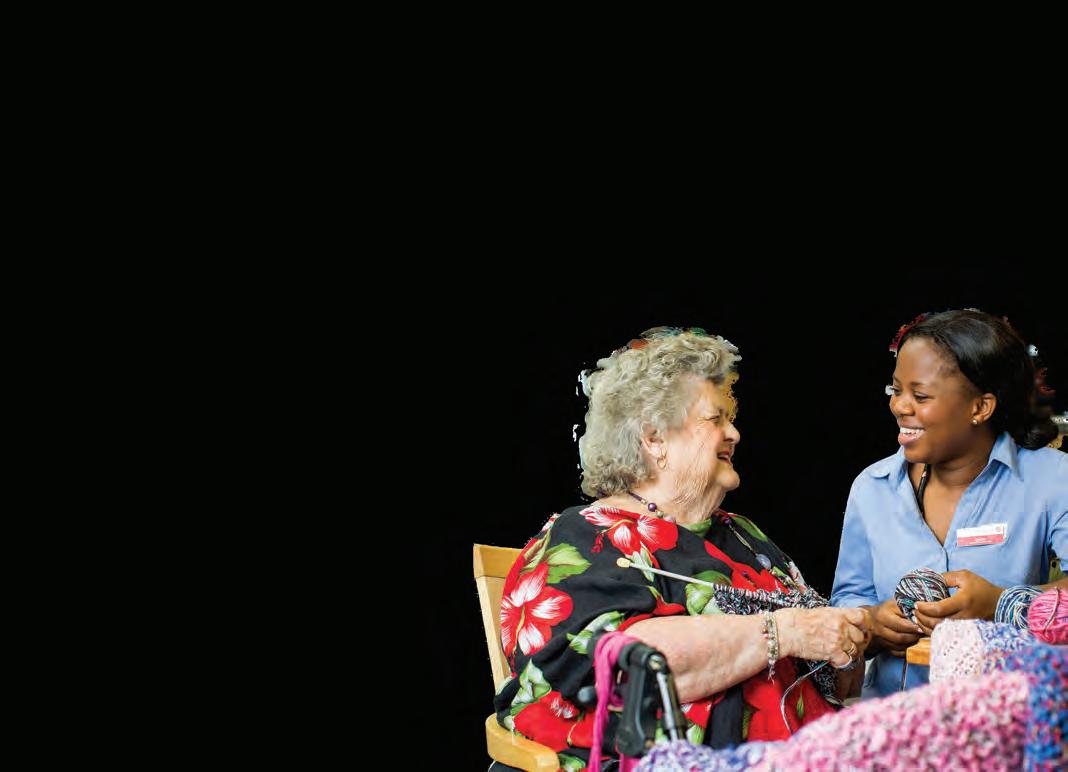
61 Research QUEENSLAND Edition 24 www.AgedCareGuide.com.au
Deciding on a home
The following is a brief checklist of areas you should consider before deciding to move in:
Is the home clean, fresh and in good repair?
Are the staff warm and friendly? You want to be able to feel at ease and comfortable in communicating with the staff.
How many staff work at the home and what is the night time ratio of staff to residents?
Is the home secure, particularly at night?
Are there keypad locks on the doors or are CCTV cameras installed?
Does the home have the provision for you to age in place and remain as your care needs increase?
Do they offer single rooms with ensuite?
If you are looking to move into a home with your spouse, is this provision available?
Are clothes laundered on or off site?
Does the room have access to a private phone line, internet connection, NBN or pay-TV?
Are the floor coverings clean and fresh or is there an odour throughout the home?
Is the room temperature comfortable for you and are you able to control your own room temperature?
What personal items and furnishings can you bring into the home and what provisions are there for storage of personal items?
Inspect the kitchen if possible and find out if meals are cooked on site or are delivered.
Are the meals flexible and will they meet your special requirements?
Are there spaces for you to meet with family and friends and to celebrate special events?
If you like pets, find out if the home is pet friendly and whether they have pets at the home or a visiting pet program.
Be sure to enquire about the range of activities available and entertainment programs. These are vital for your ongoing wellbeing.
62 Research QUEENSLAND Edition 24 www.AgedCareGuide.com.au
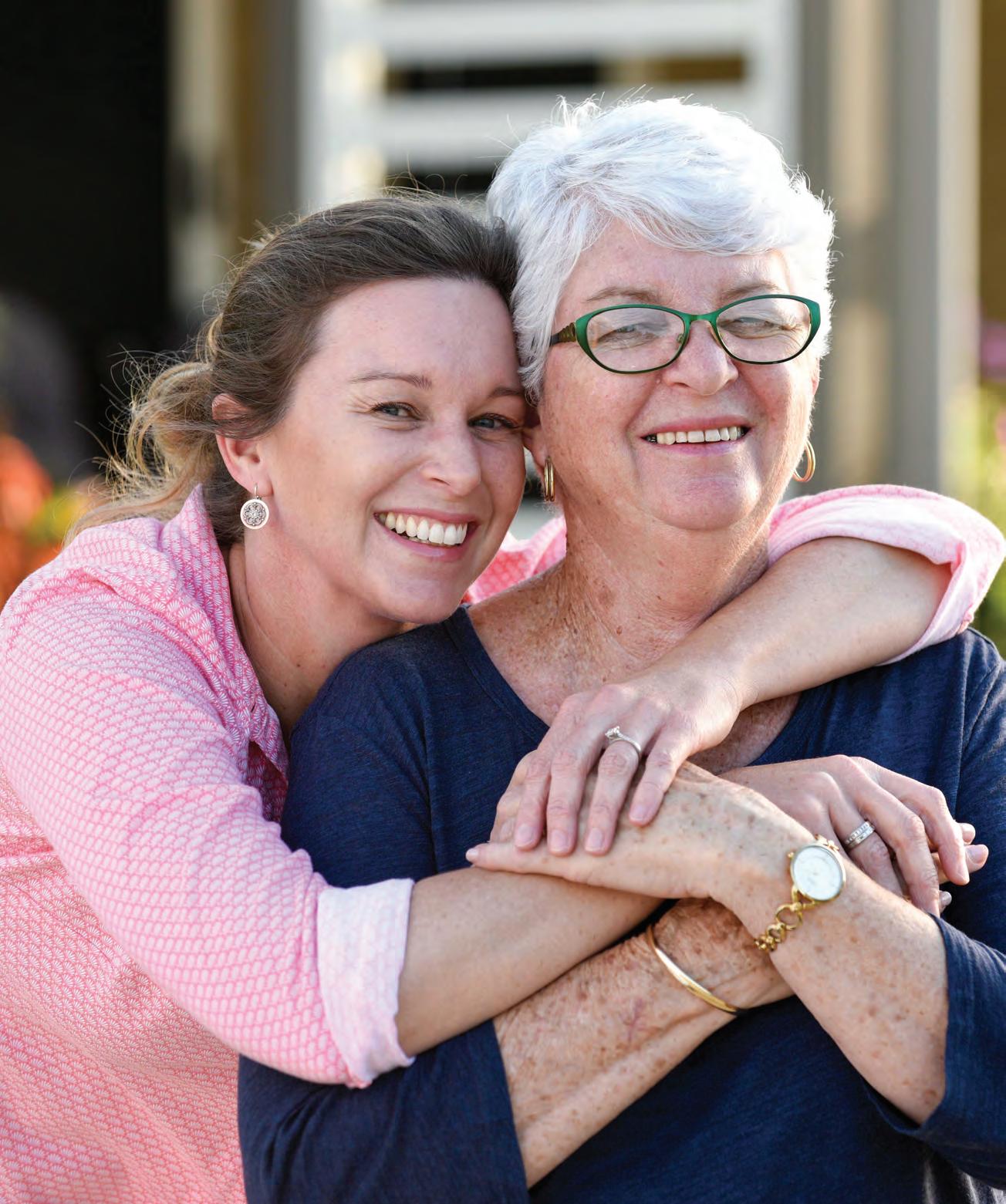
63
Any additional services or amenities that are provided by aged care homes can really enhance your experience
Beneficial services and amenities could include:
Outdoor areas or gardens, if relevant, check whether they are secure
A hairdressing salon or day spa
An on-site café
A chapel or provision for church services
Pastoral care services
Scenic views
Music therapy
Men’s Shed
An on-site kitchen
Gymnasium
Allied health services
It is important to have all your queries answered, as it can really help you gauge whether a facility is the right fit for you.
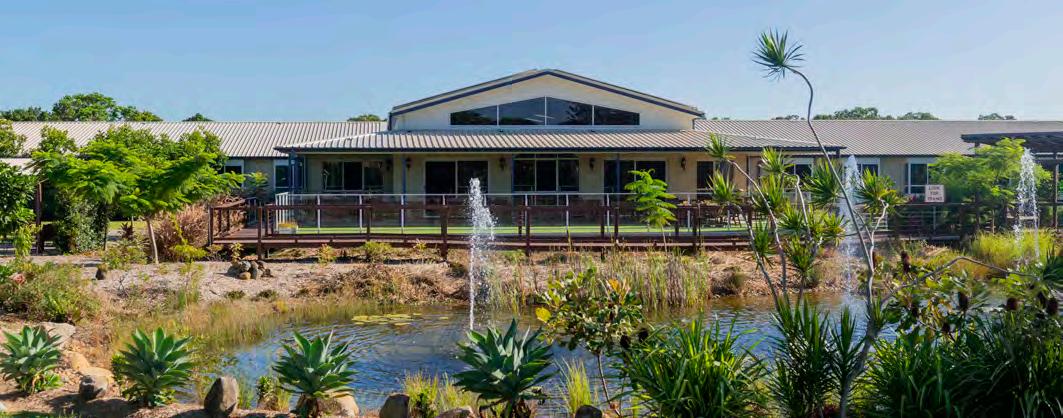
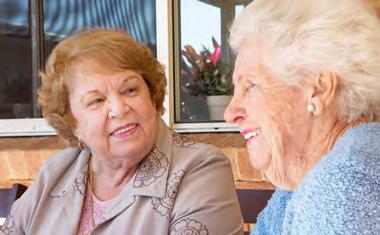





Deciding on a home Maranatha Village, Kallangur | 1800 246 637 | www.chomes.com.au Book a tour with us today! Call 1800 246 637 or visit www.chomes.com.au Let us show you what we have learnt about care Aged care and retirement options 75 years experience in care Dementia and respite care available Person-centred Spiritual Care Comfort, dignity and experience
facility.
living in a
64 Research QUEENSLAND Edition 24 www.AgedCareGuide.com.au
Moving into a home
The process of moving in is often referred to as the ‘admission process’ and starts with an initial introduction, orientation and assessment.
During the assessment, a staff member will gather information including medical conditions, family history, food preferences, social and recreational likes, dislikes and interests.
This information will be used to create a care plan. The care plan is updated regularly and you can request to see a copy at any time.
The care plan will be an overview of your care needs, wishes and outcomes you want to achieve while living in the facility.
Family members and carers are welcome to assist in identifying social and care needs.
What can you bring with you?
Your aged care home will already have most of the furniture and furnishings, such as beds, chairs, wardrobe, curtains and floor coverings, so it may be helpful to directly ask the home what you can bring with you.
Below, you’ll find an overview of some of the main things to consider when moving in.
Personal items
Having personal belongings around you may help you to feel at home in your new environment.
Some people may like to bring family photographs, their favourite films, books, music or other treasured items.
Clothing
It is important to ensure that personal clothing is properly labelled.
Most nursing homes will launder your clothing either on site or through a laundry service.
Bring enough clothing to allow for items being washed as it might take a couple of days before clean laundry is returned to you.
Because of the large volume of washing, nursing home laundries often use commercial washing and drying machines so make sure your clothes are machine-washable and labelled with your full name.
Continence aids
Residents with higher level care needs, who require products for the management of continence, will have these provided by the aged care home. Other residents may be required to purchase these items.
Radios, TVs, computers, digital clocks
Residents can bring with them their preferred electrical and electronic items. Each item will be checked, tested and tagged by the home prior to use.
Moving into a home
65 Research QUEENSLAND Edition 24 www.AgedCareGuide.com.au
Moving into a home
Furniture
It is quite common to have space available for some items like a favourite chair, small table, dresser and bedside light, but it’s best to check with the aged care home what and how many items you can bring.
Medication
It is important that you bring all prescription medication you’re currently taking with you on admission.
Care staff will manage and administer the medication to ensure safe and quality use of your medicines.
Topical creams, herbal remedies, vitamins and elixirs, which are non-prescription items, should be declared to the staff.
Toiletries
The aged care home supplies the basic necessities such as toothpaste, soap and toilet tissue. Specific items or particular brands need to be purchased at your own expense.
Mobility and wheelchairs
Wheelchairs, scooters, walking frames and other mobility aids will be assessed to ensure that these are appropriate to your current situation. The maintenance and upkeep of scooters and wheelchairs is your responsibility.
Making the transition
Once you have been offered a place in an aged care home, it is also important to organise your medical and financial matters and who you will need to tell about your move.
If you have not done so already, this is a good time to talk to your loved ones about your wishes for your future medical care.
Writing your wishes in a letter or statement can help guide health professionals and those close to you if you become seriously ill or injured and are unable to make decisions about your own care.
This is called an Advance Health Directive and it should include clear and specific details about treatments you would accept or refuse.
Keep your Advance Health Directive in a place that is easily accessible and share the document with your doctor and loved ones.
Who should you tell about your move?
It is recommended that you tell your family, carer, friends, neighbours, community centre or council and any health professionals, such as your doctor or pharmacist, that you’re leaving your home to enter an aged care home.
If you need to change doctors, you can ask to have your medical history sent to your new doctor.
It is also a good idea to keep track of any health professionals you see and make a note of your current medical treatments and medication so you can discuss this with your new aged care home as part of your care plan.
66 Research QUEENSLAND Edition 24 www.AgedCareGuide.com.au
Daily living in a nursing home
Moving house is often stressful and it may take time to settle into your new environment. Here’s what you can expect from life in a nursing home:
If you are thinking about moving into a nursing home, you’re likely to experience a massive range of emotions, varying from relief and excitement to uncertainty and apprehension.
Living in a nursing home will be different and it may take a little bit for you to settle into your new life.
It’s your home
There may be some ‘common’ areas that are shared with other residents, such as the dining room and lounge room, but your room is your own.
Nursing homes positively encourage you to bring personal items for your room, such as pictures, photos, ornaments, furniture throws and smaller pieces of furniture.
Find out prior to moving what extra personal belongings you can bring.
Social aspects and routines
The chances are you’ve moved from living in a house on your own or with a partner, so you’ll need to get used to a few more people being around. However, the choice is yours as to how social you want to be.
Nazareth Care
Aged care from the heart
Welcome to Nazareth Care Wynnum
When you enter Nazareth Care, you enter a unique world of warmth and belonging. We have been providing residential aged care to the community for over one hundred years. Driven by our core values, we understand the needs of the elderly – to be respected, treated with dignity and cared for with comfort and love.
Our experienced team deliver exceptional care to all our residents and support to their families. We provide consistency of care, with a team focus to support care needs, lifestyle and wellbeing.
Our residential aged care homes o er:
• Permanent and respite care
• Individual care plans, unique to the needs of each resident
• Clinical, social, emotional & spiritual support
• Dedicated memory support unit
• Mass held daily & regular services for other denominations
• Our sisters are available to provide pastoral care

Daily living
OUR VALUES: LOVE COMPASSION PATIENCE RESPECT JUSTICE HOSPITALITY 272 Wynnum North Rd Wynnum North, QLD 4178 Book your tour today! Call 1300 NAZARETH (1300 629 273) admissions.aus@nazarethcare.com
67 Research QUEENSLAND Edition 24 www.AgedCareGuide.com.au
Daily living
You can choose to be social in the communal areas and spend time with other residents or simply find a quiet corner or remain in your room to enjoy your own company.
Many nursing homes have strong links to the local community. You can choose to get involved with activities, such as meeting local school children or other people from other groups. As well as adjusting to new people, there may be some changes to your daily routines, such as slightly different meal and shower times.
Multiple activities
Nursing homes offer many social aspects and multiple activities, such as exercise classes, religious services/classes, bingo, arts and crafts, concerts and outings. It doesn’t mean you have to take part — you still decide what you want to do.
You can continue to enjoy your usual activities outside the nursing home, such as attending any regular classes or meeting friends in your favourite coffee shop.
Whether it’s reading or watching TV in your room, chatting with other residents or going to the cinema with friends, the choice of how you spend your time is yours.
Partners and pets
Some homes offer rooms for couples in the form of adjoining rooms, double rooms or even a single unit for couples. This means couples can continue living together even if they have different care and support needs.
While most homes do not allow residents to have their personal pets, many homes now have ‘live-in’ animals such as cats, rabbits, dogs and birds. Some nursing homes also arrange for a variety of animals to visit regularly.
Family and friends
Your family and friends are always encouraged to visit and depending on your health, you will be able to come and go as you please.
You can visit friends, enjoy family celebrations, go shopping and even go on holiday.
Many nursing homes also have special areas available for private functions. This means you can still hold special events for family and friends in your nursing home.
Going on a holiday
When you live in an aged care home, you can still go on a holiday.
You can leave the aged care home for up to 52 nights in a financial year, which is called ‘social leave.’
The government will continue to pay subsidies on your behalf to the aged care home and you still have to pay your daily fees and income tested fees.
If you are away for longer than 52 nights, the government will stop paying subsidies and you may be asked to pay any owing amounts to the aged care home.
The 52-night rule can’t be extended.
68 Research QUEENSLAND Edition 24 www.AgedCareGuide.com.au

Preparation 69 Preparation QUEENSLAND Edition 24 www.AgedCareGuide.com.au
STEP 2
WHAT YOU NEED TO KNOW Preparation
There are a few things to organise before being ready for aged care services. Make a list of what support you’re currently getting, what you feel you need help with and key areas that are important to you in a provider that best align with your wishes and interests.
If you’re wanting to access government-funded supports, the first step in starting your aged care journey is to register with My Aged Care. This can be done online or via a phone call to the My Aged Care contact centre on 1800 200 422.
An operator will ask you a number of questions about your personal circumstances and care needs and set up a central client record.
Examples of the questions you may be asked are:
Are you currently receiving aged care services?
Are you getting support from a carer or family member?
Can you prepare your own meals and do housework?
Do you need assistance taking a shower or bath and do you need help getting dressed?
Are there any health concerns or did you have a recent fall?
Do you feel lonely or isolated?
Are there any safety risks in the home?
The aim of this screening is to figure out what needs and support you require and whether you are eligible for a further assessment in person.
Following this conversation you will be contacted by someone from either the Regional Assessment Service (RAS) or a local Aged Care Assessment Team (ACAT) for an assessment to determine your abilities and what level of care you require.
Here is a list of documents and information you should prepare for the assessment:
Medicare card and a form of identification, for instance, Department of Veterans’ Affairs (DVA) card, driver’s license, passport or healthcare card
Notes or referrals from your doctor
Information about previous home or aged care services you have received
Details about support you receive from family, friends or the community
Questions and information about aged care that you wish to discuss with the assessor, so you have a better understanding about services
Preparation
70 Preparation QUEENSLAND Edition 24 www.AgedCareGuide.com.au
Contact details of your doctor and any other health professionals you see regularly
Translator or Auslan interpreter if needed
Support person to be present for the assessment if you want
Other factors in preparing ahead of starting aged care services include organising your finances and getting advice about how you can pay for any support at home or a place in an aged care facility. It’s also worth making sure you collect medical records, have details about medication handy, have an Advance Health Directive in place and ensure your will is up to date.
Aged care checklist
When trying to decide which aged care home or service best suits your needs, a checklist is an excellent evaluation method.
Take note of your first impressions when you first call the nursing home or service. Are staff friendly and accommodating to answering your questions? When considering a nursing home, ask to tour the facility and speak to people already living in the care home. You may know someone who lives there or has a loved one at the facility — ask them about their experience. You may want to consider a short-term respite stay at the home. That way, you can experience what it is like to live in the facility before you make the final decision as to whether it is a place you would like to move into permanently.
Below are a number of questions to ask the provider when assessing the suitability of an aged care home, supported living facility or other service, to assist you in making your decision.
The provider
Is the provider for-profit or not-for-profit, church- or charity-based?
Do the owners/directors of the company have a health and/or aged care background?
When was the last time a complaint was made to the provider, what was it about and how was it dealt with?
Are residents and their families encouraged to have input into services offered and the quality of care?
The facility
Does the home look and smell fresh and appear sanitary?
Are the carpets and floor coverings clean?
Is the inside temperature comfortable?
Does the home meet safety regulations?
Is there good and clear signage throughout the facility?
Are there secure and interesting outdoor areas?
Are there spaces and activities to support people living with special needs, such as dementia?
Aged care checklist
71 Preparation QUEENSLAND Edition 24 www.AgedCareGuide.com.au
Aged care checklist
Do the residents appear clean and neat?
Can you stay in the facility if your needs change?
The staff
Are the staff friendly and welcoming?
Do staff provide clear answers to your questions?
What is the mood of interaction between staff and residents?
Do staff look like they take their time with residents to give them personal attention?
What is the ratio of nurses/care workers to residents on weekdays, weekends and at night-time?
The room
Is it a single or shared room?
Is the room you’re shown the actual room you’ll be moving into or is it for display only?
Does the room have an ensuite or are the bathrooms shared?
Are there provisions for married couples?
How is the room allocation determined?
Is there access to a private phone line, internet connection or pay-TV?
How is the heating/cooling controlled?
What personal effects and furnishings can you bring to the home?
Are there provisions for safe storage of personal items?
Are there easily accessible alarm buttons in the room and how many?
Are staff respecting residents’ privacy — do they knock before entering a resident’s room?
Day-to-day living
Are there areas for families and friends to meet and celebrate special events?
Can family and friends take part in activities?
Are meals cooked on-site or delivered?
Are menus flexible and able to meet special requirements?
What types of individual and group activities are offered and how often?
Are there activities that include cultural and spiritual preferences?
Are there any activities organised together with the local community?
What special events are celebrated?
Does the facility have pets on-site or offer a pet visitation program?
Health and personal care
Is there a GP on-site or can you continue to see a physician of your choice?
How do staff administer and monitor residents’ medicine intake?
How are medical emergencies handled?
What other services, such as speech therapy and occupational therapy, are available on-site?
Is there a dietitian or nutritionist as part of the care team?
72 Preparation QUEENSLAND Edition 24 www.AgedCareGuide.com.au
Does the facility have a wellness program?
How does the facility deal with end-of-life/palliative care?
Are any provisions, such as continence pads, rationed?
Financial
What are my payment options?
What is the breakdown of the payable fees?
Can you negotiate on the fees and how they are paid?
Costs of residential care
Aged care homes charge a range of fees to cover the cost of care, accommodation and living expenses and these can vary enormously between facilities, from resident to resident.
Understanding the rules and seeking specialist advice from an aged care financial advisor to minimise costs is recommended. See page 79 for more information on financial advice.
Both your income and financial assets affect your entitlements. The income and asset tests are combined, to ensure a consistent fees policy. This will address the issue of asset-rich, income-poor residents paying for all of their accommodation and nothing for care/the income-rich, assetpoor residents paying for their care, but not for accommodation.
The cost of care is divided into three parts — daily care fees, accommodation payments and a means-tested care fee.
Daily care fee
As a resident in an aged care home you are asked to pay a daily fee as a contribution towards the cost of care and living expenses, such as meals and refreshments, cleaning, laundry, heating and cooling, as well as social activities.
In addition, the daily fee contributes to the costs for personal care, including assistance with daily living such as bathing, dressing and toileting, assistance with mobility aids, therapy and certain medical and pharmaceutical services.
The maximum basic daily fee for all permanent residents who enter an aged care home is 85 percent of the maximum base rate of the Age Pension for a single person.
This is the same amount you will be charged if you’re staying in a nursing home for a temporary stay as a respite resident. It is generally adjusted each March and September at the same time as the Age Pension. As of March 2024, the maximum basic daily fee is $61.96 per day for all full pensioners and some part pensioners.
Depending on your income and level of care, you may also be asked to pay an income-tested fee as part of the daily fees. However, this does not apply to respite residents in aged care.
Costs of residential care
73 Preparation QUEENSLAND Edition 24 www.AgedCareGuide.com.au
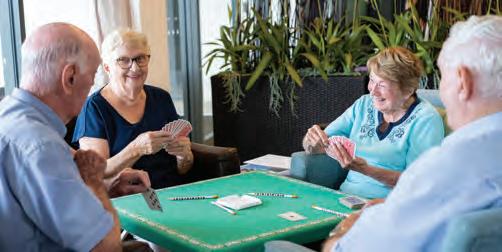
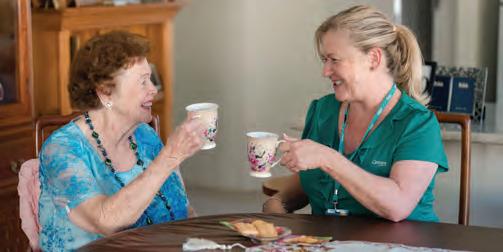
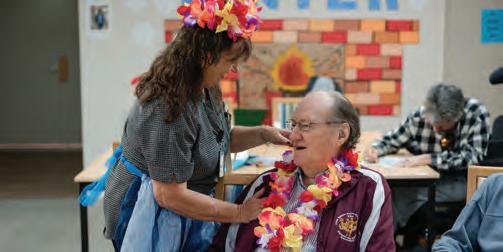
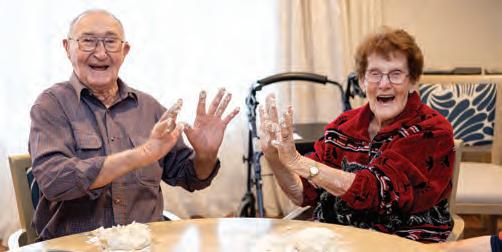
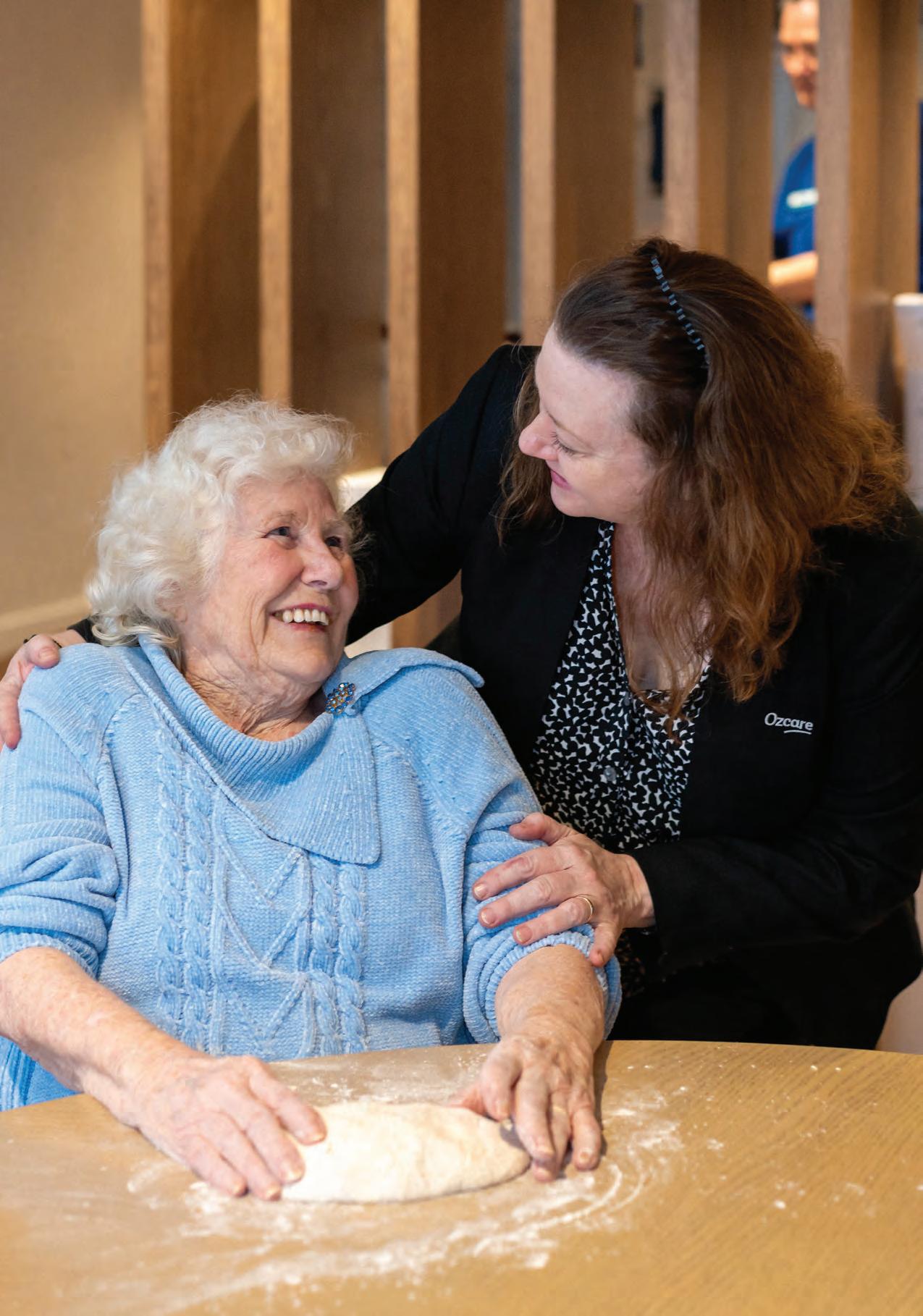
74

75
Costs of residential care
If you do receive income other than your pension, you will be assessed by Centrelink or Veterans’ Affairs if you are a veteran, to determine how much extra you can be asked to pay as an income-tested fee.
If you were a permanent resident in an aged care home, prior to 20 March 2008, you will continue to be subject to the pre-20 March 2008 rules governing the basic daily fee unless you are discharged from permanent aged care for a continuous 28 days.
Accommodation payments
Accommodation payments are different from daily care fees. They are used by the aged care home as capital funding to improve the quality of the buildings and services they provide.
Not everyone pays an accommodation payment. It depends on the value of your assets and income at the time of entry into care.
If you have more than $59,500 in assets and income, you can be asked to pay an accommodation payment, but you must be left with at least $59,500 in assets after your payment (rates as of March 2024).
Means-tested care fee
The means-tested care fee is an extra contribution on top of the other residential aged care payments, and the amount can differ from person to person.
The means-tested care fee will incorporate you financial assets and your income, and then determine how much you will be contributing to the cost of your personal and clinical care services.
This contribution amount can fluctuate depending on if your income or assets change.
There are annual and lifetime caps on the means-tested care fee. There an annual cap of $33,309.29 that will apply to your means-tested contribution to your care costs, together with a lifetime cap of $79,942.44 (March 2024 rates).
Depending on your personal financial situation, you may not have to pay this contribution towards the cost of your care.
How much will I pay?
If you can afford to, you will pay a basic fee of up to 85 percent of the maximum base rate of the Age Pension for a single person, a means-tested (your income and assets combined) contribution to your accommodation and a means-tested contribution to your care.
The maximum means-tested contribution will be allocated toward your accommodation payment until the full cost is paid and then toward your care fee.
Any income-tested contributions you may have made as a recipient of Home Care Packages will be taken into account in calculating lifetime care expenditure.
The family home will continue to be exempt from the aged care assets test if occupied by a spouse or other protected person.
Even when the value of your former home is included as an assessable asset, its value will be capped at $201,231.20 (March 2024 prices). It is only counted in determining your ability to pay for your accommodation.
76 Preparation QUEENSLAND Edition 24 www.AgedCareGuide.com.au
Choose how you pay
When moving into an aged care home, if you have the capacity to contribute to the cost of your accommodation, you can now choose how you pay for it.
You have a choice of three options, however, if you start with one option and change your mind, you have up to 28 days from the date you move into the care home to decide how you wish to pay.
Payment option 1:
Refundable accommodation deposit (RAD)
This is a single payment made to the care home and works similar to an interest-free loan.
The balance of the deposit is guaranteed to be refunded when you leave the home, but only after any amounts which have been used to pay for agreed services have been deducted.
Payment option 2:
Daily accommodation payment (DAP)
In this option, you pay a periodic payment (usually on a monthly basis) for your accommodation; it is calculated based on the daily rate of the RAD.
To calculate the daily payment equivalent of the refundable deposit, the RAD is multiplied by the maximum permissible interest rate (MPIR) and divided by 365 days.
The MPIR is set by the government and is updated every three months –as of 1 April 2024, it is 8.34 percent.
The daily payment amount must be equivalent to the refundable deposit amount and is the maximum you can be charged per day for the room.
These periodical payments are not refunded when you leave the home.
Payment option 3:
Combination payment of RAD and DAP
If you wish, you can also choose to pay a combination of both a RAD and a DAP. For example, let’s assume the RAD is $400,000 but you want to only pay half of a deposit ($200,000) and the other as a DAP.
Use this formula to calculate the DAP:
(Balance of price x MPIR) / 365 = ($400,000 - $200,000) x 8.34% / 365 = $45.69 per day (MPIR from 1 April 2024).
Or use our easy to use fee estimator calculator on agedcareguide.com.au/nursing-home-fee-estimator
For further information, call My Aged Care on 1800 200 422 or Centrelink on 13 23 00, or discuss with a placement consultant or financial advisor.
Disclaimer - This information is a summary of the main provisions relating to aged care costs and while care has been taken to ensure that it is current on date of publication, it should not be taken as an authoritative source. Please phone 1800 200 422 for more complete, up-to-date information.
Costs of residential care
77 Preparation QUEENSLAND Edition 24 www.AgedCareGuide.com.au
Managing the complications of aged care
Many older Australians take up an aged care bed within one month of being assessed for residential aged care. This is often triggered by an unexpected event, such as a fall or a decline in health.
The financial decisions surrounding aged care may be overwhelming, due to the different funding mechanisms that apply.
You may want to know more about your options, the associated costs, how your Age Pension may be affected and whether you need to sell your home.
These can be further complicated by the impact that a move to care has in terms of the pension paid by Centrelink and the fact that the family home is treated differently for pension purposes than for aged care purposes.
Throw in the payment/deposit system — refundable accommodation deposit (RAD) or a daily accommodation payment (DAP) — negotiating various fees with a facility, filling in Centrelink forms and things can quickly become overwhelming.
Just getting a basic understanding of what forms you need to complete, when to complete them and where to send them can be difficult.
By understanding the rules and being able to apply them to individual circumstances, financial advisors are able to save their clients thousands of dollars.
Things you ‘should not’ do
Decide to sell the home before understanding the Age Pension and aged care fee impact.
Choose how you will pay the aged care fees before understanding all of your options.
Make untested or inaccurate assumptions about your ability to meet the aged care costs.
Allow or enable the dominant family member to influence the decisions.
Incorrectly assume that all decisions must be made before you can get the care needed.
Instead, seek help from a certified financial planner who is experienced in aged care.
Financial advice
78 Preparation QUEENSLAND Edition 24 www.AgedCareGuide.com.au
How an expert can help
The best financial strategies and options will depend on your specific circumstances, objectives and situation.
A financial advisor can help you focus on the information and issues that are important to you and your specific financial situation.
While every situation is different, there are some common elements of aged care financial advice which professional consultants often provide to their clients, including:
Strategies to fund accommodation payments
Financial modelling of multiple care options
Review and planning of tax implications
Maximising government pensions
Minimising nursing home fees
Negotiating with aged care facilities
Important questions to ask
Some important questions you should ask before engaging the services of a financial advisor include:
Do they specialise or have experience with aged care?
What licenses, credentials or other certifications do they have?
Will they provide their advice in ‘plain English’ and in writing?
Will they deal with the Department of Veterans’ Affairs or Centrelink?
How much do they charge?
Is the service a once-off or an ongoing service?
You should be open with your financial advisor about your financial situation and what assets are available, so your advisor can provide the best advice for your situation.
That is why, when choosing a financial advisor, you should also consider whether their decisions are considerate and measured as opposed to emotional or impulsive and actively listen.

Financial advice
79 Preparation QUEENSLAND Edition 24 www.AgedCareGuide.com.au
Financial advice
What will it cost?
Fees will vary and it pays to contact a number of experts for a quote on their services so you can compare.
While financial advisor services do cost money, the amount they can save you in the long run can make the advice and services worth it.
Seeking help from an expert means they will be able to access all the benefits and schemes available for your situation that you may not have known about.
Financial counselling
If you’re experiencing financial difficulties and have little income, you may be able to receive free financial counselling services.
Operating from community organisations, financial counsellors can provide independent and confidential information, support and advice on a range of areas including consumer credit law, bankruptcy and debt collection laws, industry hardship policies and government concession frameworks.
A financial counsellor may also be able to assist in negotiations with financial groups and creditors or budgeting and referrals.
Financial counsellors offer practical advice to people facing economic hardship, unlike financial planners who focus on wealth creation strategies.
Peter Donovan CERTIFIED
0414 347 287
E peter@phase3rs.com.au
You can find free and confidential services from a financial counsellor near you through the government’s MoneySmart website, along with dedicated financial counselling services for Aboriginal and Torres Strait Islander peoples from anywhere in Australia. Financial counselling is also available for farmers and rural or regional businesses at risk of fiscal hardship.
Find out more about financial counselling services in your state or territory on financialcounsellingaustralia.org.au or call the National Debt Helpline on 1800 007 007 to speak to a financial counsellor over the phone.
A Suite 2B, Ground Floor 1990 Logan Road Upper Mt Gravatt QLD 4122 W www.phase3rs.com.au D 07 3189 3315
Disclaimer: The information in this book is general in nature and does not constitute legal or financial advice. Readers should seek their own personal
and financial advice from a suitably qualified




legal
practitioner.
FINANCIAL PLANNER
Peter John Donovan Authorised Representative No. 297694 / P J Donovan & Associates Pty Ltd (ABN 54 670 387 247) Trading as Phase 3 Retirement Solutions Corporate Authorised Representative No. 1305553 are authorised representatives of Lifespan Financial Planning Pty Ltd AFSL 229892. PRE-RETIREMENT & RETIREMENT AGED CARE CENTRELINK ESTATE PLANNING SUPERANNUATION www.phase3rs.com.au Aged Care Centrelink Retirement & Estate Planning Peter Donovan Certified Financial Planner peter@phase3rs.com.au 0414 347 287 Peter John Donovan Authorised Representative No. 297694/ P J Donovan & Associates Pty Ltd (ABN 54 670 387 247) Trading as Phase 3 Retirement Solutions Corporate Authorised Representative No. 1305553 are authorised representatives of Lifespan Financial Planning Pty Ltd AFSL 229892. 80 Preparation QUEENSLAND Edition 24 www.AgedCareGuide.com.au
Estate planning
A well-prepared and executed estate plan can not only save your estate unnecessary costs in the future but can also save your loved ones from unnecessary stress after your death.
Estate planning is the process in which you discuss with a legal practitioner what you want to happen with your estate, known as your assets, when you die.
It is a plan that involves you considering who you want to be in charge of your will, who you want to benefit from your estate, your funeral wishes and who you want to look after your financial and personal/health matters if you were to lose capacity during your lifetime, for example, by way of dementia or stroke.
Effective estate planning ensures your assets are protected and distributed to the right people according to your wishes.
A properly drafted, up-to-date will is the only way that you can be sure your assets will be dealt with as you wish when you die.
Executors and administrators
In Queensland, you must name an executor of your will who will carry out the terms you have laid out in your will after you die.
The executor of the estate can apply for a probate from the Supreme Court for permission to take control of the estate.
This means that the court has recognised the will as legally valid and will allow you to deal with the estate.
You don’t always need to get a probate, however, there can be situations where you may require a grant of probate. For example, an organisation may not release assets of the estate if they do not first see a grant of probate.
It’s important to update your will regularly, for instance, if you get married your will is automatically revoked.
On the other hand, getting a divorce does not revoke your will but it does prevent them being appointed as a trustee or receiving any gifts through your estate.
In Queensland, if you die without a valid will, your estate will be treated as an ‘intestate’ and the Public Trustee will be responsible for the estate unless someone is granted a letters of administration.
The only way to ensure that your loved ones are protected is to obtain proper legal advice regarding your estate planning.
To find out more information, visit the website of the Queensland Public Trustee at pt.qld.gov.au or contact the Queensland Office of the Public Guardian on publicguardian.qld.gov.au
planning
Estate
81 Preparation QUEENSLAND Edition 24 www.AgedCareGuide.com.au
Getting assessed

82 Ge tting assessed QUEENSLAND Edition 24 www.AgedCareGuide.com.au
WHAT YOU NEED TO KNOW
Getting assessed
The aged care assessment will help decide what level of support you require. Your assessor will best be able to help you if you provide lots of information about yourself and what day-to-day tasks you struggle with.
The assessment will be done by a social worker, nurse, doctor or other health professional and can take an hour or so.
If the My Aged Care contact centre believes that you are eligible for basic home support you will be assessed by a professional from the Regional Assessment Service (RAS).
If you require higher care support, a member of an Aged Care Assessment Team (ACAT) will visit you at home to assess you for a higher level of support at home to meet your needs or a place in a residential care home.
What should you prepare?
Some of the documents and information you should collect before your assessment include:
Medicare card and a form of identification, for instance, Department of Veterans’ Affairs (DVA) card, driver’s licence, passport or healthcare card
Notes or referrals from your doctor
Information about previous home, community or aged care services you have received
Details about support you receive from family, friends or the community
Prepared questions and information about aged care that you wish to discuss with the assessor so you have a better understanding about services
The contact details of your doctor and any other health professionals you see regularly
A translator or Auslan interpreter arranged if you require one
A support person to be present for the assessment if you want one
During a face-to-face assessment, an ACAT assessor will visit you in your home to get to know you and your circumstances and determine the types of support you need.
The assessor will ask you a number of questions about any supports you receive, your current lifestyle, any health concerns or chronic illnesses, how you deal with tasks at home, if you are struggling with any cognitive issues or memory loss, whether you are struggling at home or have concerns about personal safety, in addition to any activities you engage in with family or in the community.
Getting assessed STEP 3
83 Ge tting assessed QUEENSLAND Edition 24 www.AgedCareGuide.com.au
Assessments explained
Topics that might be covered or that you may want to bring up during your assessment include your: medical history; living arrangements; support network; existing forms of support and services; cognitive and behavioural functions; ability to perform daily tasks; health and lifestyle concerns.
Be open and transparent about your wishes and what you believe will be of assistance around the home. They might also ask for your permission to talk with your doctor or specialist about the impact of any health conditions on your day-to-day life.
The assessment is also an opportunity for you to ask questions — if you don’t understand something, make sure you clarify with your assessor You shouldn’t be leaving your assessment confused or stressed.
Some of the questions you may want to ask are:
What are my rights and responsibilities during this assessment process?
What services are available in my area?
Are there support options available for my carer?
What financial assistance am I eligible to receive?
Are there culturally appropriate services in the area?
Who can I contact if I have any questions after the assessment?
If you don’t want to receive government-funded home care or go into government-funded aged care, then that is perfectly fine. There are private providers who don’t require any assessment to receive care or enter their facilities. However, you can’t receive government funding to pay for your stay in a private nursing home.
How long does it take?
The ACAT assessment will take around an hour and at the end of the meeting the assessor will discuss the results of the assessment with you. They will review the information you have provided to determine what support option best suits you.
You will receive a letter within two weeks of your assessment to let you know if you have been found eligible for aged care services. This letter will also detail the types of services you will be able to access and any further information about how to access these supports.
If your situation is urgent, it may only take a couple of days before you get confirmation of approval for aged care.
You’ll be given a referral code linked to the type of service you are eligible to access. The service provider or aged care home of your choice will need this referral code to access your information with My Aged Care and manage the referral. They’ll also be able to access the funding allocated to you.
84 Ge tting assessed QUEENSLAND Edition 24 www.AgedCareGuide.com.au
When you’re ready to start looking for providers to deliver the support services you have been found eligible for, you can use our online directory at AgedCareGuide.com.au for a comprehensive overview of the care options and care providers available near you.
Being approved for funded supports doesn’t always mean you will be able to access services straight away. You may need to wait until a suitable package or place in an aged care home comes available, and wait times can range from a few weeks to a number of months.
What if I’m unhappy with my assessment results?
You have the final decision to accept or reject an ACAT recommendation.
If you are unhappy with the recommendations, first talk with the person in charge of the ACAT; most concerns can be resolved this way.
If you can’t come to an agreement, you can appeal the decision and have the assessment reviewed.
To have the decision reviewed, you must write to the Secretary of the Australian Department of Health within 28 days of your assessment letter arriving. The request should be answered within 90 days with a decision.
If you do not agree with the secretary’s review, you can escalate the matter further by contacting the Administrative Appeals Tribunal.
While asking for a review by the secretary is free, the Administrative Appeals Tribunal does incur a charge.
Getting assessed

85 Ge tting assessed QUEENSLAND Edition 24 www.AgedCareGuide.com.au
Finding providers

Finding pr oviders 86 QUEENSLAND Edition 24 www.AgedCareGuide.com.au
STEP 4 WHAT YOU NEED TO KNOW Finding providers
Once you have been assessed and approved for government-funded aged care, either for services in your own home or a place in an aged care home, you can start the process of finding a provider that suits your needs.
Your letter from My Aged Care confirming you are ready to start accessing services will include a referral code linked to the type of service you are eligible to access. If you need the support of multiple services, you will be given multiple referral codes, one for each service.
The service provider or aged care home of your choice will need this referral code to access your information with My Aged Care and manage the referral. They’ll also be able to access the funding allocated to you.
Choosing which provider to trust with providing support is an important and personal decision — one that you want to think carefully about and shouldn’t rush.
You may want to start by writing down what you are looking for in a provider and what is important to you. Are low fees important to you or would you like a provider who can support your cultural needs? If accessing home care, do you want the same support worker to assist you each time and do you want to receive support on specific days or are you more flexible with time?
It’s a good idea to discuss your wishes and options with your family and support network, as they may be able to help you research, provide independent opinions on providers or share personal experiences.
It’s useful to create a shortlist of providers in your local area, which may help narrow down your search.
When considering a potential provider, take your time to do some research:
Look at the provider’s website, social media pages and online reviews.
Check out their credentials, such as quality certifications and industry awards.
Do they have any past or present sanctions or notices of non-compliance?
You can ask them directly or check the government’s non-compliance finder tool at myagedcare.gov.au/ non-compliance-checker.
You can use this Guide or the AgedCareGuide.com.au directory online to search for service providers in your area that meet your requirements.
Finding providers
Finding pr oviders 87 QUEENSLAND Edition 24 www.AgedCareGuide.com.au
Choosing a provider
If you aren’t comfortable finding or choosing a provider by yourself, there are experts who can help you find a nursing home that suits your needs and preferences. A placement consultant has knowledge of local aged care facilities and can make the process of entering aged care smoother. Find a placement consultant on AgedCareGuide.com.au or call 1300 606 781 to access placement services.
Once you have chosen a provider, you will need to contact them to start the home care services you need or to be placed on their waiting list for a bed vacancy. During this conversation, it is also essential to discuss fees and services with your new provider so you know how much the support or aged care bed is going to cost.
Choosing a provider
When looking into home care services, here are some things to investigate and ask the provider you are considering:
Do they service your area?
Is the company Australian-owned?
Is it independent or part of a franchise?
Do the owners / operators have experience in home care?
Does the company have appropriate insurance?
Does the company comply with Australian tax law? For example, does it charge GST appropriately?
Do they provide documents about financial arrangements before service begins?
Do they have a service agreement? It is important so that there’s no misunderstanding about the service and cost to be provided.
Are they flexible? After all, it is all about you.
What are their recruitment processes?
Is there a criminal background check performed prior to employment with an agency?
Does the company provide workers compensation for employees? This is important so that you are not responsible for any injuries that occur on the job.
How do they determine appropriate staff for your needs? If a company asks where you live and then offers you staff before even hearing about your needs, you can be reasonably assured they allocate based on location as a priority.
Is it possible to interview potential carers and make a selection after those interviews?
Do you get to decide what times and days suit your needs?
What is the minimum shift length?
Do they have male/female workers and can they cater for specific cultural backgrounds?
Who will be working in the home? Will there be regular staff providing continuity of care or do they change shifts around?
Finding pr oviders 88 QUEENSLAND Edition 24 www.AgedCareGuide.com.au
Is there a professional staff member, such as a registered nurse, who liaises with you to create a plan that meets your needs?
Who is the organisation’s main contact for you?
Do you meet a manager / owner and then never hear from them again? What additional support is offered within the cost of your care? For example, are they available 24/7?
You’ll find a list of in-home care service providers from page 97 in this Guide or visit AgedCareGuide.com.au to find providers servicing your location.
A placement consultant makes your job easier
Needing to place a loved one into an aged care home can be a highly stressful event for families and carers.
You might think it’s a lack of information or understanding , but it’s because you are both the carer and the person emotionally involved, as well as the decision maker.
This process can be eased significantly with the help of an aged care placement consultant who can take control of the running around, paperwork and planning.
Moving into residential care is a situation most people postpone for as long as possible until the point of necessity, often leaving little time to organise everything.
If some initial planning were to be undertaken it could soothe the transition and reduce the stress at what is a critical turning point in people’s lives.

Placement consultants
Phone 1300 730 074 www.haaa.com.au Servicing all of Queensland and Northern New South Wales region Need To Place Someone Into Care? High and low care placements into aged care Respite and Permanent Specialising in Frail Aged, Dementia, Behavioural Issues You don’t need to go through the process alone, we can Help! Case management services also available Finding pr oviders 89 QUEENSLAND Edition 24 www.AgedCareGuide.com.au
Placement consultants
Planning should include obtaining information on the financial implications of entering residential care, gaining information on the facilities available in your area and ensuring wills, powers of attorney and guardianship are up-to-date.
A placement consultant can take over a lot of the stress of searching for and transitioning into an aged care home. These professionals can also assist you in finding a bed placement more promptly because of their connections with aged care providers and services.
How a placement consultant can help
Every single transition to aged care is unique and a placement consultant will take several things in consideration to make sure the advice is right for your circumstances:
Are you looking for care options for a single person or a couple? Is there a physical condition that is deteriorating, are mental faculties and awareness impaired? Is there acceptance or understanding of this part of the journey? What are the family dynamics around the placement decision and the impact on everyone involved?
Having extensive knowledge of facilities in their area, as well as the placement process, an aged care placement consultant can often find a home faster, and one that is specially suited to your requirements.
Through their established relationships with aged care homes, they are familiar with the culture of each home and, most importantly, they have advanced knowledge when vacancies become available.
By knowing the culture of each facility and getting to know you, placement consultants can determine which homes would best suit your needs and preferences, and make prior applications to these homes.
Without the assistance of an aged care placement consultant, you or your carer would need to constantly phone the facilities of your choice to demonstrate your eagerness and commitment to obtaining a bed in that home.
Negotiate and advocate for you
The aged care placement consultant advocates on behalf of you and your family and is able to assist with the whole assessment process. They also complete all the necessary paperwork and application forms for entry into an aged care home which is helpful, as the applications can be quite daunting. They may suggest seeking financial advice where required.
An aged care placement consultant helps share the load at this crucial time, can significantly speed up the time it usually takes to find a placement at a suitable home, thereby easing the transition into residential care.
Be sure about your expectations of service and what the placement consultant is able to provide, including: Face-to-face family meetings to discuss your situation and a respect for the emotions of all the family members involved
Finding pr oviders 90 QUEENSLAND Edition 24 www.AgedCareGuide.com.au
Support and recommendations that cater for the specific requirements of your family and loved one
Counsel that prioritises family sensitivities, needs and special requests, before asking how much money is available and getting the status of the financial situation
Practical assistance with urgent placement situations — which they often are — where reducing the typical waiting times or arranging respite care is a necessity
Choosing a placement consultant
There are many qualified placement consultants within Queensland who can help you in your aged care journey.
When you’re choosing a placement consultant to support you through the aged care transition, look for someone who is an expert in building and nurturing relationships, who is unbiased and independent and has no business investment or alignment with any aged care facility.
An independent professional is able to provide guidance based entirely on your individual circumstances, not biased by commission or kickbacks from any particular facility or provider.
Choose an advocate who will ease your concerns, supporting your family with all aspects of this transition, allowing you to focus on your loved one. Placement consultants are most happy for you to call them for a chat and understand you may talk to a number of them before making your choice. You can be open in your discussions because, as health professionals, they have a policy of confidentiality.
Their professional fees may differ and it is reasonable to advise them if you are working to a budget.
Some placement consultants charge by the hour, whilst others offer a package of services for one fixed price. Ensure that you are advised of all the possible fees and costs up front.

We make finding the right nursing home placement for your family stress free.
Placement consultants
Providing independent, professional assistance with all aged care options, covering Northern New South Wales & South East Queensland, including Toowoomba
• 100% independent –no commissions
• Fully disclosed fixed fee
• Confidential meeting
• Explanation of all related costs
• Completion of all documentation including Centrelink/DVA/QCAT forms
• Unique comprehensive facility report
• Submission and follow up of all applications
• Coordination of admission
• Post placement follow up service
• Proudly QLD owned & operated
Leading Aged Care Consultants
To learn more, please contact: Julia 0411 220 129 or Jill 0411 701 196 info@agedcareassistance.com.au • www.agedcareassistance.com.au Finding pr oviders 91 QUEENSLAND Edition 24 www.AgedCareGuide.com.au
Placement consultants
Finally, make sure you feel comfortable talking with the placement consultant, because your professional relationship will rely on them understanding what you want and organising the appropriate care services to meet those needs.
Resolving family disputes
Placing a family member into care can be life-changing. There are many factors — physical, social, psychological and financial — that may arise which families sometimes find too difficult to cope with by themselves.
Each family member may want their opinion to be considered when it comes to making important decisions. There are specialist health professionals who offer independent, non-judgmental services, which can explore the subtleties of each situation and offer caring support in addition to counselling and conflict resolution.
Feelings of guilt
The journey into aged care is often a challenging and emotional time. Not only for you, the person going into care, but also for family members who have sometimes cared for their loved one for a long time.
You may feel rejected and unloved, scared to take the step of going into care and worry you’ll lose your independence.
At the same time, many family members feel guilty about not being able to look after their loved one anymore. They feel overwhelmed by the aged care system and can’t give the assistance that is required.
Finding professional support may relieve you from negative beliefs and provide you with coping skills which can ease the difficult journey towards placing a loved one in care.
Some placement consultants offer counselling as part of their services or may be able to refer you to a counsellor.
You can find placement consultants in the products and services directory on page 159 or search on AgedCareGuide.com.au.
Case management
The case management process uses a comprehensive approach to identify and implement health and social care services to optimise your health, quality of life and active participation in the community.
Case management may be short- or long-term or episodic. It plans for both current situations and your long-term needs.
Case managers work in partnership with you, your carer and family, as well as other service providers to develop and implement individualised care plans and strategies best suited to your needs and goals.
Health-based case managers are usually a nurse, social worker or allied health professional.
Community-based case managers generally have skills from a range of disciplines such as social workers, behavioural science, allied health or nursing.
Finding pr oviders 92 QUEENSLAND Edition 24 www.AgedCareGuide.com.au
If you are eligible for a government-funded care package, case managers are often assigned through your service provider as part of your Home Care Package or home care services.
However, If you have complex and multiple needs and you’re looking at different care options or you would prefer not to use a government-funded package, you may choose to use the services of a private case manager.
Private case management services are supplied by experienced, tertiary-qualified case managers, to provide support services and coordination across a wide range of community and supportive health services.
Waiting periods for private case management are generally reduced compared to some government-subsidised services.
The duration of private case management is flexible and may be short-term or ongoing, depending on your needs.
How much does it cost?
The service of a private case management is not government-subsidised in any way, so you will be charged for all services.
Hourly rates vary between private case management organisations, so always ask for a breakdown of costs before employing them.
Generally, an invoice for all care services purchased on your behalf will be provided to you each month.
Many case managers offer no-lock-in contracts, meaning care can be arranged for one, several or many ongoing visits and you only pay for what you use.
Care planning
The aim of care planning is to provide appropriate and coordinated care that you have control over. Care plans are person-centred and prioritise the needs identified in the comprehensive assessment.
The case manager implements the care plan and this may include identifying support services that other community care agencies will provide.
Services may include the purchase or hire of equipment or installation of assistive aids, such as bathroom rails, and negotiating with support agencies for delivery of services.
The case manager also monitors each individual to ensure the service provision is effective and financially accountable, to identify changes and make adjustments to the care plan if needed.
Placement consultants
Finding pr oviders 93 QUEENSLAND Edition 24 www.AgedCareGuide.com.au
Council (LGA) reference index
The tables below provide you with an alphabetised list of LGAs and the page reference where you can find details about Home Care Packages and aged care homes in that local government area (commonly referred to as a Council District).
Alpha 115-120
Aramac 115-120
Aurukun 115-120
Balonne 115-120 138
Banana 115-120 138
Barcaldine 115-120 138
Barcoo 115-120
Blackall-Tambo 115-120 138
Boulia 115-120
Brisbane 106-113 124-128
Bulloo 115-120
Bundaberg 115-120 138
Burdekin 115-120 138
Burke 115-120
Cairns 115-120 139
Carpentaria 115-120 139
Cassowary Coast 115-120 139
Central Highlands 115-120 139
Charters Towers 115-120 140
Cherbourg 115-120 140
Cloncurry 115-120
Cook 115-120 140
Croydon 115-120
Diamantina 115-120
Doomadgee 115-120 140
Douglas 115-120 140
Etheridge 115-120
Flinders 115-120
94 QUEENSLAND Edition 24 Aged Car e Guide Council District Page Reference Home Care Residential
Council District Page Reference Home Care Residential Fraser Coast 115-120 140-141 Gladstone 115-120 141 Gold Coast 106-113 128-130
115-120 141 Gympie 115-120 141 Hinchinbrook 115-120 141 Hope Vale 115-120 141 Ipswich 106-113 131 Isaac 115-120 141 Jericho 115-120 Kowanyama 115-120 Livingstone 115-120 142 Lockhart
115-120 Lockyer Valley 106-113 131 Logan 106-113 131-132 Longreach 115-120 142 Mackay 115-120 142 Mapoon 115-120 Maranoa 115-120 142 Mareeba 115-120 142 McKinlay 115-120 Moreton Bay 106-113 132-134 Mornington 115-120 142 Mount Isa 115-120 143 Murweh 115-120 143 Muttaburra 115-120 Napranum 115-120 Noosa 115-120 143 Council District Page Reference Home Care Residential North Burnett 115-120 143 Northern Peninsula 115-120 Palm Island 115-120 143 Paroo 115-120 Pormpuraaw 115-120 Quilpie 115-120 Redland 106-113 134-135 Richmond 115-120 Rockhampton 115-120 143-144 Scenic Rim 106-113 135 Somerset 106-113 135 South Burnett 115-120 144 Southern Downs 115-120 144 Sunshine Coast 106-113 135-137 Tablelands 115-120 144 Toowoomba 115-120 145-146 Torres 115-120 146 Torres Strait Island 115-120 Townsville 115-120 146 Weipa 115-120 146 Western Downs 115-120 146-147 Whitsunday 115-120 147 Winton 115-120 Woorabinda 115-120 147 Wujal Wujal 115-120 Yarrabah 115-120 147
Goondiwindi
River
Suburb & town reference index
A list of suburbs and the page references where all the aged care homes in that suburb are listed. If a suburb/town is not listed, please refer to the next closest suburb.
Suburb / Town Page
Acacia Ridge 124
Albany Creek 132
Alexandra Headland 135
Alexandra Hills 134
Algester 124
Allora 144
Alpha 138
Annandale 146
Annerley 124
Arundel 128
Ashgrove 124
Ashmore 128
Aspley 124
Atherton 144
Ayr 138
Bald Hills 124
Barcaldine 138
Bardon 124
Bargara 138
Beachmere 132
Beaconsfield 142
Beaudesert 135
Beerwah 135
Bellmere 132
Benowa 128
Bethania 131
Biggenden 143
Biggera Waters 128
Biloela 138
Birkdale 134
Birtinya 135
Blackall 138
Bli Bli 135
Bongaree 132
Boonah 135
Boondall 124
Boronia Heights
Bowen 147
Boyne Island 141
Brassall 131
Bray Park 132
Brighton 124
Brookfield 124 Suburb
QUEENSLAND Edition 24 95 AgedCareGuide.com.au
131
/ Town Page Browns Plains 131 Buderim 135 Bulimba 124 Bundaberg 138 Bundaberg North 138 Burdell 146 Burleigh Heads 129 Burleigh Waters 129 Burnside 136 Burpengary 133 Burpengary East 133 Caboolture 133 Cairns 139 Calamvale 124 Caloundra 136 Capalaba 134 Caravonica 139 Carbrook 131 Cardwell 139 Carina 124 Carindale 124 Carseldine 124 Chapel Hill 124 Charleville 143 Charters Towers 140 Chelmer 124 Cherbourg 140 Chermside 125 Chermside West 125 Childers 138 Chinchilla 146 Clear Island Waters 129 Clermont 141 Cleveland 134 Clifton 145 Clontarf 133 Collinsville 147 Condon 146 Cooktown 140 Coolangatta 129 Coolum Beach 136 Cooroy 143 Coorparoo 125 Suburb / Town Page Corinda 125 Cornubia 131 Cranley 145 Crows Nest 145 Currimundi 136 Currumbin Waters 129 Dalby 146 Deception Bay 133 Dicky Beach 136 Doomadgee 140 Douglas 146 Drewvale 125 Dunwich 134 Durack 125 Eagleby 132 Eastern Heights 131 Edens Landing 132 Edge Hill 139 Edmonton 139 Eidsvold 143 Eight Mile Plains 125 Elanora 129 Emerald 139 Ferny Grove 125 Ferny Hills 133 Flinders View 131 Forest Lake 125 Fortitude Valley 125 Gatton 131 Gayndah 143 Geebung 125 Gin Gin 138 Glen Eden 141 Glenella 142 Glenvale 145 Goondiwindi 141 Gordonvale 139 Gracemere 143 Granville 140 Greenbank 132 Gununa 142 Gympie 141 Hamilton 125 Suburb / Town Page Helensvale 129 Herberton 144 Highfields 145 Highgate Hill 125 Hillcrest 132 Holland Park 125 Holland Park West 125 Home Hill 138 Hope Island 129 Hope Vale 140 Idalia 146 Indooroopilly 125 Ingham 141 Innisfail 139 Ipswich 131 Jandowae 146 Jimboomba 132 Julatten 142 Kallangur 133 Kangaroo Point 125 Kawana 143 Kawungan 140 Kearneys Spring 145 Kelvin Grove 126 Kenmore Hills 126 Keperra 126 Kepnock 138 Kewarra Beach 139 Kilcoy 135 Killarney 144 Kingaroy 144 Kippa-Ring 133 Kirwan 146 Kuluin 136 Labrador 129 Laidley 131 Lawnton 133 Little Mountain 136 Logan Central 132 Logan Reserve 132 Longreach 142 Lowood 135 Lutwyche 126
Suburb & town reference index
Suburb
Manly
Maroochydore
Meridan
Mitchelton
96 QUEENSLAND Edition 24 Aged Car e Guide
continued
/ Town Page
142
144
136
126
Mackay
Malanda
Maleny
Manly
West 126
142
Mareeba
136
140
Maryborough
Plains 136
Beach 129
129
Ridge 145
147 Millbank 138
145 Mirani 142
Mermaid
Merrimac
Middle
Miles
Millmerran
126
143
139
133
126
140
Coolum 137
Gravatt 126
Gravatt East 126
Isa 143 Mount Lofty 145
Louisa 146
Morgan 143
Ommaney 126
Warren Park 132
129
146
143 Murgon 144
Downs 134 Nambour 137 Nanango 144 Narangba 134 Nerang 129 New Auckland 141 New Farm 126
126 Newstead 126 Suburb / Town Page Noosa Heads 143 Noosaville 143 Norman Gardens 144 Normanton 139 North Ipswich 131 North Lakes 134 North Mackay 142 North Rockhampton 144 North Tamborine 132 Nudgee 126 Nundah 126 Oakey 145 Oxley 126 Pacific Paradise 137 Palm Island 143 Palmwoods 137 Park Avenue 144 Parkinson 126 Parkwood 129 Pelican Waters 137 Peregian Springs 137 Pialba 140 Pimlico 146 Pimpama 130 Pine Mountain 131 Pinjarra Hills 127 Pittsworth 145 Point Vernon 140 Port Douglas 140 Proserpine 147 Raceview 131 Rangeville 145 Redcliffe 134 Redland Bay 134 Redlynch 139 Richmond Hill 140 Riverview 131 Robina 130 Rockhampton 144 Rocklea 127 Rockville 145 Roma 142 Rosalie 127 Rosewood 131 Suburb / Town Page Rothwell 134 Rowes Bay 146 Runaway Bay 130 Salisbury 127 Sandgate 127 Sarina 142 Scarborough 134 Seven Hills 127 Sinnamon Park 127 Sippy Downs 137 Slacks Creek 132 South Toowoomba 145 Southport 130 Springsure 139 Springwood 132 St George 138 Stanthorpe 144 Sunnybank Hills 127 Sunrise Beach 143 Surat 142 Taigum 127 Tallebudgera 130 Tara 147 Taroom 138 Tewantin 143 The Gap 136 Theodore 138 Thornlands 135 Thursday Island 146 Tin Can Bay 141 Tinana 140 Toogoolawah 135 Toowong 127 Toowoomba 145 Toowoomba City 146 Torquay 140 Townsville 146 Townview 143 Trebonne 141 Tugun 130 Tully 139 Twin Waters 137 Upper Coomera 130 Upper Mount Gravatt 127 Suburb / Town Page Urangan 141 Urraween 141 Varsity Lakes 130 Victoria Point 135 Wamuran 134 Warana 137 Warwick 144 Weipa 146 Wellington Point 135 West Mackay 142 Westcourt 139 White Rock 139 Whitfield 139 Windsor 128 Wishart 128 Wondai 144 Woodford 134 Woodridge 132 Woolloongabba 128 Wooloowin 128 Woombye 137 Woorabinda 147 Wynnum 128 Wynnum North 128 Wynnum West 128 Yarrabah 147 Yeppoon 142 Yeronga 128 Zilzie 142
Monto
Mooroobool
Morayfield
Morningside
Mossman
Mount
Mount
Mount
Mount
Mount
Mount
Mount
Mount
Mudgeeraba
Mundingburra
Mundubbera
Murrumba
Newmarket
In-home Care Services
See
AgedCareGuide.com.au 97 ATSI Aboriginal, Torres Strait Islander CALD Culturally and Linguistically Diverse DVA Department of Veterans' Affairs LGBTIQ Lesbian, Gay, Bisexual, Transgender, Intersex and Questioning NESB Non-English Speaking Background VHC Veterans' Home Care D Divider IBC Inside Back Cover IFC Inside Front Cover OBC Outside Back Cover QUEENSLAND Edition 24
Definition
Terms pages 160 -161 Notes Advert Page DPS Web ID PHONE (07) CHSPFunded Services PrivatelyFundedServicesDVAServicesVHCServicesDementiaCareDomesticAssistanceHealthProfessionalsHomeMaintenance/Gardening Meals&/orShoppingMedicationSupervisionPalliativeCarePersonalCarePharmaceuticalDeliveryRespiteCareSocial&/orRecreational Transport Able Australia Services - QLD - Jimboomba 1300 225 369 9 61326 Able Australia Services - QLD - Southport 1300 225 369 9 9 9 9 47948 Alliance Rehabilitation 4772 1219 9 44175 Amazing ProCare - Brisbane 0493 426 779 9 9 9 9 9 9 9 9 9 9 9 9 9 27 70963 Amazing ProCare - Gold Coast 5515 7905 9 9 9 9 9 9 9 9 9 9 9 9 9 27 70966 Amazing ProCare - Toowoomba 0400 277 257 9 9 9 9 9 9 9 9 9 9 9 9 9 9 9 27 70968 Amazing ProCare - Tweed Head 5515 7905 9 9 9 9 9 9 9 9 9 9 9 9 9 27 70967 Angelic Care 1300 710 952 9 9 9 9 9 9 9 9 9 9 9 9 Referral services for Allied Health 63527 Angels in Aprons Brisbane North 0406 076 885 9 9 9 9 9 9 9 9 9 9 9 9 Note 1 29 21480 Angels in Aprons Brisbane South 0406 076 885 9 9 9 9 9 9 9 9 9 9 9 9 Note 1 29 62019 Angels in Aprons Respite Service 3356 2565 9 9 9 9 9 9 9 9 9 9 9 9 9 Note 1 29 21780 Anglicare SQ Caboolture Help at Home 1300 610 610 9 9 9 9 9 9 9 9 9 9 9 9 17230 Anglicare SQ Gold Coast Help at Home 1300 610 610 9 9 9 9 9 9 9 9 9 9 9 9 17233 Anglicare SQ Home Maintenance & Mods Brisbane 1300 610 610 9 37755 Anglicare SQ Kilcoy Community Services 1300 610 610 9 9 9 9 9 9 9 9 9 9 9 9 9 38552 Anglicare SQ Logan Help at Home 1300 610 610 9 9 9 9 9 9 9 9 9 9 9 9 17232 Anglicare SQ Longreach Help at Home 1300 610 610 9 9 9 9 9 9 9 9 9 9 9 9 9 20008 Anglicare SQ Metro North Help at Home 1300 610 610 9 9 9 9 9 9 9 9 9 9 9 9 17461 Anglicare SQ Metro South Help at Home 1300 610 610 9 9 9 9 9 9 9 9 9 9 9 17235 Anglicare SQ Roma Help at Home 1300 610 610 9 9 9 9 9 9 9 9 9 9 9 9 9 17231 Anglicare SQ Sunshine Coast Help at Home 1300 610 610 9 9 9 9 9 9 9 9 9 9 9 9 19078 Anglicare SQ Toowoomba Help at Home 1300 610 610 9 9 9 9 9 9 9 9 9 9 9 9 9 17225 Anglicare SQ Townsville Help at Home 1300 610 610 9 9 9 9 9 9 9 9 9 9 9 9 17228 Anglicare SQ West Moreton Help at Home 1300 610 610 9 9 9 9 9 9 9 9 9 9 9 9 9 18676 Anglicare SQ Wide Bay Help at Home 1300 610 610 9 9 9 9 9 9 9 9 9 9 9 9 18732 Bannister In Home Care 02 9212 2911 9 9 9 9 9 9 9 9 41110 Bannister In Home Care (QLD) 1300 368 991 9 9 9 9 9 9 9 9 9 38315 BodeWell Community Care QLD Privately Funded Serv 1300 172 514 9 9 9 9 9 9 9 9 9 9 IFC-1 19972 Bolton Clarke Brisbane Metro Logan At Home Support 1300 221 122 9 9 9 9 9 9 9 9 9 9 9 9 9 Fee-for-service if required 18029 Bolton Clarke Brisbane Metro North At Home Support 1300 221 122 9 9 9 9 9 9 9 9 9 9 9 9 9 9 20344 Bolton Clarke Brisbane Metro South At Home Support 1300 221 122 9 9 9 9 9 9 9 9 9 9 9 9 9 18711 Bolton Clarke Caboolture At Home Support 1300 221 122 9 9 9 9 9 9 9 9 9 9 9 9 9 9 9 Excludes meals 19418 Bolton Clarke Cairns At Home Support 1300 221 122 9 9 9 9 9 9 9 9 9 9 9 9 Fee-for-service if required 18360 Bolton Clarke Gold Coast & Tweed Heads At Home Support 1300 221 122 9 9 9 9 9 9 9 9 9 9 9 9 9 9 18364 Bolton Clarke Ipswich At Home Support 1300 221 122 9 9 9 9 9 9 9 9 9 9 9 9 9 19381 Bolton Clarke Mackay At Home Support 1300 221 122 9 9 9 9 9 9 9 9 9 9 9 9 9 19417 Bolton Clarke Rockhampton At Home Support 1300 221 122 9 9 9 9 9 9 9 9 9 9 9 9 19372 Bolton Clarke Sunshine Coast At Home Support 1300 221 122 9 9 9 9 9 9 9 9 9 9 9 9 9 18362 Bolton Clarke Toowoomba At Home Support 1300 221 122 9 9 9 9 9 9 9 9 9 9 9 9 18361 Bolton Clarke Townsville At Home Support 1300 221 122 9 9 9 9 9 9 9 9 9 9 9 9 19371 Bolton Clarke Wide Bay Bundaberg At Home Support 1300 221 122 9 9 9 9 9 9 9 9 9 9 9 9 18363
1.
overnight respite, transition and 24-hour care
of
Note:
Inc
In-home Care Services
See Definition of Terms pages 160 -161
Aged Car e Guide 98 ATSI Aboriginal, Torres Strait Islander CALD Culturally and Linguistically Diverse DVA Department of Veterans' Affairs LGBTIQ Lesbian, Gay, Bisexual, Transgender, Intersex and Questioning NESB Non-English Speaking Background VHC Veterans' Home Care D Divider IBC Inside Back Cover IFC Inside Front Cover OBC Outside Back Cover QUEENSLAND Edition 24
Notes Advert Page DPS Web ID PHONE (07) CHSPFunded Services PrivatelyFundedServicesDVAServicesVHCServicesDementiaCareDomesticAssistanceHealthProfessionalsHomeMaintenance/Gardening Meals&/orShoppingMedicationSupervisionPalliativeCarePersonalCarePharmaceuticalDeliveryRespiteCareSocial&/orRecreational Transport Bolton Clarke Wide Bay Hervey Bay At Home Support 1300 221 122 9 9 9 9 9 9 9 9 9 9 9 9 21069 Carinity Home Care Bribie Island & Caboolture 1300 109 109 9 9 9 9 9 9 9 9 9 9 9 9 Note 1 10 62062 Carinity Home Care Brisbane 1300 109 109 9 9 9 9 9 9 9 9 9 9 9 9 Note 1 10 62064 Carinity Home Care Ipswich & Surrounds 1300 109 109 9 9 9 9 9 9 9 9 9 9 9 9 Note 1 10 17370 Carinity Home Care Logan 1300 109 109 9 9 9 9 9 9 9 9 9 9 9 9 Note 1 10 20850 Carinity Home Care Rockhampton 1300 109 109 9 9 9 9 9 9 9 9 9 9 9 9 Note 1, within Rockhampton region 10 17390 Carinity Home Care South Coast 1300 109 109 9 9 9 9 9 9 9 9 9 9 9 9 Note 1 10 20345 Carinity Home Care Sunshine Coast 1300 109 109 9 9 9 9 9 9 9 9 9 9 9 9 Note 1 10 62063 Carinity Home Care Toowoomba & Surrounds 1300 109 109 9 9 9 9 9 9 9 9 9 9 9 9 Note 1 10 39061 Carinity Home Care Townsville 1300 109 109 9 9 9 9 9 9 9 9 9 9 9 10 39062 Carinity Home Care Wide Bay 1300 109 109 9 9 9 9 9 9 9 9 9 9 9 9 Note 1 10 17394 Catholic Healthcare Home Care Services Qld 1800 225 474 9 9 9 9 9 9 9 9 9 9 38609 Centacare Brisbane North 1300 236 822 9 9 9 9 9 9 9 9 9 9 9 Note 2 34 17259 Centacare Brisbane South 1300 236 822 9 9 9 9 9 9 9 9 9 9 9 Note 2 34 61576 Centacare Fraser Coast and Kingaroy 1300 236 822 9 9 9 9 9 9 9 9 9 9 9 Note 2 34 20320 Centacare Home Safety Services, Home Assist Services 1300 236 822 9 9 9 34 37754 Centacare Logan, Gold Coast & Beaudesert 1300 236 822 9 9 9 9 9 9 9 9 9 9 9 34 17418 Centacare Moreton Bay 1300 236 822 9 9 9 9 9 9 9 9 9 9 9 34 17310 Centacare South West 1300 236 822 9 9 9 9 9 9 9 9 9 9 9 34 18691 Centacare Sunshine Coast 1300 236 822 9 9 9 9 9 9 9 9 9 9 9 34 18690 Cherubs Home Cleaning and Care Support 0488 585 348 9 9 9 9 9 9 55228 Claro Aged Care & Disability Services 1300 303 770 9 9 9 9 9 9 9 9 9 Note 3 22122 Co.As.It. Community Services 3624 6100 9 9 9 9 9 9 9 9 9 9 9 9 9 9 Note 4 167 18688 Co.As.It. Community Services - CHSP Provider 3624 6100 9 9 9 9 9 9 9 9 9 Note 5 167 22343 Co.As.It. Community Services - HCP Provider 3624 6100 9 9 9 9 9 9 9 9 9 9 9 9 9 9 167 17263 Co.As.It. Community Services - QCSS 3624 6100 9 9 9 9 9 167 38160 Core & Capacity Disability Support 0431 005 572 9 9 9 9 9 9 9 9 9 9 64427 Drake Medox 1300 360 070 9 9 9 9 9 9 40230 Five Good Friends Brisbane East and Bayside 1300 787 581 9 9 9 9 9 9 9 9 9 9 9 Assistive technology, wellbeing calls 63113 Five Good Friends Brisbane Fraser Coast & Bundaberg 1300 787 581 9 9 9 9 9 9 9 9 9 9 9 9 9 63114 Five Good Friends Home Care Services QLD 1300 787 581 9 9 9 9 9 9 9 9 9 9 9 Assistive technology, wellbeing calls 22111 Gourmet Meals 1300 112 112 9 53996 HammondCare At Home Brisbane 1800 826 166 9 9 9 9 9 9 9 9 9 9 9 CHSP not available in Brisbane North 22072 HCA Home QLD 1300 422 111 9 9 9 9 9 9 9 9 9 9 9 9 38172 Help at Hand Support Services 03 8699 8211 9 9 9 9 9 9 9 9 62707 Home and Daily Living 1800 448 448 9 9 9 9 9 9 9 9 Services do not inc gardening 55 18349 Home care & community care (Wesley Mission Queensland) 1800 448 448 9 9 9 9 9 9 9 9 9 9 9 9 9 55 17275 Home Care Blackall and District 4657 6777 9 9 9 9 9 9 9 9 9 9 9 9 9 57 19062 Home Care Bribie Island/Caboolture 3410 3730 9 9 9 9 9 9 9 9 9 9 9 9 9 57 19063 Home Care Bundaberg 4150 1450 9 9 9 9 9 9 9 9 9 9 57 20927 Home Care Darling Downs and South West 4617 6691 9 9 9 9 9 9 9 9 9 9 9 9 9 9 57 19058 Note: 1. CHSP-funded allied health & domestic assist only 3. Financially disadvantaged & CALD; 24-hour care 5. Allied health serv via CHSP; flex respite 2. VHC, domestic assist and personal care 4. Includes services for private clients
In-home Care Services
AgedCareGuide.com.au 99 ATSI Aboriginal, Torres Strait Islander CALD Culturally and Linguistically Diverse DVA Department of Veterans' Affairs LGBTIQ Lesbian, Gay, Bisexual, Transgender, Intersex and Questioning NESB Non-English Speaking Background VHC Veterans' Home Care D Divider IBC Inside Back Cover IFC Inside Front Cover OBC Outside Back Cover QUEENSLAND Edition 24
Notes Advert Page DPS Web ID PHONE (07) CHSPFunded Services PrivatelyFundedServicesDVAServicesVHCServicesDementiaCareDomesticAssistanceHealthProfessionalsHomeMaintenance/Gardening Meals&/orShoppingMedicationSupervisionPalliativeCarePersonalCarePharmaceuticalDeliveryRespiteCareSocial&/orRecreational Transport Home Care Fraser Coast (Hervey Bay) 4124 8985 9 9 9 9 9 9 9 9 9 9 9 9 9 57 19060 Home Care Greater Brisbane 3850 7900 9 9 9 9 9 9 9 9 9 9 9 9 9 57 19061 Home Care Ipswich and West Moreton 5460 6500 9 9 9 9 9 9 9 9 9 9 9 9 9 57 19057 Home Care South Coast 5539 7601 9 9 9 9 9 9 9 9 9 9 9 9 9 57 17437 Home Care Southern Downs 4660 1150 9 9 9 9 9 9 9 9 9 9 9 9 9 57 61504 Home Care Sunshine Coast 5436 4130 9 9 9 9 9 9 9 9 9 9 9 9 9 9 57 18693 Home Care Townsville 4775 2250 9 9 9 9 9 9 9 9 9 9 9 9 9 57 20928 Home Caring 1300 875 377 9 9 9 9 9 9 9 9 9 9 39049 Home Instead Brisbane Inner North & West 3720 8400 9 9 9 9 9 9 9 9 9 9 Specialist dementia care 20944 Home Instead Brisbane North & Caboolture 3482 0800 9 9 9 9 9 9 9 9 9 9 9 Note 1 20934 Home Instead Cairns 4281 6771 9 9 9 9 9 9 9 9 9 9 9 70984 Home Instead East Brisbane 3277 3077 9 9 9 9 9 9 9 9 9 9 9 Note 1 38764 Home Instead Gold Coast 5591 2444 9 9 9 9 9 9 9 9 9 9 9 9 Note 1 20937 Home Instead Ipswich & Brisbane South 3288 8841 9 9 9 9 9 9 9 9 9 9 9 Note 1 20933 Home Instead Redlands & Logan 3245 5517 9 9 9 9 9 9 9 9 9 9 9 Specialist dementia care 20935 Home Instead Senior Care Australia 1300 008 018 9 9 9 9 9 9 9 9 9 9 9 Note 1 20290 Home Instead Sunshine Coast & Gympie 5443 3562 9 9 9 9 9 9 9 9 9 9 9 9 Specialist dementia care 20936 Home Instead Toowoomba 4613 0574 9 9 9 9 9 9 9 9 9 9 9 Note 1 21430 HomeMade Support 1300 655 688 9 9 9 9 9 9 9 9 9 9 9 9 9 62750 ILSA 4041 6507 9 9 9 9 9 9 9 9 9 9 44377 integratedliving Darling Downs (QLD) 1300 782 896 9 9 9 9 9 9 38774 integratedliving Far North (QLD) 1300 782 896 9 9 9 9 9 9 Note 2 38495 integratedliving Northern (QLD) 1300 782 896 9 9 9 9 STRC available 64155 integratedliving Queensland 1300 782 896 9 9 9 9 9 9 9 Note 2 19369 IRT Home Care South East QLD 13 44 78 9 9 9 9 9 9 9 9 9 9 9 9 9 15 20892 Just Better Care Gold Coast 5577 3600 9 9 9 9 9 9 9 9 9 9 9 9 31 38450 Just Better Care QLD 1300 587 823 9 9 9 9 9 9 9 9 9 9 9 9 Note 3 31 18591 Life Without Barriers QLD 1800 792 359 9 9 9 9 9 9 9 9 9 9 9 9 9 Private services also available 63128 Lite n' Easy 13 15 12 9 9 Shopping excluded 49557 LiveBetter QLD 1800 580 580 9 9 9 9 9 9 9 9 9 9 9 9 9 9 17395 Lusio Rehab the home of LusioMATE 1300 158 746 9 49573 Mable 1300 736 573 9 9 9 9 9 9 9 9 9 9 9 9 9 22109 Meals On Wheels (Central QLD) 1300 909 790 9 9 9 Note 4 20 39066 Meals On Wheels (Queensland Far North) 1300 909 790 9 9 9 Note 4 20 39064 Meals On Wheels (Queensland Metro & Surrounds) 1300 909 790 9 9 9 Note 4 20 39068 Meals On Wheels (Queensland North) 1300 909 790 9 9 9 Note 4 20 39065 Meals On Wheels (Queensland South West) 1300 909 790 9 9 9 Note 4 20 39067 Meals On Wheels Queensland 1300 909 790 9 9 20 54509 Mercy Health Home Care Cairns 4046 1947 9 9 9 9 9 9 9 9 9 9 9 9 9 53 70989 MultiLink Community Services 3808 4463 9 9 9 9 9 9 9 9 9 9 9 9 9 36 17399 Overnight Respite Services (Wesley Mission Queensland) 1800 448 448 9 9 9 9 55 18725 Ozcare Home Care Brisbane North 1800 692 273 9 9 9 9 9 9 9 9 9 9 9 74-75 17269 Note: 1. Companionship and errand serv also avail 3. Services 7 days a week, 1–24-hour care avail 2. STRC avail; DVA funding only avail for nursing 4. Prepared meals delivered; shopping excluded
See Definition of Terms pages 160 -161
In-home Care Services
See Definition of Terms pages
Aged Car e Guide 100 ATSI Aboriginal, Torres Strait Islander CALD Culturally and Linguistically Diverse DVA Department of Veterans' Affairs LGBTIQ Lesbian, Gay, Bisexual, Transgender, Intersex and Questioning NESB Non-English Speaking Background VHC Veterans' Home Care D Divider IBC Inside Back Cover IFC Inside Front Cover OBC Outside Back Cover QUEENSLAND Edition 24
Notes Advert Page DPS Web ID PHONE (07) CHSPFunded Services PrivatelyFundedServicesDVAServicesVHCServicesDementiaCareDomesticAssistanceHealthProfessionalsHomeMaintenance/Gardening Meals&/orShoppingMedicationSupervisionPalliativeCarePersonalCarePharmaceuticalDeliveryRespiteCareSocial&/orRecreational Transport Ozcare Home Care Brisbane South & Logan 1800 692 273 9 9 9 9 9 9 9 9 9 9 74-75 17301 Ozcare Home Care Bundaberg 1800 692 273 9 9 9 9 9 9 9 9 9 9 9 9 74-75 17293 Ozcare Home Care Cairns 1800 692 273 9 9 9 9 9 9 9 9 9 9 9 74-75 17294 Ozcare Home Care Emerald 1800 692 273 9 9 9 9 9 9 9 9 9 9 9 74-75 17419 Ozcare Home Care Gladstone 1800 692 273 9 9 9 9 9 9 9 9 9 9 9 9 9 74-75 18717 Ozcare Home Care Gold Coast 1800 692 273 9 9 9 9 9 9 9 9 9 9 9 74-75 17449 Ozcare Home Care Hervey Bay 1800 692 273 9 9 9 9 9 9 9 9 9 9 9 9 74-75 17299 Ozcare Home Care Ipswich 1800 692 273 9 9 9 9 74-75 17297 Ozcare Home Care Mackay 1800 692 273 9 9 9 9 9 9 9 9 9 9 9 74-75 17298 Ozcare Home Care North Lakes 1800 692 273 9 9 9 9 9 9 9 9 9 9 9 9 9 74-75 17295 Ozcare Home Care Rockhampton 1800 692 273 9 9 9 9 9 9 9 9 9 9 9 74-75 17302 Ozcare Home Care Sunshine Coast 1800 692 273 9 9 9 9 9 9 9 9 9 9 9 9 74-75 17248 Ozcare Home Care Toowoomba 1800 692 273 9 9 9 9 9 9 9 9 9 9 Note 1 74-75 17300 Ozcare Home Care Townsville 1800 692 273 9 9 9 9 9 9 9 9 9 9 9 74-75 17426 Pearl Home Care - Brisbane North QLD 3314 2575 9 9 9 9 9 9 9 9 9 9 9 9 9 9 54075 Pearl Home Care - Brisbane South QLD 3924 9045 9 9 9 9 9 9 9 9 9 9 9 9 9 9 54076 Pearl Home Care - Gladstone 1300 697 327 9 9 9 9 9 9 9 9 9 9 9 9 9 63897 Pearl Home Care Gold Coast QLD 3148 6613 9 9 9 9 9 9 9 9 9 9 9 9 63022 Pearl Home Care Ipswich - Toowoomba QLD 3485 2818 9 9 9 9 9 9 9 9 9 9 9 9 63026 Pearl Home Care Sunshine Coast 5293 7666 9 9 9 9 9 9 9 9 9 9 9 9 63021 Plena Healthcare 13 60 33 9 37938 Prestige In-home Care Sunshine Coast 4566 2747 9 9 9 9 9 9 9 9 9 9 9 63892 Regis Home Care Cairns 1300 188 740 9 9 9 9 9 9 9 9 9 9 9 9 9 21413 Right at Home - QLD 1300 363 802 9 9 9 9 9 9 9 9 9 9 9 9 9 37 64219 Right at Home Brisbane Bayside 3188 9507 9 9 9 9 9 9 9 9 9 9 9 37 38318 Right at Home Brisbane North 3518 8820 9 9 9 9 9 9 9 9 9 9 9 37 61802 Right at Home Brisbane South 3193 7379 9 9 9 9 9 9 9 9 9 9 9 37 38330 Right at Home Brisbane West 3153 3080 9 9 9 9 9 9 9 9 9 9 9 37 61812 Right at Home Central Queensland & Wide Bay 4807 6454 9 9 9 9 9 9 9 9 9 9 9 9 37 22255 Right at Home Darling Downs 4592 8204 9 9 9 9 9 9 9 9 9 9 9 Specialists as required 37 38319 Right at Home Far North Queensland 4220 9883 9 9 9 9 9 9 9 9 9 9 9 37 38316 Right at Home Gold Coast North 5655 0519 9 9 9 9 9 9 9 9 9 9 9 37 61804 Right at Home Gold Coast South 5655 0519 9 9 9 9 9 9 9 9 9 9 9 37 38321 Right at Home Greater Logan 2800 6032 9 9 9 9 9 9 9 9 9 9 9 37 62677 Right at Home Ipswich Lockyer Valley 2800 4989 9 9 9 9 9 9 9 9 9 9 9 9 37 64536 Right at Home Mackay 4849 5406 9 9 9 9 9 9 9 9 9 9 9 Specialists as required 37 61806 Right at Home Moreton Bay Region 3053 3851 9 9 9 9 9 9 9 9 9 9 9 37 52673 Right at Home Noosa, Gympie & Hinterland 5211 1549 9 9 9 9 9 9 9 9 9 9 9 Specialists as required 37 63493 Right at Home RightCare 3054 1360 9 9 9 9 9 9 9 9 9 9 37 22069 Right at Home Sunshine Coast 5301 9340 9 9 9 9 9 9 9 9 9 9 9 37 22256 Right at Home Townsville 4426 1016 9 9 9 9 9 9 9 9 9 9 9 37 38317 Riverview Gardens Retirement Village 3282 1000 9 9 9 9 9 9 9 9 9 9 9 9 9 Note 2 61 17423 RSL LifeCare at Home Nth - Tweed Heads, Gold Coast 1300 853 146 9 9 9 9 9 9 9 9 9 9 9 9 9 22336 Note: 1. Meals offered in the Warwick area only 2. Home care services by Salvos Home Care
160 -161
In-home Care Services
See
Abbreviations
(HC) High Care
(LC) Low Care
AC Aged Care
ACAT Aged Care Assessment Team
ACF Aged Care Facility
Aged Care Service Aged Care Service(s)
Apts Apartments
Assoc Association
ATSI Aboriginal, Torres Strait Islander
Avail Available
CALD Culturally and Linguistically Diverse
CBC Centre Based Care
CC Community Care/Care Community
CDC Consumer Directed Care
CHSP Commonwealth Home Support Programme
Cncl Council
Cnr
or H/Care
H/Serv
AgedCareGuide.com.au 101 ATSI Aboriginal, Torres Strait Islander CALD Culturally and Linguistically Diverse DVA Department of Veterans' Affairs LGBTIQ Lesbian, Gay, Bisexual, Transgender, Intersex and Questioning NESB Non-English Speaking Background VHC Veterans' Home Care D Divider IBC Inside Back Cover IFC Inside Front Cover OBC Outside Back Cover QUEENSLAND Edition 24
Notes Advert Page DPS Web ID PHONE (07) CHSPFunded Services PrivatelyFundedServicesDVAServicesVHCServicesDementiaCareDomesticAssistanceHealthProfessionalsHomeMaintenance/Gardening Meals&/orShoppingMedicationSupervisionPalliativeCarePersonalCarePharmaceuticalDeliveryRespiteCareSocial&/orRecreational Transport Rural and Regional Therapy Services (RAR Therapy) 1800 734 466 9 64344 Salvos Home Care QLD 1300 111 227 9 9 9 9 9 9 9 9 9 9 9 9 9 Note 1 61 38760 Serenity Individualised Support Services 0439 582 656 9 9 9 9 9 9 9 9 9 9 9 9 9 69096 Silverchain QLD 1300 650 803 9 9 9 9 9 9 9 9 9 9 9 9 9 19973 Simply Helping Cairns 0458 720 217 9 9 9 9 9 9 9 9 9 9 9 24 62771 Social and community support inc transport serv 1800 448 448 9 9 9 Note 2 55 20943 Southern Cross Care - Western Downs Home Care 1300 306 442 9 9 9 9 9 9 9 9 9 9 9 63 63954 Southern Cross Care Qld - Brisbane Sth HCS 1300 306 442 9 9 9 9 9 9 9 9 9 9 9 63 61983 Southern Cross Care Qld - Gold Coast HCS 1300 306 442 9 9 9 9 9 9 9 9 9 9 9 63 17374 Southern Cross Care Qld - Sunshine Coast HCS 1300 306 442 9 9 9 9 9 9 9 9 9 9 9 9 63 17415 Southern Cross Care Qld - West Moreton HCS 1300 306 442 9 9 9 9 9 9 9 9 9 9 9 63 18709 St Vincent's Care - Home Care Brisbane 1300 703 346 9 9 9 9 9 9 9 9 9 9 9 9 9 7 21962 St Vincent's Care - Home Care Gold Coast 1300 703 346 9 9 9 9 9 9 9 9 9 9 9 9 9 7 21963 St Vincent's Care - Home Care Sunshine Coast 1300 703 346 9 9 9 9 9 9 9 9 9 9 9 9 9 7 21966 St Vincent's Care - Home Care Toowoomba 1300 703 346 9 9 9 9 9 9 9 9 9 9 9 9 9 9 CHSP social support services 7 21967 The Good Meal Co. 1800 155 255 9 9 Provide home-delivered meals only 64543 The Physio Movement 4740 4516 9 44800 Therapy Pro 1300 004 414 9 43825 Tru Angels Services 0409 728 183 9 9 9 9 9 9 9 9 61513 Volunteering Gold Coast Transport Services 5526 5288 9 9 38338 Note: 1. Inc mobility equipment & assistive tech 2. Services eligible clients unable to use transport
Definition of Terms pages 160 -161
Corner
Community Coop Cooperative
Corporation
Community Service(s) Ct Court Ctr Centre D Divider
Daily Accommodation Payment
Dementia Behaviour Management Advisory Service Dem Dementia Dis Disability Dist District DRC Day Respite Centre DTC Day Therapy
Estn
Fac
Fmr
Gdns
HC
Home Care HS
HCC Home
HCP Home Care Package(s) HCP 1 Home Care Package Level 1 HCP 2 Home Care Package Level 2 HCP 3 Home Care Package Level 3 HCP 4 Home Care Package Level 4 HCS Home Care Service(s) HCSS Home & Carer Support Service(s) HL Healthy Living Hlth Health Hosp Hospital HSP/S Home Support Program/Service(s) HSS Home Support Services(s) IBC Inside Back Cover IFC Inside Front Cover IHC In Home Care IL Independent Living ILU Independent Living Unit(s) Indep Independent IT Information Technology LGA Local Government Area(s) LGBTIQ Lesbian Gay Bisexual Transgender Intersex Questioning LHD Local Health District Lwr Lower Maint Maintenance Mem Memorial Metro Metropolitan MPHS Multi Purpose Health Service MPS Multi Purpose Service Mt Mount NH or N/Home Nursing Home N/hood Neighbourhood NESB Non-English Speaking Background NRAS National Rental Affordability Scheme Nth(n) North(ern) NW North West OBC Outside Back Cover PAG Planned Activity Group(s) Pk Park Prog Program(s) Pt Port Pnt Point RAC Residential Aged Care RAD Refundable Accommodation Deposit RAS Regional Assessment Service RC Residential Care Reg Regional Res Residential RLU Retirement Living Unit(s) RV Retirement Village SBRT Severe Behaviour Response Teams SE South East(ern) Serv Service(s) SL Supported Living Soc Social SRS Supported Residential Service SSG Social Support Group(s) Sth South Sthn Southern STRC Short Term Restorative Care Supp Support/Supported SW South West(ern) Tce Terrace TCP Transition Care Program(s) VHC Veterans’ Home Care Vlg Village W/Centre Wellness Centre Wstn Western
Com’ty
Corp
CS
DAP
DBMAS
Centre DVA Department of Veterans’ Affairs
Eastern
Facility
Former
Gardens
or
Health Service(s)
Care Community
Home Care Packages directory –approved providers
Home Care Package approved providers deliver home care and support services to members of the community who live at home.
If you’ve been approved for a government-funded Home Care Package of any type you may approach any approved Home Care Package provider to provide the services you need.
Some providers may only provide services in one region while others can service multiple areas. On the following pages you’ll find alphabetical lists of approved providers in Greater Brisbane Metropolitan.
To help you know which approved providers offer services in a certain region, we’ve included coloured bars down the left hand side of the directory pages.
The reference tables are organised in five regions: Brisbane, North Coast, North West, South Coast and Southern.
The list below is a quick reference guide to help you find in which group council districts are listed. For example: Redland LGA is grouped under South Coast.
Page 105 is a colour-coded map of Queensland to show you which council districts are grouped together.
An explanation of used icons and how to read the HCP tables can be found on page 104.
QUEENSLAND Edition 24 Aged Car e Guide
Council District Metro Region Brisbane Brisbane Gold Coast South Coast Ipswich Southern Lockyer Valley North West Logan Southern Moreton Bay North Coast Redland South Coast Scenic Rim Southern Somerset North West Sunshine Coast North Coast Brisbane North Coast North West South Coast Southern HCPs Greater Brisbane Metropolitan H O
P
102
M E C A R E
A C K A G E S
QUEENSLAND Edition 24 103 AgedCareGuide.com.au Directories, lists and reference indexes DISCLAIMER: The information listed in the following pages were compiled by DPS Publishing using a range of sources including Government departments, Aged Care Assessment Teams, Aged Care Providers, publicly available information, the DPS Publishing database and checked via telephone and online questionnaires. You can visit AgedCareGuide.com.au for the most up to date details. For further information contact the individual provider. The information contained in the Location and Information Guide should be used as a guide only. DPS Publishing takes no responsibility for the accuracy of the information contained within the Aged Care Guide. Council (LGA) Reference Index 94 Suburb & Town Reference Index 95–96 In-home Care Services 97–101 Abbreviations 101 Home Care Packages Directory 102 How to Read the HCP Tables 104 Explanation of how to use the Home Care Packages tables with icons representing different services Local Government Areas (State Maps) 105 Home Care Packages (Provider Listings) 106 –120 Home Care Package providers listed alphabetically Greater Brisbane Metropolitan 106 –113 Regional Queensland 115 –120 ACAT Regions 122 Aged Care Homes (Residential Care Listings) 123 –147 How to read residential aged care facilities listed by councils (LGAs) and then suburbs Metropolitan aged care homes 124 –137 Regional Queensland 138 –147 Extra Services Aged Care Homes (Advertisers only) 148 Culturally Appropriate Services 149 –153
of culturally appropriate services referenced by their cultural group
Care Homes 149 –150 Home Care Packages 151–153 Centre-based Care 154 –156 List of respite, services and activities for social/recreational support in a ‘centre setting’ Day Therapy Centres 157 –158 List of allied health/therapy services for physical/psychological support in a ‘centre setting’ Products & Services 159 List of organisations that provide aged care related services & products for consumers and industry users Definition of Terms 160 –161
List
Aged
How to read the HCP tables
The table on the next few pages lists approved HCP providers in alphabetical order, detailing the HCP levels they offer and if they offer any package supplements.
Ethnicity, country or cultural groups listed under ‘Notes’ applies to all package levels in that row. If service providers have an advertisement in this Guide, then the page number of the advert is listed in red under ‘Advert Page’. The ‘DPS Web ID’ number can be used as a unique identifier to find out more information on AgedCareGuide.com.au.
The same type of care and services are provided under each HCP level of care, and these may include transport, domestic assistance, social support, personal care, home maintenance, home modification, nursing care, food services and medication assistance.
The hours of care are increased at each level of care, i.e. more hours of care and services are provided under HCP Level 4 and the least under HCP Level 1.
Package supplements, like the Dementia Supplement Zand the Veterans’ Supplement R, are offered to eligible persons only Some packages are specifically for people who are financially or socially disadvantaged e, people with housing needs or at risk of homelessness Y or for people who live in rural or remote areas t. The cultural environment g indicates providers offering services for people from culturally diverse backgrounds.
Based on your care needs, an ACAT assessment will determine what level of care you are eligible for and if any supplements apply to you.
8
General packages suitable for all eligible clients
Z
Packages for people with dementia
These icons help you find the packages that are most suitable for you. g Cultural environment
e
Packages for people who are financially or socially disadvantaged
Y
Packages for people with housing needs and at risk of homelessness
t
Packages for people who live in rural, remote or isolated areas
R
Packages for veterans

104 QUEENSLAND Edition 24 Aged Car e Guide
Local government areas (state maps)
This map provides you with a geographical reference to the LGA areas in Queensland.
QUEENSLAND Edition 24 105 AgedCareGuide.com.au
with the permission of the Queensland Government Metropolitan
surrounds
Reproduced
&
General packages suitable for all eligible clients
Packages for people with dementia

These icons help you find the packages that are most suitable for you.
Packages for people who are financially or socially disadvantaged
Packages for people with housing needs and at risk of homelessness
Packages for people who live in rural, remote or isolated areas
Packages for veterans
106 QUEENSLAND Edition 24 Aged Car e Guide ATSI Aboriginal, Torres Strait Islander CALD Culturally and Linguistically Diverse LGBTIQ Lesbian, Gay, Bisexual, Transgender, Intersex and Questioning NESB Non-English Speaking Background Ethnic/cultural notes should not imply exclusivity. All services are multicultural. D Divider IBC Inside Back Cover IFC Inside Front Cover OBC Outside Back Cover e
Y
t
R
Z
8
g Cultural environment Brisbane North Coast North West South Coast Southern A – Z list of all approved providers who are eligible to deliver Home Care Packages in Greater Brisbane Metropolitan SERVICE PROVIDER PHONE (07) Home Care Packages Levels Home Care Packages Supplement Notes Advert Page DPS Web ID 1300 434 159 info@amazingprocare.com.au www.amazingprocare.com.au We’re your local provider, we value your independence and strive to ensure you continue to enjoy the comforts of your own space. Let us support your journey. Are you searching for the leading Home Care Package provider? Look No Further! n n n n n Abigail Mamas Healthcare Services Pty Ltd 0401 093 396 34 8g Note 1 65824 n Advanced Care Australia 1300 628 485 234 8 37080 n Advanced Care Australia (QLD) 1300 628 485 1234 8ZeYtRg CALD, NESB 19088 n Adventist Retirement Village Caloundra 5491 3544 1234 8ZR Priority for retirement res 14695 n Adventist Retirement Village Victoria Point 3820 5777 1234 8 Priority for retirement res 14483 n n Affinity Senior Care 3186 1325 1234 8Ze 63911 n n n n n Age Up Health 1300 254 326 1234 8ZeR 61667 n n All About Living - Home Care Services 3269 1915 1234 8ZR 38439 n n n n All Aged Care Home Care Packages 3238 6700 1234 8eg ATSI, CALD, Greek, Italian 17247 n n n n n Alliance Community 1300 769 155 1234 8 40939 n n n n n Amazing ProCare - Brisbane 0493 426 779 1234 8ZeYtR 27 70963 n n n n n Amazing ProCare - Gold Coast 5515 7905 1234 8ZeYtR 27 70966 n n Amazing ProCare - Toowoomba 0400 277 257 1234 8ZeYtR 27 70968 n n n n Angels in Aprons Brisbane North 0406 076 885 1234 8Z 29 21480 n n n n Angels in Aprons Brisbane South 0406 076 885 1234 8Z 29 62019 n n n Angels in Aprons Gold Coast 5655 0566 1234 8Z Note 2 29 38188 n n Anglicare SQ Brisbane North Community Services 1300 610 610 1234 8Zeg ATSI 17461 n n Anglicare SQ Brisbane South Community Services 1300 610 610 1234 8 17235 n Anglicare SQ Caboolture Community Services 1300 610 610 1234 8Ze 17230 n Anglicare SQ Gold Coast Community Services 1300 610 610 1234 8ZeR 17233 n Anglicare SQ Kilcoy Community Services 1300 610 610 1234 8Ze 38552 n n Anglicare SQ Logan Community Services 1300 610 610 1234 8ZeR 17232 n Anglicare SQ Sunshine Coast Community Services 1300 610 610 1234 8Z 19078 n Anglicare SQ West Moreton Community Services 1300 610 610 1234 8ZeYtR 18676 n annecto at Home Support Sunshine Coast 5341 8208 1234 8ZeYtg ATSI, CALD, LGBTIQ 21405 n n n AQ @ Home (Home Care Packages and more) 1800 639 331 1234 8ZeR 39056 n AQ Brisbane North Home Care Packages 3857 2191 1234 8ZeRg Note 3 18403 n n AQ Brisbane South & Logan Home Care Packages 3349 0875 1234 8ZeRg Note 4 18406 n AQ Ipswich Home Care Packages 3812 2253 1234 8ZetRg CALD 18404 n AQ South Coast Multi Service Centre 5613 1844 1234 8ZeR 62163 Note: 1. African, Arabic, Asian, Austrian, Nthn European 3. Asian, CALD, European, Greek, Italian 2. Services available for private clients 4. CALD, Dutch, Greek, Indian, Russian
QUEENSLAND Edition 24 107 AgedCareGuide.com.au ATSI Aboriginal, Torres Strait Islander CALD Culturally and Linguistically Diverse LGBTIQ Lesbian, Gay, Bisexual, Transgender, Intersex and Questioning NESB Non-English Speaking Background Ethnic/cultural notes should not imply exclusivity. All services are multicultural. D Divider IBC Inside Back Cover IFC Inside Front Cover OBC Outside Back Cover Brisbane North Coast North West South Coast Southern A – Z list of all approved providers who are eligible to deliver Home Care Packages in Greater Brisbane Metropolitan SERVICE PROVIDER PHONE (07) Home Care Packages Levels Home Care Packages Supplement Notes Advert Page DPS Web ID n At Home Services Feros Care Brisbane South 1300 763 583 1234 8Zg LGBTIQ 19983 n At Home Services Feros Care Logan 1300 763 583 1234 8Z 19984 n At Home Services Feros Care South Coast (QLD) 1300 763 583 1234 8Z 18694 n At Home Services Feros Care Sunshine Coast 1300 763 583 1234 8Z 19295 n n At Home Services Feros Care West Moreton 1300 763 583 1234 8Zg ATSI 21410 n n Baldwin Living HomeServe Queensland 1800 911 989 1234 8ZR 22074 n n n n BallyCara HomeCare 1300 272 222 1234 8ZeR 21374 n n n n n Bannister In Home Care (QLD) 1300 368 991 1234 8Ze 38315 n n n n n Better Living Home Care Packages (QLD) 1300 307 344 1234 8ZeYtR 22199 n BlueCare Beaudesert Community Care 1300 258 322 1234 8 20340 n BlueCare Beenleigh Community Care 1300 258 322 1234 8Z 18724 n BlueCare Brisbane Northside Community Care 1300 258 322 1234 8ZetR 17312 n BlueCare Brisbane Southside Community Care 1300 258 322 1234 8g ATSI 17313 n BlueCare Caboolture Community Care 1300 258 322 1234 8ZetR 17308 n BlueCare Caloundra Community Care 1300 258 322 1234 8ZR 19085 n BlueCare Fassifern Community Care 1300 258 322 1234 8ZR 17335 n BlueCare Gatton and Lockyer Community Care 1300 258 322 1234 8ZR 17349 n BlueCare Gold Coast and Elanora Community Care 1300 258 322 1234 8ZYg CALD 19097 n BlueCare Ipswich Community Care 1300 258 322 1234 8Zeg ATSI, CALD 18687 n n BlueCare Lowood and Rosewood Community Care 1300 258 322 1234 8Z 20343 n BlueCare Maroochy Community Care 1300 258 322 1234 8ZeY 17239 n BlueCare Noosa Community Care 1300 258 322 1234 8Z 19084 n BlueCare Redcliffe Community Care 1300 258 322 1234 8ZetR 19360 n BlueCare Redland and Alexandra Hills Community Care 1300 258 322 1234 8Z 17352 n n BlueCare Sandgate Community Care 1300 258 322 1234 8ZetR 17339 n BlueCare Southport Community Care 1300 258 322 1234 8Z 19432 n BlueCare Toogoolawah and Brisbane Valley Community Care 1300 258 322 1234 8Zt 18556 n BlueCare Wynnum and Eastside Community Care 1300 258 322 1234 8Z 19425 n BodeWell Community Care Packages Gold Coast Region 1300 172 514 1234 8Ze IFC-1 20908 n BodeWell Community Care Packages North Brisbane Region 1300 172 514 1234 8Ze IFC-1 20907 n BodeWell Community Care Packages South Brisbane Region 1300 172 514 1234 8Ze IFC-1 20753 n BodeWell Community Care Packages Sunshine Coast Region 1300 172 514 1234 8Ze IFC-1 20909 n Bolton Clarke Brisbane Metro Logan At Home Support 1300 221 122 1234 8ZetR 18029 n Bolton Clarke Brisbane Metro North At Home Support 1300 221 122 1234 8ZetR 20344 n n Bolton Clarke Brisbane Metro South At Home Support 1300 221 122 1234 8ZetR 18711 n Bolton Clarke Caboolture At Home Support 1300 221 122 1234 8ZetR 19418 n Bolton Clarke Gold Coast & Tweed Heads At Home Support 1300 221 122 1234 8ZetR 18364 n Bolton Clarke Ipswich At Home Support 1300 221 122 1234 8ZetR 19381 n Bolton Clarke Sunshine Coast At Home Support 1300 221 122 1234 8ZetR 18362 n Bromilow Community Care 1300 840 969 1234 8ZeR 17240 n n n Burringilly Social Support Group 3208 4785 1234 8Zeg Note 1 17364 n Cabanda Care 5464 2392 1234 8Z 14448 Note: 1. ATSI; respite; home maint excluded
General packages suitable for all eligible clients
A
Packages for people with dementia
These icons help you find the packages that are most suitable for you.
Packages for people who are financially or socially disadvantaged Y
Packages for people with housing needs and at risk of homelessness
Packages for people who live in rural, remote or isolated areas
Packages for veterans
108 QUEENSLAND Edition 24 Aged Car e Guide ATSI Aboriginal, Torres Strait Islander CALD Culturally and Linguistically Diverse LGBTIQ Lesbian, Gay, Bisexual, Transgender, Intersex and Questioning NESB Non-English Speaking Background Ethnic/cultural notes should not imply exclusivity. All services are multicultural. D Divider IBC Inside Back Cover IFC Inside Front Cover OBC Outside Back Cover e
t
R
Z
8
g Cultural environment Brisbane North Coast North West South Coast Southern
– Z list of all approved providers who are eligible to deliver Home Care Packages in Greater Brisbane Metropolitan SERVICE PROVIDER PHONE (07) Home Care Packages Levels Home Care Packages Supplement Notes Advert Page DPS Web ID n n n n n Care Connect QLD 1800 692 464 1234 8ZeYR 18033 n n n n n Care Next Door 02 9666 7930 1234 8 19299 n n n n n Care Services Australia 1300 455 322 1234 8Z 38987 n n n n Carers Link 3901 1165 1234 8ZeRg Note 1 18606 n Carinity Home Care Bribie Island & Caboolture 1300 109 109 1234 8ZeYtR 10 62062 n Carinity Home Care Brisbane 1300 109 109 1234 8ZeYtR 10 62064 n n Carinity Home Care Ipswich & Surrounds 1300 109 109 1234 8ZeYtR 10 17370 n Carinity Home Care Logan 1300 109 109 1234 8ZeYtRg CALD 10 20850 n Carinity Home Care South Coast 1300 109 109 1234 8ZeYtRg CALD 10 20345 n Carinity Home Care Sunshine Coast 1300 109 109 1234 8ZeYtR 10 62063 n Cathay Home Care Packages 3275 3688 1234 8Zg Note 2 17261 n n n n Catholic Healthcare Home Care Services Queensland 1800 225 474 1234 8ZtR 38609 n Centacare Brisbane North 1300 236 822 1234 8ZetRg Note 3 34 17259 n Centacare Brisbane South 1300 236 822 1234 8ZeRg Note 4 34 61576 n n n Centacare Logan, Gold Coast & Beaudesert 1300 236 822 1234 8ZetRg ATSI, CALD 34 17418 n n Centacare Moreton Bay 1300 236 822 1234 8ZetRg Note 3 34 17310 n n n Centacare South West 1300 236 822 1234 8ZetRg ATSI, CALD 34 18691 n Centacare Sunshine Coast 1300 236 822 1234 8ZetRg ATSI, CALD 34 18690 n Cherubs Home Cleaning and Care Support 0488 585 348 1234 55228 n n n Chinese Fraternity Association of Queensland 3252 9803 1234 8Zeg Note 5 17262 n n n n n Claro Aged Care & Disability Services 1300 303 770 1234 ZeYtRg CALD 22122 n n n n Co.As.It. Community Services 3624 6100 1234 8Zg CALD 167 18688 n n n n Co.As.It. Community Services - HCP Provider 3624 6100 1234 8Zg French, Italian, Spanish 167 17263 n Coastal Home Care - Sunshine Coast 5293 8304 1234 8ZeYtR 61675 n n n n Comlink Australia Home Care Packages South Queensland 1300 761 011 1234 8ZeR 21864 n n Comlink Australia HCPs Sunshine Coast & North Brisbane 1300 761 011 1234 8ZR 21859 n Communify Home Care Packages 3128 0110 1234 8 20922 n Community Healthcare Connections 3472 6992 12 8 64589 n n n n n Complete Healthcare Connect PTY LTD 3472 5655 1234 8 67164 n n n n n Continuity Care Australia Pty Ltd 1800 012 273 1234 8ZeYtR 63349 n n n CPL Aged Care Services QLD 3462 1450 1234 8Z 21591 n n n n n CÜRA Home Care Packages 5527 8011 1234 8Zeg Note 6 17404 n n n Deaf Connect 3892 8500 1234 8Z 44326 n n n n Diversicare Home Care Packages 1300 348 377 1234 8ZeRg Note 7 19993 Note: 1. ATSI, African, Indonesian, Spanish; dementia care 4. ATSI, Bosnian, CALD, Croatian, Serbian, Spanish; VHC 7. CALD; services available to private clients 2. Asian, CALD, Chinese, Vietnamese 5. Asian, Chinese, European, Korean, Vietnamese 3. ATSI, CALD; Veterans' Home Care 6. ATSI, Asian, CALD, European, LGBTIQ, NESB
QUEENSLAND Edition 24 109 AgedCareGuide.com.au ATSI Aboriginal, Torres Strait Islander CALD Culturally and Linguistically Diverse LGBTIQ Lesbian, Gay, Bisexual, Transgender, Intersex and Questioning NESB Non-English Speaking Background Ethnic/cultural notes should not imply exclusivity. All services are multicultural. D Divider IBC Inside Back Cover IFC Inside Front Cover OBC Outside Back Cover Brisbane North Coast North West South Coast Southern A – Z list of all approved providers who are eligible to deliver Home Care Packages in Greater Brisbane Metropolitan SERVICE PROVIDER PHONE (07) Home Care Packages Levels Home Care Packages Supplement Notes Advert Page DPS Web ID Note: 1. CALD, Greek, NESB, Russian, Serbian 2. Packages for Gold Coast and Tweed (NSW) areas 3. Arabic, Asian, Greek, Hindi, Indian, Italian n Envigor Bribie Island 1300 368 446 1234 8 61970 n n Envigor Brisbane 1300 368 446 1234 8 61974 n n Envigor Brisbane Bayside 1300 368 446 1234 8 61968 n n n Envigor Brisbane South 1300 368 446 1234 8 61967 n Envigor Brisbane West 1300 368 446 1234 8 61966 n Envigor Gold Coast North 1300 368 446 1234 8 61965 n Envigor Ipswich Central 1300 368 446 1234 8 61964 n Envigor Logan 0433 418 578 1234 8 38770 n Envigor Maroochydore 1300 368 446 1234 8 61972 n Envigor Moreton Region 1300 368 446 1234 8 61969 n Envigor Noosa 1300 368 446 1234 8 61971 n n Envigor North/North West 1300 368 446 1234 8 61975 n Feros Care/ At-home Aged Care in Brisbane 1300 418 418 1234 8 19294 n n n n Feros Care/ At-home Aged Care in Queensland 1300 418 418 1234 8 18735 n n n n Five Good Friends Brisbane East and Bayside 1300 787 581 1234 8Z 63113 n n n n n Five Good Friends Brisbane Fraser Coast and Bundaberg 1300 787 581 1234 8Zg CALD 63114 n n n n n Five Good Friends Home Care Services QLD 1300 787 581 1234 8Z 22111 n Flexi Care Inc 3422 8400 1234 8ZeR 17377 n n Footprints Community 3252 3488 1234 8ZeY 17266 n n n n GOC Care Home Care Packages Brisbane 3249 1010 1234 8ZeRg CALD, Greek, NESB 17311 n n GOC Care Home Care Packages Gold Coast 5574 3920 1234 8ZeRg Note 1 18409 n n n n Gourmet Meals 1300 112 112 1234 8 53996 n n n n n Greater Support 3924 2998 234 8 63348 n n n n HammondCare At Home Brisbane 1800 826 166 1234 8ZetR 22072 n n n n n Happy Living Home Care Packages 1300 911 728 1234 8ZetR 62822 n n n n n HCA Home QLD 1300 422 111 1234 8ZetR 38172 n n n n Heart In Care 2800 8200 1234 8 70308 n n n n Heather Hill Home Care 3720 9122 1234 8Zg African, Asian, CALD 20286 n n n n n Home care & community care (Wesley Mission Queensland) 1800 448 448 1234 8ZeYtR 55 17275 n Home Care Assistance Gold Coast 5528 1643 1234 8Z 22349 n Home Care Assistance Sunshine Coast/Wide Bay 5491 6888 1234 8ZetR 21854 n Home Care Bribie Island/Caboolture 3410 3730 1234 8Ze 57 19063 n n n Home Care Greater Brisbane 3850 7900 1234 8Ze 57 19061 n n Home Care Ipswich and West Moreton 5460 6500 1234 8Z 57 19057 n Home Care South Coast 5539 7601 1234 8Ze Note 2 57 17437 n Home Care Sunshine Coast 5436 4130 1234 8ZR 57 18693 n n n n Home Caring 1300 875 377 1234 8Zeg Note 3 39049 n Home Caring Inala Pty Ltd 0477 662 922 1234 8 70960 n Home Instead Brisbane Inner North & West 3720 8400 1234 8ZeR 20944 n n Home Instead Brisbane North & Caboolture 3482 0800 1234 8ZeR 20934 n Home Instead East Brisbane 3277 3077 1234 8ZeR 38764 n Home Instead Gold Coast 5591 2444 1234 8ZetR 20937
General packages suitable for all eligible clients
Packages for people with dementia
These icons help you find the packages that are most suitable for you.
Packages for people who are financially or socially disadvantaged Y
Packages for people with housing needs and at risk of homelessness
Packages for people who live in rural, remote or isolated areas
Packages for veterans
110 QUEENSLAND Edition 24 Aged Car e Guide ATSI Aboriginal, Torres Strait Islander CALD Culturally and Linguistically Diverse LGBTIQ Lesbian, Gay, Bisexual, Transgender, Intersex and Questioning NESB Non-English Speaking Background Ethnic/cultural notes should not imply exclusivity. All services are multicultural. D Divider IBC Inside Back Cover IFC Inside Front Cover OBC Outside Back Cover e
t
R
Z
8
g Cultural environment Brisbane North Coast North West South Coast Southern
– Z list of all approved providers who are eligible to deliver Home Care Packages in Greater Brisbane Metropolitan SERVICE PROVIDER PHONE (07) Home Care Packages Levels Home Care Packages Supplement Notes Advert Page DPS Web ID n n Home Instead Ipswich & Brisbane South 3288 8841 1234 8ZetR 20933 n n n Home Instead Redlands & Logan 3245 5517 1234 8ZetR 20935 n n n n n Home Instead Senior Care Australia 1300 008 018 1234 8 20290 n Home Instead Sunshine Coast & Gympie 5443 3562 1234 8ZeR 20936 n Home Instead Toowoomba 4613 0574 1234 8ZetR 21430 n n n n n Home Support Services (QLD) 1800 854 300 1234 8ZetRg CALD, NESB 19443 n n HomeCaring - Dementia Caring Australia 1300 875 377 1234 8ZR Note 1 21972 n Immanuel Gardens Home Support 1800 960 433 1234 8Z 14694 n n n n integratedliving Queensland 1300 782 896 1234 8ZetR 19369 n IRT Home Care South East QLD 13 44 78 1234 8ZetR 15 20892 n IUIH Home Support Brisbane South 1800 802 265 1234 8ZeRg ATSI 17385 n n IUIH Home Support Caboolture 1800 802 265 1234 8ZeRg ATSI 22340 n n IUIH Home Support North Brisbane 1800 802 265 1234 8ZeRg ATSI 22338 n IUIH Home Support Sunshine Coast 1800 802 265 1234 8ZeRg ATSI 22339 n n n IWAA Home Care Services (QLD) 3208 6333 1234 8Zeg Note 2 17387 n Jubilee Community Care 3871 3220 1234 8Z 17270 n n Just Better Care Brisbane East 3272 9555 1234 8Z 31 38503 n n Just Better Care Brisbane North CBD & Outer North 3056 0777 1234 8Z 31 38505 n n Just Better Care Brisbane South/East & Toowoomba 3272 9555 1234 8Z 31 18773 n Just Better Care Gold Coast 5577 3600 1234 8ZeR 31 38450 n n n n n Just Better Care QLD 1300 587 823 1234 8Z 31 18591 n Just Better Care Sunshine Coast 5353 5111 1234 8Z 31 38506 n n Jymbilung House Aged & Disabled Care Services 5541 4025 1234 8ZetRg ATSI 17391 n n n n Kal'ang Respite Care Centre Aboriginal Corporation 4124 7780 1234 8ZeYg ATSI, Asian, LGBTIQ 17392 n Kalwun Community Care 5522 9197 1234 8Zeg ATSI 18692 n n n n n KinCare QLD 1300 110 254 1234 8ZetRg LGBTIQ 18663 n n n n n Kinder Caring Home Nursing QLD 1300 796 675 1234 8Z Note 1 18211 n n n n n Leonie's Caring 1800 491 805 1234 t 65318 n n n n n Let's Get Care (QLD) 1300 497 442 1234 8ZeYtRg ATSI, CALD, LGBTIQ, NESB 38287 n Liberty Community Connect Home Care Packages 5578 1668 1234 8ZeYtRg African, Asian, European 38341 n n n n n Life Without Barriers QLD 1800 792 359 1234 8ZeYR 63128 n n n n n Lite n' Easy 13 15 12 1234 8 Fee for service available 49557 n Magenta Community Services | Southern Queensland 4633 4967 1234 8Z 38356 n n n n n MCWA - Aged Care With A Difference 03 9318 1111 1234 8ZetRg Note 3 22041 Note: 1.
Lite
2.
3.
A
Meals on Wheels,
'n' Easy
Arabic, Bosnian, CALD, Muslim, South African, Turkish
CALD, Croatian, European, LGBTIQ, Slavic, Turkish
QUEENSLAND Edition 24 111 AgedCareGuide.com.au ATSI Aboriginal, Torres Strait Islander CALD Culturally and Linguistically Diverse LGBTIQ Lesbian, Gay, Bisexual, Transgender, Intersex and Questioning NESB Non-English Speaking Background Ethnic/cultural notes should not imply exclusivity. All services are multicultural. D Divider IBC Inside Back Cover IFC Inside Front Cover OBC Outside Back Cover Brisbane North Coast North West South Coast Southern A – Z list of all approved providers who are eligible to deliver Home Care Packages in Greater Brisbane Metropolitan SERVICE PROVIDER PHONE (07) Home Care Packages Levels Home Care Packages Supplement Notes Advert Page DPS Web ID n n Mercy Community Home and Community Care 3260 9555 1234 8Z 21940 n n n n MiCare Home Care Packages QLD 1300 064 064 1234 8ZeRg Note 1 22362 n n n n n Mr Meticulous Services - cleaning +house 0402 317 313 1234 8 66690 n n n n n MRM Care Consultant 0449 021 261 1234 8ZeYt 66595 n n n n MultiLink Community Services 3808 4463 1234 8Zeg CALD, NESB 36 17399 n n n n n myHomecare by Bromilow QLD 1300 840 969 1234 8ZeR 20863 n Overnight Respite Services (Wesley Mission Queensland) 1800 448 448 1234 8Z 55 18725 n Ozcare Home Care Brisbane North 1800 692 273 1234 8ZR 74-75 17269 n n n Ozcare Home Care Brisbane South & Logan 1800 692 273 1234 8ZR 74-75 17301 n Ozcare Home Care Gold Coast 1800 692 273 1234 8ZR 74-75 17449 n n Ozcare Home Care Ipswich 1800 692 273 1234 8ZRg ATSI 74-75 17297 n Ozcare Home Care North Lakes 1800 692 273 1234 8ZR 74-75 17295 n Ozcare Home Care Sunshine Coast 1800 692 273 1234 8ZR 74-75 17248 n Ozcare Home Care Toowoomba 1800 692 273 1234 8ZRg ATSI 74-75 17300 n Pearl Home Care - Brisbane North QLD 3314 2575 1234 8 54075 n n n Pearl Home Care - Brisbane South QLD 3924 9045 1234 8 54076 n Pearl Home Care Gold Coast QLD 3148 6613 1234 8Zt 63022 n Pearl Home Care Ipswich - Toowoomba QLD 3485 2818 1234 8Zt 63026 n Pearl Home Care Sunshine Coast 5293 7666 1234 8Z 63021 n n n n n Peppermint Care 1800 473 773 1234 8 62190 n n n n n Precious Care Qld Pty. Ltd. 0424 671 232 1234 8ZeYt 69804 n RangeCare 5445 7044 1234 8Zet 19366 n Redlands Community care 1300 258 322 1234 8eR 17346 n n Right at Home Brisbane Bayside 3188 9507 1234 8Z Note 2 37 38318 n n Right at Home Brisbane North 3518 8820 1234 8Z Note 2 37 61802 n Right at Home Brisbane South 3193 7379 1234 8Z Note 2 37 38330 n n Right at Home Brisbane West 3153 3080 1234 8Z Note 2 37 61812 n Right at Home Darling Downs 4592 8204 1234 8Zt Note 2 37 38319 n Right at Home Gold Coast North 5655 0519 1234 8Z Note 2 37 61804 n Right at Home Gold Coast South 5655 0519 1234 8Z Note 2 37 38321 n Right at Home Greater Logan 2800 6032 1234 8Z Note 2 37 62677 n n Right at Home Ipswich Lockyer Valley 2800 4989 1234 8Z Note 2 37 64536 n Right at Home Moreton Bay Region 3053 3851 1234 8Z Note 2 37 52673 n Right at Home Noosa, Gympie & Hinterland 5211 1549 1234 8Z Note 2 37 63493 n n n n n Right at Home RightCare 3054 1360 1234 8ZR Note 2 37 22069 n Right at Home Sunshine Coast 5301 9340 1234 8Z Note 2 37 22256 n n n n n Riverview Gardens Retirement Village 3282 1000 1234 8 Note 3 61 17423 Note: 1. Dutch, Spanish, Wstn European 2. Oxygen and enteral feeding supplement 3. HCPs by Salvos Home Care

QUEENSLAND Edition 24 113 AgedCareGuide.com.au ATSI Aboriginal, Torres Strait Islander CALD Culturally and Linguistically Diverse LGBTIQ Lesbian, Gay, Bisexual, Transgender, Intersex and Questioning NESB Non-English Speaking Background Ethnic/cultural notes should not imply exclusivity. All services are multicultural. D Divider IBC Inside Back Cover IFC Inside Front Cover OBC Outside Back Cover Brisbane North Coast North West South Coast Southern A – Z list of all approved providers who are eligible to deliver Home Care Packages in Greater Brisbane Metropolitan SERVICE PROVIDER PHONE (07) Home Care Packages Levels Home Care Packages Supplement Notes Advert Page DPS Web ID Note: 1. Arabic, Asian, Hindi, Italian, Spanish, Tongan n n n n n RSL LifeCare at Home North - Tweed Heads, Gold Coast 1300 853 146 1234 8ZeR 22336 n n n Salvos Home Care QLD 1300 111 227 1234 8Ze 61 38760 n Somerset Community Services 5427 0548 1234 8 20950 n n n Southern Cross Care Qld - Brisbane South Home Care Services 1300 306 442 1234 8Ze 63 61983 n Southern Cross Care Qld - Gold Coast Home Care Services 1300 306 442 1234 8Ze 63 17374 n Southern Cross Care Qld - Sunshine Coast Home Care Services 1300 306 442 1234 8Ze 63 17415 n Southern Cross Care Qld - West Moreton Home Care Services 1300 306 442 1234 8Ze 63 18709 n n n n n Springsure & District Aged Care 4984 1012 1234 8Zt 17416 n St Andrews, Tallebudgera 1800 960 433 1234 8 14666 n St John's Community Care 4039 9700 1234 8ZetR 17304 n St Mary's Aged Care Community Care 5492 4019 1234 8eY 14682 n St Paul's, Caboolture 1800 960 433 1234 8 14401 n St Vincent's Care - Home Care Brisbane 1300 703 346 1234 8Zet 7 21962 n St Vincent's Care - Home Care Gold Coast 1300 703 346 1234 8Zet 7 21963 n St Vincent's Care - Home Care Sunshine Coast 1300 703 346 1234 8Zet 7 21966 n St Vincent's Care - Home Care Toowoomba 1300 703 346 1234 8Zet 7 21967 n n n Suncare Community Services Home & Community Care 1800 786 227 1234 8ZetR 20308 n Sundale In-Home Care 5450 4444 1234 8ZetR 17454 n n n n Sunny Care Home Services 3272 2615 1234 8Zg Note 1 22011 n Tabeel, Laidley 1800 960 433 1234 8 14362 n n n n n Tender Loving Cuisine Australia Pty Ltd 1800 801 200 1234 8 63101 n Teviot Villas, Boonah 0419 312 738 1234 8 19384 n n n n n The CareSide 1300 854 080 1234 8ZetR 38183 n n n n n The Good Meal Co. 1800 155 255 1234 8 64543 n n n n n Trilogy Care 1300 459 190 1234 8ZeYtg ATSI, CALD, LGBTIQ 112 62701 n Trinder Park 1800 960 433 1234 8 14771 n n n n n UPA North Coast Home Care Services 1300 026 594 1234 8ZeYR 13994 n n n n n Vege2go(vegan, vegetarian, gluten free, low fodmap meal provider) 0450 876 088 1234 8 63754 n n n n n Vivir healthcare 1300 184 847 1234 8 64366 n Whiddon Tweed Heads Community Care 1300 738 388 1234 8g LGBTIQ 20142 n n n Wongaburra Garden Settlement 5540 1400 1234 8 14494 n Woombye Care Nangarin Lodge 5458 3500 1234 8 14686 n n n n n Wujal Wujal Aboriginal Shire Council Community Care 4083 9100 1234 8Zetg ATSI 17326 n YNA Your Nursing Agency Home Care Services (QLD) 1300 360 456 1234 8Z 22195 n Zion Retirement Living, Gympie 5482 8349 1234 8 19383 n Zion, Nundah 3266 5911 1234 8ZeR 14415
H O M E C A R E P A C K A G E S
Home Care Packages directory –approved providers
Home Care Package approved providers deliver home care and support services to members of the community who live at home.
If you’ve been approved for a government-funded Home Care Package of any type you may approach any approved Home Care Package provider to provide the services you need.
Some providers may only provide services in one region while others can service multiple areas.
On the following pages you’ll find alphabetical lists of approved providers, in Regional Queensland.
To help you know which approved providers offer services in a certain region, we’ve included coloured bars down the left hand side of the directory pages.
The reference tables are organised in four regions: Central, Far North, North, South West.
The list below is a quick reference guide to help you find in which group council districts are listed. For example: Mount Isa LGA is grouped under North.
Page 105 is a colour-coded map of Queensland to show you which council districts are grouped together. An explanation of used icons and how to read the HCP tables can be found on page 104.
Council District Region
Alpha Central
Aramac Central
Aurukun Far North
Balonne South West
Banana Central
Barcaldine Central
Barcoo Central
Blackall-Tambo Central
Boulia Central
Bulloo South West
Bundaberg Central
Burdekin North
Burke Far North
Cairns Far North
Carpentaria Far North
Cassowary Coast Far North
Central Highlands Central
Charters Towers North
Cherbourg South West
Cloncurry North
Cook Far North
Croydon Far North
Diamantina Central
Doomadgee Far North
Douglas Far North
Etheridge Far North
Flinders North
Fraser Coast Central
Gladstone Central
Goondiwindi South West
Gympie South West
Hinchinbrook North
Hope Vale Far North
Isaac North
Issac Central
Jericho Central
Council District Region
Kowanyama Far North
Livingstone Central
Lockhart River Far North
Longreach Central
Mackay North
Mapoon Far North
Maranoa South West
Mareeba Far North
McKinlay North
Mornington Far North
Mount Isa North
Murweh South West
Muttaburra Central
Napranum Far North
Noosa South West
North Burnett Central
Northern Peninsula Far North
Palm Island North
Paroo South West
Pormpuraaw Far North
Quilpie South West
Richmond North
Rockhampton Central
South Burnett South West
Southern Downs
South West
Tablelands Far North
Toowoomba South West
Torres Far North
Townsville North
Weipa Far North
Western Downs South West
Whitsunday North
Winton Central
Woorabinda Central
Wujal Wujal Far North
Yarrabah Far North
Central Far North North South West
HCPs
Regional Queensland
114 QUEENSLAND Edition 24 AgedCareGuide.com.au
General packages suitable for all eligible clients
A
Packages for people with dementia
These
Packages for people who are financially or socially disadvantaged
Packages for people with housing needs and at risk of homelessness
Packages for people who live in rural, remote or isolated areas
Packages for veterans
QUEENSLAND Edition 24 115 AgedCareGuide.com.au ATSI Aboriginal, Torres Strait Islander CALD Culturally and Linguistically Diverse LGBTIQ Lesbian, Gay, Bisexual, Transgender, Intersex and Questioning NESB Non-English Speaking Background Ethnic/cultural notes should not imply exclusivity. All services are multicultural. D Divider IBC Inside Back Cover IFC Inside Front Cover OBC Outside Back Cover
the packages that are most suitable for you.
icons help you find
e
Y
t
R
Z
8
g Cultural environment Central Far North North South West
– Z list of all approved providers who are eligible to deliver Home Care Packages in Regional Queensland SERVICE PROVIDER PHONE (07) Home Care Packages Levels Home Care Packages Supplement Notes Advert Page DPS Web ID n n n n Abigail Mamas Healthcare Services Pty Lt 0401 093 396 34 8g Note 1 65824 n Advanced Care Australia 1300 628 485 1234 8ZeYtRg CALD, NESB 19088 n Akooramak Care of the Aged 4661 4100 1234 8 14482 n n n n Alliance Community 1300 769 155 1234 8 40939 n n n Amazing ProCare - Gold Coast 5515 7905 1234 8ZeYtR 27 70966 n Amazing ProCare - Toowoomba 0400 277 257 1234 8ZeYtR 27 70968 n Angels in Aprons Brisbane North 0406 076 885 1234 8Z 29 21480 n Angels in Aprons Brisbane South 0406 076 885 1234 8Z 29 62019 n Anglicare SQ Longreach Community Services 1300 610 610 1234 8ZeYtR 20008 n Anglicare SQ Roma Community Services 1300 610 610 1234 8ZeYtR 17231 n Anglicare SQ Toowoomba Community Services 1300 610 610 1234 8ZeYtR 17225 n Anglicare SQ Townsville Community Services 1300 610 610 1234 8ZeR 17228 n Anglicare SQ Wide Bay Community Services 1300 610 610 1234 8Z 18732 n AQ Toowoomba Home Care Packages 4635 2966 1234 8ZetR 18405 n At Home Services Feros Care Darling Downs 1300 763 583 1234 8Z 20730 n At Home Services Feros Care Sunshine Coast 1300 763 583 1234 8Z 19295 n At Home Services Feros Care West Moreton 1300 763 583 1234 8Zg ATSI 21410 n At Home Services Feros Care Wide Bay 1300 763 583 1234 8Z 19296 n Aurukun Shire Council Community Home Help 4060 6834 1234 8ZeYtRg ATSI 21054 n Baralaba Community Aged Care 4998 1122 123 8t Note 2 17332 n Barcaldine Multi Purpose Health Service 4650 4000 2 8t 18703 n Barcaldine Regional Council Home & Comm'ty Care (Alpha-Jericho) 0429 051 304 1234 8t Note 3 17389 n Barcaldine Regional Council Home & Comm'ty Care (Aramac) 0427 465 134 123 8t Note 4 17331 n n n n Better Living Home Care Packages (QLD) 1300 307 344 1234 8ZeYtR 22199 n Biggenden Lions Community Care 4127 1433 1234 8t 17333 n BlueCare Allora-Clifton Community Care 1300 258 322 1234 8Z 20339 n BlueCare Biloela and Callide Valley Community Care 1300 258 322 1234 8Z 17323 n BlueCare Bowen Community Care 1300 258 322 1234 8Z 17341 n BlueCare Bundaberg Community Care 1300 258 322 1234 8Rg NESB 17324 n BlueCare Burdekin Community Care 1300 258 322 1234 8Z 17338 n BlueCare Cairns Community Care 1300 258 322 1234 8Zt 18686 n BlueCare Charleville Community Care 1300 258 322 1234 8Z 17255 n BlueCare Charters Towers Community Care 1300 258 322 1234 8ZRg ATSI 17343 n BlueCare Chinchilla/Miles Community Care 1300 258 322 1234 ZtR 20043 n BlueCare Cloncurry Community Care 1300 258 322 1234 8Z 17459 n BlueCare Crows Nest Community Care 1300 258 322 1234 8Zt 20341 Note: 1. African, Arabic, Asian, Austrian, Nthn European 3. Meal preparation not included 2. Meals on Wheels available 4. Servicing Aramac area only
ATSI Aboriginal, Torres Strait Islander CALD Culturally and Linguistically Diverse LGBTIQ Lesbian, Gay, Bisexual, Transgender, Intersex and Questioning NESB Non-English Speaking Background Ethnic/cultural notes should not imply exclusivity. All services are multicultural. D Divider IBC Inside Back Cover IFC Inside Front Cover OBC Outside Back Cover 116 QUEENSLAND Edition 24 Aged Car e Guide These icons help you find the packages that are most suitable for you. Central Far North North South West A – Z list of all approved providers who are eligible to deliver Home Care Packages in Regional Queensland SERVICE PROVIDER PHONE (07) Home Care Packages Levels Home Care Packages Supplement Notes Advert Page DPS Web ID Note: 1. Priority for retirement village residents n BlueCare Cunnamulla Community Care 1300 258 322 1234 8Zt 17258 n BlueCare Dalby Community Care 1300 258 322 1234 8Zt 17345 n BlueCare Gayndah and Wakka Wakka Jinda Community Care 1300 258 322 1234 8tg ATSI 17315 n BlueCare Gayndah Community Care 1300 258 322 1234 8 20037 n BlueCare Gladstone Community Care 1300 258 322 1234 8ZetR 17320 n BlueCare Goondiwindi Community Care 1300 258 322 1234 8Zg ATSI 18026 n BlueCare Gympie Community Care 1300 258 322 1234 8Z 17238 n BlueCare Hervey Bay and Fraser Coast Community Care 1300 258 322 1234 8Yg ATSI, NESB 17319 n BlueCare Ingham Community Care 1300 258 322 1234 8Z 17347 n BlueCare Innisfail Community Care 1300 258 322 1234 8tg NESB 17348 n BlueCare Kingaroy and Nanango Community Care 1300 258 322 1234 8Zg ATSI 20342 n BlueCare Mackay Community Care 1300 258 322 1234 8ZetRg ATSI 17282 n BlueCare Monto Community Care 1300 258 322 1234 8ZtR 19070 n BlueCare Mount Isa Community Care 1300 258 322 1234 8Z 17277 n BlueCare Moura Community Care 1300 258 322 1234 8ZR 19093 n BlueCare Mundubbera Community Care 1300 258 322 1234 8 17363 n BlueCare Murgon Community Care 1300 258 322 1234 8ZeYtR 17337 n BlueCare Noosa Community Care 1300 258 322 1234 8Z 19084 n BlueCare Proserpine Community Care 1300 258 322 1234 8ZtR 17289 n BlueCare Rockhampton/Mt Morgan Community Care 1300 258 322 1234 8Z 17448 n BlueCare Roma Community Care 1300 258 322 1234 8Ztg ATSI 17445 n BlueCare Stanthorpe Community Care 1300 258 322 1234 8Zg NESB 17353 n BlueCare Tablelands Community Care 1300 258 322 1234 8ZR 17351 n BlueCare Toowoomba Community Care 1300 258 322 1234 8Zet 17344 n BlueCare Townsville Community Care 1300 258 322 1234 8ZeR 17354 n BlueCare Tully Community Care 1300 258 322 1234 8g NESB 17355 n BlueCare Warwick Community Care 1300 258 322 1234 8Zt 17356 n BlueCare Yeppoon and Capricorn Coast Community Care 1300 258 322 1234 8Ze 18035 n Bolton Clarke Cairns At Home Support 1300 221 122 1234 8ZetR 18360 n Bolton Clarke Mackay At Home Support 1300 221 122 1234 8ZetR 19417 n Bolton Clarke Rockhampton At Home Support 1300 221 122 1234 8ZetR 19372 n Bolton Clarke Sunshine Coast At Home Support 1300 221 122 1234 8ZetR 18362 n Bolton Clarke Toowoomba At Home Support 1300 221 122 1234 8ZetR 18361 n Bolton Clarke Townsville At Home Support 1300 221 122 1234 8ZetR 19371 n Bolton Clarke Wide Bay Bundaberg At Home Support 1300 221 122 1234 8ZetR 18363 n Bolton Clarke Wide Bay Hervey Bay At Home Support 1300 221 122 1234 8ZetR 21069 n Broadsound Coastal Care 4950 2087 1234 8ZeYtR 17288 n Brodribb At Home 4602 0290 1234 8ZeR 17358 n Bromilow Community Care 1300 840 969 1234 8ZeR 17240 n Bur-Del Home Care Program 4783 4560 1234 8eYtRg ATSI 17359 n Capricorn Adventist Retirement Village 4939 2801 1234 8ZR Note 1 14642 n n Care Connect QLD 1800 692 464 1234 8ZeYR 18033 n n n n Care Next Door 02 9666 7930 1234 8 19299
These
Packages
Packages
Packages
Packages
Packages for veterans
QUEENSLAND Edition 24 117 AgedCareGuide.com.au ATSI Aboriginal, Torres Strait Islander CALD Culturally and Linguistically Diverse LGBTIQ Lesbian, Gay, Bisexual, Transgender, Intersex and Questioning NESB Non-English Speaking Background Ethnic/cultural notes should not imply exclusivity. All services are multicultural. D Divider IBC Inside Back Cover IFC Inside Front Cover OBC Outside Back Cover
icons help you find the packages that are most suitable for you. e
Y
for people who are financially or socially disadvantaged
housing needs
homelessness t
for people with
and at risk of
rural,
R
for people who live in
remote or isolated areas
Z
dementia 8
for people with
suitable for all eligible clients g Cultural environment Central Far North North South West
– Z list of all approved providers who are eligible to deliver Home Care Packages in Regional Queensland SERVICE PROVIDER PHONE (07) Home Care Packages Levels Home Care Packages Supplement Notes Advert Page DPS Web ID n Carinity Home Care Rockhampton 1300 109 109 1234 8ZeYtRg CALD 10 17390 n Carinity Home Care Toowoomba & Surrounds 1300 109 109 1234 8ZeYtR 10 39061 n Carinity Home Care Townsville 1300 109 109 1234 8ZeYtR 10 39062 n Carinity Home Care Wide Bay 1300 109 109 1234 8ZeYtR 10 17394 n n Catholic Healthcare Home Care Services QLD 1800 225 474 1234 8ZtR 38609 n CatholicCare Central Queensland Bundaberg 1300 523 985 1234 8ZetR 17369 n CatholicCare Central QLD 1300 523 985 1234 8ZetR 17284 n CatholicCare Central QLD - Central Highlands & Emerald 1300 523 985 1234 8ZetR 17368 n CatholicCare Central QLD - Rockhampton, Yeppoon & Gladstone 1300 523 985 1234 8ZetR 17367 n n Centacare Fraser Coast and Kingaroy 1300 236 822 1234 8ZetRg Note 1 34 20320 n Centacare South West 1300 236 822 1234 8ZetRg ATSI, CALD 34 18691 n Centacare Sunshine Coast 1300 236 822 1234 8ZetRg ATSI, CALD 34 18690 n Clermont Multi Purpose Health Service 4983 4000 2 8t 14804 n n n Comlink Australia HCPs Nth QLD 1300 761 011 1234 8ZetR 21863 n Comlink Australia HCPs Sth QLD 1300 761 011 1234 8ZeR 21864 n Comlink Australia HCPs Sunshine Coast & Nth Brisbane 1300 761 011 1234 8ZR 21859 n Comlink Australia Home Care Packages Wide Bay & Fitzroy 1300 761 011 1234 8ZeR 21865 n Community Care Services 4657 2680 1234 8tg ATSI 17429 n n n n Continuity Care Australia Pty Ltd 1800 012 273 1234 8ZeYtR 63349 n CÜRA Home Care Packages 5527 8011 1234 8Zeg Note 2 17404 n Darling Downs Hospital & Health Service Home Care Services 4699 8868 1234 8t 22335 n n n Deaf Connect 3892 8500 1234 8Z 44326 n n Envigor Bundaberg / Wide Bay-Burnett 1300 368 446 1234 8 38766 n Envigor Cairns 0409 471 600 1234 8 38769 n Envigor Central Queensland 0472 863 194 1234 8 38768 n Envigor Hervey Bay 1300 368 446 1234 8 61973 n n Feros Care/ At-home Aged Care in Queensland 1300 418 418 1234 8 18735 n n Five Good Friends Brisbane East and Bayside 1300 787 581 1234 8Z Note 3 63113 n n Five Good Friends Brisbane Fraser Coast and Bundaberg 1300 787 581 1234 8Zg CALD 63114 n n Five Good Friends Home Care Services QLD 1300 787 581 1234 8Z 22111 n Flinders Shire Council Community Care Program 4741 2960 1234 8ZtR 17383 n Forest View Aged Care Facility 4126 2455 1234 8Zet Note 4 14808 n FutureCare Home Care 4634 6302 1234 8Z 38404 n Gemfields Community Support Association 4985 4664 1234 8et 17379 n Good Shepherd Lodge 4963 2999 1234 8 14891 n n n n Greater Support 3924 2998 234 8 63348 Note: 1. ATSI, CALD; Veterans' Home Care 3. Other government supplements 2. ATSI, Asian, CALD, European, LGBTIQ, NESB 4. Packages for clients in Isis area only
General packages
A
ATSI Aboriginal, Torres Strait Islander CALD Culturally and Linguistically Diverse LGBTIQ Lesbian, Gay, Bisexual, Transgender, Intersex and Questioning NESB Non-English Speaking Background Ethnic/cultural notes should not imply exclusivity. All services are multicultural. D Divider IBC Inside Back Cover IFC Inside Front Cover OBC Outside Back Cover 118 QUEENSLAND Edition 24 Aged Car e Guide These icons help you find the packages that are most suitable for you. Central Far North North South West A – Z list of all approved providers who are eligible to deliver Home Care Packages in Regional Queensland SERVICE PROVIDER PHONE (07) Home Care Packages Levels Home Care Packages Supplement Notes Advert Page DPS Web ID n n HCA Home QLD 1300 422 111 1234 8ZetR 38172 n Hinterland Community Care 4958 2116 1234 8 17381 n n n n Home care & community care (Wesley Mission Queensland) 1800 448 448 1234 8ZeYtR 55 17275 n n Home Care Assistance Sunshine Coast/Wide Bay 5491 6888 1234 8ZetR 21854 n Home Care Blackall and District 4657 6777 1234 8e 57 19062 n Home Care Bundaberg 4150 1450 1234 8ZetR 57 20927 n Home Care Darling Downs and South West 4617 6691 1234 8ZetR 57 19058 n Home Care Fraser Coast (Hervey Bay) 4124 8985 1234 8ZetR 57 19060 n Home Care Ipswich and West Moreton 5460 6500 1234 8Z 57 19057 n Home Care Southern Downs 4660 1150 1234 8Ze 57 61504 n Home Care Sunshine Coast 5436 4130 1234 8ZR 57 18693 n Home Care Townsville 4775 2250 1234 8Ze 57 20928 n n n Home Caring 1300 875 377 1234 8Zeg Note 1 39049 n Home Instead Cairns 4281 6771 1234 8ZetR 70984 n n Home Instead Senior Care Australia 1300 008 018 1234 8 20290 n Home Instead Sunshine Coast & Gympie 5443 3562 1234 8ZeR 20936 n Home Instead Toowoomba 4613 0574 1234 8ZetR 21430 n n ILSA 4041 6507 1234 8 44377 n Immanuel Gardens Home Support 1800 960 433 1234 8Z 14694 n Injilinji Aged Care Unit 4512 6593 2 8tg Note 2 17442 n n integratedliving Darling Downs 1300 782 896 1234 8ZetR 38774 n integratedliving Far North 1300 782 896 1234 8ZetR 38495 n n integratedliving Northern 1300 782 896 1234 8ZetR 64155 n n n n integratedliving Queensland 1300 782 896 1234 8ZetR 19369 n IUIH Home Support Hervey Bay 1800 802 265 1234 8ZeRg ATSI 22341 n IUIH Home Support Sunshine Coast 1800 802 265 1234 8ZeRg ATSI 22339 n IWAA Home Care Services (QLD) 3208 6333 1234 8Zeg Note 3 17387 n Just Better Care Brisbane East 3272 9555 1234 8Z 31 38503 n Just Better Care Brisbane South/East & Toowoomba 3272 9555 1234 8Z 31 18773 n Just Better Care Cairns 4408 8058 1234 8Z 31 61579 n n Just Better Care Central Queensland 4845 6921 1234 8Z 31 62818 n n n n Just Better Care QLD 1300 587 823 1234 8Z 31 18591 n n Just Better Care Sunshine Coast 5353 5111 1234 8Z 31 38506 n Just Better Care Townsville 4795 7337 1234 8Z 31 38507 n Just Better Care Wide Bay 4111 5933 1234 8Z 31 62082 n Kal'ang Respite Care Centre Aboriginal Corporation 4124 7780 1234 8ZeYg Note 4 17392 n Kaloma Home for the Aged 4671 1422 1234 8ZetR Fee-for-service if needed 14762 n Kerrisdale Gardens 4965 4400 1234 8 20246 n n KinCare QLD 1300 110 254 1234 8ZetRg LGBTIQ 18663 n n n n Kinder Caring Home Nursing QLD 1300 796 675 1234 8Z Note 5 18211 n Kowanyama Aged Care Services 4083 7162 1234 8Ztg ATSI 17455 n n n n Leonie's Caring 1800 491 805 1234 t 65318 Note: 1. Arabic, Asian, Greek, Hindi, Indian, Italian 3. Arabic, Bosnian, CALD, Muslim, Sth African, Turkish 5. Meals on Wheels & Lite 'n' Easy available 2. ATSI; able to outsource from hospital 4. ATSI, Asian, LGBTIQ; medication assistance
General packages suitable for all eligible clients
A
Packages for people with dementia
These
Packages for people who are financially or socially disadvantaged
Packages for people with housing needs and at risk of homelessness
Packages for people who live in rural, remote or isolated areas
Packages for veterans
QUEENSLAND Edition 24 119 AgedCareGuide.com.au ATSI Aboriginal, Torres Strait Islander CALD Culturally and Linguistically Diverse LGBTIQ Lesbian, Gay, Bisexual, Transgender, Intersex and Questioning NESB Non-English Speaking Background Ethnic/cultural notes should not imply exclusivity. All services are multicultural. D Divider IBC Inside Back Cover IFC Inside Front Cover OBC Outside Back Cover
that are most suitable for you.
icons help you find the packages
e
Y
t
R
Z
8
g Cultural environment Central Far North North South West
– Z list of all approved providers who are eligible to deliver Home Care Packages in Regional Queensland SERVICE PROVIDER PHONE (07) Home Care Packages Levels Home Care Packages Supplement Notes Advert Page DPS Web ID n n n n Let's Get Care (QLD) 1300 497 442 1234 8ZeYtRg ATSI, CALD, LGBTIQ, NESB 38287 n n n n Life Without Barriers QLD 1800 792 359 1234 8ZeYR 63128 n n n n Lite n' Easy 13 15 12 1234 8 Fee-for-service available 49557 n n LiveBetter QLD 1800 580 580 1234 8ZetR 17395 n Lutheran Services Salem Home Care 1800 960 433 1234 8Z 14845 n Mackay District Home Care Services 4852 3343 1234 8Zt 17283 n Magenta Community Services | Central QLD 4633 4967 1234 8Z 38357 n Magenta Community Services | Sthn QLD 4633 4967 1234 8Z 38356 n McKinlay Shire MPHS Community Care 4746 4000 2 8t 19442 n n n n MCWA - Aged Care With A Difference 03 9318 1111 1234 8ZetRg Note 1 22041 n Meals On Wheels Proserpine 4945 1733 1234 44672 n Mercy Health Home Care Cairns 4046 1947 1234 8ZeR 53 70989 n n n n Mr Meticulous Services - cleaning +house 0402 317 313 1234 8 66690 n n n n MRM Care Consultant 0449 021 261 1234 8ZeYt 66595 n Murroona Gardens 4791 3340 1234 8ZeR 14738 n Mutkin Residential Aged Care 4056 9290 234 8ZeYtRg ATSI 14717 n n n n myHomecare by Bromilow QLD 1300 840 969 1234 8ZeR 20863 n Nhulundu Health Service 1800 468 000 1234 8ZetR Note 2 17405 n Northridge Salem, Toowoomba 1800 960 433 1234 8 14820 n NPA Community Aged & Disability Support Services 4048 6616 12 8etg ATSI 17406 n n NWRH Home Care Packages 1800 221 131 1234 8ZeYtg Note 3 21404 n Orana Home Support 4162 6555 1234 8Zt 14585 n Ozcare Home Care Bundaberg 1800 692 273 1234 8ZR 74-75 17293 n Ozcare Home Care Cairns 1800 692 273 1234 8ZRg ATSI 74-75 17294 n Ozcare Home Care Emerald 1800 692 273 1234 8ZR 74-75 17419 n Ozcare Home Care Gladstone 1800 692 273 1234 8ZR 74-75 18717 n Ozcare Home Care Hervey Bay 1800 692 273 1234 8ZR 74-75 17299 n Ozcare Home Care Mackay 1800 692 273 1234 8ZR 74-75 17298 n Ozcare Home Care Rockhampton 1800 692 273 1234 8ZR 74-75 17302 n Ozcare Home Care Toowoomba 1800 692 273 1234 8ZRg ATSI 74-75 17300 n Ozcare Home Care Townsville 1800 692 273 1234 8ZRg ATSI 74-75 17426 n Peak Performance Allied Health 0476 833 800 1234 8 69948 n Pearl Home Care - Gladstone 1300 697 327 1234 8Z 63897 n Pearl Home Care Ipswich - Toowoomba QLD 3485 2818 1234 8Zt 63026 n PRECIOUS CARE QLD 0424 671 232 1234 8ZeYt 69804 n RADCARE Community Care 4097 7263 1234 8etg ATSI 17411 n RangeCare 5445 7044 1234 8Zet 19366 Note: 1. CALD, European, LGBTIQ, Slavic, Turkish 2. Oxygen supplement available 3. ATSI; Oxygen supplement available
ATSI Aboriginal, Torres Strait Islander CALD Culturally and Linguistically Diverse LGBTIQ Lesbian, Gay, Bisexual, Transgender, Intersex and Questioning NESB Non-English Speaking Background Ethnic/cultural notes should not imply exclusivity. All services are multicultural. D Divider IBC Inside Back Cover IFC Inside Front Cover OBC Outside Back Cover 120 QUEENSLAND Edition 24 Aged Car e Guide These icons help you find the packages that are most suitable for you. Central Far North North South West A – Z list of all approved providers who are eligible to deliver Home Care Packages in Regional Queensland SERVICE PROVIDER PHONE (07) Home Care Packages Levels Home Care Packages Supplement Notes Advert Page DPS Web ID n Regis Home Care Cairns 1300 188 740 1234 8ZeYtR 21413 n Richmond Shire Council Aged Care 4741 3327 1234 8t 17278 n Right at Home Central Queensland & Wide Bay 4807 6454 1234 8Zt Note 1 37 22255 n Right at Home Darling Downs 4592 8204 1234 8Zt Note 1 37 38319 n Right at Home Far North Queensland 4220 9883 1234 8Zt 37 38316 n n Right at Home Mackay 4849 5406 1234 8Z Note 1 37 61806 n Right at Home Noosa, Gympie & Hinterland 5211 1549 1234 8Z Note 1 37 63493 n n n n Right at Home RightCare 3054 1360 1234 8ZR Note 1 37 22069 n Right at Home Townsville 4426 1016 1234 8Z Note 1 37 38317 n Rockhampton Community Health Aged Care Services 4920 6900 1234 8e 17412 n Roma Home Care Service 4624 2730 12 8et Note 2 17252 n n n n RSL LifeCare at Home North - Tweed Heads, Gold Coast 1300 853 146 1234 8ZeR 22336 n Senior Helpers Far North Queensland 4281 6816 1234 8Zt 39024 n Southern Cross Care - Western Downs Home Care 1300 306 442 1234 8Zet 63 63954 n n n n Springsure & District Aged Care 4984 1012 1234 8Zt 17416 n n St John's Community Care 4039 9700 1234 8ZetR 17304 n St Vincent's Care - Home Care Sunshine Coast 1300 703 346 1234 8Zet 7 21966 n St Vincent's Care - Home Care Toowoomba 1300 703 346 1234 8Zet 7 21967 n n Suncare Community Services Home & Community Care 1800 786 227 1234 8ZetR 20308 n Ten Years Younger Home Care 4255 6822 1234 8ZtR Fee-for-service available 22024 n Tender Loving Cuisine Australia 1800 801 200 1234 8 63101 n n n n The CareSide 1300 854 080 1234 8ZetR 38183 n n n n The Good Meal Co. 1800 155 255 1234 8 64543 n n n n Trilogy Care 1300 459 190 1234 8ZeYtg ATSI, CALD, LGBTIQ 112 62701 n n n n UPA North Coast Home Care Services 1300 026 594 1234 8ZeYR 13994 n n n n Vege2go 0450 876 088 1234 8 63754 n Vivir healthcare 1300 184 847 1234 8 64366 n Wahroonga, Biloela 4992 8300 1234 8 14712 n Whitsunday Home Care 4813 9405 1234 8t Can outsource specialists 17286 n Wowan Dululu Multi Purpose Centre 4937 1119 1234 8ZetR 17431 n n n n Wujal Wujal Aboriginal Shire Council Community Care 4083 9100 1234 8Zetg ATSI 17326 n YellowBridge QLD Home Care Packages 1300 882 764 1234 8 38354 n YNA Your Nursing Agency Home Care Services 1300 360 456 1234 8Z 22195 n Zion Retirement Living, Gympie 5482 8349 1234 8 19383 Note: 1. Oxygen and enteral feeding supplement 2. Packages for clients in Roma area only
Aged Care Assessment Team Regions
Residential How To Read & Icon Definitions
Explanation of how to use the residential tables and icons representing different services
Aged Care Homes (Residential Care Listings)
Residential aged care facilities listed by councils (LGAs) and then suburbs
Metropolitan aged care homes
Regional Queensland
Culturally Appropriate Services
List of culturally appropriate services referenced by their cultural group
Aged Care Homes
Home Care Packages
Centre-based Care
–147
–137
List of respite, services and activities for social/recreational support in a ‘centre setting’ Day Therapy Centres 157 –158
List of allied health/therapy services for physical/psychological support in a ‘centre setting’ Products & Services (Advertisers only) 159
List of organisations that provide aged care related services & products for consumers and industry users
Definition of Terms
Organisation & Business Index (Advertisers only) 180
List of advertising organisations’ contact details and the products/services they provide Index 184
DISCLAIMER: The information listed in the following pages were compiled by DPS Publishing using a range of sources including Government departments, Aged Care Assessment Teams, Aged Care Providers, publicly available information, the DPS Publishing database and checked via telephone and online questionnaires. You can visit AgedCareGuide.com.au for the most up to date details. For further information contact the individual provider. The information contained in the Location and Information Guide should be used as a guide only. DPS Publishing takes no responsibility for the accuracy of the information contained within the Aged Care Guide.
QUEENSLAND Edition 24
lists and reference indexes
Directories,
122
123
124
124
138
–147
148
Extra Services Aged Care Homes (Advertisers only)
149
–153
149
–150
151–153
154
–156
160 –161
121 AgedCareGuide.com.au
ACAT Regions
Aged Care Assessment Team (ACAT) are responsible for all assessments for government-funded residential aged care and Home Care Packages. This list provides you with the council/local government area that each ACAT services. All assessments are coordinated through My Aged Care. Call 1800 200 422 to organise your assessment.
METROPOLITAN AREAS
Gold Coast ACAT
Gold Coast, Logan (part), Scenic Rim (part)
Metro North ACAT North Lakes Moreton Bay
Metro North ACAT Nundah Brisbane (Central, North & South)
Metro South ACAT
Brisbane (South), Logan (part), Redland West Moreton ACAT
Cherbourg, Ipswich, Lockyer Valley (part), Scenic Rim (part), Somerset, South Burnett
REGIONAL AREAS
Central West ACAT
Barcaldine, Barcoo, Blackall-Tambo, Boulia, Diamantina, Longreach, Winton
REGIONAL AREAS continued
Far North Queensland ACAT Cairns
Aurukun, Cairns, Cook, Douglas, HopeVale, Kowanyama, Lockhart River, Mapoon, Napranum, Northern Peninsula Area, Pormpuraaw, Torres, Weipa, Wujal Wujal, Yarrabah
Far North Queensland ACAT Innisfail
Cassowary Coast
Far North Queensland ACAT Tablelands
Croydon, Etheridge, Mareeba, Tablelands
Fraser Coast ACAT
Bundaberg, Fraser Coast, North Burnett (includes Wide Bay)
Mackay ACAT
Central Highlands (part), Isaac, Mackay, Whitsunday
Mount Isa ACAT
Burke, Carpentaria, Cloncurry, Doomadgee, McKinlay, Mornington, Mount Isa
Rockhampton ACAT
Banana (part), Central Highlands (part), Gladstone, Livingstone, Rockhampton, Woorabinda
Roma ACAT
Balonne, Bulloo, Maranoa, Murweh, Paroo, Quilpie
Sunshine Coast ACAT
Gympie, Noosa, Sunshine Coast
Toowoomba & Darling Downs ACAT
Banana (part), Goondiwindi, Lockyer Valley (part), Southern Downs, Toowoomba, Western Downs
Townsville ACAT
Burdekin, Charters Towers, Flinders, Hinchinbrook, Richmond, Townsville
Contact phone number for all offices: 1800 200 422

122 QUEENSLAND Edition 24 Aged Car e Guide
How to read the residential tables
Residential icon definitions
Icons in the residential listings represent various types of services available in aged care facilities.
Booked Respite Beds — Dedicated respite beds that should be booked in advance. Prior assessment by an Aged Care Assessment Team (ACAT) is required.
Extra Services — A service offering a ‘higher’ standard of accommodation, including increased entertainment and food choices at an additional cost to the resident.
Pets on Premises — The facility owns dogs or cats that are able to interact freely with residents. Some facilities may consider you bringing your small pets.
Secure Dementia Unit — Safe and secure wing or unit of the aged care facility offering specialised care to those living with dementia.
Secure Garden — An onsite secure gated garden for residents (especially those with dementia) to enjoy for recreation or therapy.
Specialist Palliative Care — Specialised care services for those nearing the end of their life in an aged care facility. Staff are trained in pain management and other palliative care measures. Transition Care Beds — A bed-based service allowing older people more time and support post-hospitalisation in a ‘non-hospital’ environment to optimise their functional capacity.
Culturally Specific — Care services catering to the needs of those from non-English speaking or culturally and linguistically diverse backgrounds. Seldom exclusive, for example, all people are welcome. The home has special knowledge of the referenced culture or group.
Retirement Living Onsite — Retirement living services/village co-located on the same geographic site as the aged care facility.
Queensland Residential aged care homes
QUEENSLAND Edition 24 123 AgedCareGuide.com.au
b Transition Care
g Culturally Specific H Retirement Living Onsite C Pets on Premises D Secure Dementia Unit T Secure Garden F Specialist Palliative Care W Extra Services s Booked Respite Beds Advertisement Notes Page Reference DPS Web ID PHONE (07) PrivatelyFundedSizeofFacility (Beds/Places) SingleBedroomswithEnsuites BookedRespiteBedsExtraServicesPetsonPremisesSecureDementiaUnitSecureGardenSpecialistPalliativeCareTransitionCareBedsCulturallySpecificRetirementLivingOnsite P s W C D T F b g H ABC Council Suburb 1234 Facility name 123 Sample Rd 1234 5678 P 91 50 C D T F Special notes 61 10001
Beds
Home/Facility contact information Aged Care Homes/Facilities arranged by Councils (LGAs), Suburbs and then Home/Facility Name If service providers have an advertisement the page number of the advert is listed here in red Home/Facility details There are also special notes for some service providers in black. If you also use www.AgedCareGuide.com.au then this number is the unique identifier
Councils (LGAs) and then Suburbs
BRISBANE
Acacia Ridge 4110
Algester 4115
Annerley 4103 TriCare
Ashgrove 4060
Aspley 4034
4036
Bardon 4065
4034
4017
4069
4171
4116
4152
4152
4034
4068
124 QUEENSLAND Edition 24 Aged Car e Guide ATSI Aboriginal, Torres Strait Islander CALD Culturally and Linguistically Diverse CC Care Community LGBTIQ Lesbian, Gay, Bisexual, Transgender, Intersex and Questioning NESB Non-English Speaking Background SL Supported Living SRS Supported Residential Service Ethnic/cultural notes should not imply exclusivity. All facilities are multicultural. D Divider IBC Inside Back Cover IFC Inside Front Cover OBC Outside Back Cover
listed by
Advertisement Notes Page Reference DPS Web ID PHONE (07) PrivatelyFundedSizeofFacility (Beds/Places) SingleBedroomswithEnsuites BookedRespiteBedsExtraServicesPetsonPremisesSecureDementiaUnitSecureGardenSpecialistPalliativeCareTransitionCareBedsCulturallySpecificRetirementLivingOnsite P s W C D T F b g H 1st time user? See page 123
METROPOLITAN Aged Care Homes
BRISBANE Council
Brig-O-Doon Aged Care 6 Oswin St 3373 2222 82 82 T F H 57 14747
Algester Lodge Nursing Home 117 Dalmeny St 3711 4711 145 133 D T F 14439
Annerley Aged Care Residence 421 Annerley Rd 1300 874 2273 59 C T F b Note 1 32D-33D, OBC 14506
TriCare Ashgrove Aged Care Residence 31 Nathan Ave 1300 874 2273 118 F b 32D-33D, OBC 22346
Regis Aspley 141 Albany Creek Rd 3505 1382 119 119 D T F 21370 Bald Hills
PM Aged Care 1929 Gympie Rd 3261 5133 54 54 s T F g CALD 14842
St Vincent's Care Bardon 59 Main Ave 1300 703 346 84 76 H 7 14623 Boondall
St Vincent's Care Boondall 2141 Sandgate Rd 1300 703 346 10 10 s F 7 19917 Brighton
Gannet
- Brighton Health Campus 449 Hornibrook Hwy 3631 7560 40 40 C T F 61502 Brookfield
Carinity Brookfield Green 139 Gold Creek Rd 1300 109 109 96 96 D T F 10 14453 Bulimba
Regis Bulimba 50 Brisbane St 1300 998 100 150 144 D T F 14563 Calamvale
Calamvale Parklands Care Community 8 Raffin Cr 1300 842 924 120 120 W D T F 3, IBC 18345 Carina
BlueCare Carina Aged Care Facility 455 Richmond Rd 3891 8000 128 128 D T F g CALD 14760 St Vincent's Care Carina 141 Fursden Rd 1300 703 346 154 154 W D T F 7 18397
Lorocco 40 Scrub Rd 3917 6800 50 50 D T F H 14757 Carseldine
Carseldine Greens Care Community 40 Raynbird Pl 1300 842 924 120 120 W C D T F 3, IBC 18036 Rockpool Carseldine 56 Plaza Pl 3553 1000 150 150 D T F 63750 St Vincent's Care Carseldine 736 Beams Rd 1300 703 346 178 140 F H 7 14840 Chapel Hill
The
Care Centre at Chapel Hill 730 Moggill Rd 1300 111 227 128 122 D T F Note 2 61 19903 Chelmer
Regis Chelmer 35 Victoria Ave 1300 209 355 120 120 D T F 21450 Note: 1. Complex health & cultural diversity welcomed 2. Interconnecting rooms available, specialised dementia care
House
Carindale
4069
Cairns Aged
BRISBANE continued
BRISBANE Council continued
Chermside 4032
Chermside West 4032 TriCare
Coorparoo 4151
Corinda 4075
Drewvale 4116
Durack 4077 Oxley Grove
Eight Mile Plains 4113
Ferny Grove 4055
Forest Lake 4078
Fortitude Valley 4006
Villa Maria - Fortitude Valley
Geebung 4034
Hamilton 4007
Highgate Hill 4101
Holland Park 4121
Holland Park West 4121
Regis
Indooroopilly 4068
Berlasco
Kangaroo Point 4169
QUEENSLAND Edition 24 125 AgedCareGuide.com.au ATSI Aboriginal, Torres Strait Islander CALD Culturally and Linguistically Diverse CC Care Community LGBTIQ Lesbian, Gay, Bisexual, Transgender, Intersex and Questioning NESB Non-English Speaking Background SL Supported Living SRS Supported Residential Service Ethnic/cultural notes should not imply exclusivity. All facilities are multicultural. D Divider IBC Inside Back Cover IFC Inside Front Cover OBC Outside Back Cover
Care
listed by
Advertisement Notes Page Reference DPS Web ID PHONE (07) PrivatelyFundedSizeofFacility (Beds/Places) SingleBedroomswithEnsuites BookedRespiteBedsExtraServicesPetsonPremisesSecureDementiaUnitSecureGardenSpecialistPalliativeCareTransitionCareBedsCulturallySpecificRetirementLivingOnsite P s W C D T F b g H 1st time user? See page 123
METROPOLITAN Aged
Homes
Councils (LGAs) and then Suburbs
Cooper House 930 Gympie Rd 1800 448 448 58 58 C F g CALD, LGBTIQ 55 18473 Emmaus Village 930 Gympie Rd 1800 448 448 58 8 C F g CALD, LGBTIQ 55 14416 Parkview Aged Care Community 930 Gympie Rd 1800 448 448 145 145 W C F g H ATSI, CALD, LGBTIQ 55 14405 St Mark's Aged Care Community 930 Gympie Rd 1800 448 448 58 29 C F g ATSI, CALD, LGBTIQ 55 14422
Stafford Lakes Aged Care Residence 682 Rode Rd 1300 874 2273 144 W C D T F b H 32D-33D, OBC 14822
Casa Dámore 34 Park St 3434 2700 105 105 C F 19918 Coorparoo Aged Care 388 Cavendish Rd 3153 6000 96 93 F 38623
Bethesda Caring Centre 29 Grace St 1800 448 448 70 C D T F g CALD, LGBTIQ 55 14486 St Vincent's Care Corinda 20 Menin Rd 1300 703 346 96 96 T 7 62795
Southern Cross Care Drewvale (Stretton Gardens) 209 Illaweena St 3373 9000 60 T F 63 19109
Care Community 276 Blunder Rd 1300 842 924 126 C T F 3, IBC 63119
Arcare Eight Mile Plains 549 Warrigal Rd 1300 272 273 119 119 D T F g Chinese, Greek, Italian IFC-1 14428 The Plains Retirement Village 333-357 Underwood Rd 3737 5000 120 104 s D T F b H 14535
Regis Ferny Grove 39 Lanita Rd 1300 998 100 122 106 D F 19112
Forest
12 Tewantin Way 3278 9486 151 145 s C D T F g Chinese, Jewish, Vietnamese 14603
Lake Lodge
171 St Pauls Tce 1300 951 501 125 125 s W D T F 14412
19 Halsmere St 1800 448 448 144 144 C F g ATSI, CALD, LGBTIQ 55 14599
John Wesley Gardens
Portofino Hamilton 101 Allen St 3422 9300 150 150 T F 21106
St Nicholas Nursing Home & Hostel 19 Hampstead Rd 3844 6063 73 40 F g Greek, NESB 14624
Southern Cross Care Holland Park (Duhig
85 Seville Rd 3422 3888 142 T F 63 14504
Village)
21 Birdwood Rd 3421 4000 100 100 C F 14854
Holland Park
Aged Care 150 Central Ave 3371 4377 115 115 s D T F g CALD 14512
St Vincent's Care Kangaroo Point 411 Main St 1300 703 346 171 141 F 7 14652
4069
Keperra 4054
Lutwyche 4030
Manly 4179
Anglicare SQ
Manly West 4179
4053
Morningside 4170
4122
East 4122
Mount Ommaney 4074
New
Newmarket 4051
Newstead 4006
Nudgee 4014
Nundah 4012
Oxley 4075
Parkinson 4115
126 QUEENSLAND Edition 24 Aged Car e Guide ATSI Aboriginal, Torres Strait Islander CALD Culturally and Linguistically Diverse CC Care Community LGBTIQ Lesbian, Gay, Bisexual, Transgender, Intersex and Questioning NESB Non-English Speaking Background SL Supported Living SRS Supported Residential Service Ethnic/cultural notes should not imply exclusivity. All facilities are multicultural. D Divider IBC Inside Back Cover IFC Inside Front Cover OBC Outside Back Cover METROPOLITAN
Advertisement Notes Page Reference DPS Web ID PHONE (07) PrivatelyFundedSizeofFacility (Beds/Places) SingleBedroomswithEnsuites BookedRespiteBedsExtraServicesPetsonPremisesSecureDementiaUnitSecureGardenSpecialistPalliativeCareTransitionCareBedsCulturallySpecificRetirementLivingOnsite P s W C D T F b g H 1st time user? See page 123
Note: 1. Includes services for residents with intellectual disabilities
continued Kelvin
Carinity Hilltop 23 Rochester Tce 1300 109 109 89 F b 10 14837 Kenmore Hills
BlueCare Kenmore Aged Care Facility 129 Brookfield Rd 3859 0900 121 81 s D T F g CALD 14846
Aged Care Homes listed by Councils (LGAs) and then Suburbs
BRISBANE continued
BRISBANE Council
Grove 4059
Keperra Sanctuary Aged Care 998 Samford Rd 3355 5599 49 37 F 18-19 14548
Regis Lutwyche 35 Perry St 1300 998 100 135 135 D F 21946
Edwin Marsden Tooth Memorial Home RAC 162 Oceana Tce 1300 610 610 101 101 D T F 14761
Janoah Gardens Retirement Village 11 Audell St 3900 4700 36 16 T F H 18992
Moonah Park Aged Care Service 28 Blaker Rd 3513 9010 98 98 s C D T F H 57 14870 St Vincent's Care Mitchelton 46 Church Rd 1300 703 346 175 122 W D T F H 7 14838
Georgina Hostel & Aged Care Facility 694 Wynnum Rd 3395 6888 24 16 s F g ATSI 14827 Mount Gravatt
TriCare Mt Gravatt Aged Care Residence 20 Somerfield St 1300 874 2273 136 W C D T F b 32D-33D, OBC 14634 Mount Gravatt
Esida & Esida Lodge 79 Foxglove St 3422 9500 117 49 s C F 14476
Mitchelton
TriCare Jindalee Aged Care Residence 22 Endeavour St 1300 874 2273 93 W C F b H 32D-33D, OBC 14847
Bupa New Farm 193 Moray St 1800 718 348 86 86 C D T F Dedicated memory support 59 14418 Ozcare Palm Lodge Aged Care Facility 424 Bowen Tce 1800 692 273 119 65 D T F 74-75 14407
Woodlands Aged Care & NDIS Services 34 Free St 3352 6488 58 58 s C D T F 14745
Grand Care Community Lvl 3 & 4, 50 Longland St 1300 842 924 101 F 3, IBC 63120
Mercy Community Res Aged Care Services 131 Queens Rd 3260 9555 199 199 s C D T F Note 1 14553
OzPol Villa 110 Vernon St 3238 6700 14 8 s T g CALD, Polish 19377 Zion, Nundah 24 Union St 3266 5911 100 100 C T F b 14415
Ozcare
Aged Care Facility 169 Seventeen Mile Rocks Rd 1800 692 273 100 36 s D T F g Italian 74-75 14452
Arcare Parkinson 20 Bufalino St 1300 272 273 110 110 D T F g Greek IFC-1 21327 Bolton Clarke Carrington, Parkinson 16 Blairmount St 3711 1100 P 108 T H 14468
Farm 4005
Newstead
Bakhita Villa
BRISBANE
Pinjarra Hills 4069
Rocklea 4106
Rosalie 4064
Salisbury 4107
Sandgate 4017
Seven Hills 4170 Arcare
Taigum 4018
The Gap 4061
Toowong 4066
QUEENSLAND Edition 24 127 AgedCareGuide.com.au ATSI Aboriginal, Torres Strait Islander CALD Culturally and Linguistically Diverse CC Care Community LGBTIQ Lesbian, Gay, Bisexual, Transgender, Intersex and Questioning NESB Non-English Speaking Background SL Supported Living SRS Supported Residential Service Ethnic/cultural notes should not imply exclusivity. All facilities are multicultural. D Divider IBC Inside Back Cover IFC Inside Front Cover OBC Outside Back Cover METROPOLITAN Aged Care Homes listed by
Advertisement Notes Page Reference DPS Web ID PHONE (07) PrivatelyFundedSizeofFacility (Beds/Places) SingleBedroomswithEnsuites BookedRespiteBedsExtraServicesPetsonPremisesSecureDementiaUnitSecureGardenSpecialistPalliativeCareTransitionCareBedsCulturallySpecificRetirementLivingOnsite P s W C D T F b g H 1st time user? See page 123
Councils (LGAs) and then Suburbs
continued
BRISBANE Council continued
Bolton Clarke Fairview, Pinjarra Hills 2603 Moggill Rd 3335 5500 116 H 14773
Pine
18 Balham Rd 3277 5841 57 57 D T F 14743
Lodge Home for the Aged
AQ Rosalie Nursing Care Centre 18-24 Howard St 3367 0132 40 C D T F g Women only 14841
Regis Salisbury 279 Lillian Ave 1300 998 100 135 95 D F 14490
Regis Sandgate Griffith 60 Wakefield St 1300 998 100 50 50 D F H 14414 Regis Sandgate Lucinda 60 Wakefield St 1300 998 100 165 165 D T F H 21412 Regis Sandgate Musgrave 60 Wakefield St 1300 998 100 203 162 D T F H 21411
Seven Hills Aged Care 41 Griffith Pl 1300 272 273 106 106 D F IFC-1 39060 Sinnamon Park 4073 Dovetree, Sinnamon Village 620 Seventeen Mile Rocks Rd 1800 448 448 108 108 C F g CALD, LGBTIQ 55 14659 Jacobs Court, Sinnamon Village 620 Seventeen Mile Rocks Rd 1800 448 448 51 51 C F g CALD, LGBTIQ 55 14358 Kentish Court, Sinnamon Village 620 Seventeen Mile Rocks Rd 1800 448 448 51 51 C F g CALD, LGBTIQ 55 14629 Knowles Court, Sinnamon Village 620 Seventeen Mile Rocks Rd 1800 448 448 53 53 C F g ATSI, CALD, LGBTIQ 55 14628 Nash Court, Sinnamon Village 620 Seventeen Mile Rocks Rd 1800 448 448 49 49 C F g ATSI, CALD, LGBTIQ 55 14627 Reid Court, Sinnamon Village 620 Seventeen Mile Rocks Rd 1800 448 448 52 52 C F g ATSI, CALD, LGBTIQ 55 14626
Hills
BlueCare Sunnybank Hills Carramar Aged Care Facility 130 Hellawell Rd 3273 0555 72 72 D T g CALD 14478 Bolton Clarke Cazna Gardens 465 Hellawell Rd 3845 0000 P 130 T H 14465 Sunnycare Residential 138 Calam Rd 3272 2615 70 54 s T F g Note 1 54683 TriCare Sunnybank Hills A C Res 330 Jackson Rd 1300 874 2273 100 100 W F b Note 2 32D-33D, OBC 20018
Anglicare SQ St Martin's Residential Care 304 Roghan Rd 1300 610 610 70 C T F 14826 Anglicare SQ Symes Grove Res Aged Care 314 Church Rd 1300 610 610 105 105 D T F 14443 Arcare Taigum 156 Muller Rd 1300 272 273 93 93 D T F g Italian IFC-1 21328
Regis The Gap 6 Kilbowie St 1300 998 100 128 128 D F 14800
Anglicare SQ St John's Res AC for Men 11 Exmouth St 1300 610 610 64 D T F g Men only 14878
Mount Gravatt
AQ Garden City Aged Care Services 33 Tryon St 3349 0110 66 s C D T F 14639 TriCare Upper Mt Gravatt Aged Care Res 20 Agay St 1300 874 2273 80 W F b H 32D-33D, OBC 14861 Note: 1. Asian, Filipino, Indian, Indo-Chinese, Singaporean, Vietnamese 2. Dementia care services available
Sunnybank
4109
Upper
4122
4178
Benowa 4217
Biggera Waters 4216


128 QUEENSLAND Edition 24 Aged Car e Guide ATSI Aboriginal, Torres Strait Islander CALD Culturally and Linguistically Diverse CC Care Community LGBTIQ Lesbian, Gay, Bisexual, Transgender, Intersex and Questioning NESB Non-English Speaking Background SL Supported Living SRS Supported Residential Service Ethnic/cultural notes should not imply exclusivity. All facilities are multicultural. D Divider IBC Inside Back Cover IFC Inside Front Cover OBC Outside Back Cover METROPOLITAN Aged Care Homes listed by Councils
Advertisement Notes Page Reference DPS Web ID PHONE (07) PrivatelyFundedSizeofFacility (Beds/Places) SingleBedroomswithEnsuites BookedRespiteBedsExtraServicesPetsonPremisesSecureDementiaUnitSecureGardenSpecialistPalliativeCareTransitionCareBedsCulturallySpecificRetirementLivingOnsite P s W C D T F b g H 1st time user? See page 123 BRISBANE continued
GOLD
BRISBANE Council continued Windsor 4030 AQ Windsor Aged Care Services 26 Palmer St 3357 9099 61 13 s C D T F 14509 Wishart 4122 Carinity Wishart Gardens 14 Glasford St 1300 109 109 104 104 s D T F H 10 14658 Woolloongabba
Nazareth Residential Aged Care 23 Hawthorne St 3391 5534 32 32 C T F 14633 St Luke's Green Residential Care 43 Taylor St 1300 841 767 61 61 D T 20016 Wooloowin 4030 Carinity Clifford House 44 Jimbour St 1300 109 109 81 41 s D T F 10 14419 Wynnum
Regis Wynnum 261 Preston Rd 1300 998 100 95 91 D F 14630 Wynnum North
Nazareth House Wynnum 272 Wynnum North Rd 3393 5511 126 112 T F 67 14768 Wynnum
BlueCare Wynnum Aged Care Facility 166 Sibley Rd 3308 5852 148 130 D T F g CALD 14889 Yeronga 4104 Regis Yeronga 5 Cansdale St 1300 998 100 96 96 D T F 19921 GOLD COAST Council Arundel
BlueCare Arundel Woodlands Lodge ACF 29 Melbourne Rd 5509 9200 108 108 s D T F b g CALD 14793 St Vincent's Care Arundel 101 Allied Dr 1300 703 346 50 50 C D T F H 7 14767
Ashmore Gardens Care Community 100 Wardoo St 1300 362 481 126 D T F g CALD 3, IBC 14503 HillView Ashmore 135 Cotlew St 5597 0422 40 40 s W F 14699 Infinite Care Ashmore QLD 19 Allunga Ave 5656 1000 148 148 D T F g CALD 18205 Ozcare De Paul Villa Aged Care Facility 27 Edmund Rice Dr 1800 692 273 115 79 s C D T F H 74-75 14727
Lady Small Haven Aged Care Service 60 Allchurch Ave 5510 1555 65 61 D T F H 57 14671
501 Care Centre 501 Pine Ridge Rd 5537 4278 62 58 D T F 14851 Harbour Quays Aged Care 36 Compass Dr 5655 3200 131 103 s C D T F 20015 TriCare Labrador Aged Care Residence 71 Brighton St 1300 874 2273 70 C F b 32D-33D, OBC 14662
(LGAs) and then Suburbs
to
COAST
4102
4178
West 4178
4214
Ashmore 4214
GOLD COAST
continued
GOLD COAST Council continued
Burleigh Heads 4220 Ozcare Ozanam
Burleigh Waters 4220
Clear Island Waters 4226
Coolangatta 4225
Waters 4223
Elanora 4221
Mudgeeraba 4213
Parkwood 4214
Note: 1. Younger adults with
QUEENSLAND Edition 24 129 AgedCareGuide.com.au ATSI Aboriginal, Torres Strait Islander CALD Culturally and Linguistically Diverse CC Care Community LGBTIQ Lesbian, Gay, Bisexual, Transgender, Intersex and Questioning NESB Non-English Speaking Background SL Supported Living SRS Supported Residential Service Ethnic/cultural notes should not imply exclusivity. All facilities are multicultural. D Divider IBC Inside Back Cover IFC Inside Front Cover OBC Outside Back Cover
Care
listed by
Advertisement Notes Page Reference DPS Web ID PHONE (07) PrivatelyFundedSizeofFacility (Beds/Places) SingleBedroomswithEnsuites BookedRespiteBedsExtraServicesPetsonPremisesSecureDementiaUnitSecureGardenSpecialistPalliativeCareTransitionCareBedsCulturallySpecificRetirementLivingOnsite P s W C D T F b g H 1st time user? See page 123
METROPOLITAN Aged
Homes
Councils (LGAs) and then Suburbs
Burleigh ACF 20 Matilda St 1800 692 273 150 126 D T F 74-75 14665
Villa
SandBrook
Care 10 Executive Dr 5587 8000 110 93 s T F 14521
Aged
TriCare Cypress Gardens Aged Care Res Gooding Dr 1300 874 2273 142 C F b H 32D-33D, OBC 14728
BlueCare Kirra Aged Care Facility 5 Appel St 5589 8828 70 52 D T F 14798 Kirra Beach Care Community 6-10 Ocean St 1300 842 924 91 53 T F g CALD 3, IBC 14539 Currumbin
Bolton Clarke Galleon Gardens 126-138 Galleon Way 5507 8300 P 123 H 14724
BlueCare Elanora Pineshaven ACF 17 Applecross Way 5559 6900 50 38 D T F g CALD 14794 Helensvale 4212 Arcare Helensvale 103 Lindfield Rd 1300 272 273 72 72 T F IFC-1 19810 Arcare Helensvale St James 40 Helensvale Rd 1300 272 273 70 62 T F IFC-1 14852 Hope Island 4212 Arcare Hope Island 10 Halcyon Way 1300 272 273 120 120 D T F g Chinese, Dutch, Egyptian IFC-1 20295 Arcare Sanctuary Manors 38 Caseys Rd 1300 272 273 39 39 T F IFC-1 14578 Lions Haven for the Aged 9 Pendraat Pde 5530 8966 122 119 D T F 14830 Labrador
BlueCare Labrador Aged Care Facility 83 Muir St 5571 3622 160 124 D T F g CALD 14790 Ozcare Keith Turnbull Place ACF 52 Imperial Pde 1800 692 273 136 103 D T F 74-75 14381 Ozcare Parkwood Gardens ACF 100 Usher Ave 1800 692 273 144 112 D T F 74-75 19164 Southport Lodge 37 Jimmieson Ave 5591 6722 36 36 s C T F b 14667
Beach
TriCare Mermaid Beach Aged Care Res 2424 Gold Coast Hwy 1300 874 2273 81 C F b 32D-33D, OBC 14746
Bupa Merrimac 3-5 Glenhaven Ct 1800 718 348 98 98 T F 59 14653 HillView Merrimac 239 Gooding Dr 5559 3222 134 134 s W D T F 17992 Merrimac Park Private Care 50 Macadie Way 5618 1111 96 96 D T F 20199
4215
Mermaid
4218
Merrimac 4226
Carinity Cedarbrook 120 Mudgeeraba Rd 1300 109 109 96 96 D T F 10 19927 Estia Health Mudgeeraba 21-25 Old Coach Rd 1300 682 833 148 148 s D T F g CALD 14856 Nerang
Homesteads Aged Care Service 64 Billabirra Cr 5618 3600 41 41 s C D F Note 1 57 14663 Melody Park Retirement Resort 261 Gilston Rd 5557 1777 40 38 s D T F 14691
Arcare Parkwood 2 Woodlands Way 1300 272 273 91 91 D T F g LGBTIQ IFC-1 22324
disabilities welcome
4211
GOLD
Pimpama 4209
4226
Tallebudgera 4228
Tugun 4224
Upper Coomera 4209
Varsity Lakes 4227
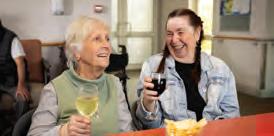

130 QUEENSLAND Edition 24 Aged Car e Guide ATSI Aboriginal, Torres Strait Islander CALD Culturally and Linguistically Diverse CC Care Community LGBTIQ Lesbian, Gay, Bisexual, Transgender, Intersex and Questioning NESB Non-English Speaking Background SL Supported Living SRS Supported Residential Service Ethnic/cultural notes should not imply exclusivity. All facilities are multicultural. D Divider IBC Inside Back Cover IFC Inside Front Cover OBC Outside Back Cover METROPOLITAN
Care Homes listed by
Advertisement Notes Page Reference DPS Web ID PHONE (07) PrivatelyFundedSizeofFacility (Beds/Places) SingleBedroomswithEnsuites BookedRespiteBedsExtraServicesPetsonPremisesSecureDementiaUnitSecureGardenSpecialistPalliativeCareTransitionCareBedsCulturallySpecificRetirementLivingOnsite P s W C D T F b g H 1st time user? See page 123
Aged
Councils (LGAs) and then Suburbs
COAST Council continued
Arcare Pimpama 2 Halcyon Dr 1300 272 273 96 96 D F IFC-1 21453 TriCare Pimpama Aged Care Residence 6 Anembo Ave 1300 874 2273 103 C T F b 32D-33D, OBC 14707
Calvary Robina Rise 54 Scottsdale Dr 1800 527 272 106 106 D T F 21 38548 Odyssey Lifestyle Care Communities 1 The Crestway 5551 6720 P 153 153 s C T H 63052 Villa Serena Aged Care 2 Easthill Dr 5665 5999 111 111 W D T F 18-19 14399 Runaway Bay
Bupa Runaway Bay 376 Pine Ridge Rd 1800 718 348 108 C F 59 20899 Paradise Lakes Care Centre 360 Oxley Dr 5537 8488 48 48 F 14577 TriCare Bayview Place Aged Care Res 86 Bayview St 1300 874 2273 83 W C F b H 32D-33D, OBC 14500 Southport 4215 Anglicare SQ Abri Residential Aged Care 37 Bauer St 1300 610 610 65 C D T F 14484 Broadwater Grove Care Community 55 Worendo St 1300 842 924 92 24 D T F g CALD 3, IBC 14862 Estia Health Gold Coast 34 Scarborough St 1300 682 833 87 87 s T F g CALD 20329 Estia Health Southport 40 William St 1300 682 833 110 s D T g CALD 17993 Golden Age Aged Care Service 60 Ridgeway Ave 5509 8555 78 56 s C T F H 57 14723 Marana Gardens Aged Care Service 10 Ridgeway Ave 5552 6888 71 71 s C T F 57 14680 St Vincent's Care Southport 32 Bauer St 1300 703 346 94 88 s D T F H 7 14689 The Henley on Broadwater Private AC 70 Marine Pde 5591 2111 P 12 F 22162
BlueCare Tallebudgera Talleyhaven ACF 54 Dudgeon Dr 5522 6274 48 48 s C D T F g CALD 14664 St Andrews, Tallebudgera 2 Sullivan Rd 1800 960 433 72 72 s C D T F H 14666
Bupa Tugun 6 Croft Ct 1800 718 348 162 C D T F 59 19792
Regis Magnolia 142 Reserve Rd 5502 8222 155 119 C D T F 14571
The Terraces Aged Care 74 University Dr 5592 7300 146 124 s T F 18736 Varsity Views Care Community 12 Lake St 1300 842 924 120 120 C D T F g CALD 3, IBC 18665
COAST continued GOLD
Robina
4216
IPSWICH to
LOGAN IPSWICH Council Brassall 4305
4305
4305
Ipswich 4305
4305
4305
4303
VALLEY Council Gatton 4343
Council Bethania 4205
4130
QUEENSLAND Edition 24 131 AgedCareGuide.com.au ATSI Aboriginal, Torres Strait Islander CALD Culturally and Linguistically Diverse CC Care Community LGBTIQ Lesbian, Gay, Bisexual, Transgender, Intersex and Questioning NESB Non-English Speaking Background SL Supported Living SRS Supported Residential Service Ethnic/cultural notes should not imply exclusivity. All facilities are multicultural. D Divider IBC Inside Back Cover IFC Inside Front Cover OBC Outside Back Cover METROPOLITAN Aged Care Homes listed by Councils (LGAs) and then Suburbs Advertisement Notes Page Reference DPS Web ID PHONE (07) PrivatelyFundedSizeofFacility (Beds/Places) SingleBedroomswithEnsuites BookedRespiteBedsExtraServicesPetsonPremisesSecureDementiaUnitSecureGardenSpecialistPalliativeCareTransitionCareBedsCulturallySpecificRetirementLivingOnsite P s W C D T F b g H 1st time user? See page 123
BlueCare Brassall Aged Care Facility 9 Charles St 3813 4100 82 26 s T F g CALD; dementia care 14514 Eastern Heights
Bolton Clarke Milford Grange, Ipswich 32 Grange Rd 3817 0400 P 94 H 18677 Catholic Healthcare Villa Maria Centre Eastern Heights 33B Robertson Rd 3454 1000 100 100 D T F 14396 Flinders View
BlueCare Flinders View Nowlanvil ACF 205-215 Ripley Rd 3294 2300 116 58 C F g CALD; dementia care 14382
Carinity Colthup Manor 39 Thorn St 1300 109 109 71 28 D T F 10 14522 Infinite Care Ipswich 43 South St 1800 463 468 96 72 D F 61644 North Ipswich
Bundaleer Lodge Nursing Home 114 Holdsworth Rd 3201 8772 170 157 s D T F H 14450 Pine Mountain
Fairhaven Care Centre Pine Mountain 89 Bayley Rd 3201 6373 P 40 Note 1 18753 Raceview
Southern Cross Care Raceview (St Mary's) 129 Wildey St 3288 9955 73 C F 63 14384 Riverview
Riverview Gardens Aged Care Centre 2 Moggill Ferry Rd 1300 111 227 167 151 D T F H 61 14580 Rosewood 4340 Cabanda Care 59 John St 5464 2392 71 69 s D T F 14448 LOCKYER
Regis Gatton 22 Dawson Dr 1300 998 100 60 40 D F 14492 Laidley
Carinity Karinya Place 26 Samuel St 1300 109 109 63 14 F 10 14520 Tabeel, Laidley 27 Ambrose St 1800 960 433 85 2 s C T F H 14362 LOGAN
Bethania Parklands Care Community 27 Claredon St 1300 842 924 178 F b 3, IBC 70920 BlueCare Beenleigh Bethania Haven ACF 67-71 Station Rd 3805 6600 50 50 s C D T F g CALD 14783 Palm Lake Aged Caring Community 1 Goodooga Dr 1800 246 677 152 152 D T F 20019 St Jude's Bethania Gardens 87-91 Station Rd 2800 6050 140 118 s D T F 17994
Paul de Chartres Residential Aged Care 12 Fedrick St 3800 7188 98 98 s D T F 14824 Browns Plains
Berrinba Greens Care Community 1-15 Greenfern Dr 1300 842 924 128 124 W C D T F 3, IBC 18658 Carbrook
BlueCare Carbrook Wirunya ACF 559-581 Beenleigh-Redland Bay Rd 3290 9777 43 43 s C D T F g CALD 18018
Infinite Care Cornubia 144 Beenleigh-Redland Bay Rd 1800 463 468 133 133 D T F 21168 Note: 1. SRS; approved clients can receive their HCP services onsite
4306
4341
Boronia Heights 4124 St
4118
Cornubia 4130
LOGAN
LOGAN Council
Eagleby 4207
Landing 4207
Greenbank 4124
4118
Jimboomba 4280
4114
4133
4207
to MORETON BAY
Slacks Creek 4127
4127
4114
BAY Council
Albany Creek 4035
Beachmere 4510

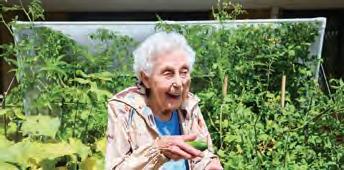
132 QUEENSLAND Edition 24 Aged Car e Guide ATSI Aboriginal, Torres Strait Islander CALD Culturally and Linguistically Diverse CC Care Community LGBTIQ Lesbian, Gay, Bisexual, Transgender, Intersex and Questioning NESB Non-English Speaking Background SL Supported Living SRS Supported Residential Service Ethnic/cultural notes should not imply exclusivity. All facilities are multicultural. D Divider IBC Inside Back Cover IFC Inside Front Cover OBC Outside Back Cover
Care Homes listed by
Advertisement Notes Page Reference DPS Web ID PHONE (07) PrivatelyFundedSizeofFacility (Beds/Places) SingleBedroomswithEnsuites BookedRespiteBedsExtraServicesPetsonPremisesSecureDementiaUnitSecureGardenSpecialistPalliativeCareTransitionCareBedsCulturallySpecificRetirementLivingOnsite P s W C D T F b g H 1st time user? See page 123
METROPOLITAN Aged
Councils (LGAs) and then Suburbs
continued
continued
Jimbelunga Nursing Centre 259 River Hills Rd 3807 0655 74 74 C T F g ATSI 14720 Edens
Southern Cross Care Edens Landing (Connolly Court) 20-24 Loane Dr 3805 1844 64 C T H 63 14710
Regis Greenbank 271 Middle Rd 1300 998 100 131 59 D T F 14708 Hillcrest
Clive Burdeu Aged Care Service 46 Middle Rd 3809 8200 72 72 s T F 57 18682
Jimboomba Community Aged Care 21 East St 5646 1000 144 144 D T F 52 38801 Logan Central
Complete Healthcare Connect U 3 1 Mooney St 3472 5655 P 67164 Logan Reserve
Arcare Logan Reserve 17 Halcyon Way 1300 272 273 91 90 D F IFC-1 21452 Mount Warren
Palm Lake Aged Caring Community Mount Warren Park 33 Mount Warren Blvd 1800 246 677 110 110 F 21444 North Tamborine
Beaumont Care Mount Tamborine 24 Main Western Rd 1300 217 336 39 33 s C T F 14706
Arcare Slacks Creek 8 Janice St 1300 272 273 109 109 D T F IFC-1 18638
Arcare Springwood 99 Cinderella Dr 1300 272 273 110 110 F g CALD; Sri Lankan IFC-1 22020 BlueCare Springwood Yurana ACF 129 Dennis Rd 3290 0579 61 61 s D T F g CALD 14433 Springwood Terrace Care Community 266 Parfrey Rd 1300 842 924 136 D T F 3, IBC 21424 Woodridge
Trinder Park 10 Laurel St 1800 960 433 156 122 s C D T F H 14771 MORETON
Park
4272
Springwood
Estia
55 Faheys Rd West 1300 682 833 71 10 s D T 14481
Palm Lake Aged Caring Com'ty Beachmere 145 Bishop Rd 1800 246 677 102 102 F 22353
Health Albany Creek
Bongaree 4507
Bray Park 4500
4505
Burpengary East 4505
Hills 4055
Kallangur 4503
4021
4501
4506
QUEENSLAND Edition 24 133 AgedCareGuide.com.au ATSI Aboriginal, Torres Strait Islander CALD Culturally and Linguistically Diverse CC Care Community LGBTIQ Lesbian, Gay, Bisexual, Transgender, Intersex and Questioning NESB Non-English Speaking Background SL Supported Living SRS Supported Residential Service Ethnic/cultural notes should not imply exclusivity. All facilities are multicultural. D Divider IBC Inside Back Cover IFC Inside Front Cover OBC Outside Back Cover METROPOLITAN Aged Care Homes listed by Councils (LGAs) and then Suburbs Advertisement Notes Page Reference DPS Web ID PHONE (07) PrivatelyFundedSizeofFacility (Beds/Places) SingleBedroomswithEnsuites BookedRespiteBedsExtraServicesPetsonPremisesSecureDementiaUnitSecureGardenSpecialistPalliativeCareTransitionCareBedsCulturallySpecificRetirementLivingOnsite P s W C D T F b g H 1st time user? See page 123 MORETON BAY continued Note: 1. CALD, LGBTIQ; residents' pets assessed 2. Mental health services available 3. CALD; female-only residents in dementia-specific unit MORETON
Council continued Bellmere
New Direction Care 41 Lotus Ave 3505 3201 120 120 T F g Note 1 21104
BAY
4510
Bribie Cove Aged Care 199-213 Goodwin Dr 3400 1000 90 90 s F H 14374 Bribie Island Aged Care 12-40 Foley St 3410 3700 119 95 s C D T F H 57 14455
Anam Cara 52 Lavarack Rd 1800 448 448 119 119 C D T F g CALD, LGBTIQ 55 14536 Burpengary
Burpengary Gardens Care Community 149-163 Rosehill Dr 1300 842 924 96 96 C D T F 3, IBC 14555
Burpengary Manor 135 Buckley Rd 5316 6000 120 120 s C D T F 20309 Caboolture 4510 Arcare Caboolture 51 Manley St 1300 272 273 119 119 D T F IFC-1 20898 Bolton Clarke Fernhill, Caboolture 103 King St 5490 6300 99 H 14778 Regis Caboolture 65 Mewett St 1300 998 100 171 72 D T F 14493 St Paul's, Caboolture 10-44 Tomlinson Rd 1800 960 433 61 61 C D T F b H 14401 Sunnymeade Park Aged Care Community 362-376 King St 5495 4233 174 174 s W C D T F b H 14874 Clontarf
Beaumont Care Clontarf 39 Baringa St 1300 217 336 52 15 s C F 14877 Ozcare Ozanam Villa Clontarf ACF Cnr Tainton & King Sts 1800 692 273 121 73 D T F 74-75 14360 Deception Bay 4508 Palm Lake Aged Caring Com Deception Bay 42-46 Bay Ave 1800 246 677 80 80 C D T F 20269 Seabrook Aged Care 15-29 Bonton Ave 3817 7300 122 122 s T F 19148 Sir James Terrace 11 Stamp St 3204 7911 77 77 T F H 14589 Ferny
Bellevue Care Centre 53 Linkwood Dr 3550 5999 99 56 s C D T F g Italian 14756
4019
BlueCare Kallangur Pilgrim ACF 40 Narangba Rd 3481 4700 54 54 D T F g CALD 14526 Maranatha Aged Care 1582 Anzac Ave 1800 246 637 128 122 s D T F 64 14485
Beaumont Care Kippa-Ring 111 George St 1300 217 336 65 23 s C F 14853 Cooinda House 60 George St 3897 6101 60 60 D T F Note 2 14601 Regis Lodges on George 109 George St 3283 1355 132 132 D T F 14550 Lawnton
BlueCare Lawnton Pine Woods ACF 260 Francis Rd 3881 9489 93 75 D T F g Note 3 14525
Morayfield Grove 69-71 Caboolture River Rd 1300 842 924 99 95 D T F 3, IBC 14598 Rockpool Morayfield 49 Amy St 5405 1000 150 150 D T F b 21454
Kippa-Ring
Morayfield
MORETON BAY continued to REDLAND
Narangba 4504
4020
Rothwell 4022
4020
4512
4514
4159
4161
Capalaba 4157
4183
Redland Bay 4165
134 QUEENSLAND Edition 24 Aged Car e Guide ATSI Aboriginal, Torres Strait Islander CALD Culturally and Linguistically Diverse CC Care Community LGBTIQ Lesbian, Gay, Bisexual, Transgender, Intersex and Questioning NESB Non-English Speaking Background SL Supported Living SRS Supported Residential Service Ethnic/cultural notes should not imply exclusivity. All facilities are multicultural. D Divider IBC Inside Back Cover IFC Inside Front Cover OBC Outside Back Cover
Care
listed by
Advertisement Notes Page Reference DPS Web ID PHONE (07) PrivatelyFundedSizeofFacility (Beds/Places) SingleBedroomswithEnsuites BookedRespiteBedsExtraServicesPetsonPremisesSecureDementiaUnitSecureGardenSpecialistPalliativeCareTransitionCareBedsCulturallySpecificRetirementLivingOnsite P s W C D T F b g H 1st time user? See page 123
METROPOLITAN Aged
Homes
Councils (LGAs) and then Suburbs
1. Dutch, Greek, Hispanic, Indonesian, Italian
continued
Note:
MORETON BAY Council
Bolton Clarke Inverpine, Murrumba Downs 54 Ogg Rd 3490 3100 89 H 14529
Narangba Aged Care 23 Young Rd 3053 3700 92 61 T F Respite and dementia services 21445 Narangba Community Aged Care 31 Mumford Rd 3094 1800 144 144 D T F 52 62011 North Lakes 4509 Arcare North Lakes 65 Endeavour Blvd 1300 272 273 136 136 D T F g Dutch, German IFC-1 18637 North Lakes Terrace Care Community 2 North Lakes Dr 1300 842 924 144 D T F 3, IBC 21105 Redcliffe
BlueCare Redcliffe Aged Care Facility 91 Anzac Ave 3283 9500 96 96 F g CALD; dementia care 19930
BlueCare Rothwell Nazarene ACF 25-39 Higgs St 3385 9300 150 150 D T F g CALD 14527 Peninsula Palms Aged & Com'ty Serv 77 Morris Rd 3897 2800 50 50 T F H 14560 Seabrae Manor Aged Care 21 Buchanan St 3053 3333 102 67 s D T F 20886 Scarborough
BallyCara Village, Residential Care & Wellness 16B Oyster Point Esp 1300 272 222 94 86 s D T H 14644 Wamuran
Beaumont Care Wamuran 60 Ziviani Rd 5496 6503 80 80 s C D T F 61611 Woodford
Woodford Manor 12-14 Margaret St 5420 4000 75 75 s C D T F 20619 REDLAND Council Alexandra
BlueCare Alexandra Hills Nandeebie ACF 87 Winchester Rd 3820 0200 76 76 C D T F g CALD 14754 Buckingham Gardens Aged Care Service 8 Buckingham St 3824 4623 50 50 s D T F 57 14461 Birkdale
Prins Willem Alexander Lodge 62 Collingwood Rd 3822 0800 189 179 C D T F g H Note 1 14622 Regis Birkdale 25 MacGregor Dr 1300 998 100 70 70 s D T F b 14650 Sylvan Woods 500 Old Cleveland Rd East 3207 2830 84 F 14566
CapellaBay Aged Care 260 Old Cleveland Rd East 3119 3100 133 133 T F 20328 Cleveland
Infinite Care Cleveland 149 Wellington St 3286 6879 109 109 s D T F 14816 Redland Residential Care 3 Weippin St 3488 3800 110 110 D T F b g ATSI; psychogeriatric care 18395 Seaton Place Aged Care 111 Smith St 3050 9100 131 128 F 19919 Dunwich
Nareeba
Moopi Pa AC Hostel 28 Dickson Way 3409 9690 14 6 T F b g ATSI 14859
BlueCare Redland Bay Yarrabee ACF 61-71 Peel St 3829 4400 40 31 D T F g CALD 14427
Murrumba Downs 4503
Hills
4163
Moopi
REDLAND continued to SUNSHINE COAST
Point 4160
RIM Council
Beaudesert 4285
4310
Kilcoy 4515
Lowood 4311
4313
SUNSHINE COAST Council
Alexandra Headland 4572
4519
Birtinya 4575
Bli Bli 4560
4556
QUEENSLAND Edition 24 135 AgedCareGuide.com.au ATSI Aboriginal, Torres Strait Islander CALD Culturally and Linguistically Diverse CC Care Community LGBTIQ Lesbian, Gay, Bisexual, Transgender, Intersex and Questioning NESB Non-English Speaking Background SL Supported Living SRS Supported Residential Service Ethnic/cultural notes should not imply exclusivity. All facilities are multicultural. D Divider IBC Inside Back Cover IFC Inside Front Cover OBC Outside Back Cover
Aged Care Homes listed by Councils (LGAs) and then Suburbs Advertisement Notes Page Reference DPS Web ID PHONE (07) PrivatelyFundedSizeofFacility (Beds/Places) SingleBedroomswithEnsuites BookedRespiteBedsExtraServicesPetsonPremisesSecureDementiaUnitSecureGardenSpecialistPalliativeCareTransitionCareBedsCulturallySpecificRetirementLivingOnsite P s W C D T F b g H 1st time user? See page 123
METROPOLITAN
REDLAND Council continued Thornlands 4164 Arcare Thornlands 1 George Thorn Dr 1300 272 273 92 92 F IFC-1 63661 Bolton Clarke Moreton Shores, Thornlands 91-101 King St 3286 8600 120 H 18684 Finncare 343 Cleveland-Redland Bay Rd 3829 4800 61 59 s D T F g Finnish, Scandinavian 14722 Victoria Point
Adventist Retirement Village Victoria Point 571-585 Cleveland-Redland Bay Rd 3820 5777 179 173 s C D T F H 14483 Marebello 537-547 Cleveland-Redland Bay Rd 3422 9300 138 111 s W C D T F 14502 Wellington
Wellington Park Private Care 16 Balmoral St 3822 1876 94 94 C D T F 14871 SCENIC
4165
Whiddon Beaudesert Star 14 Brooklands Dr 5542 4700 78 52 C D T F 14705 Wongaburra Garden Settlement 210-218 Brisbane St 5540 1400 128 100 C D T F CALD 14494 Boonah
Fassifern Aged Care Service Elliot Rd 5469 2800 103 103 s C D T F H 57 14524 North Tamborine 4272 Beaumont Care Mount Tamborine 24 Main Western Rd 1300 217 336 39 33 s C T F 14706 SOMERSET Council
Aloaka Care Centre 52 Taylor St 5422 4500 40 40 C F 14510
BlueCare Lowood Glenwood ACF 49 Main St 5427 8800 30 30 C F g CALD; dementia care 14530 Toogoolawah
BlueCare Toogoolawah Alkira ACF 2 Charles St 5423 4200 41 41 s C D T F g CALD 14505
Bolton Clarke Tantula Rise, Alexandra Headland 96 Tantula Rd West 5430 1400 120 H 14361 Beerwah
Glasshouse Views Aged Care 96-104 Peachester Rd 5439 2400 99 99 s F H 18001
Arcare Birtinya 14 Waterside Retreat 1300 272 273 90 90 T F IFC-1 63674
Waters Care Community 1 Reflection Cr 1300 842 924 152 129 D T F g CALD 3, IBC 20945
Kawana
BlueCare Bli Bli Aged Care Facility 20 Lefoes Rd 5458 2000 92 54 D T F g CALD 14685 Buderim
Buderim Views Aged Care 383 Mooloolaba Rd 5477 9100 120 120 s F 19042 Immanuel Gardens, Buderim 10 Magnetic Dr 1800 960 433 145 70 C D T F H 14694 The Ormsby 112 Burnett St 5376 3700 140 138 W F b 20311
SUNSHINE COAST
4552
4551
4551
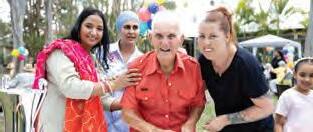

136 QUEENSLAND Edition 24 Aged Car e Guide ATSI Aboriginal, Torres Strait Islander CALD Culturally and Linguistically Diverse CC Care Community LGBTIQ Lesbian, Gay, Bisexual, Transgender, Intersex and Questioning NESB Non-English Speaking Background SL Supported Living SRS Supported Residential Service Ethnic/cultural notes should not imply exclusivity. All facilities are multicultural. D Divider IBC Inside Back Cover IFC Inside Front Cover OBC Outside Back Cover METROPOLITAN
Care
listed by
Advertisement Notes Page Reference DPS Web ID PHONE (07) PrivatelyFundedSizeofFacility (Beds/Places) SingleBedroomswithEnsuites BookedRespiteBedsExtraServicesPetsonPremisesSecureDementiaUnitSecureGardenSpecialistPalliativeCareTransitionCareBedsCulturallySpecificRetirementLivingOnsite P s W C D T F b g H 1st time user? See page 123
Aged
Homes
Councils (LGAs) and then Suburbs
continued
Council continued
Rod Voller Care Centre 98 Windsor Rd 5453 8333 50 50 s C F H 14815
BlueCare Caloundra Aged Care Facility 10 West Tce 5490 5198 114 67 s D T F g CALD 14507 Bolton Clarke Centaur Memorial 21 West Tce 5390 0000 P 84 14446 Coolum Beach
Coolum Waters Care Centre 4 Wembley Rd 5455 1111 50 50 s C D T F H 14802 St Mary's Aged Care Coolum Beach 17 Magenta Dr 5446 5096 130 130 C D T F 17996 Currimundi
Ozcare Caroline Chisholm Aged Care Facility 28 Saffron Dr 1800 692 273 131 127 D T F H 74-75 14472 Dicky Beach
BlueCare Dicky Beach Aged Care Facility 55 Coolum St 5439 4900 50 50 D T F g CALD 14597 Caloundra Place Care Community 4 Lyon St 1300 842 924 55 7 D T F 3, IBC 14447 Kuluin 4558 Regis Kuluin 354 Main Rd 1300 998 100 120 110 D T F 19925 Little Mountain
Adventist Retirement Village Caloundra 64 Sunset Dr 5491 3544 48 48 D T F H 14695 Little Mountain Aged Care Service 211 Parklands Blvd 5436 4100 96 96 C T F 57 38601 Palm Lake Aged Caring Comm Caloundra 95 Village Way 1800 246 677 120 120 F 22354 Southern Cross Care Caloundra (Little Mountain) 57 Village Way 5492 6866 103 C T F 63 14803 Maleny
BlueCare Maleny Erowal Aged Care Facility 1274 Landsborough Rd 1800 838 929 82 67 D T F g H CALD 14888 Maroochydore
Arcare Maroochydore 54 Dalton Dr 1300 272 273 90 90 D T F IFC-1 20294 Estia Health Maroochydore 2-6 Amity Ave 1300 682 833 126 126 s D T F g CALD 21541 Regis Maroochydore 33 Allora Dr 1300 998 100 68 68 F 14488 St Vincent's Care Maroochydore 37 Baden Powell St 1300 703 346 125 125 s D T F 7 20906 Meridan Plains
IRT Woodlands 22 Lacebark St 13 44 78 60 60 s D T F H 15 20904
SUNSHINE COAST
Burnside 4560
Caloundra 4551
4573
4551
4558
4551
SUNSHINE COAST
4555
Peregian Springs 4573
Sippy Downs 4556
4564
Note:
QUEENSLAND Edition 24 137 AgedCareGuide.com.au ATSI Aboriginal, Torres Strait Islander CALD Culturally and Linguistically Diverse CC Care Community LGBTIQ Lesbian, Gay, Bisexual, Transgender, Intersex and Questioning NESB Non-English Speaking Background SL Supported Living SRS Supported Residential Service Ethnic/cultural notes should not imply exclusivity. All facilities are multicultural. D Divider IBC Inside Back Cover IFC Inside Front Cover OBC Outside Back Cover METROPOLITAN Aged Care Homes listed by Councils (LGAs) and then Suburbs Advertisement Notes Page Reference DPS Web ID PHONE (07) PrivatelyFundedSizeofFacility (Beds/Places) SingleBedroomswithEnsuites BookedRespiteBedsExtraServicesPetsonPremisesSecureDementiaUnitSecureGardenSpecialistPalliativeCareTransitionCareBedsCulturallySpecificRetirementLivingOnsite P s W C D T F b g H 1st time user? See page 123
continued SUNSHINE COAST Council continued Mount Coolum 4573 Estia Health Mount Coolum 15 Suncoast Beach Dr 1300 682 833 120 115 s C D T F g CALD 14690 Nambour 4560 Bowder Lodge Care Centre 35 Doolan St 5441 0750 32 32 s C b H 14640 Estia Health Nambour 27 Glenbrook Dr 1300 682 833 75 73 s D T g CALD 19922 Glenbrook Residential Aged Care Facility 4 Jack St 5459 7700 25 25 s D T b g Note 1 14688 James Grimes Care Centre 35 Doolan St 5441 0721 60 s T F 14675 Nambour Gardens Care Community 9 Princess Cr 1300 842 924 66 7 T F 3, IBC 14687 Pacific Paradise
Estia Health Pacific Paradise 26 Menzies Dr 1300 682 833 108 108 T F Dementia care 38361 Palmwoods
Palmwoods Garden Village Care Centre 61 Jubilee Dr 5457 4444 71 71 s C D T F H 14683 Pelican Waters
Rockpool Pelican Waters Spitfire Banks Dr 1800 515 053 150 150 D T F 63751 St Mary's Aged Care Pelican Waters 31 Verdon St 5492 4044 86 C D T F 14682
Arcare Peregian Springs 33 Ridgeview Dr 1300 272 273 90 90 s D T F IFC-1 19931
4564
4551
Regis Sippy Downs 94 University Way 1300 998 100 100 80 D F 14812 Twin Waters
Estia Health Twin Waters 190 Ocean Dr 1300 682 833 114 114 s C D T F g CALD 19924 Warana
BlueCare Warana Beachwood ACF 124 Nicklin Way 5490 2100 60 48 C D T F g H CALD 14499 TriCare Kawana Waters Aged Care Residence 90 Nicklin Way 1300 874 2273 160 W C F b 32D-33D, OBC 14692
4575
Care Nangarin Lodge 26 Redmonds Rd 5458 3500 55 55 D T F b 14686
Woombye 4559 Woombye
1. ATSI; 18 beds for transition care
BALONNE continued to BURDEKIN
4487
4715
4420
4719
4724
4725
Blackall 4472
Bargara 4670
4670
138 QUEENSLAND Edition 24 Aged Car e Guide ATSI Aboriginal, Torres Strait Islander CALD Culturally and Linguistically Diverse CC Care Community LGBTIQ Lesbian, Gay, Bisexual, Transgender, Intersex and Questioning NESB Non-English Speaking Background SL Supported Living SRS Supported Residential Service Ethnic/cultural notes should not imply exclusivity. All facilities are multicultural. D Divider IBC Inside Back Cover IFC Inside Front Cover OBC Outside Back Cover
Advertisement Notes Page Reference DPS Web ID PHONE (07) PrivatelyFundedSizeofFacility (Beds/Places) SingleBedroomswithEnsuites BookedRespiteBedsExtraServicesPetsonPremisesSecureDementiaUnitSecureGardenSpecialistPalliativeCareTransitionCareBedsCulturallySpecificRetirementLivingOnsite P s W C D T F b g H 1st time user? See page 123
REGIONAL Aged Care Homes listed by Councils (LGAs) and then Suburbs
BALONNE
George
Warrawee Aged Care Service 276-296 Alfred St 4620 2000 25 25 D T F 57 14696 BANANA Council Biloela
Wahroonga, Biloela Wahroonga St 4992 8300 65 65 C D T F H 14712 Taroom
Southern Cross Care Taroom (Leichhardt Villa) 1 McCorley Ct 4628 6166 29 C T 63 14772 Theodore
Dawson View Hostel 1-11 Dawson Ave 4993 1099 6 6 Registered nurse on call 14770 Theodore Multi Purpose Health Service 87 The Bvd 4990 3000 P 4 F 10 acute beds also available 20938 BARCALDINE Council Alpha
Alpha Jericho Multi Purpose Health Service 1 Burns St 4809 7000 4 4 F b 18704 Barcaldine
Barcaldine Multi Purpose Health Service 25 Oak St 4650 4000 6 2 T F 18703 BLACKALL-TAMBO Council
Council St
Barcoo Living Multi Purpose Service 2A Coronation Dr 4657 6777 34 34 s T F 57 17456 BUNDABERG
Council
Palm
Aged Caring Community Bargara 55 Wearing Rd 1800 246 677 160 160 D T F 19929 Bundaberg
Anglicare SQ Meilene Residential AC 2 Meilene St 1300 610 610 52 52 C D T F 14731 BlueCare Bundaberg Millbank ACF O'Connell St 4153 0515 48 48 s F g CALD 14885 BlueCare Bundaberg Pioneer ACF Cnr Barolin & Heaps Sts 4153 0444 107 86 s T F b g CALD; dementia care 14600 Gracehaven Aged Care Service 71 Dr Mays Rd 4153 8000 110 62 s D T F H 57 14676 TriCare Bundaberg Aged Care Residence 12 Fe Walker St 1300 874 2273 102 C D T F b 32D-33D, OBC 14451 Bundaberg North 4670 Bolton Clarke Fairways, Bundaberg 59 Hanbury St 4131 6400 110 T H 14375 Childers
Forest View Aged Care Facility 4 Morgan St 4126 2455 26 26 s T F H 14808 Gin Gin
Kolan Gardens Aged Care Service 6C Mulgrave St 4157 3744 22 22 s C F 57 14801
Carinity Kepnock Grove 28 Jocumsen St 1300 109 109 50 50 C D T F H 10 14679 Millbank 4670 BlueCare Bundaberg Riverlea ACF 1 River Tce 4154 0600 122 114 s D T F g CALD 14872 BURDEKIN Council
Regis Ayr 9A-27A Chippendale St 1300 998 100 100 42 s D T F 14449 Home Hill
Regis Home Hill 127-141 Tenth Ave 1300 998 100 81 81 s D T F 14734
Lake
4660
4671
Kepnock 4670
Ayr 4807
4806
CAIRNS to CENTRAL HIGHLANDS
CAIRNS Council
Cairns 4870
4878
Hill 4870
4869
Gordonvale 4865
Beach 4879
Mooroobool 4870
4870
4870
4868
4870
4890
CASSOWARY COAST Council
Cardwell 4849
Innisfail 4860
Tully 4854
Emerald 4720
Springsure 4722 Springsure
QUEENSLAND Edition 24 139 AgedCareGuide.com.au ATSI Aboriginal, Torres Strait Islander CALD Culturally and Linguistically Diverse CC Care Community LGBTIQ Lesbian, Gay, Bisexual, Transgender, Intersex and Questioning NESB Non-English Speaking Background SL Supported Living SRS Supported Residential Service Ethnic/cultural notes should not imply exclusivity. All facilities are multicultural. D Divider IBC Inside Back Cover IFC Inside Front Cover OBC Outside Back Cover
listed by Councils
and then Suburbs Advertisement Notes Page Reference DPS Web ID PHONE (07) PrivatelyFundedSizeofFacility (Beds/Places) SingleBedroomswithEnsuites BookedRespiteBedsExtraServicesPetsonPremisesSecureDementiaUnitSecureGardenSpecialistPalliativeCareTransitionCareBedsCulturallySpecificRetirementLivingOnsite P s W C D T F b g H 1st time user? See page 123
REGIONAL Aged Care Homes
(LGAs)
BlueCare Hollingsworth Elders Village 267-277 Hartley St 1800 838 929 42 42 D T F g ATSI 14606 Caravonica
Caravonica Waters 15-17 Lake Placid Rd 4058 5100 144 144 C D T F b 21440 Edge
Edge Hill Orchards 5 Oregon St 1800 463 468 182 182 D T F 21442 Edmonton
Edmonton Gardens 5 Bruce Hwy 1800 463 468 144 144 D T F 21441
Pyramid Residential Care Centre 65 Cairns Rd 4056 1454 52 52 D T F 14552
Kewarra Aged Care 110-124 Cottesloe Dr 4242 2000 94 58 s D T F 20011
Kewarra
Bupa Cairns 52-59 Swallow St 1800 718 348 149 151 s D T F 59 20902 Redlynch
Regis Redlynch 15 Short St 1300 998 100 192 186 D F 14784 Westcourt
Bolton Clarke Farnorha, Cairns 257-281 Lyons St 4052 9900 129 T 14579 Mercy Place Cairns (Bethlehem) 257 Gatton St 1300 096 428 86 86 53 14459 White Rock
Bupa Mount Sheridan 40-48 Progress Rd 1800 718 348 125 125 D T F 59 19788 Whitfield
Regis Whitfield 82-120 McManus St 1300 998 100 129 129 s D T F H 14462 CARPENTARIA Council
Kukatja Place Hostel 65 Landsborough St 4745 1599 P 15 s C T F g ATSI 14709
Normanton
Rockingham Aged Care Service 40 Jamieson St 4066 4200 48 48 C D T F 57 14670
Ozcare Innisfail Warrina St 1800 692 273 116 90 T 74-75 70935 Warrina Innisfail 1 Warrina St 4030 2500 218 182 C D T F g NESB 14718 Warrina Innisfail Villanova Centre 28-38 Charles St 4061 7677 36 36 C 14860
Tully Nursing Home 13 Bryant St 4068 2355 72 72 D T F 14643 CENTRAL
HIGHLANDS Council
BlueCare Emerald Avalon ACF 126 Borilla St 4988 2800 60 26 s T F g CALD; dementia care 14515
Multi Purpose Health Service 21 Woodbine St 4847 9200 12 s T F 20939
CHARTERS TOWERS to FRASER COAST
CHARTERS TOWERS
Charters
4820
4820
4605
COOK Council
Cooktown 4895
Doomadgee 4830
4873
4650
4655
4650
4655
4650
4655
140 QUEENSLAND Edition 24 Aged Car e Guide ATSI Aboriginal, Torres Strait Islander CALD Culturally and Linguistically Diverse CC Care Community LGBTIQ Lesbian, Gay, Bisexual, Transgender, Intersex and Questioning NESB Non-English Speaking Background SL Supported Living SRS Supported Residential Service Ethnic/cultural notes should not imply exclusivity. All facilities are multicultural. D Divider IBC Inside Back Cover IFC Inside Front Cover OBC Outside Back Cover
listed by Councils (LGAs) and then Suburbs Advertisement Notes Page Reference DPS Web ID PHONE (07) PrivatelyFundedSizeofFacility (Beds/Places) SingleBedroomswithEnsuites BookedRespiteBedsExtraServicesPetsonPremisesSecureDementiaUnitSecureGardenSpecialistPalliativeCareTransitionCareBedsCulturallySpecificRetirementLivingOnsite P s W C D T F b g H 1st time user? See page 123
REGIONAL Aged Care Homes
Council
Towers
Dalrymple Villa 15 Fraser St 4787 4233 71 71 s C D T b H 14736 Richmond Hill
Eventide Residential Aged Care Facility 54-78 Dalrymple Rd 4787 5555 110 C D T F 10 beds for psychogeriatric residents 14735 CHERBOURG
Cherbourg
BlueCare Pinangba’s Ny-Ku Byun Elders Village 1 Fisher St 1800 838 929 24 24 s F g ATSI; dementia care 14744
Council
Cooktown Multi Purpose Health Service (Sunbird Cottage) 48 Hope St 4043 0106 11 7 F b 20941 Hope Vale
Hope Vale Aged Care Facility Cnr Thiele & Dubhie Sts 4060 9242 20 20 s C T F b g ATSI 14605
4895
DOOMADGEE Council
Ngooderi House Lot 33 Gunnalunja Dr 4742 9422 P 10 C T F g ATSI 14739 DOUGLAS
Kubirri Aged Care Centre 49 Johnston Rd 1300 111 227 42 42 T F 61 21107 Mossman Multi Purpose Health Service 9 Hospital St 4084 1271 8 F 18697 Port Douglas 4877 Ozcare Port Douglas Aged Care Facility Martin Scullett Dr 1800 692 273 74 54 D T F 74-75 14881 FRASER
PresCare Groundwater Lodge 165 Arnaud St 4122 6800 60 60 C D T F 14677 Kawungan
Ozcare Hervey Bay Aged Care Facility 35 Davis Dr 1800 692 273 154 154 D T F 74-75 20905 Maryborough
Bolton Clarke Chelsea, Maryborough 110 Tooley St 4121 9400 95 H 14497 Fair Haven Maryborough Aged Care Service 15 Morning St 4122 5600 85 68 s F H 57 14810 PresCare Yaralla Place 2 Winston Noble Dr 4120 5800 96 C T F 14831 Pialba
Bolton Clarke Baycrest, Hervey Bay 99 Doolong Rd 4303 2000 101 F H 14825 Point Vernon 4655 Anglicare SQ Kirami Residential AC 12 Banksia St 1300 610 610 97 97 C T F 14702 TriCare Point Vernon Aged Care Residence 193 The Esp 1300 874 2273 56 C F b Dementia care 32D-33D, OBC 14742 Tinana
Maryborough Community Aged Care 15 Iindah Rd East 1300 130 013 180 180 D T F 52 63165 Torquay
Torbay Aged Care 43 Exeter St 4125 0800 156 142 D T F 17425
Council Mossman
COAST Council Granville
FRASER COAST continued to ISAAC
4655
Council
Boyne Island 4680
4680
4680
Council
Gympie 4570
Bay 4580
Council
Ingham 4850
Trebonne 4850
Vale 4895
Council
4721
QUEENSLAND Edition 24 141 AgedCareGuide.com.au ATSI Aboriginal, Torres Strait Islander CALD Culturally and Linguistically Diverse CC Care Community LGBTIQ Lesbian, Gay, Bisexual, Transgender, Intersex and Questioning NESB Non-English Speaking Background SL Supported Living SRS Supported Residential Service Ethnic/cultural notes should not imply exclusivity. All facilities are multicultural. D Divider IBC Inside Back Cover IFC Inside Front Cover OBC Outside Back Cover REGIONAL Aged Care Homes listed by Councils (LGAs) and then Suburbs Advertisement Notes Page Reference DPS Web ID PHONE (07) PrivatelyFundedSizeofFacility (Beds/Places) SingleBedroomswithEnsuites BookedRespiteBedsExtraServicesPetsonPremisesSecureDementiaUnitSecureGardenSpecialistPalliativeCareTransitionCareBedsCulturallySpecificRetirementLivingOnsite P s W C D T F b g H 1st time user? See page 123
FRASER COAST Council continued Urangan
Parklands Aged Care 74 Emerald Park Way 4184 1300 72 F H 13 61879 Urraween
BlueCare Hervey Bay Masters Lodge ACF 33 Jensen Dr 4191 2200 60 60 s C D T F b g CALD 14786 Estia Health Hervey Bay 8 Medical Pl 1300 682 833 145 145 C D T F 19911 Fair Haven Hervey Bay Aged Care Service 130 Pantlins Lane 4124 8955 78 78 s D T F 57 14811 GLADSTONE
4655
Bindaree Lodge 1 Beacon Ave 4975 2999 40 40 C D T F 14458 Glen Eden
BlueCare Gladstone Edenvale ACF 41 Glen Eden Dr 4971 4700 52 44 D T F g CALD 18342 New Auckland
New Auckland Place 18 Wicks St 4978 9000 128 124 C D T F Respite available 19988 GOONDIWINDI Council Goondiwindi
Kaloma Home for the Aged 16 Gough St 4671 1422 80 80 s C D T F 14762 GYMPIE
4390
BlueCare Gympie Grevillea Gardens ACF 23 Ramsey Rd 5480 1800 61 51 s D T F 14751 Calvary Gympie Views 30 Barter St 1800 527 272 F 21 14681 Cooinda, Gympie 2 Cooinda St 1800 960 433 164 164 s C D T F 14569 St Vincent's Care Gympie Cnr Calton Hill Rd & Bligh St 1300 703 346 30 30 7 14574 Tin Can
Residency by Dillons Tin Can Bay 26 Coral Trout Dr 5488 1300 20 20 D F 14779
HINCHINBROOK
BlueCare Ingham Bluehaven ACF 58 Cassady St 3215 8200 50 42 s T F g CALD; dementia care 14457 Palms Aged Care Service 59 Sir Arthur Fadden Pde 1800 900 001 50 30 s D T F 57 14730
Ozcare Magdalene Villa Aged Care Facility 9 Stone River Rd 1800 692 273 64 64 C T F g Italian 74-75 14469 HOPE VALE Council Hope
Hope Vale Aged Care Facility Cnr Thiele & Dubhie Sts 4060 9242 20 20 s C T F b g ATSI 14605 ISAAC
Clermont MPHS Montcler 26 Francis St 4983 4000 22 22 C F 14804
Clermont
LIVINGSTONE to MORNINGTON
LIVINGSTONE Council
Yeppoon 4703
Zilzie 4710
4730
Beaconsfield 4740
4740
4740
4754
4740
4737
Roma 4455
Surat 4417
4880
Gununa 4871
142 QUEENSLAND Edition 24 Aged Car e Guide ATSI Aboriginal, Torres Strait Islander CALD Culturally and Linguistically Diverse CC Care Community LGBTIQ Lesbian, Gay, Bisexual, Transgender, Intersex and Questioning NESB Non-English Speaking Background SL Supported Living SRS Supported Residential Service Ethnic/cultural notes should not imply exclusivity. All facilities are multicultural. D Divider IBC Inside Back Cover IFC Inside Front Cover OBC Outside Back Cover
listed by
(LGAs) and
Advertisement Notes Page Reference DPS Web ID PHONE (07) PrivatelyFundedSizeofFacility (Beds/Places) SingleBedroomswithEnsuites BookedRespiteBedsExtraServicesPetsonPremisesSecureDementiaUnitSecureGardenSpecialistPalliativeCareTransitionCareBedsCulturallySpecificRetirementLivingOnsite P s W C D T F b g H 1st time user? See page 123
REGIONAL Aged Care Homes
Councils
then Suburbs
BlueCare Capricorn Aged Care Facility 26 Magpie Ave 4925 1500 41 38 s C T F g H CALD; dementia care 18011 Capricorn Adventist Retirement Village 150 Rockhampton Rd 4939 2801 66 66 s C D T F H 14642
Bolton Clarke Sunset Ridge, Emu Park 44 Svendsen Rd 4925 4000 72 H 18999 LONGREACH Council Longreach
Bolton Clarke Pioneers, Longreach 1 Sparrow St 4658 4900 59 H 14647 MACKAY Council
Kerrisdale Gardens 35 Norwood Pde 4965 4400 68 68 s C T F H 20246 Glenella
Glenella Care 35 Davey St 4968 0800 108 66 s C T F Non-secure dementia care 14880 Mackay
BlueCare Mackay Homefield ACF 87-95 George St 4944 7666 74 45 C D T F g CALD 14787 Good Shepherd Lodge 15 McIntyre St 4963 2999 175 149 s C D T F b H 14891
Nanyima Aged Care 61 Alexandra St 4959 1575 50 50 s C T F 14729 Nanyima Aged Care Community 61 Alexandra St 4959 1575 51 50 D T F 64630 North Mackay
Resthaven on Quarry 10 Sands Tce 4942 4800 63 63 C T F 14703 Sarina
Ozcare Sarina 18-32 Hoey St 1800 692 273 48 48 s F H 74-75 14549 West Mackay 4740 Francis of Assisi Home 2 Dupuy St 4952 2028 146 136 s C D T F g Maltese 14704 Ozcare Elizabeth Villa Aged Care Facility 15 Charlotte St 1800 692 273 120 120 D T F 74-75 21443 MARANOA
Mirani
Council
Pinaroo Roma 50-56 Bowen St 4622 1061 71 71 D T F b 14698 Westhaven Aged Care Facility Parker St 4624 2600 40 40 s C T F 14829
Surat Multi Purpose Health Service Ivan St 4626 5166 8 T F b 20722 MAREEBA Council Julatten
Mt Kooyong Nursing Home 62 Mount Kooyong Rd 4094 1279 28 2 C T F g ATSI 14604 Mareeba
BlueCare Mareeba Aged Care Facility 7 Macrae St 4030 3599 64 26 s D T F g CALD 14769 MORNINGTON Council
4871
Kuba Natha Hostel 22 Lardil St 4745 7346 P 14 s C T F g ATSI 14711
MOUNT ISA to ROCKHAMPTON
Mount Isa 4825
4825
4470
Cooroy 4563
4567
4566
4565
Biggenden 4621
Eidsvold 4627
Gayndah 4625
Monto 4630
4626
Palm Island 4816
Council
Gracemere 4702
Kawana 4701
Mount Morgan 4714
QUEENSLAND Edition 24 143 AgedCareGuide.com.au ATSI Aboriginal, Torres Strait Islander CALD Culturally and Linguistically Diverse CC Care Community LGBTIQ Lesbian, Gay, Bisexual, Transgender, Intersex and Questioning NESB Non-English Speaking Background SL Supported Living SRS Supported Residential Service Ethnic/cultural notes should not imply exclusivity. All facilities are multicultural. D Divider IBC Inside Back Cover IFC Inside Front Cover OBC Outside Back Cover
Aged Care Homes listed by Councils (LGAs) and then Suburbs Advertisement Notes Page Reference DPS Web ID PHONE (07) PrivatelyFundedSizeofFacility (Beds/Places) SingleBedroomswithEnsuites BookedRespiteBedsExtraServicesPetsonPremisesSecureDementiaUnitSecureGardenSpecialistPalliativeCareTransitionCareBedsCulturallySpecificRetirementLivingOnsite P s W C D T F b g H 1st time user? See page 123
REGIONAL
Note: 1. CALD; dementia care, retirement living onsite MOUNT ISA
Council
Injilinji Aged Care Unit 8 Thompson Rd 4512 6593 12 T F g ATSI 17442 Townview
Laura Johnson Home 41 Clarke St 4744 5100 75 63 s T F 14557 MURWEH
Waroona Nursing Home 72 King St 4621 2400 45 14 C T F 14697 NOOSA Council
NoosaCare Kabara 20 Topaz St 5447 7355 86 86 s T F 14821
Heads
Ozcare Noosa Heads Aged Care Facility 80 Cooyar St 1800 692 273 130 83 D T F 74-75 14797 Noosaville
Arcare Noosa 52 Goodchap St 1300 272 273 90 70 D F IFC-1 61994 Sunrise Beach
BlueCare Sunrise Beach 4 Grasstree Ct 1800 838 929 102 102 T 64529 Tewantin
Calvary Noosa 119-121 Moorindil St 1800 527 272 T F 21 14684 NoosaCare Carramar 186 Cooroy Noosa Rd 5449 8799 175 175 s W D T F 14470 NORTH BURNETT Council
Biggenden Multi Purpose Health Service 57 Alice St 4127 6400 11 11 T F 20940
Council Charleville
Noosa
4567
Eidsvold Multi Purpose Health Service 88 Cracow Rd 4165 7100 7 1 C T F b g ATSI 20930
Village 46 Capper St 4161 3699 52 34 D T F Personal pets considered 14464
Gunther
Ridgehaven Retirement Complex 32 Stuart St 4166 1082 36 36 D T 14646 Mundubbera
Mundubbera MPHS 96 Leichhardt St 4165 5200 14 14 C T F 20929 PALM ISLAND Council
Sandy Boyd Aged Care Hostel 310 Park Rd 4770 0275 15 s C g ATSI 14759 ROCKHAMPTON
BlueCare Gracemere Aged Care Facility 35 Conaghan St 4837 0500 64 32 s C T F g Note 1 14780
Carinity Shalom 121 Maloney St 1300 109 109 65 55 D T F H 10 14393
Mount Morgan MPHS 15 Black St 4912 5100 10 8 T F Visiting pets 20932
ROCKHAMPTON continued to TABLELANDS
4615
4606
4362
4373
Stanthorpe 4380
4370
Atherton 4883
4887
Malanda 4885
144 QUEENSLAND Edition 24 Aged Car e Guide ATSI Aboriginal, Torres Strait Islander CALD Culturally and Linguistically Diverse CC Care Community LGBTIQ Lesbian, Gay, Bisexual, Transgender, Intersex and Questioning NESB Non-English Speaking Background SL Supported Living SRS Supported Residential Service Ethnic/cultural notes should not imply exclusivity. All facilities are multicultural. D Divider IBC Inside Back Cover IFC Inside Front Cover OBC Outside Back Cover
listed by
Advertisement Notes Page Reference DPS Web ID PHONE (07) PrivatelyFundedSizeofFacility (Beds/Places) SingleBedroomswithEnsuites BookedRespiteBedsExtraServicesPetsonPremisesSecureDementiaUnitSecureGardenSpecialistPalliativeCareTransitionCareBedsCulturallySpecificRetirementLivingOnsite P s W C D T F b g H 1st time user? See page 123
REGIONAL Aged Care Homes
Councils (LGAs) and then Suburbs
ROCKHAMPTON Council continued Norman Gardens 4701 North Rockhampton Nursing Centre 691-711 Norman Rd 4816 8121 100 D T F b 14883 North Rockhampton 4701 PresCare Alexandra Gardens 20 Withers St 4999 3000 94 D T F 14714 Park Avenue 4701 Leinster Place Residential ACF 3 Pearce St 4926 6688 80 75 C D T F STRC available 18670 Rockhampton
Benevolent Living 60 West St 4837 0300 116 116 s C D T F 18680 Bethany Residential Aged Care Facility 75 Ward St 4999 2700 113 30 s C D T F b H 18668 Bethesda Aged Care Centre 58 Talford St 1300 111 227 50 F 61 14460 Eventide Home Rockhampton Cnr North & Campbell Sts 4920 6800 80 80 D T F 14716 McAuley Place Residential ACF 263 Agnes St 4921 3867 31 31 C F H 18669 SOUTH BURNETT Council Kingaroy 4610 BlueCare Kingaroy Canowindra ACF 43 Windsor Cir 4160 0100 60 60 s C T F g CALD; dementia care 14477 Orana, Kingaroy 24 Macdiarmid St 4162 6555 94 94 C D T F H 14585 Murgon
Southern Cross Care Murgon (Castra) 2 Cooper St 4169 8700 61 C T F Couples accom considered 63 14466
Southern Cross Care Nanango (Karinya) 25 Church St 4163 2430 40 C 63 14678 Wondai
Forest View Residential Care Facility 80 Scott St 4169 2600 46 46 C T F b Dementia care 14876 SOUTHERN DOWNS Council Allora
Southern Cross Care Allora (Homestead) 62 Forde St 4666 3588 29 C T 63 14556 Southern Cross Care Allora (Nursing Home) 29 Darling St 4666 3171 21 C T F 63 14511 Killarney
Killarney Memorial Aged Care 6 Cedar St 4664 1488 49 45 C D T F b 14764
Stanthorpe Aged Care Service 15 Alice St 4681 6888 101 101 T F g Italian 57 19999
Akooramak Care of the Aged 267-269 Wood St 4661 4100 100 100 s C D T F 14482 The Oaks Nursing Home 56 Locke St 4660 3511 40 40 C D T F 14835 Warwick Aged Care Service 223 Dragon St 4660 1110 80 80 C T F H 57 21663 TABLELANDS Council
Carinya Home for the Aged 1 Mazlin St 4091 2177 131 131 s C D T F 14473 Herberton
Herberton Hospital 23 Grace St 4096 1000 P 38 s D T F b Long-stay beds in a public hospital 14651
4700
4605
Nanango
Warwick
Ozcare Malanda Aged Care Facility Turnbull Rd 1800 692 273 98 51 D T F 74-75 14363
TOOWOOMBA
Clifton 4361
Cranley 4350
Crows Nest 4355
4350
4352
Kearneys Spring 4350
4350
Oakey 4401
Pittsworth 4356
Rangeville 4350
Rockville 4350
Toowoomba 4350
4350
QUEENSLAND Edition 24 145 AgedCareGuide.com.au ATSI Aboriginal, Torres Strait Islander CALD Culturally and Linguistically Diverse CC Care Community LGBTIQ Lesbian, Gay, Bisexual, Transgender, Intersex and Questioning NESB Non-English Speaking Background SL Supported Living SRS Supported Residential Service Ethnic/cultural notes should not imply exclusivity. All facilities are multicultural. D Divider IBC Inside Back Cover IFC Inside Front Cover OBC Outside Back Cover
listed by
Advertisement Notes Page Reference DPS Web ID PHONE (07) PrivatelyFundedSizeofFacility (Beds/Places) SingleBedroomswithEnsuites BookedRespiteBedsExtraServicesPetsonPremisesSecureDementiaUnitSecureGardenSpecialistPalliativeCareTransitionCareBedsCulturallySpecificRetirementLivingOnsite P s W C D T F b g H 1st time user? See page 123
REGIONAL Aged Care Homes
Councils (LGAs) and then Suburbs
TOOWOOMBA Council
Clifton Aged Care Facility 20-24 Norman St 4697 3499 62 54 C D T F b 14562
Palm Lake Aged Caring Community Toowoomba 149 Hogg St 1800 246 677 146 146 D T F b Note 1 38638
Crows Nest Aged Care Service 8 Grace St 4698 3555 81 60 s C D T F H 57 14441 Glenvale
Bupa Glenvale 357-383 McDougall St 1800 718 348 124 98 F 59 14614 Ozcare Toowoomba Aged Care Facility 631-651 Greenwattle St 1800 692 273 150 150 D T F 74-75 21112 Highfields
Carinity Brownesholme 131 Highfields Rd 1300 109 109 96 96 D T F H 10 62169
Yukana Retirement Living and Aged Care 258 Spring St 4631 5678 P 83 83 W D T F H 20289 Middle Ridge
BlueCare Toowoomba Aged Care Facility 256 Stenner St 4636 9552 116 116 s C D T F b g CALD; retirement living onsite 14434 St Vincent's Care Toowoomba 227 Spring St 1300 703 346 162 162 W C D T F Note 2 7 14866 Millmerran
McLean Care Yallambee Aged Care 34-40 Margaret St 4695 1580 60 60 D T F H 14607 Millmerran Multi Purpose Health Service 50-60 Commens St 4695 3111 5 F 17401 Mount Lofty 4350 Infinite Care Mount Lofty 69 Stuart St 4580 4000 134 134 C T F b 21167 Mt Lofty Heights Nursing Home Cnr Stuart St & Rifle Range Rd 4616 4900 40 40 s C D T F b 14551
4357
Dr EAF McDonald Nursing Home Cnr Beale & Fitzpatrick Sts 4691 4888 71 T F 14612 McLean Care CWA House 21 Cherry St 4691 1130 40 15 D T F H 14615
Beauaraba Living, Pittsworth 10 Weale St 4619 8422 128 112 s D T F 14498
Anglicare SQ Symes Thorpe Res AC 69 Stenner St 1300 610 610 82 82 T F 14621 Bupa Rangeville 280 Mackenzie St 1800 718 348 108 108 T F 59 21364
Northridge Salem, Toowoomba 44 Holberton St 1800 960 433 42 42 s C D T F 14820
Toowoomba
Salem Aged Care Toowoomba 280 Hume St 1800 960 433 101 101 s C T F 14845
Bolton Clarke Westhaven, Toowoomba 55 Arabian St 4614 4800 80 T H 14602 Fairhaven Care Centre Toowoomba 1 Thomas St 4632 3391 P 22 SRS 18754 Toowoomba Aged Care Service 885 Ruthven St South 4617 6888 90 39 s C D T F H 57 14616 TriCare Toowoomba Aged Care Residence 15 Curzon St 1300 874 2273 73 W C D T F b 32D-33D, OBC 14608 Note: 1. Couples suites; no additional daily fees 2. Two double rooms for couples
South
TOOWOOMBA Council
Toowoomba City 4350
Thursday Island 4875
4814
Burdell 4818
4815
Douglas 4814
4811
4817
4814
4812
Pimlico 4812
4810
4810
Weipa 4874
Chinchilla 4413
4405
4410
146 QUEENSLAND Edition 24 Aged Car e Guide ATSI Aboriginal, Torres Strait Islander CALD Culturally and Linguistically Diverse CC Care Community LGBTIQ Lesbian, Gay, Bisexual, Transgender, Intersex and Questioning NESB Non-English Speaking Background SL Supported Living SRS Supported Residential Service Ethnic/cultural notes should not imply exclusivity. All facilities are multicultural. D Divider IBC Inside Back Cover IFC Inside Front Cover OBC Outside Back Cover
listed by
Advertisement Notes Page Reference DPS Web ID PHONE (07) PrivatelyFundedSizeofFacility (Beds/Places) SingleBedroomswithEnsuites BookedRespiteBedsExtraServicesPetsonPremisesSecureDementiaUnitSecureGardenSpecialistPalliativeCareTransitionCareBedsCulturallySpecificRetirementLivingOnsite P s W C D T F b g H 1st time user? See page 123
REGIONAL Aged Care Homes
Councils (LGAs) and then Suburbs
TOOWOOMBA continued to WESTERN DOWNS
continued
Brodribb Home 13 Goggs St 4632 4188 99 97 s C D T F 14445 TORRES Council
Pinangba Star of the Sea Elders Village 121 Waiben Esp 1800 838 929 40 23 T g ATSI; dementia care 14591 TOWNSVILLE Council Annandale
The Good Shepherd Nursing Home 565 University Rd 4772 9900 246 156 s W C D T F b 14892
Arcare North Shore 77 Main St 1300 272 273 90 90 D T F IFC-1 21116
BlueCare Shalom Elders Village 190 Harvey Range Rd 1800 838 929 28 28 s C F g ATSI 14721
St Vincent's Care Douglas 291 Angus Smith Dr 1300 703 346 140 140 D T F 7 21114 Idalia
Carinity Fairfield Grange 33 Kokoda St 1300 109 109 96 96 D T F 10 21513 Kirwan
Parklands Residential Aged Care Facility 138 Thuringowa Dr 4433 9100 70 70 s C D T F 14523 Regis Kirwan 1 Emerald St 1300 998 100 125 118 D T F H 14828 Mount Louisa
Bolton Clarke Glendale, Townsville 435 Dalrymple Rd 4727 3500 92 20012 Mundingburra
Ozcare
Aged Care Facility 2 Acacia St 1800 692 273 175 97 W D T F 74-75 14570
Loreto Home for the Aged 20 Fulham Rd 4728 3737 36 36 s D T F 14733 Rowes
Bolton Clarke Rowes Bay, Townsville 9 Havana St 4750 3700 102 H 14732 Townsville
Aged Care Facility 489 Bayswater Rd 4758 7100 70 70 s D T F g CALD 21861 WEIPA Council
Condon
Villa Vincent
Bay
BlueCare Mount Louisa
Weipa Integrated Health Service Lot 407 John Evans Dr 4082 3900 10 T F 20949 WESTERN DOWNS Council
Southern Cross Care Chinchilla (Illoura Village) 24-30 Zeller St 4662 7182 66 C T 63 14805 Dalby
Karingal Nursing Home Hospital Rd 4669 0557 80 8 C T 14868 Ningana 25 Horace St 4669 0100 40 40 s C 14819
Taralga Retirement Village 93 High St 4668 5433 22 22 T F 14834
Jandowae
WESTERN
4421
Bowen 4805
Council
4804
4800
Council Woorabinda 4713
YARRABAH Council
Yarrabah 4871
QUEENSLAND Edition 24 147 AgedCareGuide.com.au ATSI Aboriginal, Torres Strait Islander CALD Culturally and Linguistically Diverse CC Care Community LGBTIQ Lesbian, Gay, Bisexual, Transgender, Intersex and Questioning NESB Non-English Speaking Background SL Supported Living SRS Supported Residential Service Ethnic/cultural notes should not imply exclusivity. All facilities are multicultural. D Divider IBC Inside Back Cover IFC Inside Front Cover OBC Outside Back Cover
listed by Councils
Advertisement Notes Page Reference DPS Web ID PHONE (07) PrivatelyFundedSizeofFacility (Beds/Places) SingleBedroomswithEnsuites BookedRespiteBedsExtraServicesPetsonPremisesSecureDementiaUnitSecureGardenSpecialistPalliativeCareTransitionCareBedsCulturallySpecificRetirementLivingOnsite P s W C D T F b g H 1st time user? See page 123
REGIONAL Aged Care Homes
(LGAs) and then Suburbs
WESTERN DOWNS Council continued
Milton House 5-11 Colamba St 4628 5600 14 14 s C T F 14619 Southern Cross Care Miles (Carinya) 6 Wallen St 1800 899 300 17 C T F 63 63013 Tara
Southern Cross Care Tara (Tarcoola) Lot 206, Sara St 1800 899 300 33 C T F 63 63014 WHITSUNDAY
DOWNS continued to YARRABAH
Miles 4415
Bolton Clarke Cunningham Villas, Bowen 1a Tollington Rd 4791 3999 50 T 14737 Murroona Gardens Wests Lane 4791 3340 94 94 s D T F 14738 Collinsville
Collinsville Multi Purpose Health Service 81-91 Garrick St 4785 4777 7 6 T F 20931 Proserpine
Proserpine Nursing Home 42 Anzac Rd 4945 2666 103 103 s C D T F 14545 WOORABINDA
Woorabinda Multi Purpose Health Service 1 Munns Dr 4913 2800 4 4 T F b g ATSI 18978
Mutkin Residential Aged Care 87 Back Beach Rd 4056 9290 27 27 s C T g ATSI 14717
Aged Care Homes with Extra Services
Advertisers only listed below All extra service providers are also listed in the directory on pages 124 –147
148 QUEENSLAND Edition 24 Aged Car e Guide
Advert Page DPS Web ID PHONE (07) See page 123 a for definitions SizeofFacility (Beds/Places) SingleBedroomswithEnsuites BookedRespiteBedsExtraServicesPetsonPremisesSecureDementiaUnitSecureGardenSpecialistPalliativeCareTransitionCareBedsRetirementLivingOnsite s W C D T F b H For definitions, see page 160 -161 D Divider IBC Inside Back Cover IFC Inside Front Cover OBC Outside Back Cover Berrinba Greens Care Community 1-15 Greenfern Dr Browns Plains 4118 1300 842 924 128 124 W C D T F 3, IBC 18658 Calamvale Parklands Care Community 8 Raffin Cr Calamvale 4116 1300 842 924 120 120 W D T F 3, IBC 18345 Carseldine Greens Care Community 40 Raynbird Pl Carseldine 4034 1300 842 924 120 120 W C D T F 3, IBC 18036 Ozcare Villa Vincent Aged Care Facility 2 Acacia St Mundingburra 4812 1800 692 273 175 97 W D T F 74-75 14570 Parkview Aged Care Community Wheller Gardens, 930 Gympie Rd Chermside 4032 1800 448 448 145 145 W C F H 55 14405 St Vincent's Care Carina 141 Fursden Rd Carina 4152 1300 703 346 154 154 W D T F 7 18397 St Vincent's Care Mitchelton 46 Church Rd Mitchelton 4053 1300 703 346 175 122 W D T F H 7 14838 St Vincent's Care Toowoomba 227 Spring St Middle Ridge 4350 1300 703 346 162 162 W C D T F 7 14866 TriCare Bayview Place Aged Care Residence 86 Bayview St Runaway Bay 4216 1300 874 2273 83 W C F b H 32D-33D, OBC 14500 TriCare Jindalee Aged Care Residence 22 Endeavour St Mount Ommaney 4074 1300 874 2273 93 W C F b H 32D-33D, OBC 14847 TriCare Kawana Waters Aged Care Residence 90 Nicklin Way Warana 4575 1300 874 2273 160 W C F b 32D-33D, OBC 14692 TriCare Mt Gravatt Aged Care Residence 20 Somerfield St Mount Gravatt 4122 1300 874 2273 136 W C D T F b 32D-33D, OBC 14634 TriCare Stafford Lakes Aged Care Residence 682 Rode Rd Chermside West 4032 1300 874 2273 144 W C D T F b H 32D-33D, OBC 14822
Sunnybank Hills Aged Care Residence 330 Jackson Rd Sunnybank Hills 4109 1300 874 2273 100 100 W F b 32D-33D, OBC 20018
Toowoomba Aged Care Residence 15 Curzon St Toowoomba 4350 1300 874 2273 73 W C D T F b 32D-33D, OBC 14608
Upper Mt Gravatt Aged Care Residence 20 Agay St Upper Mount Gravatt 4122 1300 874 2273 80 W F b H 32D-33D, OBC 14861 Villa Serena Aged Care 2 Easthill Dr Robina 4226 5665 5999 111 111 W D T F 18-19 14399
TriCare
TriCare
TriCare
Culturally appropriate aged care homes
Table of aged care homes/residential care facilities offering culturally appropriate services
The following table is a guide only. The information should not be interpreted that these homes are exclusive to the noted cultural group nor the only homes that offer quality services to these cultural groups. All aged care homes should care for all people regardless of sexuality, race or religious identities. The homes listed below have specifically indicated to DPS that they have training, expertise, funding or a heightened understanding of the special needs of the cultural group.
Cultural Group Aged Care Home Name
Asian Sunnycare Residential Sunnybank Hills 3272 2615 54683
ATSI BlueCare Hollingsworth Elders Village Cairns 1800 838 929 14606
ATSI BlueCare Pinangba’s Ny-Ku Byun Elders V'lge Cherbourg 1800 838 929 14744
ATSI BlueCare Shalom Elders Village Condon 1800 838 929 14721
ATSI Eidsvold Multi Purpose Health Service Eidsvold 4165 7100 20930
ATSI Georgina Hostel & Aged Care Facility Morningside 3395 6888 14827
ATSI Glenbrook Residential Aged Care Facility Nambour 5459 7700 14688
ATSI Hope Vale Aged Care Facility Hope Vale 4060 9242 14605
ATSI Injilinji Aged Care Unit Mount Isa 4512 6593 17442
ATSI Jimbelunga Nursing Centre Eagleby 3807 0655 14720
ATSI John Wesley Gardens
Geebung 1800 448 448 14599
ATSI Knowles Court Sinnamon Park 1800 448 448 14628
ATSI Kuba Natha Hostel Gununa 4745 7346 14711
ATSI Kukatja Place Hostel Normanton 4745 1599 14709
ATSI Mt Kooyong Nursing Home Julatten 4094 1279 14604
ATSI Mutkin Residential Aged Care Yarrabah 4056 9290 14717
ATSI Nareeba Moopi Moopi Pa Aged Care Hostel Dunwich 3409 9690 14859
ATSI Nash Court
Sinnamon Park 1800 448 448 14627
ATSI Ngooderi House Doomadgee 4742 9422 14739
ATSI Parkview Aged Care Community Chermside 1800 448 448 14405
ATSI Pinangba Star of the Sea Elders Village Thursday Island 1800 838 929 14591
ATSI Redland Residential Care Cleveland 3488 3800 18395
ATSI Reid Court Sinnamon Park 1800 448 448 14626
ATSI Sandy Boyd Aged Care Hostel Palm Island 4770 0275 14759
ATSI St Mark's Aged Care Community Chermside 1800 448 448 14422
ATSI Woorabinda Multi Purpose Health Service Woorabinda 4913 2800 18978
CALD Anam Cara Bray Park 1800 448 448 14536
CALD Arcare Springwood Springwood 1300 272 273 22020
CALD Ashmore Gardens Care Community Ashmore 1300 362 481 14503
CALD Berlasco Aged Care Indooroopilly 3371 4377 14512
CALD Bethesda Caring Centre Corinda 1800 448 448 14486
CALD BlueCare Alexandra Hills Nandeebie AC Fac Alexandra Hills 3820 0200 14754
CALD BlueCare Arundel Woodlands Lodge AC Fac Arundel 5509 9200 14793
CALD BlueCare Beenleigh Bethania Haven AC Fac Bethania 3805 6600 14783
CALD BlueCare Bli Bli Aged Care Facility Bli Bli 5458 2000 14685
CALD BlueCare Brassall Aged Care Facility Brassall 3813 4100 14514
CALD BlueCare Bundaberg Millbank Aged Care Fac Bundaberg 4153 0515 14885
Cultural
CALD BlueCare Bundaberg Pioneer Aged Care Fac Bundaberg 4153 0444 14600
CALD BlueCare Bundaberg Riverlea Aged Care Fac Millbank 4154 0600 14872
CALD BlueCare Caloundra Aged Care Facility Caloundra 5490 5198 14507
CALD BlueCare Capricorn Aged Care Facility Yeppoon 4925 1500 18011
CALD BlueCare Carbrook Wirunya Aged Care Fac Carbrook 3290 9777 18018
CALD BlueCare Carina Aged Care Facility Carina 3891 8000 14760
Dicky Beach Aged Care Facility Dicky
CALD
AgedCareGuide.com.au 149 QUEENSLAND Edition 24 ATSI Aboriginal, Torres Strait Islander CALD Culturally and Linguistically Diverse DVA Department of Veterans' Affairs LGBTIQ Lesbian, Gay, Bisexual, Transgender, Intersex and Questioning NESB Non-English Speaking Background VHC Veterans' Home Care
PHONE
DPS Web ID
(07)
Group
Name PHONE (07) DPS Web ID
Aged Care Home
CALD
View 3294 2300 14382 CALD BlueCare Gladstone Edenvale Aged Care Fac Glen Eden 4971 4700 18342 CALD BlueCare Gracemere Aged Care Facility Gracemere 4837 0500 14780 CALD BlueCare Hervey Bay Masters Lodge AC Fac Urraween 4191 2200 14786 CALD BlueCare Ingham Bluehaven Aged Care Fac Ingham 3215 8200 14457 CALD BlueCare Kallangur Pilgrim Aged Care Fac Kallangur 3481 4700 14526 CALD BlueCare Kenmore Aged Care Facility Kenmore Hills 3859 0900 14846 CALD BlueCare Kingaroy Canowindra Aged Care Fac Kingaroy 4160 0100 14477 CALD BlueCare Labrador Aged Care Facility Labrador 5571 3622 14790 CALD BlueCare Lawnton Pine Woods Aged Care Fac Lawnton 3881 9489 14525 CALD BlueCare Lowood Glenwood Aged Care Fac Lowood 5427 8800 14530 CALD BlueCare Mackay Homefield Aged Care Fac Mackay 4944 7666 14787 CALD BlueCare Maleny
Care Facility Maleny 1800 838
CALD BlueCare Mareeba Aged Care Facility Mareeba 4030
BlueCare Mount Louisa
Care Facility Townsville
CALD BlueCare Redcliffe
Care Facility Redcliffe
CALD BlueCare Redland Bay Yarrabee Aged Care Fac Redland Bay 3829 4400 14427 CALD BlueCare Rothwell Nazarene Aged Care Fac Rothwell 3385 9300 14527 CALD BlueCare Springwood Yurana Aged Care Fac Springwood 3290 0579
BlueCare
Fac Sunnybank Hills
BlueCare
CALD BlueCare
Beach 5439 4900 14597 CALD BlueCare Elanora Pineshaven Aged Care Fac Elanora 5559 6900 14794 CALD BlueCare Emerald Avalon Aged Care Facility Emerald 4988 2800 14515
BlueCare Flinders View Nowlanvil AC Fac Flinders
Erowal Aged
929 14888
3599 14769 CALD
Aged
4758 7100 21861
Aged
3283 9500 19930
14433 CALD
Sunnybank Hills Carramar AC
3273 0555 14478 CALD
Tallebudgera Talleyhaven AC Fac Tallebudgera 5522 6274 14664 CALD BlueCare Toogoolawah Alkira Aged Care Facility Toogoolawah 5423 4200 14505 CALD BlueCare Toowoomba Aged Care Facility Middle Ridge 4636 9552 14434
CALD BlueCare Warana Beachwood Aged Care Facility Warana 5490 2100 14499 CALD BlueCare Wynnum Aged Care Facility Wynnum West 3308 5852 14889 CALD Broadwater Grove Care Community Southport 1300 842 924 14862
Cooper House Chermside 1800 448 448 18473
Culturally appropriate aged care homes continued
Cultural Group Aged Care Home Name
CALD Dovetree
Sinnamon Park 1800 448 448 14659
CALD Emmaus Village Chermside 1800 448 448 14416
CALD Estia Health Gold Coast Southport 1300 682 833 20329
CALD Estia Health Maroochydore Maroochydore 1300 682 833 21541
CALD Estia Health Mount Coolum Mount Coolum 1300 682 833 14690
CALD Estia Health Mudgeeraba Mudgeeraba 1300 682 833 14856
CALD Estia Health Nambour Nambour 1300 682 833 19922
CALD Estia Health Southport Southport 1300 682 833 17993
CALD Estia Health Twin Waters Twin Waters 1300 682 833 19924
CALD Infinite Care Ashmore QLD Ashmore 5656 1000 18205
CALD Jacobs Court
Sinnamon Park 1800 448 448 14358
CALD John Wesley Gardens Geebung 1800 448 448 14599
CALD Kawana Waters Care Community Birtinya 1300 842 924 20945
CALD Kentish Court
Sinnamon Park 1800 448 448 14629
CALD Kirra Beach Care Community Coolangatta 1300 842 924 14539
CALD Knowles Court Sinnamon Park 1800 448 448 14628
CALD Nash Court
Sinnamon Park 1800 448 448 14627
CALD New Direction Care Bellmere 3505 3201 21104
CALD OzPol Villa Nundah 3238 6700 19377
CALD Parkview Aged Care Community Chermside 1800 448 448 14405
CALD PM Aged Care Bald Hills 3261 5133 14842
CALD Reid Court
Sinnamon Park 1800 448 448 14626
CALD St Mark's Aged Care Community Chermside 1800 448 448 14422
CALD Varsity Views Care Community Varsity Lakes 1300 842 924 18665
Chinese Arcare Eight Mile Plains Eight Mile Plains 1300 272 273 14428
Chinese Arcare Hope Island Hope Island 1300 272 273 20295
Chinese Forest Lake Lodge Forest Lake 3278 9486 14603
Chinese Sunnycare Residential Sunnybank Hills 3272 2615 54683
Dutch Arcare Hope Island Hope Island 1300 272 273 20295
Dutch Arcare North Lakes North Lakes 1300 272 273 18637
Dutch Prins Willem Alexander Lodge Birkdale 3822 0800 14622
Egyptian Arcare Hope Island Hope Island 1300 272 273 20295
Filipino Sunnycare Residential Sunnybank Hills 3272 2615 54683
Finnish Finncare Thornlands 3829 4800 14722
German Arcare North Lakes North Lakes 1300 272 273 18637
Greek Arcare Eight Mile Plains Eight Mile Plains 1300 272 273 14428
Greek Arcare Parkinson Parkinson 1300 272 273 21327
Greek Prins Willem Alexander Lodge Birkdale 3822 0800 14622
Greek St Nicholas Nursing Home & Hostel Highgate Hill 3844 6063 14624
Hispanic Prins Willem Alexander Lodge Birkdale 3822 0800 14622
Cultural Group Aged Care Home Name PHONE (07) DPS Web ID
Indian Sunnycare Residential Sunnybank Hills 3272 2615 54683
Indo-Chinese Sunnycare Residential Sunnybank Hills 3272 2615 54683
Indonesian Prins Willem Alexander Lodge Birkdale 3822 0800 14622
Indonesian Sunnycare Residential Sunnybank Hills 3272 2615 54683
Italian Arcare Eight Mile Plains Eight Mile Plains 1300 272 273 14428
Italian Arcare Taigum Taigum 1300 272 273 21328
Italian Bellevue Care Centre Ferny Hills 3550 5999 14756
Italian
Italian
Italian Prins Willem Alexander Lodge Birkdale 3822 0800 14622
Italian Stanthorpe Aged
Aged Car e Guide 150 QUEENSLAND Edition 24
PHONE
DPS Web ID
(07)
1800
273
Ozcare Bakhita Villa Aged Care Facility Oxley
692
14452
1800
273
Ozcare Magdalene Villa Aged Care Facility Trebonne
692
14469
Care Service Stanthorpe 4681 6888 19999
Forest Lake Lodge Forest Lake 3278 9486 14603
Sunnycare Residential Sunnybank Hills 3272 2615 54683
Anam Cara Bray Park 1800 448 448 14536
Arcare Parkwood Parkwood 1300 272 273 22324 LGBTIQ Bethesda Caring Centre Corinda 1800 448 448 14486 LGBTIQ Cooper House Chermside 1800 448 448 18473 LGBTIQ Dovetree Sinnamon Park 1800 448 448 14659 LGBTIQ Emmaus Village Chermside 1800 448 448 14416 LGBTIQ Jacobs Court Sinnamon Park 1800 448 448 14358 LGBTIQ John Wesley Gardens Geebung 1800 448 448 14599 LGBTIQ Kentish Court Sinnamon Park 1800 448 448 14629 LGBTIQ Knowles Court Sinnamon Park 1800 448 448 14628 LGBTIQ Nash Court Sinnamon Park 1800 448 448 14627 LGBTIQ New Direction Care Bellmere 3505 3201 21104 LGBTIQ Parkview Aged Care Community Chermside 1800 448 448 14405 LGBTIQ Reid Court Sinnamon Park 1800 448 448 14626 LGBTIQ St Mark's Aged Care Community Chermside 1800 448 448 14422 Malaysian Sunnycare Residential Sunnybank Hills 3272 2615 54683 Maltese Francis of Assisi Home West Mackay 4952 2028 14704 NESB St Nicholas Nursing Home & Hostel Highgate Hill 3844 6063 14624 NESB Warrina Innisfail Innisfail 4030 2500 14718 Polish OzPol Villa Nundah 3238 6700 19377 Scandinavian Finncare Thornlands 3829 4800 14722
Sunnycare Residential Sunnybank Hills 3272 2615 54683
Lankan Arcare Springwood Springwood 1300 272 273 22020 Thai Sunnycare Residential Sunnybank Hills 3272 2615 54683 Vietnamese Forest Lake Lodge Forest Lake 3278 9486 14603
Sunnycare Residential Sunnybank Hills
54683 ATSI Aboriginal, Torres Strait Islander CALD Culturally and Linguistically Diverse LGBTIQ Lesbian, Gay, Bisexual, Transgender and Intersex & Questioning NESB Non-English Speaking Background
Jewish
Korean
LGBTIQ
LGBTIQ
Singaporean
Sri
Vietnamese
3272 2615
Culturally appropriate Home Care Packages
Table of Home Care Package (HCP) providers offering culturally appropriate services
The following table is a guide only. The information should not be interpreted that these Home Care Packages are exclusive to the noted cultural group nor the only packages that offer quality services to these cultural groups. All Home Care Packages are tailored to care for all people regardless of sexuality, race or religious characteristics. The service providers of these Home Care Packages, listed below, have directly indicated to DPS that they have specific training, expertise, funding or heightened understanding of the special needs of the cultural group.
Cultural Group Service Provider PHONE (07) DPS Web ID
African Abigail Mamas Healthcare Services 0401 093 396 65824
African Carers Link 3901 1165 18606
African Heather Hill Home Care
3720 9122 20286
African Liberty Community Connect Home Care Packages 5578 1668 38341
Arabic Abigail Mamas Healthcare Services 0401 093 396 65824
Arabic Home Caring 1300 875 377 39049
Arabic IWAA Home Care Services (QLD) 3208 6333 17387
Arabic Sunny Care Home Services 3272 2615 22011
Asian Abigail Mamas Healthcare Services 0401 093 396 65824
Asian AQ Brisbane North Home Care Packages 3857 2191 18403
Asian Cathay Home Care Packages 3275 3688 17261
Asian Chinese Fraternity Association of Queensland 3252 9803 17262
Asian CÜRA Home Care Packages 5527 8011 17404
Asian Home Caring
1300 875 377 39049
Asian Kal'ang Respite Care Centre Aboriginal Corporation 4124 7780 17392
Asian Liberty Community Connect Home Care Packages 5578 1668 38341
Asian Sunny Care Home Services 3272 2615 22011
ATSI All Aged Care Home Care Packages 3238 6700 17247
ATSI Anglicare SQ Brisbane North Community Services 1300 610 610 17461
ATSI annecto at Home Support Sunshine Coast 5341 8208 21405
ATSI Aurukun Shire Council Community Home Help 4060 6834 21054
ATSI BlueCare Brisbane Southside Community Care
ATSI BlueCare Charters Towers Community Care
ATSI BlueCare Gayndah and Wakka Wakka Jinda Community Care
ATSI BlueCare Goondiwindi Community Care
ATSI BlueCare Hervey Bay and Fraser Coast Community Care
ATSI BlueCare Ipswich Community Care
1300 258 322 17313
1300 258 322 17343
1300 258 322 17315
1300 258 322 18026
1300 258 322 17319
1300 258 322 18687
ATSI BlueCare Kingaroy and Nanango Community Care 1300 258 322 20342
ATSI BlueCare Mackay Community Care
ATSI BlueCare Roma Community Care
1300 258 322 17282
1300 258 322 17445
ATSI Bur-Del Home Care Program 4783 4560 17359
ATSI Burringilly Social Support Group
ATSI Carers Link
ATSI Centacare Brisbane North
ATSI Centacare Brisbane South
ATSI Centacare Fraser Coast and Kingaroy
3208 4785 17364
3901 1165 18606
1300 236 822 17259
1300 236 822 61576
1300 236 822 20320 Cultural
AgedCareGuide.com.au 151 QUEENSLAND Edition 24
ATSI Aboriginal, Torres Strait Islander CALD Culturally and Linguistically Diverse LGBTIQ Lesbian, Gay, Bisexual, Transgender and Intersex & Questioning NESB Non-English Speaking Background
Group Service Provider PHONE (07) DPS Web ID ATSI Centacare Logan, Gold Coast & Beaudesert 1300 236 822 17418 ATSI Centacare Moreton Bay 1300 236 822 17310 ATSI Centacare
1300 236
ATSI Centacare Sunshine Coast 1300 236 822 18690 ATSI Community Care Services 4657 2680 17429 ATSI CÜRA Home Care Packages 5527 8011 17404 ATSI Injilinji Aged Care Unit 4512 6593 17442 ATSI IUIH Home Support Brisbane South 1800 802 265 17385 ATSI IUIH Home Support Caboolture 1800 802 265 22340 ATSI IUIH Home Support Hervey Bay 1800 802 265 22341 ATSI IUIH Home Support North Brisbane 1800 802 265 22338 ATSI IUIH Home Support Sunshine Coast 1800 802 265 22339 ATSI Jymbilung House Aged & Disabled Care Services 5541 4025 17391 ATSI Kal'ang Respite Care Centre Aboriginal Corporation 4124 7780 17392 ATSI Kalwun Community Care 5522 9197 18692 ATSI Kowanyama Aged Care Services 4083 7162 17455 ATSI Let's Get Care (QLD) 1300 497 442 38287 ATSI Mutkin Residential Aged Care 4056 9290 14717 ATSI NPA Community Aged & Disability Support Services 4048 6616 17406 ATSI NWRH Home Care Packages 1800 221 131 21404 ATSI Ozcare Home Care Cairns 1800 692 273 17294 ATSI Ozcare Home Care Ipswich 1800 692 273 17297 ATSI Ozcare Home Care Toowoomba 1800 692 273 17300 ATSI Ozcare Home Care Townsville 1800 692 273 17426 ATSI RADCARE Community Care 4097 7263 17411 ATSI Trilogy Care 1300 459 190 62701 ATSI Wujal Wujal Aboriginal Shire Council Community Care 4083 9100 17326 Austrian Abigail Mamas Healthcare Services 0401 093 396 65824 Bosnian Centacare Brisbane South 1300 236 822 61576 Bosnian CÜRA Home Care Packages 5527 8011 17404 Bosnian IWAA Home Care Services (QLD) 3208 6333 17387 Bosnian MCWA - Aged Care With A Difference 03 9318 1111 22041 CALD Advanced Care Australia (QLD) 1300 628 485 19088 CALD All Aged Care Home Care Packages 3238 6700 17247 CALD annecto at Home Support Sunshine Coast 5341 8208 21405 CALD AQ Brisbane North Home Care Packages 3857 2191 18403 CALD AQ Brisbane South & Logan Home Care Packages 3349 0875 18406
South West
822 18691
Culturally appropriate Home Care Packages
Cultural Group Service Provider
CALD AQ Ipswich Home Care Packages
CALD BlueCare Gold Coast and Elanora Community Care
CALD BlueCare Ipswich Community Care
CALD Carinity Home Care Logan
CALD Carinity Home Care Rockhampton
CALD Carinity Home Care South Coast
CALD Cathay Home Care Packages
CALD Centacare Brisbane North
3812 2253 18404
1300 258 322 19097
1300 258 322 18687
1300 109 109 20850
1300 109 109 17390
1300 109 109 20345
3275 3688 17261
1300 236 822 17259
CALD Centacare Brisbane South 1300 236 822 61576
CALD Centacare Fraser Coast and Kingaroy
CALD Centacare Logan, Gold Coast & Beaudesert
CALD Centacare Moreton Bay
CALD Centacare South West
CALD Centacare Sunshine Coast
CALD Claro Aged Care & Disability Services
1300 236 822 20320
1300 236 822 17418
1300 236 822 17310
1300 236 822 18691
1300 236 822 18690
1300 303 770 22122
CALD Co.As.It. Community Services 3624 6100 18688
CALD CÜRA Home Care Packages 5527 8011 17404
CALD Diversicare Home Care Packages
CALD Five Good Friends Brisbane Fraser Coast and Bundaberg
1300 348 377 19993
1300 787 581 63114
CALD GOC Care Home Care Packages Brisbane 3249 1010 17311
CALD GOC Care Home Care Packages Gold Coast 5574 3920 18409
CALD Home Support Services (QLD)
CALD IWAA Home Care Services (QLD)
CALD Let's Get Care (QLD)
1800 854 300 19443
3208 6333 17387
1300 497 442 38287
CALD MCWA - Aged Care With A Difference 03 9318 1111 22041
CALD MultiLink Community Services
CALD Trilogy Care
Chinese Cathay Home Care Packages
Chinese Chinese Fraternity Association of Queensland
Chinese CÜRA Home Care Packages
Chinese Heather Hill Home Care
Chinese Home Caring
3808 4463 17399
1300 459 190 62701
3275 3688 17261
3252 9803 17262
5527 8011 17404
3720 9122 20286
1300 875 377 39049
Chinese Liberty Community Connect Home Care Packages 5578 1668 38341
Chinese Sunny Care Home Services
Croatian Centacare Brisbane South
Croatian CÜRA Home Care Packages
Croatian Heather Hill Home Care
3272 2615 22011
1300 236 822 61576
5527 8011 17404
3720 9122 20286
Croatian MCWA - Aged Care With A Difference 03 9318 1111 22041
Dutch AQ Brisbane South & Logan Home Care Packages
Dutch CÜRA Home Care Packages
Dutch Liberty Community Connect Home Care Packages
Dutch MiCare Home Care Packages QLD
Estn European CÜRA Home Care Packages
3349 0875 18406
5527 8011 17404
5578 1668 38341
1300 064 064 22362
5527 8011 17404
PHONE (07) DPS Web ID
Estn European Liberty Community Connect Home Care Packages 5578 1668 38341
Egyptian IWAA Home Care Services (QLD) 3208 6333 17387
European AQ Brisbane North Home Care Packages 3857 2191 18403
European Chinese Fraternity Association of Queensland 3252 9803 17262
European MCWA - Aged Care With A Difference 03 9318 1111 22041
Filipino CÜRA Home Care Packages 5527 8011 17404
Filipino Heather Hill Home Care 3720 9122 20286
Filipino Liberty Community Connect Home Care Packages 5578 1668 38341
Filipino Sunny Care Home Services 3272 2615 22011
Frmr Yugoslavian CÜRA Home Care Packages 5527 8011 17404
Frmr Yugoslavian MCWA - Aged Care With A Difference 03 9318 1111 22041
French Co.As.It. Community Services - Home Care Package (HCP)
Aged Car e Guide 152 QUEENSLAND Edition 24
PHONE
DPS Web ID
Cultural Group Service Provider
(07)
Provider 3624 6100 17263 French CÜRA Home Care Packages 5527 8011 17404 French Heather Hill Home Care 3720 9122 20286 German CÜRA Home Care Packages 5527 8011 17404 Greek All Aged Care Home Care Packages 3238 6700 17247 Greek AQ Brisbane North Home Care Packages 3857 2191 18403 Greek AQ Brisbane South & Logan Home Care Packages 3349 0875 18406 Greek CÜRA Home Care Packages 5527 8011 17404 Greek GOC Care Home Care Packages Brisbane 3249 1010 17311 Greek GOC Care Home Care Packages Gold Coast 5574 3920 18409 Greek Home Caring 1300 875 377 39049 Hindi Home Caring 1300 875 377 39049 Hindi Sunny Care Home Services 3272 2615 22011 Hungarian CÜRA Home Care Packages 5527 8011 17404 Indian AQ Brisbane South & Logan Home Care Packages 3349 0875 18406 Indian Home Caring 1300 875 377 39049 Indo-Chinese Sunny Care Home Services 3272 2615 22011 Indonesian Carers Link 3901 1165 18606 Indonesian Liberty Community Connect Home Care Packages 5578 1668 38341 Islamic IWAA Home Care Services (QLD) 3208 6333 17387 Italian All Aged Care Home Care Packages 3238 6700 17247 Italian AQ Brisbane North Home Care Packages 3857 2191 18403 Italian Co.As.It. Community Services - Home Care Package (HCP) Provider 3624 6100 17263 Italian CÜRA Home Care Packages 5527 8011 17404 Italian Home Caring 1300 875 377 39049 Italian Liberty Community Connect Home Care Packages 5578 1668 38341 Italian MCWA - Aged Care With A Difference 03 9318 1111 22041 Italian Sunny Care Home Services 3272 2615 22011 Japanese CÜRA Home Care Packages 5527 8011 17404 Japanese Heather Hill Home Care 3720 9122 20286 Japanese Sunny Care Home Services 3272 2615 22011 Korean Chinese Fraternity Association of Queensland 3252 9803 17262
continued ATSI Aboriginal, Torres Strait Islander CALD Culturally and Linguistically Diverse LGBTIQ Lesbian, Gay, Bisexual, Transgender and Intersex & Questioning NESB Non-English Speaking Background
Culturally appropriate Home Care Packages continued
Cultural Group Service Provider PHONE (07) DPS Web ID
Korean CÜRA Home Care Packages
5527 8011 17404
Korean Liberty Community Connect Home Care Packages 5578 1668 38341
Korean Sunny Care Home Services 3272 2615 22011
Latin American CÜRA Home Care Packages 5527 8011 17404
Lebanese IWAA Home Care Services (QLD) 3208 6333 17387
LGBTIQ annecto at Home Support Sunshine Coast 5341 8208 21405
LGBTIQ CÜRA Home Care Packages 5527 8011 17404
LGBTIQ Kal'ang Respite Care Centre Aboriginal Corporation 4124 7780 17392
LGBTIQ KinCare QLD
1300 110 254 18663
LGBTIQ Let's Get Care (QLD) 1300 497 442 38287
LGBTIQ MCWA - Aged Care With A Difference 03 9318 1111 22041
LGBTIQ Trilogy Care 1300 459 190 62701
LGBTIQ Whiddon Tweed Heads Community Care 1300 738 388 20142
Macedonian CÜRA Home Care Packages 5527 8011 17404
Macedonian MCWA - Aged Care With A Difference 03 9318 1111 22041
Malaysian Heather Hill Home Care 3720 9122 20286
Malaysian Liberty Community Connect Home Care Packages 5578 1668 38341
Maltese MCWA - Aged Care With A Difference 03 9318 1111 22041
Muslim IWAA Home Care Services (QLD) 3208 6333 17387
NESB Advanced Care Australia (QLD)
NESB BlueCare Bundaberg Community Care
1300 628 485 19088
1300 258 322 17324
NESB BlueCare Hervey Bay and Fraser Coast Community Care 300 258 322 17319
NESB BlueCare Innisfail Community Care
1300 258 322 17348
NESB BlueCare Stanthorpe Community Care 1300 258 322 17353
NESB BlueCare Tully Community Care 1300 258 322 17355
NESB CÜRA Home Care Packages 5527 8011 17404
NESB GOC Care Home Care Packages Brisbane 3249 1010 17311
NESB GOC Care Home Care Packages Gold Coast 5574 3920 18409
NESB Home Support Services (QLD) 1800 854 300 19443
NESB Let's Get Care (QLD) 1300 497 442 38287
NESB MultiLink Community Services 3808 4463 17399
Nthn European Abigail Mamas Healthcare Services 0401 093 396 65824
Nthn European CÜRA Home Care Packages 5527 8011 17404
Pacific Islander CÜRA Home Care Packages 5527 8011 17404
Pakistani Heather Hill Home Care
3720 9122 20286
Polish CÜRA Home Care Packages 5527 8011 17404
Russian AQ Brisbane South & Logan Home Care Packages 3349 0875 18406
Cultural Group Service Provider PHONE (07) DPS Web ID
Russian CÜRA Home Care Packages 5527 8011 17404
Russian GOC Care Home Care Packages Gold Coast 5574 3920 18409
Russian MCWA - Aged Care With A Difference 03 9318 1111 22041
Serbian Centacare Brisbane South 1300 236 822 61576
Serbian CÜRA Home Care Packages 5527
Serbian
8011 17404
AgedCareGuide.com.au 153 QUEENSLAND Edition 24 ATSI Aboriginal, Torres Strait Islander CALD Culturally and Linguistically Diverse LGBTIQ Lesbian, Gay, Bisexual, Transgender and Intersex & Questioning NESB Non-English Speaking Background
8011 17404
GOC Care Home Care Packages Gold Coast 5574
MCWA
Aged Care With A Difference 03 9318
Home Care
5527
3920 18409 Serbian
-
1111 22041 Singaporean CÜRA
Packages
Care 3720
20286 Singaporean Sunny Care Home Services 3272 2615 22011 Slavic MCWA - Aged Care With A Difference 03 9318 1111 22041 South African Heather Hill Home Care 3720 9122 20286 South African IWAA Home Care Services (QLD) 3208 6333 17387 South Asian Sunny Care Home Services 3272 2615 22011 Spanish Carers Link 3901 1165 18606 Spanish Centacare Brisbane South 1300 236 822 61576 Spanish Co.As.It. Community Services - Home Care Package (HCP) Provider 3624 6100 17263 Spanish CÜRA Home Care Packages 5527 8011 17404 Spanish Heather Hill Home Care 3720 9122 20286 Spanish MiCare Home Care Packages QLD 1300 064 064 22362 Spanish Sunny Care Home Services 3272 2615 22011 Sri Lankan Centacare Brisbane South 1300 236 822 61576 Sri Lankan Heather Hill Home Care 3720 9122 20286 Tamil Heather Hill Home Care 3720 9122 20286 Thai Sunny Care Home Services 3272 2615 22011 Tongan Sunny Care Home Services 3272 2615 22011 Turkish IWAA Home Care Services (QLD) 3208 6333 17387 Turkish MCWA - Aged Care With A Difference 03 9318 1111 22041 Ukrainian MCWA - Aged Care With A Difference 03 9318 1111 22041 Vietnamese Cathay Home Care Packages 3275 3688 17261 Vietnamese Chinese Fraternity Association of Queensland 3252 9803 17262 Vietnamese Home Caring 1300 875 377 39049 Vietnamese Sunny Care Home Services 3272 2615 22011 Wstn European MiCare Home Care Packages QLD 1300 064 064 22362
Singaporean Heather Hill Home
9122
Centre-based Care (CBC)
See Definition of Terms pages 160 -161
Aged Car e Guide 154 ATSI Aboriginal, Torres Strait Islander CALD Culturally and Linguistically Diverse DVA Department of Veterans' Affairs LGBTIQ Lesbian, Gay, Bisexual, Transgender, Intersex and Questioning NESB Non-English Speaking Background VHC Veterans' Home Care D Divider IBC Inside Back Cover IFC Inside Front Cover OBC Outside Back Cover QUEENSLAND Edition 24
SUBURB PHONE (07) Notes Advert Page DPS Web ID CHSPFundedServicePrivatelyFundedDementiaCare Meals Medication Supervision PersonalCareRespiteCareSocial/RecreationalSupport Transport Angelic Care Southport 1300 710 952 9 9 9 9 9 9 63527 Anglicare SQ Brisbane North Community Services Stafford 1300 610 610 9 9 9 9 9 9 9 9 17461 Anglicare SQ Brisbane South Community Services Woolloongabba 1300 610 610 9 9 9 9 9 9 9 9 17235 Anglicare SQ Caboolture Community Services Caboolture 1300 610 610 9 9 9 9 9 9 9 17230 Anglicare SQ Gold Coast Community Services Robina 1300 610 610 9 9 9 9 9 17233 Anglicare SQ Logan Community Services Meadowbrook 1300 610 610 9 9 9 9 17232 Anglicare SQ Longreach Community Services Longreach 1300 610 610 9 9 9 9 9 9 9 20008 Anglicare SQ Roma Community Services Roma 1300 610 610 9 9 9 9 9 9 9 17231 Anglicare SQ Sunshine Coast Community Services Nambour 1300 610 610 9 9 9 9 9 9 9 9 19078 Anglicare SQ Toowoomba Community Services Toowoomba 1300 610 610 9 9 9 9 9 9 9 17225 Anglicare SQ Townsville Community Services Townsville 1300 610 610 9 9 9 9 17228 Anglicare SQ West Moreton Community Services Booval 1300 610 610 9 9 9 9 18676 Anglicare SQ Wide Bay Community Services Point Vernon 1300 610 610 9 9 9 9 9 9 9 9 18732 AQ Garden City Multi Service Centre Upper Mount Gravatt 3349 0875 9 9 9 9 9 9 9 Note 1 18406 AQ Gordon Park Multi Service Centre Gordon Park 3857 2191 9 9 9 9 9 9 9 Note 1 18403 AQ Ipswich Multi Service Centre East Ipswich 3812 2253 9 9 9 9 9 9 9 Note 1 18404 AQ South Coast Multi Service Centre Arundel 5613 1844 9 9 9 9 9 9 9 62163 AQ Toowoomba Multi Service Centre Toowoomba 4635 2966 9 9 9 9 9 9 9 Note 1 18405 Arana Hills Pine Rivers Respite Centre Arana Hills 1800 448 448 9 9 9 9 9 9 Note 2 55 20942 Aurukun Shire Council Community Home Help Aurukun 4060 6834 9 9 9 9 9 9 9 21054 BallyCara HomeCare Day Respite Scarborough 1300 272 222 9 9 9 9 9 14644 Balmoral Uniting Community Centre (Wesley Mission QLD) Morningside 1800 448 448 9 9 9 9 9 9 55 18723 Barcaldine Regional Council Home & Community Care Barcaldine 0408 372 526 9 9 38671 Blue Care Warwick Respite Care Warwick 1300 258 322 9 9 9 9 17356 BlueCare Arundel and Southport Respite Care Coomera 1300 258 322 9 9 9 9 38750 BlueCare Atherton Respite Care Atherton 1300 258 322 9 9 9 9 9 38751 BlueCare Biloela and Callide Valley Respite Care Biloela 1300 258 322 9 9 9 9 9 19090 BlueCare Bowen Respite Care Bowen 1300 971 043 9 9 9 9 19089 BlueCare Bundaberg Respite Care Bundaberg 1300 258 322 9 9 9 9 9 9 19439 BlueCare Caboolture Community Care Morayfield 1300 258 322 9 9 9 9 9 9 9 9 19448 BlueCare Cairns Respite Care Parramatta Park 1300 258 322 9 9 9 9 9 17342 BlueCare Charleville Respite Care Charleville 1300 258 322 9 9 9 9 9 9 9 20038 BlueCare Chinchilla/Miles Respite Care Chinchilla 1300 258 322 9 9 9 9 9 9 9 18027 BlueCare Coolum Beach Respite Care Coolum Beach 1300 258 322 9 9 9 9 19434 BlueCare Coopers Plains Respite Care Coopers Plains 1300 258 322 9 9 9 20041 BlueCare Cunnamulla Respite Care Cunnamulla 1300 258 322 9 9 9 9 9 9 20039 BlueCare Dicky Beach Respite Care Dicky Beach 1300 258 322 9 9 9 Emergency overnight respite 19433 BlueCare Gayndah Respite Care Gayndah 1300 258 322 9 9 9 9 9 9 9 Services for dementia-specific clients 17321 BlueCare Gympie Respite Care Gympie 1300 258 322 9 9 9 9 17243 BlueCare Henderson Respite Care Kenmore 1300 258 322 9 9 9 9 38753 Note: 1. Day & overnight serv for people with dementia & carers 2. Centre based, day respite for clients in Pine Rivers area
Centre-based Care (CBC)
See
AgedCareGuide.com.au 155 ATSI Aboriginal, Torres Strait Islander CALD Culturally and Linguistically Diverse DVA Department of Veterans' Affairs LGBTIQ Lesbian, Gay, Bisexual, Transgender, Intersex and Questioning NESB Non-English Speaking Background VHC Veterans' Home Care D Divider IBC Inside Back Cover IFC Inside Front Cover OBC Outside Back Cover QUEENSLAND Edition 24
Definition
Terms
160
SUBURB PHONE (07) Notes Advert Page DPS Web ID CHSPFundedServicePrivatelyFundedDementiaCare Meals Medication Supervision PersonalCareRespiteCareSocial/RecreationalSupport Transport BlueCare Hervey Bay and Fraser Coast Respite Care Torquay 1300 258 322 9 9 9 9 9 9 Services for dementia-specific clients 19440 BlueCare Ipswich Allied Health & Respite Care Eastern Heights 1300 258 322 9 9 9 9 9 Emergency overnight respite 20044
Kirra Respite Care Coolangatta 1300 258 322 9 9 9 9 17350 BlueCare Mackay Respite Care Mackay 1300 258 322 9 9 9 20040 BlueCare Mareeba Respite Care Mareeba 1300 258 322 9 9 9 9 9 9 9 19421 BlueCare Maryborough Respite Care Maryborough 1300 258 322 9 9 9 Services for dementia-specific clients 19446 BlueCare Monto Respite Care Monto 1300 258 322 9 9 9 17317 BlueCare Mount Isa Respite Care Mount Isa 1300 258 322 9 9 9 9 19423 BlueCare Moura Respite Care Moura 1300 258 322 9 9 9 17316 BlueCare Mt Gravatt Respite Care Mount Gravatt 1300 258 322 9 9 9 38754 BlueCare Mundubbera Respite Care Mundubbera 1300 258 322 9 9 9 9 9 9 20042 BlueCare Rangeview Respite Care Ashgrove 1300 258 322 9 9 38755 BlueCare Redbank Respite Care Redbank 1300 258 322 9 9 19447 BlueCare Redland and Alexandra Hills Respite Care Alexandra Hills 1300 258 322 9 9 9 9 9 9 Services for dementia-specific clients 19920 BlueCare Rockhampton Respite Care Rockhampton 1300 258 322 9 9 9 19099 BlueCare Sandgate Respite Care Deagon 1300 258 322 9 9 9 19362 BlueCare Sunnybank Respite Care Sunnybank 1300 258 322 9 9 38756 BlueCare Toowoomba Respite Care Toowoomba 1300 258 322 9 9 9 19413 BlueCare Wynnum and Eastside Community Care Wynnum West 1300 258 322 9 9 9 9 9 9 17241 BlueCare Yeppoon and Capricorn Coast Respite Care Yeppoon 1300 258 322 9 9 9 9 9 38752 Bolton Clarke Caboolture Day Therapy & Respite Centre Caboolture 1300 221 122 9 9 9 9 9 9 9 9 9 Services for clients with memory loss 14590 Bolton Clarke Gold Coast & Tweed Heads Social Suppt Grp Southport 1300 221 122 9 9 9 9 9 9 9 21160 Bromilow Community Care Buderim 1300 840 969 9 9 9 17240 Burringilly Social Support Group Woodridge 3208 4785 9 9 9 9 9 9 Visting allied health professionals 17364 CatholicCare Central Queensland Bundaberg Bundaberg 1300 523 985 9 9 9 9 Note 1 17369 CatholicCare Central QLD - Central Highlands & Emerald Blackwater 1300 523 985 9 9 9 9 9 9 9 9 Note 1 17368 CatholicCare Central QLD - Rockhampton, Yeppoon & Gladstone Rockhampton 1300 523 985 9 9 9 9 9 9 Note 1 17367 Centacare Alani Social and Community Hub, Richlands Richlands 1300 236 822 9 9 9 9 9 9 9 9 9 34 20642 Centacare Amelia House Social and Comm'ty Hub, Coorparoo Coorparoo 1300 236 822 9 9 9 9 9 9 9 9 9 Podiatry service 34 20336 Centacare Aspley Social and Community Hub Aspley 1300 236 822 9 9 9 9 9 9 9 9 9 Podiatry service, allied health 34 20330 Centacare Beaudesert Social and Community Hub Beaudesert 1300 236 822 9 9 9 9 9 9 9 9 9 34 20331 Centacare Belmont Social and Community Hub Carina 1300 236 822 9 9 9 9 9 9 9 9 9 34 20337 Centacare Enoggera Social and Community Hub Enoggera 1300 236 822 9 9 9 9 9 9 9 9 9 Podiatry service, allied health 34 17457 Centacare Melody St Social and Comm'ty Hub Jamboree Heights 1300 236 822 9 9 9 9 9 9 9 9 9 34 20334 Centacare Northgate Social and Community Hub Northgate 1300 236 822 9 9 9 9 9 9 9 9 9 Podiatry service, allied health 34 38641 Centacare Social and Comm'ty Support at Jessie Witham Gympie 1300 236 822 9 9 9 9 9 9 9 9 9 34 20916 Centacare Sunnybank Social and Comm'ty Hub Sunnybank 1300 236 822 9 9 9 9 9 9 9 9 9 Exercise group 34 20338 Centacare Waminda Social and Community Hub, Ningi Ningi 1300 236 822 9 9 9 9 9 9 9 9 9 34 20333 Co.As.It. Community Services Lutwyche 3624 6100 9 9 9 9 9 9 9 9 167 18688
1. Services for clients with dementia and their carers
of
pages
-161
BlueCare
Note:
Centre-based Care (CBC)
See Definition of Terms pages 160 -161
Aged Car e Guide 156 ATSI Aboriginal, Torres Strait Islander CALD Culturally and Linguistically Diverse DVA Department of Veterans' Affairs LGBTIQ Lesbian, Gay, Bisexual, Transgender, Intersex and Questioning NESB Non-English Speaking Background VHC Veterans' Home Care D Divider IBC Inside Back Cover IFC Inside Front Cover OBC Outside Back Cover QUEENSLAND Edition 24
SUBURB PHONE (07) Notes Advert Page DPS Web ID CHSPFundedServicePrivatelyFundedDementiaCare Meals Medication Supervision PersonalCareRespiteCareSocial/RecreationalSupport Transport Co.As.It. Community Services - HCP Provider Lutwyche 3624 6100 9 9 9 9 9 9 9 9 167 17263 Comlink Australia Home Care Services Birtinya 1300 761 011 9 9 9 9 9 9 9 21858 CÜRA Wellness Centre Ashmore 5527 8011 9 9 9 9 9 9 9 19995 Darling Downs Hospital & Health Service Allied Health Serv Cranley 4699 8970 9 9 9 9 Services Darling Downs region 38761 Diversicare West End CONNECT - Activities Centre West End 1300 348 377 9 9 9 9 9 19404 EACH Social Activity Group South Brisbane Wynnum 1300 003 224 9 9 9 21872 Finncare Thornlands 3829 4871 9 9 9 9 9 9 9 9 14722 Flinders Shire Council Community Care Program Hughenden 4741 2960 9 9 9 9 9 9 9 9 17383 Fulton Wellbeing Centre Hydrotherapy Pool Sinnamon Park 1800 448 448 9 Hydrotherapy, physiotherapy & gym onsite 55 19069 GOC Care Home Care Packages Brisbane South Brisbane 3844 3669 9 9 9 9 9 17311 GOC Care Home Care Packages Gold Coast Bundall 5574 3920 9 9 9 9 9 18409 Hadden Place Respite Centre Sinnamon Park 1800 448 448 9 9 9 9 9 9 9 9 Support group for carers 55 18667 HammondCare Eden Social Club Redcliffe 1800 826 166 9 9 9 9 9 9 9 9 63368 HammondCare Tallowwood Social Club Carindale 1800 826 166 9 9 9 9 9 9 9 9 63404 IWAA Salam Cottage Runcorn 3272 8071 9 9 9 9 9 9 38677 Liberty Community Connect Community Connections Nerang 5578 1668 9 9 9 9 9 9 9 9 9 38343 Life Without Barriers Capalaba Seniors Activity Centre Capalaba 1800 792 359 9 9 9 9 9 9 9 9 9 22282 Longreach HACC Aged Care Services Longreach 4658 1416 9 9 9 9 9 9 9 9 Nursing staff onsite 22292 Mercy Health & Aged Care CQ Day Respite Centre The Range 4926 7789 9 9 9 9 9 9 Fee-for-service also applicable 18672 MultiLink Day Respite & Community Centre Logan Central 3808 4463 9 9 9 9 9 36 22271 NWRH Social Support Groups & Allied Health Services Mornington 1800 221 131 9 9 9 9 9 9 9 Services Central & NW QLD and Lower Gulf region 38765 Ozcare Day Respite Centre Burleigh Heads Burleigh Heads 1800 692 273 9 9 9 9 9 9 Note 1 74-75 14376 Ozcare Day Respite Centre Clontarf Clontarf 1800 692 273 9 9 9 9 9 9 Note 1 74-75 19102 Ozcare Day Respite Centre Miriam Vale Miriam Vale 1800 692 273 9 9 9 9 9 9 Open Tues, Fri & every second Wed 74-75 20035 Ozcare Day Respite Centre Parkwood Gardens Labrador 1800 692 273 9 9 9 9 9 9 74-75 19083 Ozcare Day Respite Centre Runaway Bay Runaway Bay 1800 692 273 9 9 9 9 9 9 74-75 14364 Ozcare Day Respite Centre Toowoomba Toowoomba 1800 692 273 9 9 9 9 9 9 Open Thursdays 74-75 18544 Ozcare Day Respite Centre Townsville Gulliver 1800 692 273 9 9 9 9 9 9 Note 1 74-75 19398 Precious Care Qld Logan Reserve 0424 671 232 9 9 9 9 9 9 9 9 9 69804 Somerset Community Services Fernvale 5427 0548 9 9 9 9 9 20950 Suncare Community Services Boronia Bellara 1800 786 227 9 9 9 9 9 9 9 9 9 21163 The Paddington Centre Paddington 3368 3723 9 9 9 9 9 20924 Vision Australia - (QLD) Coorparoo 1300 847 466 9 9 9 9 Specialised support for clients with blindness 21815 Wongaburra Garden Settlement Beaudesert 5540 1400 9 9 9 9 9 9 14494 Wowan Dululu Multi Purpose Centre Wowan 4937 1119 9 9 9 9 9 9 9 17431 Wujal Wujal Aboriginal Shire Council Community Care Wujal Wujal 4083 9100 9 9 9 9 9 9 9 9 17326 Yamadi Lera Yumi Meta Association Home Care Services Mackay 4957 8121 9 9 9 9 9 9 9 9 9 17285
Extended hours for people living with dementia
Note: 1.
Day Therapy Centres
AgedCareGuide.com.au ATSI Aboriginal, Torres Strait Islander CALD Culturally and Linguistically Diverse DVA Department of Veterans' Affairs LGBTIQ Lesbian, Gay, Bisexual, Transgender, Intersex and Questioning NESB Non-English Speaking Background VHC Veterans' Home Care D Divider IBC Inside Back Cover IFC Inside Front Cover OBC Outside Back Cover 157 QUEENSLAND Edition 24
SUBURB PHONE (07) Notes Advert Page DPS Web ID ComplementaryTherapist Dietitian& Nutritionist DiversionalTherapistExerciseTherapistHydrotherapyServicesOccupationalTherapistPhysiotherapistPodiatristPsychology/Counselling RegisteredNurseSocialWorkerSpeechTherapist AQ Garden City Multi Service Centre Upper Mount Gravatt 3349 0875 9 9 9 9 9 9 9 18406 AQ Gordon Park Multi Service Centre Gordon Park 3857 2191 9 9 9 9 9 18403 AQ Ipswich Multi Service Centre East Ipswich 3812 2253 9 9 9 9 9 18404 AQ South Coast Multi Service Centre Arundel 5613 1844 9 9 9 9 9 9 9 62163 AQ Toowoomba Multi Service Centre Toowoomba 4635 2966 9 9 9 9 18405 Balmoral Uniting Community Centre (Wesley Mission QLD) Morningside 1800 448 448 9 9 9 9 9 9 9 9 Counselling services 55 18723 BlueCare Beaudesert Allied Health Beaudesert 1300 258 322 9 9 9 9 9 19438 BlueCare Beenleigh Allied Health Mount Warren Park 1300 258 322 9 9 9 9 9 9 9 18025 BlueCare Bundaberg Allied Health Bundaberg 1300 258 322 9 9 9 9 9 19415 BlueCare Caboolture and Metro North Allied Health Morayfield 1300 258 322 9 9 9 9 9 9 9 9 19449 BlueCare Carina Allied Health Carina 1300 258 322 9 9 9 9 9 9 9 9 9 19420 BlueCare Gold Coast and Elanora Allied Health Elanora 1300 258 322 9 9 9 9 9 9 9 9 9 Counselling services 19359 BlueCare Gracemere Allied Health Gracemere 1300 258 322 9 9 9 9 9 19098 BlueCare Hervey Bay and Fraser Coast Allied Health Torquay 1300 258 322 9 9 9 9 9 9 9 Counselling services 19436 BlueCare Ipswich Allied Health & Respite Care Eastern Heights 1300 258 322 9 9 9 9 9 9 9 9 20044 BlueCare Redcliffe Allied Health Redcliffe 1300 258 322 9 9 9 9 9 9 9 19427 BlueCare Springwood Allied Health Springwood 1300 258 322 9 9 9 9 9 9 9 19435 BlueCare Sunshine Coast Allied Health Nambour 1300 258 322 9 9 9 9 9 9 9 9 19422
Toowoomba Allied Health Toowoomba 1300 258 322 9 9 9 9 9 9 9 9 19414 BlueCare Townsville Allied Health Mount Louisa 1300 258 322 9 9 9 9 19101 BlueCare Wynnum Allied Health Wynnum West 1300 258 322 9 9 9 9 9 9 17340 Bolton Clarke Brisbane Metro North Pinjarra Hills 1300 221 122 9 9 19416 Bolton Clarke Caboolture Day Therapy & Respite Centre Caboolture 1300 221 122 9 9 9 9 9 14590 Bromilow Community Care Buderim 1300 840 969 9 17240 Coastal Dietetics Sunshine Coast 0488 903 659 9 63124
BlueCare
Day Therapy Centres
Aged Car e Guide ATSI Aboriginal, Torres Strait Islander CALD Culturally and Linguistically Diverse DVA Department of Veterans' Affairs LGBTIQ Lesbian, Gay, Bisexual, Transgender, Intersex and Questioning NESB Non-English Speaking Background VHC Veterans' Home Care D Divider IBC Inside Back Cover IFC Inside Front Cover OBC Outside Back Cover QUEENSLAND Edition 24 158
SUBURB PHONE (07) Notes Advert Page DPS Web ID ComplementaryTherapist Dietitian& Nutritionist DiversionalTherapistExerciseTherapistHydrotherapyServicesOccupationalTherapistPhysiotherapistPodiatristPsychology/Counselling RegisteredNurseSocialWorkerSpeechTherapist CÜRA Wellness Centre Ashmore 5527 8011 9 9 9 9 19995 Finncare Thornlands 3829 4800 9 9 9 14722 Fulton Wellbeing Centre Sinnamon Park 1800 448 448 9 9 9 9 9 9 9 9 9 9 55 19018 Health Moves Exercise Physiology Parramatta Park 4281 6889 9 68866 integratedliving Darling Downs (QLD) Kearney Springs 1300 782 896 9 38774 integratedliving Far North (QLD) Cairns 1300 782 896 9 38495 integratedliving Queensland 1300 782 896 9 Note 1 19369 Jericho Primary Health Clinic Jericho 4651 4235 9 9 9 9 9 9 9 9 Note 2 19082 Laura Johnson Home Townview 4744 5100 9 9 9 9 9 9 9 9 Access to support through CHSP 14557 Mercy Health & Aged Care CQ Day Therapy Centre Kawana 4928 0227 9 9 9 STRC available 18671 Murroona Gardens Bowen 4791 3340 9 9 9 9 14738 NWRH Social Support Groups & Allied Health Services Mornington 1800 221 131 9 9 9 9 9 9 9 9 9 Note 3 38765 Orana Day Therapy Centre Kingaroy 4162 6555 9 9 9 9 14585 Regis Cairns Day Therapy Centre Whitfield 4080 1202 9 9 9 14462 Regis Townsville Day Therapy Centre Kirwan 4789 9723 9 14828 Salem Day Therapy Centre South Toowoomba 1800 960 433 9 14845 Scottvale Health Club-Squash, Fitness & Allied Health Serv Kawana 4928 1588 9 9 9 54608 Tabeel Day Therapy Centre Laidley 1800 960 433 9 9 9 9 9 9 9 9 14362 The Good Shepherd Nursing Home Annandale 4772 9900 9 9 9 14892 The Paddington Centre Paddington 3368 3723 9 9 9 20924 Trinder Park Woodridge 1800 960 433 9 9 9 9 9 9 9 9 9 14771 Wahroonga Day Therapy Centre Biloela 4992 8306 9 9 9 9 9 9 9 9 Transport available 14712 Wheller Gardens Wellbeing Centre Chermside 1800 448 448 9 9 9 9 9 9 9 9 55 19019 Wowan Dululu Multi Purpose Centre Wowan 4937 1119 9 9 9 9 9 9 17431 Note: 1. Wellness centres in Cairns and Toowoomba 2. Visiting allied health professional, med officer 3. Services Central & NW QLD and Lower Gulf
Products & Services
ADVOCACY AND INFORMATION
Health and Aged Assist QLD
Ozcare Dementia Advisory & Support Service
ASSESSMENTS
Dementia Support Australia QLD
Products & Services
730 074 89 37087
692 273 74-75 37590
1300 848 252 48 63095
699 799 176 37308
Right at Home - QLD 1300 363 802 37 64219
Right at Home Brisbane Bayside 3188 9507 37 38318
Right at Home Brisbane North 3518 8820 37 61802
Right at Home Brisbane South 3193 7379 37 38330
Right at Home Brisbane West 3153 3080 37 61812
Right at Home Central Queensland & Wide Bay 4807 6454 37 22255
Right at Home Darling Downs 4592 8204 37 38319
Right at Home Far North Queensland 4220 9883 37 38316
Right at Home Gold Coast North 5655 0519 37 61804
Right at Home Gold Coast South 5655 0519 37 38321
Right at Home Greater Logan 2800 6032 37 62677
Right at Home Ipswich Lockyer Valley 2800 4989 37 64536
Right at Home Mackay 4849 5406 37 61806
Right at Home Moreton Bay Region 3053 3851 37 52673
Right at Home Noosa, Gympie & Hinterland 5211 1549 37 63493
Right at Home RightCare 3054 1360 37 22069
Right at Home Sunshine Coast 5301 9340 37 22256
Right at Home Townsville 4426 1016 37 38317
ASSISTIVE TECHNOLOGY
MePACS: Personal Alarms & 24/7 Emergency Care Service
848 252 48 63095 CASE MANAGEMENT
Dementia Support Australia QLD
699 799 176 37308 Health and Aged Assist QLD 1300 730 074 89 37087
Right at Home - QLD 1300 363 802 37 64219
Right at Home Brisbane Bayside 3188 9507 37 38318
Right at Home Brisbane North 3518 8820 37 61802
Right at Home Brisbane South 3193 7379 37 38330
Right at Home Brisbane West 3153 3080 37 61812
Right at Home Central Queensland & Wide Bay 4807 6454 37 22255
Right at Home Darling Downs 4592 8204 37 38319
Right at Home Far North Queensland 4220 9883 37 38316
Right at Home Gold Coast
0519 37 61804
6032 37 62677
Right at Home Noosa, Gympie & Hinterland
Right at Home RightCare
AgedCareGuide.com.au 159 QUEENSLAND Edition 24 ATSI Aboriginal, Torres Strait Islander CALD Culturally
Linguistically Diverse DVA Department of Veterans' Affairs LGBTIQ Lesbian, Gay, Bisexual, Transgender, Intersex and Questioning NESB Non-English Speaking Background VHC Veterans' Home Care D Divider IBC Inside Back Cover IFC Inside Front Cover OBC Outside Back Cover
and
PHONE
Advert Page DPS Web ID
(07)
1300
1800
VitalCALL
1800
1800 685 329 49 61624 VitalCALL 1300
1800
5655
North
Home Gold Coast
5655
Home Greater Logan 2800
Right at
South
0519 37 38321 Right at
PHONE (07) Advert Page DPS Web ID
CASE MANAGEMENT continued
2800 4989 37 64536
Home
4849 5406 37 61806
Home
Region 3053 3851 37 52673
5211
Right at Home Ipswich Lockyer Valley
Right at
Mackay
Right at
Moreton Bay
1549 37 63493
3054 1360 37 22069 Right at Home Sunshine Coast 5301 9340 37 22256 Right at Home Townsville 4426 1016 37 38317 TriCare Aged Care Specialist Team 1300 874 2273 32D-33D, OBC 38100 DEMENTIA ADVISORS Dementia Support Australia QLD 1800 699 799 176 37308 Ozcare Dementia Advisory & Support Service 1800 692 273 74-75 37590 EDUCATION AND TRAINING VitalCALL 1300 848 252 48 63095 END OF LIFE TriCare Aged Care Specialist Team 1300 874 2273 32D-33D, OBC 38100 FINANCIAL SERVICES Alteris Financial Group (QLD) 1300 366 932 79 37748 Phase 3 Retirement Solutions 0414 347 287 80 71025 HEALTHCARE EQUIPMENT MePACS: Personal Alarms & 24/7 Emergency Care Service 1800 685 329 49 61624 MEDICATION MANAGEMENT TriCare Aged Care Specialist Team 1300 874 2273 32D-33D, OBC 38100 PLACEMENT CONSULTANTS Aged Care Assistance Placement Consultancy 0411 220 129 91 37675 Health and Aged Assist QLD 1300 730 074 89 37087 TriCare Aged Care Specialist Team 1300 874 2273 32D-33D, OBC 38100 SAFETY AND SECURITY Centacare Home Safety Services, Home Assist Services 1300 236 822 34 37754 MePACS: Personal Alarms & 24/7 Emergency Care Service 1800 685 329 49 61624 VitalCALL 1300 848 252 48 63095 VISITORS AND VOLUNTEERS Co.As.It. Aged Care Volunteer Visitors Scheme (ACVVS) 3624 6100 167 37746 Co.As.It. Community Services - Home Care Package (HCP) Provider 3624 6100 167 17263
Definition of terms
24-Hour On-site Supervision – A person(s) who is/are employed to live in or in close vicinity of a retirement village and will respond to requests for assistance when regular staff are off duty.
Aged Care Assessment Team (ACAT) – Assess and approve older people for Australian Government-subsidised aged care services.
Aged Care On Site – The retirement village has an aged care facility at the same location.
ATSI – Services offered to Aboriginal and Torres Strait Islander older aged people and their carers.
Booked Respite Beds – At least one bed at the facility is allocated to respite and eligible people can contact the facility to book a respite stay in advance. Prior assessment by an Aged Care Assessment Team required.
CALD – Services offered to Culturally and Linguistically Diverse aged people and their carers.
Care Community (CC) – Private self-contained accommodation run by approved providers where you can access additional care or support packages as a genuine alternative to a nursing home.
Care Plan – Developed by the service providing your care and outlines care needs and instructions on how these needs will be met.
Centre-based Care (CBC) – Services, respite, and activities for social and recreational independence in a ‘centre setting’ for aged/frail clients and their carers.
CHSP Funded – An in-home or centre-based care service funded by the Commonwealth Home Support Programme government initiative.
Communal facilities – Shared facilities for residents such as community hall, swimming pool or bowling green.
Consumer-directed Care (CDC) – Allows you to control the types of care you access, how it is delivered, and who provides that care. All home care packages are delivered on a CDC basis.
Daily Accommodation Payment (DAP) – This is a daily payment to a government-funded aged care facility, paid periodically i.e. monthly. This is not a refundable payment.
Day Therapy Centre (DTC) – Allied health/therapy services to develop or maintain physical and psychological independence in a ‘centre setting’, provided to aged/frail clients and their carers. Includes clients with dementia and disabilities.
Dementia Services – Services offered to clients with dementia and/or challenging behaviours, as well as their carers.
Domestic Assistance – Help washing of clothes, dishes, floors, wet areas, ironing, minor meal preparation, vacuuming, changing bed linen, dusting, cleaning living areas.
Donor Funded – The purchase price, or entry contribution, of a dwelling by a resident in a retirement village, may be subsidised by a not-for-profit organisation.
DVA Services – Programs and services that can be accessed with funding from the Department of Veterans' Affairs.
Extra Services Beds/Places – Places at an aged care facility for which residents receive a higher standard of accommodation, food, and services for an additional charge.
Health Services – Can include dental, exercise therapy, medical practitioners, nutrition, occupational therapy, optical, podiatry, physiotherapy or speech therapy services that are delivered on site.
Home Maintenance/Gardening – Assistance with replacement of tap washers, light globes, minor weeding/ pruning, sweeping of outdoor areas, minor carpentry repairs, and gutter cleaning.
Independent Living Unit (ILU) – Sometimes referred to as a villa or apartment and located in a retirement village.
LGBTIQ – Some aged care services offer specific care to Lesbian, Gay, Bisexual, Transgender, Intersex, and Questioning residents.
Licence to Occupy – A form of retirement living tenure that gives residents the right to occupy a residence without having ownership of it.
Meals &/or Shopping – Delivery of daily cooked or frozen ready-to-eat meals, or transport to the shops and assistance provided, or having someone to do the shopping. In a CBC setting this refers to meals or light refreshments provided at the centres.
160 QUEENSLAND Edition 24 Aged Car e Guide
Medication Supervision – Service provider attends the client’s home daily to assist in dispensing medication.
Multi-purpose Service (MPS) – Located in centre settings and some residential aged care facilities. They deliver a mix of aged care, health and community services.
NESB – Services offered to Non-English Speaking Background older aged people and their carers.
Non-dedicated Respite – The residential aged care facility does not have a dedicated room for respite. These facilities only offer respite when they have accommodation available.
Palliative Care – Providing care to patients living with a life limiting illness, supporting and improving patients quality of life by addressing medication and pain management. Can be provided at home, in a residential care setting or in a specialist palliative care service like a hospice.
Personal Care – Assistance with personal hygiene, washing, showering, bathing, dressing, feeding, and toileting. In a CBC setting personal care is offered while the client is at the centre.
Pharmaceutical Deliveries – The delivery of medications by a service provider directly to the client or older person's home.
Privately Funded – Non-government-funded residential aged care facilities known as supported or assisted living complexes, independent living units and serviced apartments. No ACAT is needed prior to a person entering the home.
Purchase – Residents buy a loan/licence agreement for a dwelling in a retirement village or purchase on a freehold basis.
RAD/DAP Combination – This includes both partial lump sum and daily payments for aged care accommodation.
Refundable Accommodation Deposit (RAD) – This is paid as a lump sum when entering a Government funded aged care facility and refunded, minus agreed deductions, when leaving the facility.
Registered Nurse – Senior nurses who care for the sick and injured in hospitals and other health care facilities, doctors’ surgeries, and private homes.
Regional Assessment Service (RAS) – In-home assessments of new and existing clients/carers for CHSP services.
Rental Accommodation (RA) – Villas, units or ILUs available for rent in a retirement village.
Resident Funded/Purchase – Residents purchase a loan/ licence agreement for a dwelling in a retirement village or purchase on a freehold basis.
Respite Care – Services provided so a client or their carer can take a break from their daily routine. Includes care in the client’s home, at a day centre, or in an aged care facility.
Retirement Living (RL) – The site has retirement living accommodation.
Secure Dementia Unit – Secure specialised ward, wing, or unit for people with dementia and/or challenging behaviours.
Service Fee – A fee to cover the services offered by a retirement village, including maintenance, improvements, utilities, and council rates etc.
Serviced Apartment – Usually one or two bedrooms and provides residents with some domestic and ‘hotel-like’ services such as cleaning, laundry, and personal care. Services may be provided on a fee for service basis.
Single Bedrooms with Ensuites – This facility offers a number of single bedrooms with an attached bathroom. Might not be every room in the home.
Small Pets Welcome – The site has a policy for residents enabling them to have small pets but it's dependent on the type, size, and care needs.
Social &/or Recreational Support – The client participates in social or recreational activities either in their home or at a community, day, or recreational centre.
Supported Residential Services (SRS) – Privately run aged care facility that provides similar accommodation and care to that of a Government funded facility but without the funding support.
Supported & Assisted Living (SL) – Supported & assisted living communities offer accommodation and care to residents on a fee for service basis without government funding.
Transport – Organising or providing transport services such as bus, taxi, private car etc. In a CBC setting this refers to transport to and from the centre.
VHC Services – Programs and services for veterans that can be accessed through the Veterans' Home Care program.
QUEENSLAND Edition 24 161 AgedCareGuide.com.au
Managing services

162 Managing services QUEENSLAND Edition 24
WHAT YOU NEED TO KNOW Managing services
Throughout your aged care journey, there may come a time where you need to make changes to the services you are receiving.
This may be because you’re going on a holiday or need to go into hospital and don’t need any services to be delivered while you’re away. Perhaps your needs have changed and your current supports no longer suit you. Alternatively, you may like to change providers, either because you’re moving to a different area or because you’re not entirely happy with your current provider.
The process of making changes to your current services depends on the type of support you are receiving. However, the first step should be to talk with your current provider.
Service providers have an ongoing responsibility to make sure you receive quality care and to respect your rights and preferences. They should monitor the services they provide under your care plan to ensure your needs and goals are being met. If there are significant changes in your care needs they can help you through the process of reviewing your supports.
Reviewing your needs and supports may mean that you need to have another aged care assessment. For example, if you were originally assessed as having low-level care needs but your mobility has decreased over time and you would like to access higher-level supports.
You can request a reassessment by your local ACAT to determine if you’re eligible for higher-level care. You must be reassessed to move on from CHSP supports and between different levels of Home Care Packages. Depending on the services you’re already receiving you may need to consider other options, such as:
Reviewing your care plan to identify alternative support options and priorities, for example, replacing informal supports with formal supports or considering additional support services, such as support on weekends
Purchasing additional private services
Utilising residential care, either as short-term respite to complement your package or as a long-term option
If your current provider can’t offer the services or changes you want, you can switch to a different provider that can meet your needs. When choosing a new provider:
Take the time to research a new provider to make sure they can meet your needs
Contact My Aged Care to get a new referral code to give to your new provider and agree on a date to switch your services
Notify your current provider, in writing, to let them know you will be terminating your services with them and from what date
STEP 5
163 Managing services QUEENSLAND Edition 24 www.AgedCareGuide.com.au Managing services
Self-managing your Home Care Package
Be mindful that your current provider may charge an exit fee to cover any administrative costs. Exit fees may vary between providers and the amount should be clearly indicated in your care agreement.
Self-managing your HCP
After making decisions for yourself throughout your adult life, it makes sense that you would want to maintain that control by self-managing your Home Care Package (HCP).
You may decide to organise and manage the coordination of your own supports in your package rather than utilise a case manager who would commonly deal with your package on your behalf and direct the care and support you receive.
As a consumer, you have every right to exercise that freedom to self-manage your package.
Some people who self-manage their own package find they have more choice and control over their HCP than before.
Additionally, people who self-manage their care can cut down on the administration costs and case management fees that they would normally have to pay. This means more of your package funding can go towards the care and services you require.
When you self-manage your HCP, you get to choose an approved provider, pick and manage your support workers, decide when you want to receive these services and negotiate how much you pay for the provided services.
Working in partnership
Choosing to self-manage your own package doesn’t mean you are doing this all by yourself either. The provider you choose will assist you in receiving the correct care and services.
Your provider has an obligation to provide you with all the information you need to successfully self-manage your HCP and support you through the self-managing process.
You will work in partnership with your provider to decide how involved you want to be when it comes to managing your care.
This means you can set boundaries and expectations with your provider on what they should be covering and what tasks you will be organising.
When considering self-management of your package, you need to consider whether you have the time and energy to undertake this role.
For instance, if you have been diagnosed with dementia, it may not be the best option for you. However, you can ask your partner or loved one to self-manage your package on your behalf.
It is important to keep in mind that some providers may have policies around self-management, so you should definitely shop around and enquire with providers about how they support clients who wish to self-manage their package.
164 Managing services QUEENSLAND Edition 24 www.AgedCareGuide.com.au
Resident agreement
The resident agreement is a legal agreement between you and your aged care home.
You will be provided with a resident agreement to sign, which may cover the services and fees you receive, along with your rights, as a resident of the aged care home you move into.
Your resident agreement should include the following: the policies and practices used to set your fees and charges; the level of daily fee you’ll be asked to pay; any extra services you’ve agreed to receive and their costs; any circumstances where you might be asked to leave and how the aged care home will help you find somewhere more appropriate; your rights and responsibilities as a resident in your new aged care home; your aged care home’s responsibilities to you as a resident; how the aged care home will deal with any complaints you, your carer, friends or family may make; and any other matters agreed between you and the aged care home’s manager, within the requirements of the Aged Care Act 1997.
Signing the agreement
If you choose to enter into a resident agreement, you don’t have to sign it at the time it is offered. You may want to take time to ask your friends, family, carer, financial advisor or legal practitioner for help to go through the agreement, although you don’t have to.
While there is no time limit for signing the resident agreement, it is in your best interest to finalise the resident agreement as soon as you can, as it covers your rights and responsibilities.
Since the resident agreement is a legally binding document, it’s important you understand everything in the document before you sign it.
If you have any questions, you should ask your new aged care home. It’s their responsibility to make sure the agreement offered to you is clear.
You can also ask your family, friends, carer or a legal practitioner to help you understand the terms of your agreement.
If you understand your agreement and want to sign it, but are physically unable to, you can ask someone with the legal authority to sign on your behalf, such as someone who holds your power of attorney.
Can I withdraw from the resident agreement?
Should you change your mind, you can withdraw from the resident agreement within 14 days of signing by notifying your aged care home of your decision in writing. You will still need to pay your care fees and charges for care you’ve received during the 14 days.
Changes can only be made to the agreement if both you and your aged care home agree.
Resident agreement
165 Managing services QUEENSLAND Edition 24 www.AgedCareGuide.com.au
Extra services
Extra services
Some aged care homes provide ‘extra services’, such as a higher standard of accommodation, increased entertainment options and more diverse food choices.
Some homes may have approval from the Australian Government to offer additional ‘hotel-like’ services at an additional cost to the resident.
‘Extra service’ only refers to the standard of accommodation, meals, food and entertainment, not to the level of care which is legislated to be of a high standard across all aged care homes.
Services delivered and cost may vary between providers and they should be outlined in your resident agreement.
In some cases, the entire home is ‘extra service,’ while in others, a distinct part of that home, such as a separate building, wing or unit is dedicated to extra services.
Some of the extra services you might be offered include:
A bigger room Internet
Daily newspaper Satellite-TV
Phone
Choice of meals
Selection of beverages, including wines, beer and spirits
Special therapies, such as massage or aromatherapy
Leisure/entertainment facilities
Fees
Extra service fees are set by the provider and approved by the Australian Government. This is an additional charge on top of the basic daily care fee, accommodation payment and any means-tested fee.
Some providers may offer rooms with a non-optional extra service package. You can only take up the room if you agree to and pay for the extra services offered.
Other providers may offer extra services as an optional package that you can choose or cancel at any time.
In this case, switching from general residency to extra service residency within the same home does not change the accommodation payment you have already agreed to when entering the home and the provider can’t charge a new or additional accommodation payment.
Additional services
All people in aged care homes have the option to purchase additional services, such as entertainment or lifestyle choices, for an extra fee. Providers can not charge additional service fees for anything that is part of the normal operation of the nursing home and you have to agree to these charges before they are being delivered.
Aged care homes that offer extra services are listed in the residential table starting on page 148
166 Managing services QUEENSLAND Edition 24 www.AgedCareGuide.com.au
Meeting the needs of all cultures
For many older Australians, leaving their home to move into residential care is a lifestyle change that can lead to an emotionally challenging experience.
This transition can become more challenging for older people from culturally and linguistically diverse (CALD) backgrounds requiring access to residential and community aged care services that are sensitive to meeting their specific cultural, spiritual, dietary and linguistic needs.
With an increasing ageing and migration population, it is essential that Australian aged care services and communities have the capacity to respond to the unique needs of people from CALD backgrounds.
Meeting the needs of the nation’s older people from CALD backgrounds has been a growing focus of the Australian Government.
Providing suitable cultural care has been associated with huge health and wellbeing benefits for this growing group of older Australians, which has led to the government’s introduction of a number of initiatives.
Cluster facilities
Facilities with clusters for CALD older people generally consist of three or more residents from a similar background and staff who speak their language.
Cluster facilities also make an extra effort to focus on meeting the cultural, spiritual, dietary and social needs of CALD residents.
The aim of clustering is to:
Enhance the quality of care provided to residents from CALD backgrounds in residential aged care facilities
Promote and facilitate access to residential aged care facilities for people from CALD backgrounds
Enable residents to observe religious, spiritual, cultural and personally significant events
Improve communication between staff and residents
Maintain dietary customs according to the CALD backgrounds of residents’ religious and cultural preferences

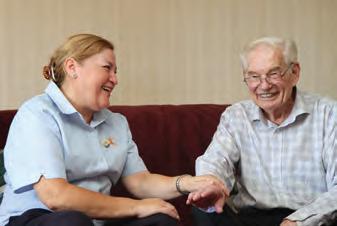
Our relationship-based services enhance wellbeing, independence, social connectedness and it meets individual needs.
Our in-house allied health and clinical teams provide efficient and cost effective care. If you have a home care package and wish to switch, contact us today.

167 Managing services QUEENSLAND Edition 24 www.AgedCareGuide.com.au Cultural services
Brisbane 07 3624 6100 South Coast 07 5617 9500
Cultural services
Provide social and activity programs that appropriately cater for the needs and interests of CALD residents
There are also culturally specific aged care facilities that have formally entered into a contract with the Australian Government to, wherever possible, meet the needs of a specific cultural group.
Partners in Culturally Appropriate Care
Partners in Culturally Appropriate Care (PICAC) is a national initiative, funded by the Australian Government, designed to improve aged care service delivery for older people from CALD communities.
The PICAC initiative has resulted in:
More aged care service providers delivering culturally appropriate care to older CALD people
Better access for older CALD people to culturally appropriate residential and community care services
Older CALD people having a greater capacity to make informed decisions about residential and community-based aged care
To find out more about PICAC in QLD, contact the Ethnic Communities Council of Queensland by calling 1300 348 377.
Breaking language barriers
Healthcare professionals in general practice treat patients from a diverse range of cultural and linguistic backgrounds. Many Australians speak a primary language other than English and patients with limited English proficiency may be less likely to adhere to medication regimes and follow-up plans.
They may also have a decreased understanding of their diagnosis and less overall satisfaction with their care. Access to high quality medical interpreter services may improve the quality of care for these patients.
The Translating and Interpreting Service (TIS National) is an interpreting service provided by the government. The service covers over 100 languages and is available 24/7 on 13 14 50.
See pages 149–150, 151–153 for a list of care homes and Home Care
Package providers in Queensland who can meet the needs of people from a range of cultures.
168 Managing services QUEENSLAND Edition 24 ????? www.AgedCareGuide.com.au
Special needs groups
There are a number of groups of people that the government recognises as ‘special needs’ groups when it comes to aged care services.
Aged care providers are required to consider the needs of these groups in the provision of care:
Aboriginal and Torres Strait Islander (ATSI) – The care needs of older ATSI people can be quite specific and there is a cultural element that needs to be considered in the delivery of care. See pages 149–150, 151–153 for an overview of service providers that have indicated to cater for ATSI clients.
Care leavers – A care leaver is a person who, as a child or youth, spent time in institutional care or other types of out of home care like orphanages, children’s homes or foster care.
Due to this, aged care has been flagged as an area that can cause distress and anxiety.
Culturally and linguistically diverse people (CALD) – Aged care services that cater specifically for people who are culturally and linguistically diverse might have staff that speak a foreign language, have specific cultural activities or meet spiritual needs.
The ‘National Ageing and Aged Care Strategy for People from Culturally and Linguistically Diverse (CALD) Backgrounds’ helps providers deliver quality care and aims to make culturally appropriate aged care more accessible. See pages 149–150, 151–153 for a list of culturally appropriate homes and services.
Disability – If you have a disability, are over 65 years of age and currently receive support through the National Disability Insurance Scheme (NDIS), visit ndis.gov.au or phone 1800 800 110 to find out what services are available to you.
Financially disadvantaged – If you have genuine difficulty paying aged care fees and charges, financial hardship provisions may apply These allow for your fees and charges to be reduced or waived.
Homeless – If you are currently experiencing homelessness/at risk of becoming homeless, there are government-funded services that can help solve your housing problems or assist with financial or legal issues.
LGBTIQ – Through the ‘National LGBTI Ageing and Aged Care Strategy,’ the government aims to ensure lesbian, gay, bisexual, transgender, intersex and questioning (LGBTIQ) people have access to the same options in aged care that are available to all Australians. Rural & regional clients – Services offered in rural and regional areas will depend on the needs of the whole community and sometimes aged care, health and community services are combined to meet local health needs.
Veterans – Veterans have a ‘special needs’ status to support complex medical requirements, including high levels of emotional and cultural support in old age as a result of a veterans’ wartime experience.
Contact the Department of Veterans’ Affairs on 1800 838 372 or visit www.dva.gov.au for information about support for veterans.
Special needs groups
169 Managing services QUEENSLAND Edition 24 www.AgedCareGuide.com.au
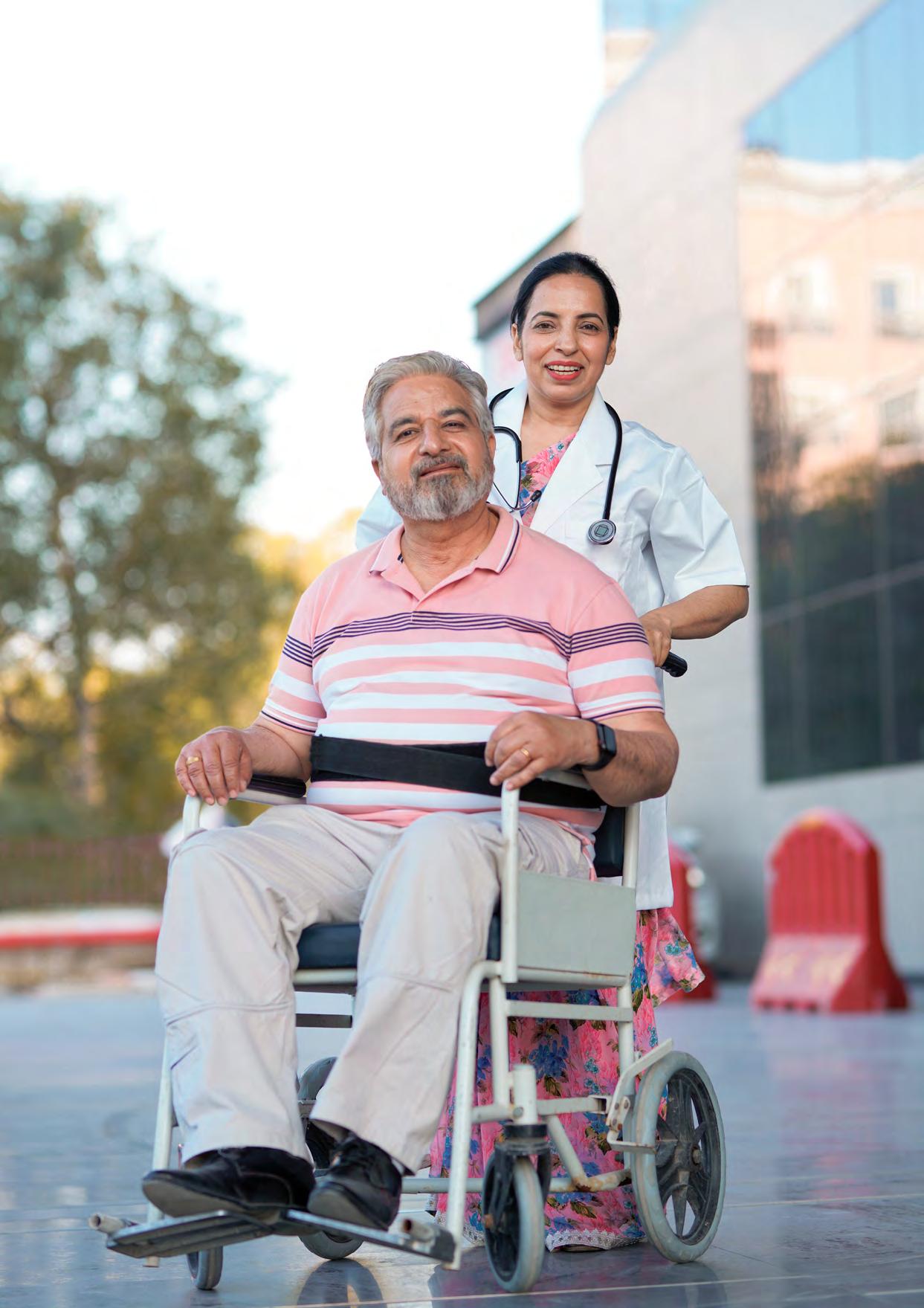
www.AgedCareGuide.com.au 170 Managing services QUEENSLAND Edition 24
Volunteer Visitors Scheme
Older Australians experience high rates of loneliness and social isolation, but there are different initiatives to improve social connection and encourage interaction in the community.
The Aged Care Volunteer Visitors Scheme (ACVVS) is a program that targets loneliness and isolation in older Australians. This initiative, from the Department of Health, uses volunteer visitors to meet with people on a regular basis to provide friendship and social inclusion.
As Australia’s population ages and people are living longer, the ACVVS is becoming incredibly important for social interaction and life changing engagement.
The ACVVS improves quality of life to all involved with the program and has been proven to combat loneliness and isolation occurring in residential aged care or at home.
Older people who would benefit from the ACVVS include people who have little contact with family or friends, are isolated from their own culture or heritage, have issues with their mobility that prevent them from participating in social activities or other personal issues that might make it difficult to engage socially.
What service is provided?
The ACVVS tries to connect like-minded individuals and recipients with similar hobbies, interests and likes to facilitate a good friendship.
There are a number of different types of volunteer visits under the ACVVS:
A residential volunteer visits a participant for a one-on-one visit at a residential aged care facility.
Group residential volunteers visit a small group of residents at a residential aged care facility who have similar interests, like gardening or knitting.
A home care volunteer visits an ACVVS recipient with an approved Home Care Package at their home.
Volunteers are not visiting to monitor your standards of care from your aged care service provider, be involved in any of your financial affairs, access your personal or care record information, provide any form of nursing or personal care or follow up a complaint about your care.
Think of your volunteer visitor as a dear friend that has come over for a cup of coffee and a chat.
To be eligible for the ACVVS, you have to be an older Australian who is at risk of/experiences loneliness, isolation or cultural loneliness. However, you have to be receiving government-subsidised residential aged care or a Home Care Package to be eligible for visits.
For further information about the program in Queensland, contact the ACVVS on 07 3017 1777 or visit health.gov.au/our-work/aged-care-volunteer-visitors-scheme-acvvs.
171 Managing services QUEENSLAND Edition 24 www.AgedCareGuide.com.au
Volunteer Visitors Scheme
Advocacy
Supporting the rights of older people
Most of the time, aged care services work well and the people who use them are happy with the service they receive.
However, sometimes a problem may arise and you may need help to speak up and have the problem resolved.
Many people feel uncomfortable raising a complaint or concern, but it is important to address your concerns early and not leave it to escalate.
This can be particularly difficult if your complaint is about the care or services that you are dependent upon for meeting your most basic needs.
Nevertheless, we live in a society where each and every one of us, regardless of our age, has rights as citizens and individuals.
Advocacy
If you feel unsure or unable to address your concerns with the service provider, you can ask an advocacy service to help you.
An aged care advocate can assist you to exercise choice and control over your care services and work with you and your family on the best way to address your concerns with a provider.
Their services are usually free and they can give you information, advice and support for you to express your concerns or even speak on your behalf. They will aim to achieve the best possible outcome for you.
An advocate can:
help you understand your rights and responsibilities; listen to your concerns and discuss your options; support you and give you confidence in addressing a concern; raise a concern with the service provider or speak on your behalf.
Advice is generally provided on consumer rights, human rights, aged care rights and responsibilities, financial exploitation, substitute decisionmaking, elder abuse prevention and responding to harm.
Advocates can assist with negotiating changes to your care plan, ensuring the needs of people from culturally diverse backgrounds are met. They also deliver specialist community education, such as self-advocacy and how to meet the needs of people with dementia or special needs.
There are free and independent advocacy services in every state and territory that provide telephone advice, community education and other assistance for older people.
The Older Persons Advocacy Network (OPAN) is a national network of nine state and territory organisations that have been successfully delivering advocacy, information and education services to older people in metropolitan, regional, rural and remote Australia for over 25 years.
The Australian Government funds OPAN to deliver the National Aged Care Advocacy Program across the country. Call 1800 700 600 to speak with an aged care advocate in Australia or visit at opan.com.au
172 Managing services QUEENSLAND Edition 24 www.AgedCareGuide.com.au
Elder abuse
There are heartbreaking stories of older people being mistreated by the people they trust and who are closest to them.
In one instance, an 85-year-old gentleman appointed a distant relative as his power of attorney and he was neglected, unable to return to his own home, as large sums of money were taken from his bank account without permission.
Another tragic story involved a woman who became depressed and fearful, because her addict son abused her verbally and psychologically, stole from her and left her isolated.
Elder abuse is defined as ‘any act which causes harm to an older person and is carried out by someone they know and trust, such as a family member or friend.’
The abuse may be physical, social, financial, psychological, sexual or negligent.
A report from the World Health Organization (WHO) suggests that the number of people experiencing elder abuse could be as high as one in ten.
As our population ages, the number of people affected by elder abuse is also expected to rise.
If you need information or advice about elder abuse, contact the national ELDERHelp line on 1800 353 374.
Advocacy

173 Managing services QUEENSLAND Edition 24 www.AgedCareGuide.com.au
Carer support
Carer support
There are over 2.65 million unpaid carers across Australia. The caring role is a valuable and rewarding job but also a tough one, often balancing work, family and friends, while making sure your loved one is well looked after.
With more older Australians looking to stay at home longer, more family and friends of older people are finding themselves in a carer role than ever before.
There are some great support options available to assist you with practical or emotional support and you may be eligible for financial support from the Australian Government.
Support groups and counselling services
Community-run carer support groups can offer a safe and understanding environment to talk about your caring role. These groups may be organised around caring for someone with a particular need (such as Parkinson’s or dementia).
Support groups are an opportunity for you to connect with other carers who are or have experienced situations similar to yours, sharing anecdotes and advice.
Carer support groups are completely confidential and can also help you to:
Discover new information
Get along to education or training workshops
Participate and get involved in activities
Head along to relaxing outings
Support lines
There are also a number of support lines and websites to assist carers, just like you, in looking after older people.
Some helpful support services include:
Carer Gateway – 1800 422 737 – helps you find local support services; gives advice on a range of topics, such as health and wellbeing, financial and legal consideration; can connect you with other carers
National Dementia Helpline – 1800 100 500 – provides information and support about dementia; can connect you to support services in your area, as well as provide emotional support to help manage the impact of dementia
Carers Australia – 02 6122 9900 – runs support programs, including short-term counselling for carers with qualified counsellors
Relationships Australia – 1300 364 277 – offers a range of services, such as counselling and mediation, by phone, online and face-to-face
Lifeline – 13 11 14 – offers 24/7 crisis support and phone counselling
To find out more about financial support for carers, contact Services Australia online on servicesaustralia.gov.au or call 13 27 17.
174 Managing services QUEENSLAND Edition 24 www.AgedCareGuide.com.au
Memory change — is it dementia?
Are you concerned about the memory, thinking or behaviour of yourself or someone you know?
Changes like these can have a number of possible causes, including stress, depression, pain, chronic illness or medications.
See your doctor if you or someone close to you experience these kinds of difficulties. Receiving a diagnosis is important because the underlying cause may be treatable.
However, major changes in memory are not normal at any age and should be taken seriously.
What is dementia?
‘Dementia’ is a general term to describe problems that involve progressive changes in memory, thinking, behaviour and the ability to perform regular daily activities.
There are more than 100 different types of dementia. The most common types are:
Alzheimer’s disease — attacks the brain resulting in impaired memory, thinking and behaviour
Vascular dementia — caused by poor blood flow to the brain, depriving brain cells of nutrients and oxygen needed to function normally
Parkinsonian dementia — a chronic, progressive neurological condition, which, in later stages, can affect cognitive functioning
Frontotemporal dementia —˜ a disorder causing damage to brain cells in the frontal and temporal lobes, leading to impaired social skills and emotional apathy. Behaviour and personality changes often occur before memory loss and speech problems
The early signs of dementia may include short-term memory loss, temporal confusion, mood swings and changes in executive functioning, such as difficulty with skill-based tasks.
Dementia can happen to anybody, but is much more common after the age of 65. Dementia is not a normal part of ageing.
Dementia and aged care
For people with dementia, their memory loss affects their adjustment to new places and people. The move to residential care should be considered before a crisis forces a more urgent response.
Good care depends on how well the care facility responds to the residents’ individual needs, including their physical, social and mental wellbeing.
Where can I get help?
Support is vital for the person with dementia, as well as family members. Although the effects of dementia can’t yet be stopped or reversed, an early diagnosis gives families a chance to access services and plan for the future.
175 Managing services QUEENSLAND Edition 24 www.AgedCareGuide.com.au Dementia support
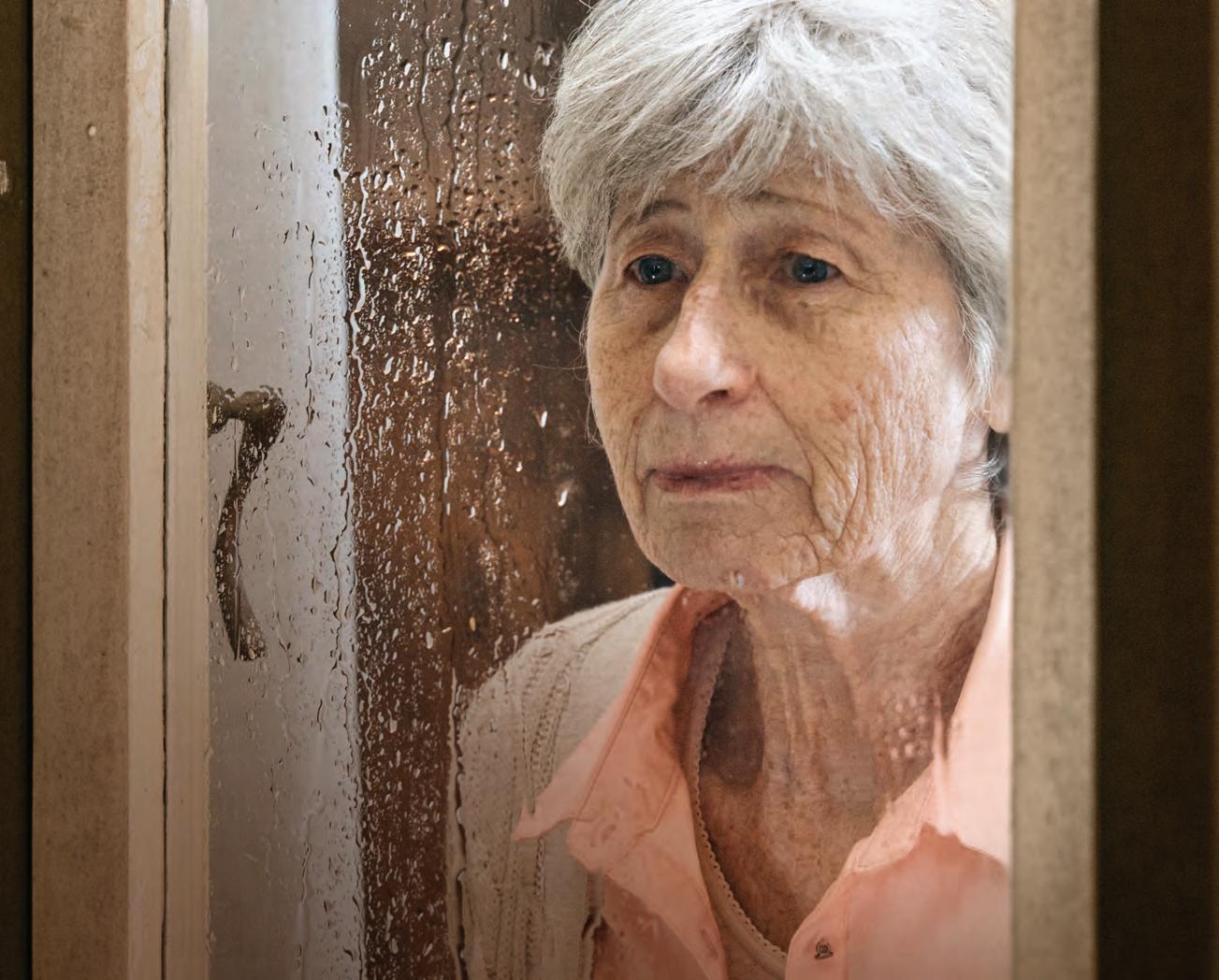
www.AgedCareGuide.com.au We’re here to help. Dementia can affect us all. Dementia Support Australia provides support to health care professionals, carers and people living with dementia who are experiencing behaviours and psychological symptoms of dementia. Free 24/7 dementia support 1800 699 799 dementia.com.au 176
There are a number of organisations that offer support, information, education and counselling to people affected by dementia. The National Dementia Helpline offers advice and counselling on 1800 100 500 or dementia.org.au. This page also includes information about how the Dementia Behaviour Management Advisory Service (DBMAS) can help.
Changed behaviours
Behavioural change can occur for people with dementia, with many people experiencing changes to mood, thought, language, daily function or movement. The individual’s response to a particular circumstance or situation may alter or reduce as the dementia progresses.
Changed behaviour as a response to a person’s dementia may reduce quality of life for the person living with dementia and can contribute to carer or care worker stress. It is important to take steps to support the person living with dementia and the people that provide care to them.
The Dementia Behaviour Management Advisory Service (DBMAS) can help explain the causes for changed behaviours and identify strategies to assist the person living with dementia and their carers.
Changed behaviours may include:
Anxiety
Depressed mood
Hallucinations
Restlessness
Aggression
Sleep disturbance
Inappropriate toileting
Eating difficulties
Dementia support

177 Managing services QUEENSLAND Edition 24 www.AgedCareGuide.com.au
Dementia support
Repeated calling out
Repetitive questioning
Wandering
Specialised support
Hoarding
Resistive to care
Unwanted sexualised behaviour
The Dementia Behaviour Management Advisory Services (DBMAS) is a free, nationwide service, funded by the Australian Government, supporting family, health and aged care professionals to better understand and respond to individual changes in behaviour and emotions.
The service can help explain the causes for changed behaviours and identify strategies to assist the person living with dementia and their carers. It offers specialised support, assessment, intervention and advice to assist carers and care workers of people with dementia.
DBMAS has a multi-disciplinary team of experienced health care professionals, such as registered nurses, social workers, clinical psychologists, geriatricians, speech pathologists and dietitians.
DBMAS is committed to providing culturally sensitive and effective communication. If you require an interpreter service, you can call the Translating and Interpreting Service on 13 14 50 and ask them to contact the DBMAS service.
For more information, contact DBMAS on 1800 699 799 or visit dementia.com.au End-of-life care
End-of-life care
Whether you live in your own home or in a residential aged care home, when the end of life approaches, you may require additional support.
The primary goal of palliative care is to provide supportive care and improve the patient’s quality of life by addressing any painful or distressing symptoms.
Palliative care is divided into three subgroups:
1. Primary care — For people who only require services from their primary health care professional(s).
2. Intermediate care — Advice is provided by specialist palliative care services, but care is still given by health care professional(s).
3. Complex care — For people who require care from specialist practitioners. Patients are commonly referred to specialist palliative care services where they will receive the required care.
There are a number of different services that can offer extra support both at home or in a nursing home setting.
178 Managing services QUEENSLAND Edition 24 www.AgedCareGuide.com.au
Services to help at home
Services that may help you to stay in the comfort of your own home can include:
A qualified nurse to dress a wound or provide continence advice
Household jobs like cleaning, clothes washing and ironing
Help with bathing or showering, dressing, hair care and going to the toilet
Meals and other food services — assistance with preparing and eating meals or help for those with special diets
Helping to travel to shopping centres or appointments
Palliative care in a nursing home
For palliative care in a residential aged care setting, the government has developed a series of guidelines that offer support and guidance to residential aged care facilities in providing palliative care.
The ‘Guidelines for a Palliative Approach in Residential Aged Care’ outline three forms of palliative care in residential aged care, which include:
A palliative approach — aims to improve the quality of life for residents with a life-limiting illness. This can be done by reducing their suffering through early identification, assessment and treatment of pain; handling their physical, cultural, psychological, social and spiritual needs.
Specialised palliative service provision — involves referral to a specialised palliative team or health care practitioner.
End-of-life (terminal) care — appropriate when the resident is in the final days or weeks of life and care decisions may need to be reviewed more frequently.
Family and friends
Providing end-of-life care can be particularly intense for family and friend carers.
While managing their own grief and the grief of others, carers will be providing high-level physical and emotional support that a patient needs at the end of life. Palliative care not only supports patients, but also their friends and families.
For more information about palliative care services, talk to your GP or contact your community health centre.

179 Managing services QUEENSLAND Edition 24 www.AgedCareGuide.com.au End-of-life care
718 357 bvac.enquiry@bupa.com.au
109 109
236 822 centacare@bne.catholic.net.au
9830 5022 admin.camberwell@nazarethcare.com
842 924
Aged Car e Guide 180 QUEENSLAND Edition 24 SRF Supported Residential Facility D Divider IBC Inside Back Cover IFC Inside Front Cover OBC Outside Back Cover Organisation &
Reference
listed alphabetically
section only includes organisations
businesses
Care Guide Advert Page ORGANISATION PHONE (07) EMAIL WEBSITE (www.) In-homeCare Services HomeCarePackagesResidentialAgedCare/SRS Centre-basedCareDayTherapyCentreProductsand Services Aged Care Assistance Placement Consultancy 0411 220 129 info@agedcareassistance.com.au agedcareassistance.com.au 9 91 Alteris Financial Group 1300
care@alteris.com.au alteris.com.au 9 79 Amazing ProCare 0448
info@amazingprocare.com.au amazingprocare.com.au 9 9 27 Angels in Aprons 0406
info@angelsinaprons.com.au angelsinaprons.com.au 9 9 29 Arcare 1300 272 273 marketing@arcare.com.au arcare.com.au 9 9 9 IFC-1 Bolton Clarke 1300
hello@boltonclarke.com.au boltonclarke.com.au 9 18-19 Bupa Care Services 1800
bupaagedcare.com.au 9 59 Carinity 1300
agedcare@carinity.org.au carinity.org.au 9 9 9 10 Centacare Brisbane 1300
centacarebrisbane.net.au 9 9 9 9 34 Christadelphian Aged Care 1800 246
admissions@chomes.com.au chomes.com.au 9 64 Chubb Fire & Security 13
98 info@chubb.com.au chubb.com.au 9 48 Churches of Christ 1800 900 001 creative@cofcqld.com.au cofc.com.au/seniorslifestyles 9 9 9 57 Co.As.It. Community Services 3624 6100 mail@coasit.asn.au coasit.asn.au 9 9 9 9 167 Dementia Support Australia 1800 699 799 dsa@dementia.com.au dementia.com.au 9 176 Health and Aged Assist (QLD) 1300
reception@haaaqld.com.au haaa.com.au 9 89 IRT Group 13 44 78 customerservice@irt.org.au irt.org.au 9 9 9 15 Just Better Care Australia 1300 587 823 info@justbettercare.com justbettercare.com 9 9 31 Life Without Barriers 1800 935 483 info@lwb.org.au lwb.org.au 9 Calvary 1800 527 272 marketing@calvarycare.org.au calvarycare.org.au 9 21 Meals On Wheels Queensland 1300 909 790 info@qmow.org qmow.org 9 20 MePACS 1800 685 329 mepacssales@mepac.com.au mepacs.com.au 9 49 Mercy Health 1300 478 776 information@mercy.com.au mercyhealth.com.au 9 9 9 53 MultiLink Community Services 3808 4463 agedanddisability@multilink.org.au multilink.org.au 9 9 9 36 My CarePath 1300 755 702 support@mycarepath.com.au mycarepath.com.au 9 33 Nazareth Care 03
sistersofnazareth.com/region/ australasian-region 9 67 Opal HealthCare 1300
opalhealthcare.com.au 9 3, IBC Ozcare 1800 692 273 info@ozcare.org.au ozcare.org.au 9 9 9 9 9 74-75 Phase 3 Retirement Solutions 0414 347 287 peter@phase3rs.com.au phase3rs.com.au 9 80 Right at Home Australia 1300 363 802 info@rightathome.com.au rightathome.com.au 9 9 9 37 Roshana Care Group 08
admin@roshana.com.au roshana.com.au 9 13 Signature Care 03
0100 reception@croft.com.au signaturecare.com.au 9 52 Simply Helping 1800 998 866 info@simplyhelping.com.au simplyhelping.com.au 9 24 Southern Cross Care Qld 1800 899 300 enquiries@sccqld.com.au sccqld.com.au 9 9 9 63 St Vincent's Care Services 1300 703 346 svcs.info@svha.org.au svcs.org.au 9 9 9 7 The Salvation Army Aged Care 1300 111 227 acp.enquiries@aue.salvationarmy.org agedcare.salvos.org.au 9 9 9 61 TriCare 3360 9000 marketing@tricare.com.au tricare.com.au 9 9 32D-33D, OBC Trilogy Care 1300
190 info@trilogycare.com.au trilogycare.com.au 9 112 Wesley Mission Queensland 1800 448 448 contactus@wmq.org.au wmq.org.au 9 9 9 9 9 55
Business
Index
This
and
who have chosen to promote with Aged
366 932
200 312
076 885
221 122
637
15
730 074
communications@opalhealthcare.com.au
9279 9888
9581
459
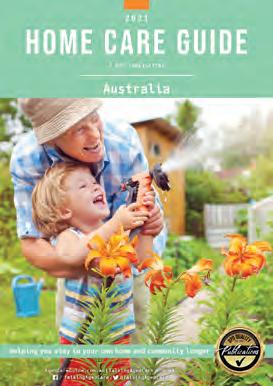



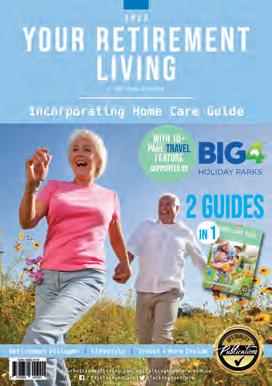



AgedCareGuide.com.au 181 QUEENSLAND Edition 24 www.YOURretirementliving.com.au - 2 guides in 1 - big4 tourist park feature - home care - retirement planning - lifestyle options - health & wellbeing - managing finances DPSQUALITY Est. 1999 Australia’s Favourite Retirement Guide

182

183
n
n

184 QUEENSLAND Edition 24 Aged Car e Guide Index Abbreviations ............................................................................ 101 Aboriginal and Torres Strait Islander (ATSI)................................ 169 Advocacy .......................................................................... 172–173 Aged Care Assessment Team (ACAT) 14 n Appeal 85 n Assessment 12 n Referrals 86 n Regions 122 Aged care checklist............................................................... 71–73 Aged care explained .................................................................... 84 Aged care homes.................................................................. 51–57
Accommodation payments 73
Accreditation and certification 35
Basic daily fee 73
Charter of rights 54 n Complaints 56 n Costs ................................................................................. 73–77 n Cultural services............................................................ 167–168 n Directory listings............................................................. 94–159 n Extra services 166 n Homes and their services 51
How much will I pay? 76 n Payment options 73 n Quality standards 54 n RAD & DAP ............................................................................... 77
Where do I start? ..................................................................... 51 Applying to a home ..................................................................... 58 n Waiting lists 60 n Vacancy 60 Assessments 12 Assistive technology options 47 n Mobility aids 47 n Technology .............................................................................. 47 Care leavers ............................................................................... 169 Carer support ............................................................................ 174 n Counselling services 174 n Support groups and lines 174 Centre-based care services 45 Commonwealth Home Support Programme (CHSP) 22 n Am I eligible? 23 n Directory listings............................................................. 97–101
Types of services provided ....................................................... 23
Urgent needs ........................................................................... 25
What is CHSP? 23
Who is CHSP for? 23 n Who pays for CHSP services? 23 Consumer-directed care 22 Continence 23 Costs of residential ...................................................................... 73 n Accommodation payments ...................................................... 76 Costs of residential continued n Basic daily fees ........................................................................ 73 n How much will I pay? ............................................................... 76 Cultural services 167–168 n Directory listings 149–153 n Partners in culturally appropriate Care 168 Culturally and linguistically diverse (CALD) people 169 n Directory listings 149–153 Daily accommodation payment (DAP)......................................... 77 Daily living in a nursing home ..................................................... 67 Day therapy centres.............................................................. 44–45 n Directory listings 157–158 Deciding on a home 61–64 Definition of often used terms 160–161 Dementia 175 n Changed behaviours 177 n Specialised support ............................................................... 178 Directory index .......................................................................... 159 n Aged care home listings......................................................... 148 n Centre-based care listings 154–156 n Culturally appropriate homes and services 149–153 n Day therapy centres listings 157–158 n Extra services listings 148 n Home Care Packages listings 106–120 n In-home care provider listings ........................................ 97–101 n Local government area (LGA) reference index .......................... 94 n Organisation and business index ........................................... 180 n Products and services listings 159 n Suburb reference index 95–96 n Town reference index 95–96 Disability 169 End of life 178–179 n Palliative care in a nursing home ........................................... 179 n Residents with dementia ....................................................... 175 n Services to help at home........................................................ 179 Estate planning 81 n Enduring power of attorney and guardianship 81 Extra services 166 n Directory listings 148 Financial advice 78–80 n Financial counselling ............................................................... 80 n How an expert can help ........................................................... 79 n Paying for your care ................................................................. 73 Financially disadvantaged 169 Flexible restorative care 43 Home care flow chart 16 Home Care Packages (HCP) 26–38 n Approved providers 30 n Are you eligible? ...................................................................... 29 n Cost.......................................................................................... 30 Home Care Packages (HCP) continued n Directory listings........................................................... 106–120 n Exit fees ................................................................................... 34 n Home care agreement 30 n How much you will pay 32 n Priority 29 n Quality and complaints 35 n Services not provided 28 n Services provided..................................................................... 28 n Types of packages .................................................................... 26 How to use the Aged Care Guide ................................................... 6 In-home support 20 n Directory listings 97–101 LGBTIQ 169 Moving into a home 65 n What you can bring 65 n Making the transition .............................................................. 66 My Aged Care .............................................................................. 12 n Referral code ........................................................................... 84 Placement consultants 89 n Case management 92 n Choosing a placement consultant 91 n How a placement consultant can help 90 n Negotiate and advocate for you 90 n Resolving family disputes ........................................................ 92 Private home care ....................................................................... 39 RAD and DAP explained .............................................................. 77 Refundable accommodation deposit (RAD) 77 Regional Assessment Service (RAS) 14 n Assessment 14 n Referrals 87 Regaining your independence 42 Resident agreement .................................................................. 165 Residential care flow chart .......................................................... 17 Respite ........................................................................................ 41 n At home 41 n Centre-based respite care 41 n Cost 41 n Residential respite 58 Restorative care 43 n Departure/exit fee ................................................................... 30 Short-term restorative care ......................................................... 43 Special needs groups................................................................. 169 Support at home 20 Transition care 42 Useful phone numbers and websites 5 Veterans 40 Waiting for residential care 60 Call 1300 186 688 or email sales@dps.com.au YOUR DPS SALES TEAM www.AgedCareGuide.com.au www.DisabilitySupportGuide.com.au Matt Ed David
n
n
n
n
n
n
n
n
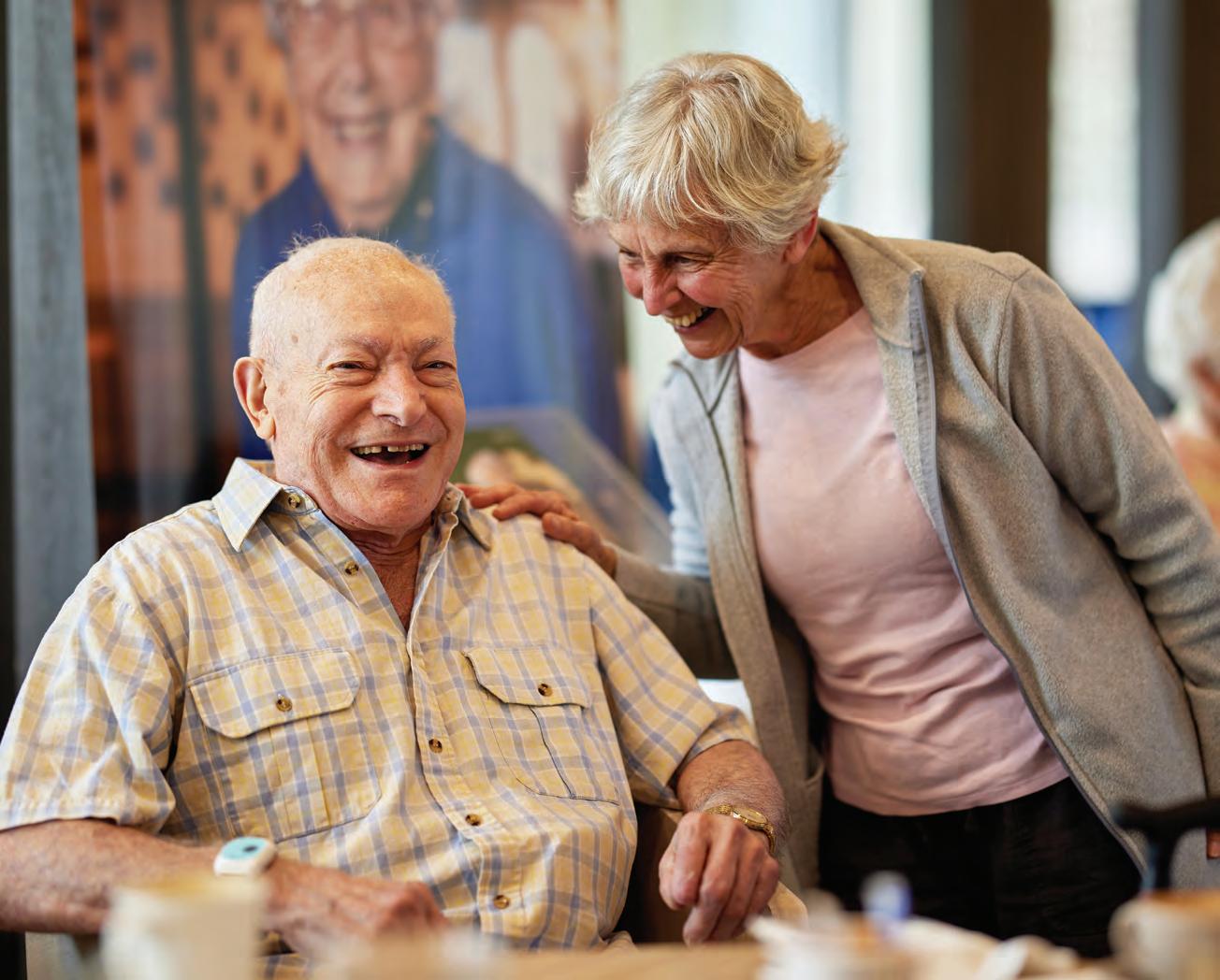
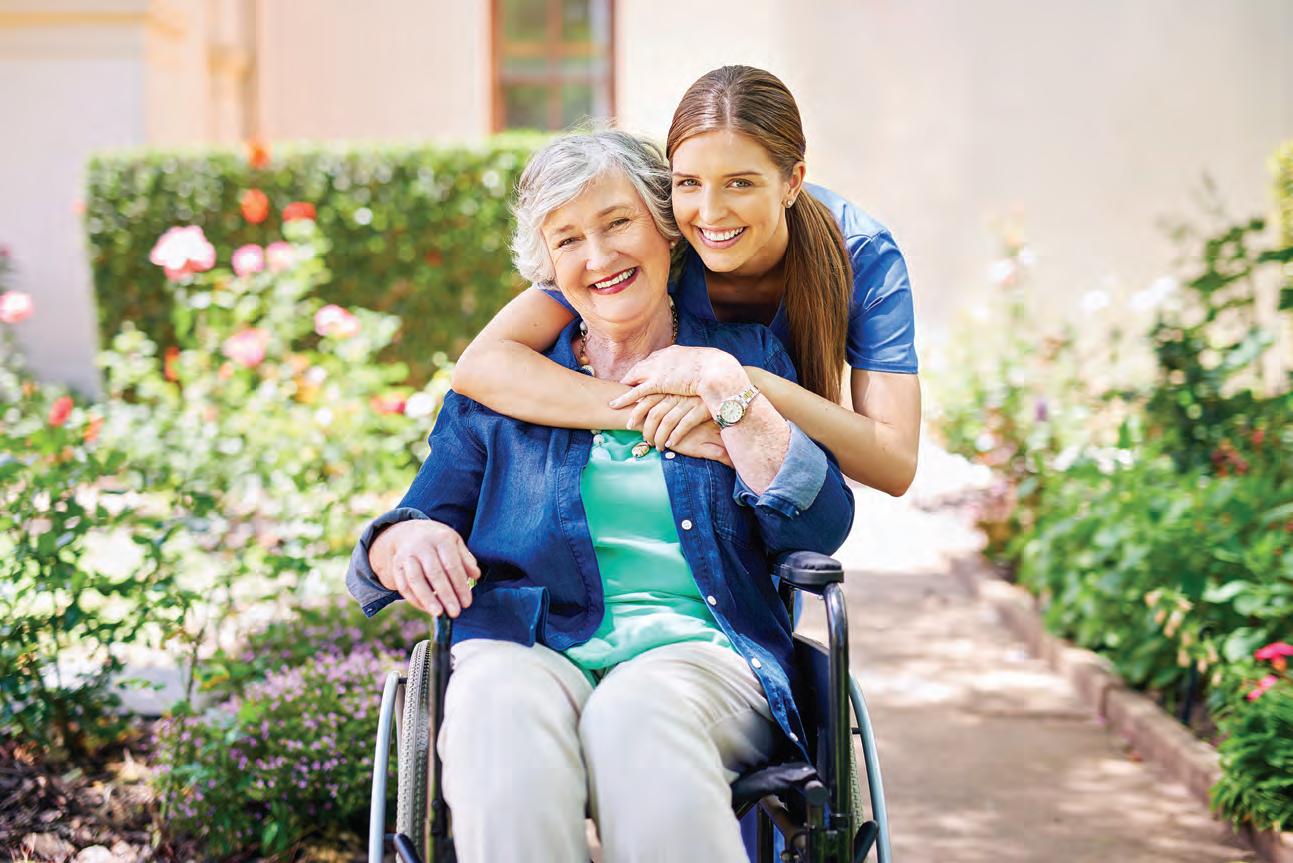
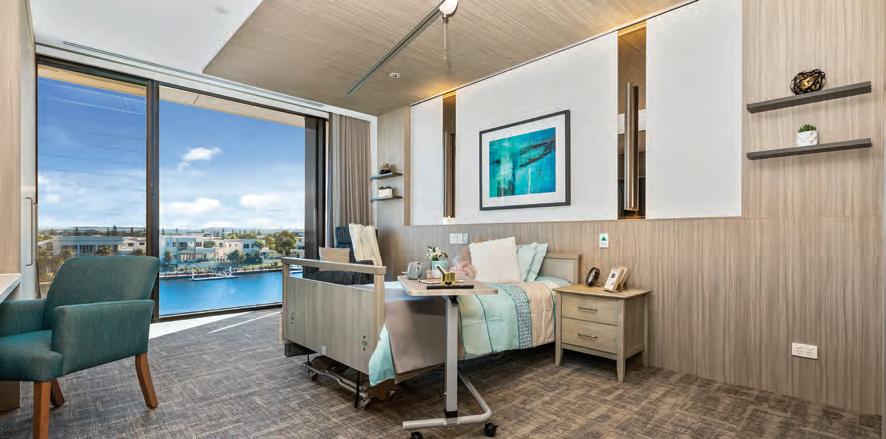



















































































































































































































 Runaway Bay
Runaway Bay











































































































